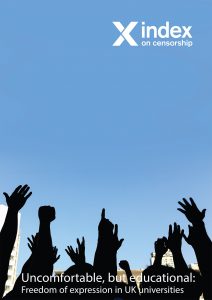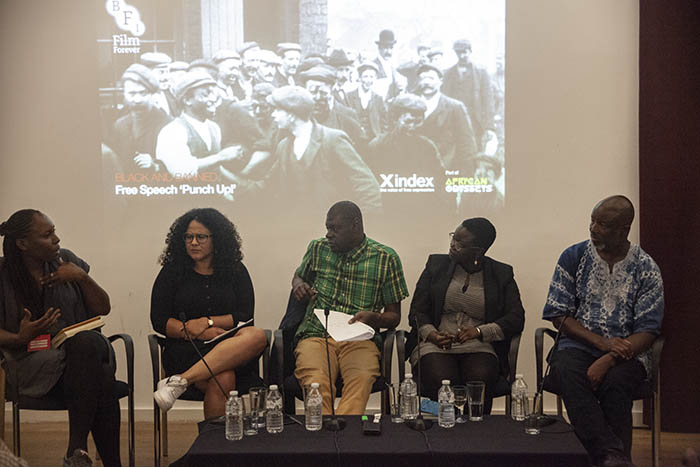28 Nov 2018 | Academic Freedom, Academic Freedom Reports, News and features, Press Releases

The full report can be read here.
A narrative of safety and risk is hampering freedom of speech on UK university campuses, a new report has found.
‘Uncomfortable but educational‘ — a short report and guide on the laws protecting free speech in universities by freedom of expression campaigners Index on Censorship — calls for more to be done to create an environment in which free speech is promoted as an equal good with other statutory duties. It also identifies Prevent as a key issue.
The report argues that universities should strengthen and simplify codes of practice to clarify their responsibilities and commitment to protecting free speech on campus. It also urges student unions to reaffirm a commitment to freedom of expression in their policies and remove “no-platforming” guidelines that involve outlawing speakers who are not members of groups already proscribed by government.
The report identifies the implementation of Prevent — which places obligations on universities to stop students being drawn into terrorism — as having a pernicious effect on freedom of expression and academic freedom in higher education and calls for an immediate independent review of the policy.
Despite near-daily news stories about attempts to shut down free speech on campus, the report finds that the environment for freedom of expression is poorly understood. Incidents are often misreported, while others — especially levels of self-censorship — are not reported publicly at all. A better understanding of the levels of explicit and implicit censorship on campus, coupled with the development of strategies for the better promotion of freedom of expression and at pre-university level are identified as crucial for ensuring free speech is protected.
The report draws on interviews and research of the sector over the past three years and in particular offers a guide to the legal protections and duties related to freedom of expression. It finds that often duties and rights such as those related to safety are presented as trumping those related to free speech, creating a risk-averse culture in which free speech is seen as a less important right.
“Protecting and promoting freedom of expression should be at the heart of what a university does – not an afterthought,” said Index on Censorship chief executive Jodie Ginsberg. “We want to encourage everyone to consider this as a core value – rather than one that is secondary to other rights and responsibilities.”
For more information or to arrange an interview, please contact Jodie Ginsberg at [email protected] or 020 7963 7260.
30 Sep 2018 | Events
[vc_row][vc_column][vc_single_image image=”102958″ img_size=”full”][vc_column_text]Many would argue that these are the fundamental goals of a good education. So why has Cambridge University taken to warning its students that the sexual violence in Titus Andronicus might be traumatic for them? Why are other universities in America and increasingly in Britain introducing measures to protect students from speech and texts they might find harmful? Safe spaces, trigger warnings and no-platforming are now campus buzzwords – and they’re all designed to limit free speech and the exchange of ideas. As celebrated social psychologist Jonathan Haidt argues in his forthcoming book The Coddling of the American Mind, university students are increasingly retreating from ideas they fear may damage their mental health, and presenting themselves as fragile and in need of protection from any viewpoint that might make them feel unsafe.The culture of safety, as Haidt calls it, may be well intentioned, but it is hampering the development of young people and leaving them unprepared for adult life, with devastating consequences for them, for the companies that will soon hire them, and for society at large.
That, Haidt’s critics argue, is an infuriating misinterpretation of initiatives designed to help students. Far from wanting to shut down free speech and debate, what really concerns the advocates of these new measures is the equal right to speech in a public forum where the voices of the historically marginalised are given the same weight as those of more privileged groups. Warnings to students that what they’re about to read or hear might be disturbing are not an attempt to censor classic literature, but a call for consideration and sensitivity. Safe spaces aren’t cotton-wool wrapped echo chambers, but places where minority groups and people who have suffered trauma can share their experiences without fear of hostility.
On November 19th Haidt comes to the Intelligence Squared stage to discuss and debate these ideas. Joining him will be the former chief rabbi Jonathan Sacks, who believes that educating young people through debate and argument helps foster robustness; writer and radical activist Laurie Penny, who campaigns for the voices of less privileged groups to be heard; and sociologist Kehinde Andrews, one of the UK’s leading thinkers on race and the history of racism.[/vc_column_text][vc_custom_heading text=”Panelists” font_container=”tag:h3|text_align:left” use_theme_fonts=”yes”][vc_row_inner][vc_column_inner width=”1/4″][vc_single_image image=”102951″ img_size=”full”][/vc_column_inner][vc_column_inner width=”3/4″][vc_column_text]
Kehinde Andrews
Associate professor in sociology at Birmingham City University, a regular writer of opinion pieces for the Guardian, Independent and Ebony magazine, and editor of the series ‘Blackness in Britain’. He was part of the team that launched the first Black Studies degree in Europe, and is co-chair of the Black Studies Association and of the Harambee Organisation of Black Unity. He is author of Back to Black: Retelling Black Radicalism for the 21st Century.[/vc_column_text][/vc_column_inner][/vc_row_inner][vc_row_inner][vc_column_inner width=”1/4″][vc_single_image image=”102950″ img_size=”full”][/vc_column_inner][vc_column_inner width=”3/4″][vc_column_text]
Jonathan Haidt
Social and cultural psychologist, who is the Thomas Cooley Professor of Ethical Leadership at New York University’s Stern School of Business. His 2013 book, The Righteous Mind: Why Good People are Divided by Politics and Religion, was described by the New York Times as ‘a landmark contribution to humanity’s understanding of itself’. His latest book is The Coddling of the American Mind: How Good Intentions and Bad Ideas Are Setting Up a Generation for Failure.[/vc_column_text][/vc_column_inner][/vc_row_inner][vc_row_inner][vc_column_inner width=”1/4″][vc_single_image image=”102952″ img_size=”full”][/vc_column_inner][vc_column_inner width=”3/4″][vc_column_text]
Laurie Penny
Author and commentator, who has been described as ‘one of the most accomplished and acerbic of the new, young journalists emerging from the protest movements of the 2010s’. She is a contributing editor to The New Statesman and has also written for The Guardian, Time magazine, Buzzfeed, The New York Times and Vice. She has written five books including Bitch Doctrine: Essays for Dissenting Adults and Unspeakable Things: Sex, Lies and Revolution.[/vc_column_text][/vc_column_inner][/vc_row_inner][vc_row_inner][vc_column_inner width=”1/4″][vc_single_image image=”102954″ img_size=”full”][/vc_column_inner][vc_column_inner width=”3/4″][vc_column_text]
Rabbi Lord Sacks
Jonathan Sacks was Chief Rabbi of the United Hebrew Congregations of the Commonwealth between 1991 and 2013. He is a philosopher and author of over 30 books, most recently the bestselling Not in God’s Name: Confronting Religious Violence. He has a number of professorships at academic institutions, including New York University, Yeshiva University and King’s College London.[/vc_column_text][/vc_column_inner][/vc_row_inner][vc_custom_heading text=”Chair” font_container=”tag:h3|text_align:left” use_theme_fonts=”yes”][vc_row_inner][vc_column_inner width=”1/4″][vc_single_image image=”102953″ img_size=”full”][/vc_column_inner][vc_column_inner width=”3/4″][vc_column_text]
Emily Maitlis
Presenter of BBC Newsnight and one of the country’s best known broadcasters.[/vc_column_text][/vc_column_inner][/vc_row_inner][vc_custom_heading text=”In Partnership With” font_container=”tag:h4|text_align:left” use_theme_fonts=”yes”][vc_row_inner][vc_column_inner width=”1/3″][vc_single_image image=”102971″ img_size=”full” onclick=”custom_link” img_link_target=”_blank” link=”https://www.intelligencesquared.com/”][/vc_column_inner][vc_column_inner width=”1/3″][/vc_column_inner][vc_column_inner width=”1/3″][/vc_column_inner][/vc_row_inner][/vc_column][/vc_row][vc_row][vc_column][vc_column_text]
When: Monday, 19 November 2018, 7PM
Where: Emmanuel Centre 9-23 Marsham St Westminster SW1P 3DW
Tickets: From £15 via Intelligence Squared
[/vc_column_text][/vc_column][/vc_row]
14 Sep 2018 | News and features, This Week
[vc_row][vc_column][vc_raw_html]JTNDaHRtbCUyMHhtbG5zJTNEJTIyaHR0cCUzQSUyRiUyRnd3dy53My5vcmclMkYxOTk5JTJGeGh0bWwlMjIlMjB4bWxucyUzQXYlM0QlMjJ1cm4lM0FzY2hlbWFzLW1pY3Jvc29mdC1jb20lM0F2bWwlMjIlMjB4bWxucyUzQW8lM0QlMjJ1cm4lM0FzY2hlbWFzLW1pY3Jvc29mdC1jb20lM0FvZmZpY2UlM0FvZmZpY2UlMjIlM0UlMEElMDklM0NoZWFkJTNFJTBBJTA5JTA5JTNDJTIxLS0lMjBOQU1FJTNBJTIwMSUyMENPTFVNTiUyMC0tJTNFJTBBJTA5JTA5JTNDJTIxLS0lNUJpZiUyMGd0ZSUyMG1zbyUyMDE1JTVEJTNFJTBBJTA5JTA5JTNDeG1sJTNFJTBBJTA5JTA5JTA5JTNDbyUzQU9mZmljZURvY3VtZW50U2V0dGluZ3MlM0UlMEElMDklMDklMDklM0NvJTNBQWxsb3dQTkclMkYlM0UlMEElMDklMDklMDklM0NvJTNBUGl4ZWxzUGVySW5jaCUzRTk2JTNDJTJGbyUzQVBpeGVsc1BlckluY2glM0UlMEElMDklMDklMDklM0MlMkZvJTNBT2ZmaWNlRG9jdW1lbnRTZXR0aW5ncyUzRSUwQSUwOSUwOSUzQyUyRnhtbCUzRSUwQSUwOSUwOSUzQyUyMSU1QmVuZGlmJTVELS0lM0UlMEElMDklMDklM0NtZXRhJTIwY2hhcnNldCUzRCUyMlVURi04JTIyJTNFJTBBJTIwJTIwJTIwJTIwJTIwJTIwJTIwJTIwJTNDbWV0YSUyMGh0dHAtZXF1aXYlM0QlMjJYLVVBLUNvbXBhdGlibGUlMjIlMjBjb250ZW50JTNEJTIySUUlM0RlZGdlJTIyJTNFJTBBJTIwJTIwJTIwJTIwJTIwJTIwJTIwJTIwJTNDbWV0YSUyMG5hbWUlM0QlMjJ2aWV3cG9ydCUyMiUyMGNvbnRlbnQlM0QlMjJ3aWR0aCUzRGRldmljZS13aWR0aCUyQyUyMGluaXRpYWwtc2NhbGUlM0QxJTIyJTNFJTBBJTA5JTA5JTNDdGl0bGUlM0UlMkElN0NNQyUzQVNVQkpFQ1QlN0MlMkElM0MlMkZ0aXRsZSUzRSUwQSUyMCUyMCUyMCUyMCUyMCUyMCUyMCUyMCUwQSUyMCUyMCUyMCUyMCUzQ3N0eWxlJTIwdHlwZSUzRCUyMnRleHQlMkZjc3MlMjIlM0UlMEElMDklMDlwJTdCJTBBJTA5JTA5JTA5bWFyZ2luJTNBMTBweCUyMDAlM0IlMEElMDklMDklMDlwYWRkaW5nJTNBMCUzQiUwQSUwOSUwOSU3RCUwQSUwOSUwOXRhYmxlJTdCJTBBJTA5JTA5JTA5Ym9yZGVyLWNvbGxhcHNlJTNBY29sbGFwc2UlM0IlMEElMDklMDklN0QlMEElMDklMDloMSUyQ2gyJTJDaDMlMkNoNCUyQ2g1JTJDaDYlN0IlMEElMDklMDklMDlkaXNwbGF5JTNBYmxvY2slM0IlMEElMDklMDklMDltYXJnaW4lM0EwJTNCJTBBJTA5JTA5JTA5cGFkZGluZyUzQTAlM0IlMEElMDklMDklN0QlMEElMDklMDlpbWclMkNhJTIwaW1nJTdCJTBBJTA5JTA5JTA5Ym9yZGVyJTNBMCUzQiUwQSUwOSUwOSUwOWhlaWdodCUzQWF1dG8lM0IlMEElMDklMDklMDlvdXRsaW5lJTNBbm9uZSUzQiUwQSUwOSUwOSUwOXRleHQtZGVjb3JhdGlvbiUzQW5vbmUlM0IlMEElMDklMDklN0QlMEElMDklMDlib2R5JTJDJTIzYm9keVRhYmxlJTJDJTIzYm9keUNlbGwlN0IlMEElMDklMDklMDloZWlnaHQlM0ExMDAlMjUlM0IlMEElMDklMDklMDltYXJnaW4lM0EwJTNCJTBBJTA5JTA5JTA5cGFkZGluZyUzQTAlM0IlMEElMDklMDklMDl3aWR0aCUzQTEwMCUyNSUzQiUwQSUwOSUwOSU3RCUwQSUwOSUwOS5tY25QcmV2aWV3VGV4dCU3QiUwQSUwOSUwOSUwOWRpc3BsYXklM0Fub25lJTIwJTIxaW1wb3J0YW50JTNCJTBBJTA5JTA5JTdEJTBBJTA5JTA5JTIzb3V0bG9vayUyMGElN0IlMEElMDklMDklMDlwYWRkaW5nJTNBMCUzQiUwQSUwOSUwOSU3RCUwQSUwOSUwOWltZyU3QiUwQSUwOSUwOSUwOS1tcy1pbnRlcnBvbGF0aW9uLW1vZGUlM0FiaWN1YmljJTNCJTBBJTA5JTA5JTdEJTBBJTA5JTA5dGFibGUlN0IlMEElMDklMDklMDltc28tdGFibGUtbHNwYWNlJTNBMHB0JTNCJTBBJTA5JTA5JTA5bXNvLXRhYmxlLXJzcGFjZSUzQTBwdCUzQiUwQSUwOSUwOSU3RCUwQSUwOSUwOS5SZWFkTXNnQm9keSU3QiUwQSUwOSUwOSUwOXdpZHRoJTNBMTAwJTI1JTNCJTBBJTA5JTA5JTdEJTBBJTA5JTA5LkV4dGVybmFsQ2xhc3MlN0IlMEElMDklMDklMDl3aWR0aCUzQTEwMCUyNSUzQiUwQSUwOSUwOSU3RCUwQSUwOSUwOXAlMkNhJTJDbGklMkN0ZCUyQ2Jsb2NrcXVvdGUlN0IlMEElMDklMDklMDltc28tbGluZS1oZWlnaHQtcnVsZSUzQWV4YWN0bHklM0IlMEElMDklMDklN0QlMEElMDklMDlhJTVCaHJlZiU1RSUzRHRlbCU1RCUyQ2ElNUJocmVmJTVFJTNEc21zJTVEJTdCJTBBJTA5JTA5JTA5Y29sb3IlM0Fpbmhlcml0JTNCJTBBJTA5JTA5JTA5Y3Vyc29yJTNBZGVmYXVsdCUzQiUwQSUwOSUwOSUwOXRleHQtZGVjb3JhdGlvbiUzQW5vbmUlM0IlMEElMDklMDklN0QlMEElMDklMDlwJTJDYSUyQ2xpJTJDdGQlMkNib2R5JTJDdGFibGUlMkNibG9ja3F1b3RlJTdCJTBBJTA5JTA5JTA5LW1zLXRleHQtc2l6ZS1hZGp1c3QlM0ExMDAlMjUlM0IlMEElMDklMDklMDktd2Via2l0LXRleHQtc2l6ZS1hZGp1c3QlM0ExMDAlMjUlM0IlMEElMDklMDklN0QlMEElMDklMDkuRXh0ZXJuYWxDbGFzcyUyQy5FeHRlcm5hbENsYXNzJTIwcCUyQy5FeHRlcm5hbENsYXNzJTIwdGQlMkMuRXh0ZXJuYWxDbGFzcyUyMGRpdiUyQy5FeHRlcm5hbENsYXNzJTIwc3BhbiUyQy5FeHRlcm5hbENsYXNzJTIwZm9udCU3QiUwQSUwOSUwOSUwOWxpbmUtaGVpZ2h0JTNBMTAwJTI1JTNCJTBBJTA5JTA5JTdEJTBBJTA5JTA5YSU1QngtYXBwbGUtZGF0YS1kZXRlY3RvcnMlNUQlN0IlMEElMDklMDklMDljb2xvciUzQWluaGVyaXQlMjAlMjFpbXBvcnRhbnQlM0IlMEElMDklMDklMDl0ZXh0LWRlY29yYXRpb24lM0Fub25lJTIwJTIxaW1wb3J0YW50JTNCJTBBJTA5JTA5JTA5Zm9udC1zaXplJTNBaW5oZXJpdCUyMCUyMWltcG9ydGFudCUzQiUwQSUwOSUwOSUwOWZvbnQtZmFtaWx5JTNBaW5oZXJpdCUyMCUyMWltcG9ydGFudCUzQiUwQSUwOSUwOSUwOWZvbnQtd2VpZ2h0JTNBaW5oZXJpdCUyMCUyMWltcG9ydGFudCUzQiUwQSUwOSUwOSUwOWxpbmUtaGVpZ2h0JTNBaW5oZXJpdCUyMCUyMWltcG9ydGFudCUzQiUwQSUwOSUwOSU3RCUwQSUwOSUwOSUyM2JvZHlDZWxsJTdCJTBBJTA5JTA5JTA5cGFkZGluZyUzQTEwcHglM0IlMEElMDklMDklN0QlMEElMDklMDkudGVtcGxhdGVDb250YWluZXIlN0IlMEElMDklMDklMDltYXgtd2lkdGglM0E2MDBweCUyMCUyMWltcG9ydGFudCUzQiUwQSUwOSUwOSU3RCUwQSUwOSUwOWEubWNuQnV0dG9uJTdCJTBBJTA5JTA5JTA5ZGlzcGxheSUzQWJsb2NrJTNCJTBBJTA5JTA5JTdEJTBBJTA5JTA5Lm1jbkltYWdlJTJDLm1jblJldGluYUltYWdlJTdCJTBBJTA5JTA5JTA5dmVydGljYWwtYWxpZ24lM0Fib3R0b20lM0IlMEElMDklMDklN0QlMEElMDklMDkubWNuVGV4dENvbnRlbnQlN0IlMEElMDklMDklMDl3b3JkLWJyZWFrJTNBYnJlYWstd29yZCUzQiUwQSUwOSUwOSU3RCUwQSUwOSUwOS5tY25UZXh0Q29udGVudCUyMGltZyU3QiUwQSUwOSUwOSUwOWhlaWdodCUzQWF1dG8lMjAlMjFpbXBvcnRhbnQlM0IlMEElMDklMDklN0QlMEElMDklMDkubWNuRGl2aWRlckJsb2NrJTdCJTBBJTA5JTA5JTA5dGFibGUtbGF5b3V0JTNBZml4ZWQlMjAlMjFpbXBvcnRhbnQlM0IlMEElMDklMDklN0QlMEElMDklMDlib2R5JTJDJTIzYm9keVRhYmxlJTdCJTBBJTA5JTA5JTA5YmFja2dyb3VuZC1jb2xvciUzQSUyM0ZBRkFGQSUzQiUwQSUwOSUwOSU3RCUwQSUwOSUwOSUyM2JvZHlDZWxsJTdCJTBBJTA5JTA5JTA5Ym9yZGVyLXRvcCUzQTAlM0IlMEElMDklMDklN0QlMEElMDklMDkudGVtcGxhdGVDb250YWluZXIlN0IlMEElMDklMDklMDlib3JkZXIlM0EwJTNCJTBBJTA5JTA5JTdEJTBBJTA5JTA5aDElN0IlMEElMDklMDklMDljb2xvciUzQSUyMzIwMjAyMCUzQiUwQSUwOSUwOSUwOWZvbnQtZmFtaWx5JTNBSGVsdmV0aWNhJTNCJTBBJTA5JTA5JTA5Zm9udC1zaXplJTNBMjZweCUzQiUwQSUwOSUwOSUwOWZvbnQtc3R5bGUlM0Fub3JtYWwlM0IlMEElMDklMDklMDlmb250LXdlaWdodCUzQWJvbGQlM0IlMEElMDklMDklMDlsaW5lLWhlaWdodCUzQTEyNSUyNSUzQiUwQSUwOSUwOSUwOWxldHRlci1zcGFjaW5nJTNBbm9ybWFsJTNCJTBBJTA5JTA5JTA5dGV4dC1hbGlnbiUzQWxlZnQlM0IlMEElMDklMDklN0QlMEElMDklMDloMiU3QiUwQSUwOSUwOSUwOWNvbG9yJTNBJTIzMjAyMDIwJTNCJTBBJTA5JTA5JTA5Zm9udC1mYW1pbHklM0FIZWx2ZXRpY2ElM0IlMEElMDklMDklMDlmb250LXNpemUlM0EyMnB4JTNCJTBBJTA5JTA5JTA5Zm9udC1zdHlsZSUzQW5vcm1hbCUzQiUwQSUwOSUwOSUwOWZvbnQtd2VpZ2h0JTNBYm9sZCUzQiUwQSUwOSUwOSUwOWxpbmUtaGVpZ2h0JTNBMTI1JTI1JTNCJTBBJTA5JTA5JTA5bGV0dGVyLXNwYWNpbmclM0Fub3JtYWwlM0IlMEElMDklMDklMDl0ZXh0LWFsaWduJTNBbGVmdCUzQiUwQSUwOSUwOSU3RCUwQSUwOSUwOWgzJTdCJTBBJTA5JTA5JTA5Y29sb3IlM0ElMjMyMDIwMjAlM0IlMEElMDklMDklMDlmb250LWZhbWlseSUzQUhlbHZldGljYSUzQiUwQSUwOSUwOSUwOWZvbnQtc2l6ZSUzQTIwcHglM0IlMEElMDklMDklMDlmb250LXN0eWxlJTNBbm9ybWFsJTNCJTBBJTA5JTA5JTA5Zm9udC13ZWlnaHQlM0Fib2xkJTNCJTBBJTA5JTA5JTA5bGluZS1oZWlnaHQlM0ExMjUlMjUlM0IlMEElMDklMDklMDlsZXR0ZXItc3BhY2luZyUzQW5vcm1hbCUzQiUwQSUwOSUwOSUwOXRleHQtYWxpZ24lM0FsZWZ0JTNCJTBBJTA5JTA5JTdEJTBBJTA5JTA5aDQlN0IlMEElMDklMDklMDljb2xvciUzQSUyMzIwMjAyMCUzQiUwQSUwOSUwOSUwOWZvbnQtZmFtaWx5JTNBSGVsdmV0aWNhJTNCJTBBJTA5JTA5JTA5Zm9udC1zaXplJTNBMThweCUzQiUwQSUwOSUwOSUwOWZvbnQtc3R5bGUlM0Fub3JtYWwlM0IlMEElMDklMDklMDlmb250LXdlaWdodCUzQWJvbGQlM0IlMEElMDklMDklMDlsaW5lLWhlaWdodCUzQTEyNSUyNSUzQiUwQSUwOSUwOSUwOWxldHRlci1zcGFjaW5nJTNBbm9ybWFsJTNCJTBBJTA5JTA5JTA5dGV4dC1hbGlnbiUzQWxlZnQlM0IlMEElMDklMDklN0QlMEElMDklMDklMjN0ZW1wbGF0ZVByZWhlYWRlciU3QiUwQSUwOSUwOSUwOWJhY2tncm91bmQtY29sb3IlM0ElMjNmYWZhZmElM0IlMEElMDklMDklMDliYWNrZ3JvdW5kLWltYWdlJTNBbm9uZSUzQiUwQSUwOSUwOSUwOWJhY2tncm91bmQtcmVwZWF0JTNBbm8tcmVwZWF0JTNCJTBBJTA5JTA5JTA5YmFja2dyb3VuZC1wb3NpdGlvbiUzQWNlbnRlciUzQiUwQSUwOSUwOSUwOWJhY2tncm91bmQtc2l6ZSUzQWNvdmVyJTNCJTBBJTA5JTA5JTA5Ym9yZGVyLXRvcCUzQTAlM0IlMEElMDklMDklMDlib3JkZXItYm90dG9tJTNBMCUzQiUwQSUwOSUwOSUwOXBhZGRpbmctdG9wJTNBOXB4JTNCJTBBJTA5JTA5JTA5cGFkZGluZy1ib3R0b20lM0E5cHglM0IlMEElMDklMDklN0QlMEElMDklMDklMjN0ZW1wbGF0ZVByZWhlYWRlciUyMC5tY25UZXh0Q29udGVudCUyQyUyM3RlbXBsYXRlUHJlaGVhZGVyJTIwLm1jblRleHRDb250ZW50JTIwcCU3QiUwQSUwOSUwOSUwOWNvbG9yJTNBJTIzNjU2NTY1JTNCJTBBJTA5JTA5JTA5Zm9udC1mYW1pbHklM0FIZWx2ZXRpY2ElM0IlMEElMDklMDklMDlmb250LXNpemUlM0ExMnB4JTNCJTBBJTA5JTA5JTA5bGluZS1oZWlnaHQlM0ExNTAlMjUlM0IlMEElMDklMDklMDl0ZXh0LWFsaWduJTNBbGVmdCUzQiUwQSUwOSUwOSU3RCUwQSUwOSUwOSUyM3RlbXBsYXRlUHJlaGVhZGVyJTIwLm1jblRleHRDb250ZW50JTIwYSUyQyUyM3RlbXBsYXRlUHJlaGVhZGVyJTIwLm1jblRleHRDb250ZW50JTIwcCUyMGElN0IlMEElMDklMDklMDljb2xvciUzQSUyMzY1NjU2NSUzQiUwQSUwOSUwOSUwOWZvbnQtd2VpZ2h0JTNBbm9ybWFsJTNCJTBBJTA5JTA5JTA5dGV4dC1kZWNvcmF0aW9uJTNBdW5kZXJsaW5lJTNCJTBBJTA5JTA5JTdEJTBBJTA5JTA5JTIzdGVtcGxhdGVIZWFkZXIlN0IlMEElMDklMDklMDliYWNrZ3JvdW5kLWNvbG9yJTNBJTIzZmZmZmZmJTNCJTBBJTA5JTA5JTA5YmFja2dyb3VuZC1pbWFnZSUzQW5vbmUlM0IlMEElMDklMDklMDliYWNrZ3JvdW5kLXJlcGVhdCUzQW5vLXJlcGVhdCUzQiUwQSUwOSUwOSUwOWJhY2tncm91bmQtcG9zaXRpb24lM0FjZW50ZXIlM0IlMEElMDklMDklMDliYWNrZ3JvdW5kLXNpemUlM0Fjb3ZlciUzQiUwQSUwOSUwOSUwOWJvcmRlci10b3AlM0EwJTNCJTBBJTA5JTA5JTA5Ym9yZGVyLWJvdHRvbSUzQTAlM0IlMEElMDklMDklMDlwYWRkaW5nLXRvcCUzQTlweCUzQiUwQSUwOSUwOSUwOXBhZGRpbmctYm90dG9tJTNBMCUzQiUwQSUwOSUwOSU3RCUwQSUwOSUwOSUyM3RlbXBsYXRlSGVhZGVyJTIwLm1jblRleHRDb250ZW50JTJDJTIzdGVtcGxhdGVIZWFkZXIlMjAubWNuVGV4dENvbnRlbnQlMjBwJTdCJTBBJTA5JTA5JTA5Y29sb3IlM0ElMjMyMDIwMjAlM0IlMEElMDklMDklMDlmb250LWZhbWlseSUzQUhlbHZldGljYSUzQiUwQSUwOSUwOSUwOWZvbnQtc2l6ZSUzQTE2cHglM0IlMEElMDklMDklMDlsaW5lLWhlaWdodCUzQTE1MCUyNSUzQiUwQSUwOSUwOSUwOXRleHQtYWxpZ24lM0FsZWZ0JTNCJTBBJTA5JTA5JTdEJTBBJTA5JTA5JTIzdGVtcGxhdGVIZWFkZXIlMjAubWNuVGV4dENvbnRlbnQlMjBhJTJDJTIzdGVtcGxhdGVIZWFkZXIlMjAubWNuVGV4dENvbnRlbnQlMjBwJTIwYSU3QiUwQSUwOSUwOSUwOWNvbG9yJTNBJTIzMkJBQURGJTNCJTBBJTA5JTA5JTA5Zm9udC13ZWlnaHQlM0Fub3JtYWwlM0IlMEElMDklMDklMDl0ZXh0LWRlY29yYXRpb24lM0F1bmRlcmxpbmUlM0IlMEElMDklMDklN0QlMEElMDklMDklMjN0ZW1wbGF0ZUJvZHklN0IlMEElMDklMDklMDliYWNrZ3JvdW5kLWNvbG9yJTNBJTIzZmZmZmZmJTNCJTBBJTA5JTA5JTA5YmFja2dyb3VuZC1pbWFnZSUzQW5vbmUlM0IlMEElMDklMDklMDliYWNrZ3JvdW5kLXJlcGVhdCUzQW5vLXJlcGVhdCUzQiUwQSUwOSUwOSUwOWJhY2tncm91bmQtcG9zaXRpb24lM0FjZW50ZXIlM0IlMEElMDklMDklMDliYWNrZ3JvdW5kLXNpemUlM0Fjb3ZlciUzQiUwQSUwOSUwOSUwOWJvcmRlci10b3AlM0EwJTNCJTBBJTA5JTA5JTA5Ym9yZGVyLWJvdHRvbSUzQTJweCUyMHNvbGlkJTIwJTIzRUFFQUVBJTNCJTBBJTA5JTA5JTA5cGFkZGluZy10b3AlM0EwJTNCJTBBJTA5JTA5JTA5cGFkZGluZy1ib3R0b20lM0E5cHglM0IlMEElMDklMDklN0QlMEElMDklMDklMjN0ZW1wbGF0ZUJvZHklMjAubWNuVGV4dENvbnRlbnQlMkMlMjN0ZW1wbGF0ZUJvZHklMjAubWNuVGV4dENvbnRlbnQlMjBwJTdCJTBBJTA5JTA5JTA5Y29sb3IlM0ElMjMyMDIwMjAlM0IlMEElMDklMDklMDlmb250LWZhbWlseSUzQUhlbHZldGljYSUzQiUwQSUwOSUwOSUwOWZvbnQtc2l6ZSUzQTE2cHglM0IlMEElMDklMDklMDlsaW5lLWhlaWdodCUzQTE1MCUyNSUzQiUwQSUwOSUwOSUwOXRleHQtYWxpZ24lM0FsZWZ0JTNCJTBBJTA5JTA5JTdEJTBBJTA5JTA5JTIzdGVtcGxhdGVCb2R5JTIwLm1jblRleHRDb250ZW50JTIwYSUyQyUyM3RlbXBsYXRlQm9keSUyMC5tY25UZXh0Q29udGVudCUyMHAlMjBhJTdCJTBBJTA5JTA5JTA5Y29sb3IlM0ElMjMyQkFBREYlM0IlMEElMDklMDklMDlmb250LXdlaWdodCUzQW5vcm1hbCUzQiUwQSUwOSUwOSUwOXRleHQtZGVjb3JhdGlvbiUzQXVuZGVybGluZSUzQiUwQSUwOSUwOSU3RCUwQSUwOSUwOSUyM3RlbXBsYXRlRm9vdGVyJTdCJTBBJTA5JTA5JTA5YmFja2dyb3VuZC1jb2xvciUzQSUyMzc4ODU4ZCUzQiUwQSUwOSUwOSUwOWJhY2tncm91bmQtaW1hZ2UlM0Fub25lJTNCJTBBJTA5JTA5JTA5YmFja2dyb3VuZC1yZXBlYXQlM0Fuby1yZXBlYXQlM0IlMEElMDklMDklMDliYWNrZ3JvdW5kLXBvc2l0aW9uJTNBY2VudGVyJTNCJTBBJTA5JTA5JTA5YmFja2dyb3VuZC1zaXplJTNBY292ZXIlM0IlMEElMDklMDklMDlib3JkZXItdG9wJTNBMCUzQiUwQSUwOSUwOSUwOWJvcmRlci1ib3R0b20lM0EwJTNCJTBBJTA5JTA5JTA5cGFkZGluZy10b3AlM0E5cHglM0IlMEElMDklMDklMDlwYWRkaW5nLWJvdHRvbSUzQTlweCUzQiUwQSUwOSUwOSU3RCUwQSUwOSUwOSUyM3RlbXBsYXRlRm9vdGVyJTIwLm1jblRleHRDb250ZW50JTJDJTIzdGVtcGxhdGVGb290ZXIlMjAubWNuVGV4dENvbnRlbnQlMjBwJTdCJTBBJTA5JTA5JTA5Y29sb3IlM0ElMjM2NTY1NjUlM0IlMEElMDklMDklMDlmb250LWZhbWlseSUzQUhlbHZldGljYSUzQiUwQSUwOSUwOSUwOWZvbnQtc2l6ZSUzQTEycHglM0IlMEElMDklMDklMDlsaW5lLWhlaWdodCUzQTE1MCUyNSUzQiUwQSUwOSUwOSUwOXRleHQtYWxpZ24lM0FjZW50ZXIlM0IlMEElMDklMDklN0QlMEElMDklMDklMjN0ZW1wbGF0ZUZvb3RlciUyMC5tY25UZXh0Q29udGVudCUyMGElMkMlMjN0ZW1wbGF0ZUZvb3RlciUyMC5tY25UZXh0Q29udGVudCUyMHAlMjBhJTdCJTBBJTA5JTA5JTA5Y29sb3IlM0ElMjM2NTY1NjUlM0IlMEElMDklMDklMDlmb250LXdlaWdodCUzQW5vcm1hbCUzQiUwQSUwOSUwOSUwOXRleHQtZGVjb3JhdGlvbiUzQXVuZGVybGluZSUzQiUwQSUwOSUwOSU3RCUwQSUwOSU0MG1lZGlhJTIwb25seSUyMHNjcmVlbiUyMGFuZCUyMCUyOG1pbi13aWR0aCUzQTc2OHB4JTI5JTdCJTBBJTA5JTA5LnRlbXBsYXRlQ29udGFpbmVyJTdCJTBBJTA5JTA5JTA5d2lkdGglM0E2MDBweCUyMCUyMWltcG9ydGFudCUzQiUwQSUwOSUwOSU3RCUwQSUwQSU3RCUwOSU0MG1lZGlhJTIwb25seSUyMHNjcmVlbiUyMGFuZCUyMCUyOG1heC13aWR0aCUzQSUyMDQ4MHB4JTI5JTdCJTBBJTA5JTA5Ym9keSUyQ3RhYmxlJTJDdGQlMkNwJTJDYSUyQ2xpJTJDYmxvY2txdW90ZSU3QiUwQSUwOSUwOSUwOS13ZWJraXQtdGV4dC1zaXplLWFkanVzdCUzQW5vbmUlMjAlMjFpbXBvcnRhbnQlM0IlMEElMDklMDklN0QlMEElMEElN0QlMDklNDBtZWRpYSUyMG9ubHklMjBzY3JlZW4lMjBhbmQlMjAlMjhtYXgtd2lkdGglM0ElMjA0ODBweCUyOSU3QiUwQSUwOSUwOWJvZHklN0IlMEElMDklMDklMDl3aWR0aCUzQTEwMCUyNSUyMCUyMWltcG9ydGFudCUzQiUwQSUwOSUwOSUwOW1pbi13aWR0aCUzQTEwMCUyNSUyMCUyMWltcG9ydGFudCUzQiUwQSUwOSUwOSU3RCUwQSUwQSU3RCUwOSU0MG1lZGlhJTIwb25seSUyMHNjcmVlbiUyMGFuZCUyMCUyOG1heC13aWR0aCUzQSUyMDQ4MHB4JTI5JTdCJTBBJTA5JTA5JTIzYm9keUNlbGwlN0IlMEElMDklMDklMDlwYWRkaW5nLXRvcCUzQTEwcHglMjAlMjFpbXBvcnRhbnQlM0IlMEElMDklMDklN0QlMEElMEElN0QlMDklNDBtZWRpYSUyMG9ubHklMjBzY3JlZW4lMjBhbmQlMjAlMjhtYXgtd2lkdGglM0ElMjA0ODBweCUyOSU3QiUwQSUwOSUwOS5tY25SZXRpbmFJbWFnZSU3QiUwQSUwOSUwOSUwOW1heC13aWR0aCUzQTEwMCUyNSUyMCUyMWltcG9ydGFudCUzQiUwQSUwOSUwOSU3RCUwQSUwQSU3RCUwOSU0MG1lZGlhJTIwb25seSUyMHNjcmVlbiUyMGFuZCUyMCUyOG1heC13aWR0aCUzQSUyMDQ4MHB4JTI5JTdCJTBBJTA5JTA5Lm1jbkltYWdlJTdCJTBBJTA5JTA5JTA5d2lkdGglM0ExMDAlMjUlMjAlMjFpbXBvcnRhbnQlM0IlMEElMDklMDklN0QlMEElMEElN0QlMDklNDBtZWRpYSUyMG9ubHklMjBzY3JlZW4lMjBhbmQlMjAlMjhtYXgtd2lkdGglM0ElMjA0ODBweCUyOSU3QiUwQSUwOSUwOS5tY25DYXJ0Q29udGFpbmVyJTJDLm1jbkNhcHRpb25Ub3BDb250ZW50JTJDLm1jblJlY0NvbnRlbnRDb250YWluZXIlMkMubWNuQ2FwdGlvbkJvdHRvbUNvbnRlbnQlMkMubWNuVGV4dENvbnRlbnRDb250YWluZXIlMkMubWNuQm94ZWRUZXh0Q29udGVudENvbnRhaW5lciUyQy5tY25JbWFnZUdyb3VwQ29udGVudENvbnRhaW5lciUyQy5tY25DYXB0aW9uTGVmdFRleHRDb250ZW50Q29udGFpbmVyJTJDLm1jbkNhcHRpb25SaWdodFRleHRDb250ZW50Q29udGFpbmVyJTJDLm1jbkNhcHRpb25MZWZ0SW1hZ2VDb250ZW50Q29udGFpbmVyJTJDLm1jbkNhcHRpb25SaWdodEltYWdlQ29udGVudENvbnRhaW5lciUyQy5tY25JbWFnZUNhcmRMZWZ0VGV4dENvbnRlbnRDb250YWluZXIlMkMubWNuSW1hZ2VDYXJkUmlnaHRUZXh0Q29udGVudENvbnRhaW5lciUyQy5tY25JbWFnZUNhcmRMZWZ0SW1hZ2VDb250ZW50Q29udGFpbmVyJTJDLm1jbkltYWdlQ2FyZFJpZ2h0SW1hZ2VDb250ZW50Q29udGFpbmVyJTdCJTBBJTA5JTA5JTA5bWF4LXdpZHRoJTNBMTAwJTI1JTIwJTIxaW1wb3J0YW50JTNCJTBBJTA5JTA5JTA5d2lkdGglM0ExMDAlMjUlMjAlMjFpbXBvcnRhbnQlM0IlMEElMDklMDklN0QlMEElMEElN0QlMDklNDBtZWRpYSUyMG9ubHklMjBzY3JlZW4lMjBhbmQlMjAlMjhtYXgtd2lkdGglM0ElMjA0ODBweCUyOSU3QiUwQSUwOSUwOS5tY25Cb3hlZFRleHRDb250ZW50Q29udGFpbmVyJTdCJTBBJTA5JTA5JTA5bWluLXdpZHRoJTNBMTAwJTI1JTIwJTIxaW1wb3J0YW50JTNCJTBBJTA5JTA5JTdEJTBBJTBBJTdEJTA5JTQwbWVkaWElMjBvbmx5JTIwc2NyZWVuJTIwYW5kJTIwJTI4bWF4LXdpZHRoJTNBJTIwNDgwcHglMjklN0IlMEElMDklMDkubWNuSW1hZ2VHcm91cENvbnRlbnQlN0IlMEElMDklMDklMDlwYWRkaW5nJTNBOXB4JTIwJTIxaW1wb3J0YW50JTNCJTBBJTA5JTA5JTdEJTBBJTBBJTdEJTA5JTQwbWVkaWElMjBvbmx5JTIwc2NyZWVuJTIwYW5kJTIwJTI4bWF4LXdpZHRoJTNBJTIwNDgwcHglMjklN0IlMEElMDklMDkubWNuQ2FwdGlvbkxlZnRDb250ZW50T3V0ZXIlMjAubWNuVGV4dENvbnRlbnQlMkMubWNuQ2FwdGlvblJpZ2h0Q29udGVudE91dGVyJTIwLm1jblRleHRDb250ZW50JTdCJTBBJTA5JTA5JTA5cGFkZGluZy10b3AlM0E5cHglMjAlMjFpbXBvcnRhbnQlM0IlMEElMDklMDklN0QlMEElMEElN0QlMDklNDBtZWRpYSUyMG9ubHklMjBzY3JlZW4lMjBhbmQlMjAlMjhtYXgtd2lkdGglM0ElMjA0ODBweCUyOSU3QiUwQSUwOSUwOS5tY25JbWFnZUNhcmRUb3BJbWFnZUNvbnRlbnQlMkMubWNuQ2FwdGlvbkJvdHRvbUNvbnRlbnQlM0FsYXN0LWNoaWxkJTIwLm1jbkNhcHRpb25Cb3R0b21JbWFnZUNvbnRlbnQlMkMubWNuQ2FwdGlvbkJsb2NrSW5uZXIlMjAubWNuQ2FwdGlvblRvcENvbnRlbnQlM0FsYXN0LWNoaWxkJTIwLm1jblRleHRDb250ZW50JTdCJTBBJTA5JTA5JTA5cGFkZGluZy10b3AlM0ExOHB4JTIwJTIxaW1wb3J0YW50JTNCJTBBJTA5JTA5JTdEJTBBJTBBJTdEJTA5JTQwbWVkaWElMjBvbmx5JTIwc2NyZWVuJTIwYW5kJTIwJTI4bWF4LXdpZHRoJTNBJTIwNDgwcHglMjklN0IlMEElMDklMDkubWNuSW1hZ2VDYXJkQm90dG9tSW1hZ2VDb250ZW50JTdCJTBBJTA5JTA5JTA5cGFkZGluZy1ib3R0b20lM0E5cHglMjAlMjFpbXBvcnRhbnQlM0IlMEElMDklMDklN0QlMEElMEElN0QlMDklNDBtZWRpYSUyMG9ubHklMjBzY3JlZW4lMjBhbmQlMjAlMjhtYXgtd2lkdGglM0ElMjA0ODBweCUyOSU3QiUwQSUwOSUwOS5tY25JbWFnZUdyb3VwQmxvY2tJbm5lciU3QiUwQSUwOSUwOSUwOXBhZGRpbmctdG9wJTNBMCUyMCUyMWltcG9ydGFudCUzQiUwQSUwOSUwOSUwOXBhZGRpbmctYm90dG9tJTNBMCUyMCUyMWltcG9ydGFudCUzQiUwQSUwOSUwOSU3RCUwQSUwQSU3RCUwOSU0MG1lZGlhJTIwb25seSUyMHNjcmVlbiUyMGFuZCUyMCUyOG1heC13aWR0aCUzQSUyMDQ4MHB4JTI5JTdCJTBBJTA5JTA5Lm1jbkltYWdlR3JvdXBCbG9ja091dGVyJTdCJTBBJTA5JTA5JTA5cGFkZGluZy10b3AlM0E5cHglMjAlMjFpbXBvcnRhbnQlM0IlMEElMDklMDklMDlwYWRkaW5nLWJvdHRvbSUzQTlweCUyMCUyMWltcG9ydGFudCUzQiUwQSUwOSUwOSU3RCUwQSUwQSU3RCUwOSU0MG1lZGlhJTIwb25seSUyMHNjcmVlbiUyMGFuZCUyMCUyOG1heC13aWR0aCUzQSUyMDQ4MHB4JTI5JTdCJTBBJTA5JTA5Lm1jblRleHRDb250ZW50JTJDLm1jbkJveGVkVGV4dENvbnRlbnRDb2x1bW4lN0IlMEElMDklMDklMDlwYWRkaW5nLXJpZ2h0JTNBMThweCUyMCUyMWltcG9ydGFudCUzQiUwQSUwOSUwOSUwOXBhZGRpbmctbGVmdCUzQTE4cHglMjAlMjFpbXBvcnRhbnQlM0IlMEElMDklMDklN0QlMEElMEElN0QlMDklNDBtZWRpYSUyMG9ubHklMjBzY3JlZW4lMjBhbmQlMjAlMjhtYXgtd2lkdGglM0ElMjA0ODBweCUyOSU3QiUwQSUwOSUwOS5tY25JbWFnZUNhcmRMZWZ0SW1hZ2VDb250ZW50JTJDLm1jbkltYWdlQ2FyZFJpZ2h0SW1hZ2VDb250ZW50JTdCJTBBJTA5JTA5JTA5cGFkZGluZy1yaWdodCUzQTE4cHglMjAlMjFpbXBvcnRhbnQlM0IlMEElMDklMDklMDlwYWRkaW5nLWJvdHRvbSUzQTAlMjAlMjFpbXBvcnRhbnQlM0IlMEElMDklMDklMDlwYWRkaW5nLWxlZnQlM0ExOHB4JTIwJTIxaW1wb3J0YW50JTNCJTBBJTA5JTA5JTdEJTBBJTBBJTdEJTA5JTQwbWVkaWElMjBvbmx5JTIwc2NyZWVuJTIwYW5kJTIwJTI4bWF4LXdpZHRoJTNBJTIwNDgwcHglMjklN0IlMEElMDklMDkubWNwcmV2aWV3LWltYWdlLXVwbG9hZGVyJTdCJTBBJTA5JTA5JTA5ZGlzcGxheSUzQW5vbmUlMjAlMjFpbXBvcnRhbnQlM0IlMEElMDklMDklMDl3aWR0aCUzQTEwMCUyNSUyMCUyMWltcG9ydGFudCUzQiUwQSUwOSUwOSU3RCUwQSUwQSU3RCUwOSU0MG1lZGlhJTIwb25seSUyMHNjcmVlbiUyMGFuZCUyMCUyOG1heC13aWR0aCUzQSUyMDQ4MHB4JTI5JTdCJTBBJTA5JTA5aDElN0IlMEElMDklMDklMDlmb250LXNpemUlM0EyMnB4JTIwJTIxaW1wb3J0YW50JTNCJTBBJTA5JTA5JTA5bGluZS1oZWlnaHQlM0ExMjUlMjUlMjAlMjFpbXBvcnRhbnQlM0IlMEElMDklMDklN0QlMEElMEElN0QlMDklNDBtZWRpYSUyMG9ubHklMjBzY3JlZW4lMjBhbmQlMjAlMjhtYXgtd2lkdGglM0ElMjA0ODBweCUyOSU3QiUwQSUwOSUwOWgyJTdCJTBBJTA5JTA5JTA5Zm9udC1zaXplJTNBMjBweCUyMCUyMWltcG9ydGFudCUzQiUwQSUwOSUwOSUwOWxpbmUtaGVpZ2h0JTNBMTI1JTI1JTIwJTIxaW1wb3J0YW50JTNCJTBBJTA5JTA5JTdEJTBBJTBBJTdEJTA5JTQwbWVkaWElMjBvbmx5JTIwc2NyZWVuJTIwYW5kJTIwJTI4bWF4LXdpZHRoJTNBJTIwNDgwcHglMjklN0IlMEElMDklMDloMyU3QiUwQSUwOSUwOSUwOWZvbnQtc2l6ZSUzQTE4cHglMjAlMjFpbXBvcnRhbnQlM0IlMEElMDklMDklMDlsaW5lLWhlaWdodCUzQTEyNSUyNSUyMCUyMWltcG9ydGFudCUzQiUwQSUwOSUwOSU3RCUwQSUwQSU3RCUwOSU0MG1lZGlhJTIwb25seSUyMHNjcmVlbiUyMGFuZCUyMCUyOG1heC13aWR0aCUzQSUyMDQ4MHB4JTI5JTdCJTBBJTA5JTA5aDQlN0IlMEElMDklMDklMDlmb250LXNpemUlM0ExNnB4JTIwJTIxaW1wb3J0YW50JTNCJTBBJTA5JTA5JTA5bGluZS1oZWlnaHQlM0ExNTAlMjUlMjAlMjFpbXBvcnRhbnQlM0IlMEElMDklMDklN0QlMEElMEElN0QlMDklNDBtZWRpYSUyMG9ubHklMjBzY3JlZW4lMjBhbmQlMjAlMjhtYXgtd2lkdGglM0ElMjA0ODBweCUyOSU3QiUwQSUwOSUwOS5tY25Cb3hlZFRleHRDb250ZW50Q29udGFpbmVyJTIwLm1jblRleHRDb250ZW50JTJDLm1jbkJveGVkVGV4dENvbnRlbnRDb250YWluZXIlMjAubWNuVGV4dENvbnRlbnQlMjBwJTdCJTBBJTA5JTA5JTA5Zm9udC1zaXplJTNBMTRweCUyMCUyMWltcG9ydGFudCUzQiUwQSUwOSUwOSUwOWxpbmUtaGVpZ2h0JTNBMTUwJTI1JTIwJTIxaW1wb3J0YW50JTNCJTBBJTA5JTA5JTdEJTBBJTBBJTdEJTA5JTQwbWVkaWElMjBvbmx5JTIwc2NyZWVuJTIwYW5kJTIwJTI4bWF4LXdpZHRoJTNBJTIwNDgwcHglMjklN0IlMEElMDklMDklMjN0ZW1wbGF0ZVByZWhlYWRlciU3QiUwQSUwOSUwOSUwOWRpc3BsYXklM0FibG9jayUyMCUyMWltcG9ydGFudCUzQiUwQSUwOSUwOSU3RCUwQSUwQSU3RCUwOSU0MG1lZGlhJTIwb25seSUyMHNjcmVlbiUyMGFuZCUyMCUyOG1heC13aWR0aCUzQSUyMDQ4MHB4JTI5JTdCJTBBJTA5JTA5JTIzdGVtcGxhdGVQcmVoZWFkZXIlMjAubWNuVGV4dENvbnRlbnQlMkMlMjN0ZW1wbGF0ZVByZWhlYWRlciUyMC5tY25UZXh0Q29udGVudCUyMHAlN0IlMEElMDklMDklMDlmb250LXNpemUlM0ExNHB4JTIwJTIxaW1wb3J0YW50JTNCJTBBJTA5JTA5JTA5bGluZS1oZWlnaHQlM0ExNTAlMjUlMjAlMjFpbXBvcnRhbnQlM0IlMEElMDklMDklN0QlMEElMEElN0QlMDklNDBtZWRpYSUyMG9ubHklMjBzY3JlZW4lMjBhbmQlMjAlMjhtYXgtd2lkdGglM0ElMjA0ODBweCUyOSU3QiUwQSUwOSUwOSUyM3RlbXBsYXRlSGVhZGVyJTIwLm1jblRleHRDb250ZW50JTJDJTIzdGVtcGxhdGVIZWFkZXIlMjAubWNuVGV4dENvbnRlbnQlMjBwJTdCJTBBJTA5JTA5JTA5Zm9udC1zaXplJTNBMTZweCUyMCUyMWltcG9ydGFudCUzQiUwQSUwOSUwOSUwOWxpbmUtaGVpZ2h0JTNBMTUwJTI1JTIwJTIxaW1wb3J0YW50JTNCJTBBJTA5JTA5JTdEJTBBJTBBJTdEJTA5JTQwbWVkaWElMjBvbmx5JTIwc2NyZWVuJTIwYW5kJTIwJTI4bWF4LXdpZHRoJTNBJTIwNDgwcHglMjklN0IlMEElMDklMDklMjN0ZW1wbGF0ZUJvZHklMjAubWNuVGV4dENvbnRlbnQlMkMlMjN0ZW1wbGF0ZUJvZHklMjAubWNuVGV4dENvbnRlbnQlMjBwJTdCJTBBJTA5JTA5JTA5Zm9udC1zaXplJTNBMTZweCUyMCUyMWltcG9ydGFudCUzQiUwQSUwOSUwOSUwOWxpbmUtaGVpZ2h0JTNBMTUwJTI1JTIwJTIxaW1wb3J0YW50JTNCJTBBJTA5JTA5JTdEJTBBJTBBJTdEJTA5JTQwbWVkaWElMjBvbmx5JTIwc2NyZWVuJTIwYW5kJTIwJTI4bWF4LXdpZHRoJTNBJTIwNDgwcHglMjklN0IlMEElMDklMDklMjN0ZW1wbGF0ZUZvb3RlciUyMC5tY25UZXh0Q29udGVudCUyQyUyM3RlbXBsYXRlRm9vdGVyJTIwLm1jblRleHRDb250ZW50JTIwcCU3QiUwQSUwOSUwOSUwOWZvbnQtc2l6ZSUzQTE0cHglMjAlMjFpbXBvcnRhbnQlM0IlMEElMDklMDklMDlsaW5lLWhlaWdodCUzQTE1MCUyNSUyMCUyMWltcG9ydGFudCUzQiUwQSUwOSUwOSU3RCUwQSUwQSU3RCUzQyUyRnN0eWxlJTNFJTNDJTJGaGVhZCUzRSUwQSUyMCUyMCUyMCUyMCUzQ2JvZHklMjBzdHlsZSUzRCUyMmhlaWdodCUzQSUyMDEwMCUyNSUzQm1hcmdpbiUzQSUyMDAlM0JwYWRkaW5nJTNBJTIwMCUzQndpZHRoJTNBJTIwMTAwJTI1JTNCLW1zLXRleHQtc2l6ZS1hZGp1c3QlM0ElMjAxMDAlMjUlM0Itd2Via2l0LXRleHQtc2l6ZS1hZGp1c3QlM0ElMjAxMDAlMjUlM0JiYWNrZ3JvdW5kLWNvbG9yJTNBJTIwJTIzRkFGQUZBJTNCJTIyJTNFJTBBJTA5JTA5JTNDJTIxLS0lMkElN0NJRiUzQU1DX1BSRVZJRVdfVEVYVCU3QyUyQS0tJTNFJTBBJTA5JTA5JTNDJTIxLS0lNUJpZiUyMCUyMWd0ZSUyMG1zbyUyMDklNUQlM0UlM0MlMjEtLS0tJTNFJTNDc3BhbiUyMGNsYXNzJTNEJTIybWNuUHJldmlld1RleHQlMjIlMjBzdHlsZSUzRCUyMmRpc3BsYXklM0Fub25lJTNCJTIwZm9udC1zaXplJTNBMHB4JTNCJTIwbGluZS1oZWlnaHQlM0EwcHglM0IlMjBtYXgtaGVpZ2h0JTNBMHB4JTNCJTIwbWF4LXdpZHRoJTNBMHB4JTNCJTIwb3BhY2l0eSUzQTAlM0IlMjBvdmVyZmxvdyUzQWhpZGRlbiUzQiUyMHZpc2liaWxpdHklM0FoaWRkZW4lM0IlMjBtc28taGlkZSUzQWFsbCUzQiUyMiUzRSUyQSU3Q01DX1BSRVZJRVdfVEVYVCU3QyUyQSUzQyUyRnNwYW4lM0UlM0MlMjEtLSUzQyUyMSU1QmVuZGlmJTVELS0lM0UlMEElMDklMDklM0MlMjEtLSUyQSU3Q0VORCUzQUlGJTdDJTJBLS0lM0UlMEElMjAlMjAlMjAlMjAlMjAlMjAlMjAlMjAlM0NjZW50ZXIlM0UlMEElMjAlMjAlMjAlMjAlMjAlMjAlMjAlMjAlMjAlMjAlMjAlMjAlM0N0YWJsZSUyMGFsaWduJTNEJTIyY2VudGVyJTIyJTIwYm9yZGVyJTNEJTIyMCUyMiUyMGNlbGxwYWRkaW5nJTNEJTIyMCUyMiUyMGNlbGxzcGFjaW5nJTNEJTIyMCUyMiUyMGhlaWdodCUzRCUyMjEwMCUyNSUyMiUyMHdpZHRoJTNEJTIyMTAwJTI1JTIyJTIwaWQlM0QlMjJib2R5VGFibGUlMjIlMjBzdHlsZSUzRCUyMmJvcmRlci1jb2xsYXBzZSUzQSUyMGNvbGxhcHNlJTNCbXNvLXRhYmxlLWxzcGFjZSUzQSUyMDBwdCUzQm1zby10YWJsZS1yc3BhY2UlM0ElMjAwcHQlM0ItbXMtdGV4dC1zaXplLWFkanVzdCUzQSUyMDEwMCUyNSUzQi13ZWJraXQtdGV4dC1zaXplLWFkanVzdCUzQSUyMDEwMCUyNSUzQmhlaWdodCUzQSUyMDEwMCUyNSUzQm1hcmdpbiUzQSUyMDAlM0JwYWRkaW5nJTNBJTIwMCUzQndpZHRoJTNBJTIwMTAwJTI1JTNCYmFja2dyb3VuZC1jb2xvciUzQSUyMCUyM0ZBRkFGQSUzQiUyMiUzRSUwQSUyMCUyMCUyMCUyMCUyMCUyMCUyMCUyMCUyMCUyMCUyMCUyMCUyMCUyMCUyMCUyMCUzQ3RyJTNFJTBBJTIwJTIwJTIwJTIwJTIwJTIwJTIwJTIwJTIwJTIwJTIwJTIwJTIwJTIwJTIwJTIwJTIwJTIwJTIwJTIwJTNDdGQlMjBhbGlnbiUzRCUyMmNlbnRlciUyMiUyMHZhbGlnbiUzRCUyMnRvcCUyMiUyMGlkJTNEJTIyYm9keUNlbGwlMjIlMjBzdHlsZSUzRCUyMm1zby1saW5lLWhlaWdodC1ydWxlJTNBJTIwZXhhY3RseSUzQi1tcy10ZXh0LXNpemUtYWRqdXN0JTNBJTIwMTAwJTI1JTNCLXdlYmtpdC10ZXh0LXNpemUtYWRqdXN0JTNBJTIwMTAwJTI1JTNCaGVpZ2h0JTNBJTIwMTAwJTI1JTNCbWFyZ2luJTNBJTIwMCUzQnBhZGRpbmclM0ElMjAxMHB4JTNCd2lkdGglM0ElMjAxMDAlMjUlM0Jib3JkZXItdG9wJTNBJTIwMCUzQiUyMiUzRSUwQSUyMCUyMCUyMCUyMCUyMCUyMCUyMCUyMCUyMCUyMCUyMCUyMCUyMCUyMCUyMCUyMCUyMCUyMCUyMCUyMCUyMCUyMCUyMCUyMCUzQyUyMS0tJTIwQkVHSU4lMjBURU1QTEFURSUyMCUyRiUyRiUyMC0tJTNFJTBBJTA5JTA5JTA5JTA5JTA5JTA5JTNDJTIxLS0lNUJpZiUyMCUyOGd0ZSUyMG1zbyUyMDklMjklN0MlMjhJRSUyOSU1RCUzRSUwQSUwOSUwOSUwOSUwOSUwOSUwOSUzQ3RhYmxlJTIwYWxpZ24lM0QlMjJjZW50ZXIlMjIlMjBib3JkZXIlM0QlMjIwJTIyJTIwY2VsbHNwYWNpbmclM0QlMjIwJTIyJTIwY2VsbHBhZGRpbmclM0QlMjIwJTIyJTIwd2lkdGglM0QlMjI2MDAlMjIlMjBzdHlsZSUzRCUyMndpZHRoJTNBNjAwcHglM0IlMjIlM0UlMEElMDklMDklMDklMDklMDklMDklM0N0ciUzRSUwQSUwOSUwOSUwOSUwOSUwOSUwOSUzQ3RkJTIwYWxpZ24lM0QlMjJjZW50ZXIlMjIlMjB2YWxpZ24lM0QlMjJ0b3AlMjIlMjB3aWR0aCUzRCUyMjYwMCUyMiUyMHN0eWxlJTNEJTIyd2lkdGglM0E2MDBweCUzQiUyMiUzRSUwQSUwOSUwOSUwOSUwOSUwOSUwOSUzQyUyMSU1QmVuZGlmJTVELS0lM0UlMEElMjAlMjAlMjAlMjAlMjAlMjAlMjAlMjAlMjAlMjAlMjAlMjAlMjAlMjAlMjAlMjAlMjAlMjAlMjAlMjAlMjAlMjAlMjAlMjAlM0N0YWJsZSUyMGJvcmRlciUzRCUyMjAlMjIlMjBjZWxscGFkZGluZyUzRCUyMjAlMjIlMjBjZWxsc3BhY2luZyUzRCUyMjAlMjIlMjB3aWR0aCUzRCUyMjEwMCUyNSUyMiUyMGNsYXNzJTNEJTIydGVtcGxhdGVDb250YWluZXIlMjIlMjBzdHlsZSUzRCUyMmJvcmRlci1jb2xsYXBzZSUzQSUyMGNvbGxhcHNlJTNCbXNvLXRhYmxlLWxzcGFjZSUzQSUyMDBwdCUzQm1zby10YWJsZS1yc3BhY2UlM0ElMjAwcHQlM0ItbXMtdGV4dC1zaXplLWFkanVzdCUzQSUyMDEwMCUyNSUzQi13ZWJraXQtdGV4dC1zaXplLWFkanVzdCUzQSUyMDEwMCUyNSUzQmJvcmRlciUzQSUyMDAlM0JtYXgtd2lkdGglM0ElMjA2MDBweCUyMCUyMWltcG9ydGFudCUzQiUyMiUzRSUwQSUyMCUyMCUyMCUyMCUyMCUyMCUyMCUyMCUyMCUyMCUyMCUyMCUyMCUyMCUyMCUyMCUyMCUyMCUyMCUyMCUyMCUyMCUyMCUyMCUyMCUyMCUyMCUyMCUzQ3RyJTNFJTBBJTIwJTIwJTIwJTIwJTIwJTIwJTIwJTIwJTIwJTIwJTIwJTIwJTIwJTIwJTIwJTIwJTIwJTIwJTIwJTIwJTIwJTIwJTIwJTIwJTIwJTIwJTIwJTIwJTIwJTIwJTIwJTIwJTNDdGQlMjB2YWxpZ24lM0QlMjJ0b3AlMjIlMjBpZCUzRCUyMnRlbXBsYXRlUHJlaGVhZGVyJTIyJTIwc3R5bGUlM0QlMjJiYWNrZ3JvdW5kJTNBJTIzZmFmYWZhJTIwbm9uZSUyMG5vLXJlcGVhdCUyMGNlbnRlciUyRmNvdmVyJTNCbXNvLWxpbmUtaGVpZ2h0LXJ1bGUlM0ElMjBleGFjdGx5JTNCLW1zLXRleHQtc2l6ZS1hZGp1c3QlM0ElMjAxMDAlMjUlM0Itd2Via2l0LXRleHQtc2l6ZS1hZGp1c3QlM0ElMjAxMDAlMjUlM0JiYWNrZ3JvdW5kLWNvbG9yJTNBJTIwJTIzZmFmYWZhJTNCYmFja2dyb3VuZC1pbWFnZSUzQSUyMG5vbmUlM0JiYWNrZ3JvdW5kLXJlcGVhdCUzQSUyMG5vLXJlcGVhdCUzQmJhY2tncm91bmQtcG9zaXRpb24lM0ElMjBjZW50ZXIlM0JiYWNrZ3JvdW5kLXNpemUlM0ElMjBjb3ZlciUzQmJvcmRlci10b3AlM0ElMjAwJTNCYm9yZGVyLWJvdHRvbSUzQSUyMDAlM0JwYWRkaW5nLXRvcCUzQSUyMDlweCUzQnBhZGRpbmctYm90dG9tJTNBJTIwOXB4JTNCJTIyJTNFJTNDJTJGdGQlM0UlMEElMjAlMjAlMjAlMjAlMjAlMjAlMjAlMjAlMjAlMjAlMjAlMjAlMjAlMjAlMjAlMjAlMjAlMjAlMjAlMjAlMjAlMjAlMjAlMjAlMjAlMjAlMjAlMjAlM0MlMkZ0ciUzRSUwQSUyMCUyMCUyMCUyMCUyMCUyMCUyMCUyMCUyMCUyMCUyMCUyMCUyMCUyMCUyMCUyMCUyMCUyMCUyMCUyMCUyMCUyMCUyMCUyMCUyMCUyMCUyMCUyMCUzQ3RyJTNFJTBBJTIwJTIwJTIwJTIwJTIwJTIwJTIwJTIwJTIwJTIwJTIwJTIwJTIwJTIwJTIwJTIwJTIwJTIwJTIwJTIwJTIwJTIwJTIwJTIwJTIwJTIwJTIwJTIwJTIwJTIwJTIwJTIwJTNDdGQlMjB2YWxpZ24lM0QlMjJ0b3AlMjIlMjBpZCUzRCUyMnRlbXBsYXRlSGVhZGVyJTIyJTIwc3R5bGUlM0QlMjJiYWNrZ3JvdW5kJTNBJTIzZmZmZmZmJTIwbm9uZSUyMG5vLXJlcGVhdCUyMGNlbnRlciUyRmNvdmVyJTNCbXNvLWxpbmUtaGVpZ2h0LXJ1bGUlM0ElMjBleGFjdGx5JTNCLW1zLXRleHQtc2l6ZS1hZGp1c3QlM0ElMjAxMDAlMjUlM0Itd2Via2l0LXRleHQtc2l6ZS1hZGp1c3QlM0ElMjAxMDAlMjUlM0JiYWNrZ3JvdW5kLWNvbG9yJTNBJTIwJTIzZmZmZmZmJTNCYmFja2dyb3VuZC1pbWFnZSUzQSUyMG5vbmUlM0JiYWNrZ3JvdW5kLXJlcGVhdCUzQSUyMG5vLXJlcGVhdCUzQmJhY2tncm91bmQtcG9zaXRpb24lM0ElMjBjZW50ZXIlM0JiYWNrZ3JvdW5kLXNpemUlM0ElMjBjb3ZlciUzQmJvcmRlci10b3AlM0ElMjAwJTNCYm9yZGVyLWJvdHRvbSUzQSUyMDAlM0JwYWRkaW5nLXRvcCUzQSUyMDlweCUzQnBhZGRpbmctYm90dG9tJTNBJTIwMCUzQiUyMiUzRSUzQ3RhYmxlJTIwYm9yZGVyJTNEJTIyMCUyMiUyMGNlbGxwYWRkaW5nJTNEJTIyMCUyMiUyMGNlbGxzcGFjaW5nJTNEJTIyMCUyMiUyMHdpZHRoJTNEJTIyMTAwJTI1JTIyJTIwY2xhc3MlM0QlMjJtY25Db2RlQmxvY2slMjIlMjBzdHlsZSUzRCUyMmJvcmRlci1jb2xsYXBzZSUzQSUyMGNvbGxhcHNlJTNCbXNvLXRhYmxlLWxzcGFjZSUzQSUyMDBwdCUzQm1zby10YWJsZS1yc3BhY2UlM0ElMjAwcHQlM0ItbXMtdGV4dC1zaXplLWFkanVzdCUzQSUyMDEwMCUyNSUzQi13ZWJraXQtdGV4dC1zaXplLWFkanVzdCUzQSUyMDEwMCUyNSUzQiUyMiUzRSUwQSUyMCUyMCUyMCUyMCUzQ3Rib2R5JTIwY2xhc3MlM0QlMjJtY25UZXh0QmxvY2tPdXRlciUyMiUzRSUwQSUyMCUyMCUyMCUyMCUyMCUyMCUyMCUyMCUzQ3RyJTNFJTBBJTIwJTIwJTIwJTIwJTIwJTIwJTIwJTIwJTIwJTIwJTIwJTIwJTNDdGQlMjB2YWxpZ24lM0QlMjJ0b3AlMjIlMjBjbGFzcyUzRCUyMm1jblRleHRCbG9ja0lubmVyJTIyJTIwc3R5bGUlM0QlMjJtc28tbGluZS1oZWlnaHQtcnVsZSUzQSUyMGV4YWN0bHklM0ItbXMtdGV4dC1zaXplLWFkanVzdCUzQSUyMDEwMCUyNSUzQi13ZWJraXQtdGV4dC1zaXplLWFkanVzdCUzQSUyMDEwMCUyNSUzQiUyMiUzRSUwQSUyMCUyMCUyMCUyMCUyMCUyMCUyMCUyMCUyMCUyMCUyMCUyMCUyMCUyMCUyMCUyMCUzQ2RpdiUyMHN0eWxlJTNEJTIyd2lkdGglM0ExMDAlMjUlM0IlMjBoZWlnaHQlM0E1MHB4JTNCJTIwcGFkZGluZyUzQTEwcHglMjIlM0UlMEElMDklM0NkaXYlMjBzdHlsZSUzRCUyMndpZHRoJTNBMjglMjUlM0IlMjBmbG9hdCUzQWxlZnQlM0IlMjBtYXJnaW4tbGVmdCUzQTVweCUzQiUyMiUzRSUzQ2ElMjBocmVmJTNEJTIyaHR0cHMlM0ElMkYlMkZ3d3cuaW5kZXhvbmNlbnNvcnNoaXAub3JnJTJGJTIyJTIwc3R5bGUlM0QlMjJtc28tbGluZS1oZWlnaHQtcnVsZSUzQSUyMGV4YWN0bHklM0ItbXMtdGV4dC1zaXplLWFkanVzdCUzQSUyMDEwMCUyNSUzQi13ZWJraXQtdGV4dC1zaXplLWFkanVzdCUzQSUyMDEwMCUyNSUzQiUyMiUzRSUzQ2ltZyUyMHNyYyUzRCUyMmh0dHBzJTNBJTJGJTJGZ2FsbGVyeS5tYWlsY2hpbXAuY29tJTJGMmIwYzRmZTgzYzFhMjExNDMxMTU2M2IxMyUyRmltYWdlcyUyRmQwMDIwMjRiLTI1ZmEtNDVjYi04N2EyLTYwMDE0YmRlOWI5NS5qcGclMjIlMjB3aWR0aCUzRCUyMjIwMHB4JTIyJTIwJTNCJTNEJTIyJTIyJTIwYWx0JTNEJTIySW5kZXglMjBvbiUyMENlbnNvcnNoaXAlMjIlMjBzdHlsZSUzRCUyMmJvcmRlciUzQSUyMDAlM0JoZWlnaHQlM0ElMjBhdXRvJTNCb3V0bGluZSUzQSUyMG5vbmUlM0J0ZXh0LWRlY29yYXRpb24lM0ElMjBub25lJTNCLW1zLWludGVycG9sYXRpb24tbW9kZSUzQSUyMGJpY3ViaWMlM0IlMjIlM0UlM0MlMkZhJTNFJTNDJTJGZGl2JTNFJTBBJTA5JTNDZGl2JTIwc3R5bGUlM0QlMjJ3aWR0aCUzQTY5JTI1JTNCJTIwZGlzcGxheSUzQWlubGluZS1ibG9jayUzQiUyMGZsb2F0JTNBJTIwcmlnaHQlM0IlMjBwYWRkaW5nLXRvcCUzQTE1cHglMjIlM0UlMEElMDklM0NkaXYlMjBzdHlsZSUzRCUyMndpZHRoJTNBMzAlMjUlM0IlMjBkaXNwbGF5JTNBaW5saW5lLWJsb2NrJTNCZmxvYXQlM0ElMjByaWdodCUyMiUzRSUwQSUwOSUzQ2ElMjBocmVmJTNEJTIyaHR0cHMlM0ElMkYlMkZ3d3cuaW5kZXhvbmNlbnNvcnNoaXAub3JnJTJGZG9uYXRlJTJGJTIyJTIwc3R5bGUlM0QlMjJtc28tbGluZS1oZWlnaHQtcnVsZSUzQSUyMGV4YWN0bHklM0ItbXMtdGV4dC1zaXplLWFkanVzdCUzQSUyMDEwMCUyNSUzQi13ZWJraXQtdGV4dC1zaXplLWFkanVzdCUzQSUyMDEwMCUyNSUzQiUyMiUzRSUzQ2ltZyUyMGFsaWduJTNEJTIyYWJzbWlkZGxlJTIyJTIwc3JjJTNEJTIyaHR0cHMlM0ElMkYlMkZnYWxsZXJ5Lm1haWxjaGltcC5jb20lMkYyYjBjNGZlODNjMWEyMTE0MzExNTYzYjEzJTJGaW1hZ2VzJTJGZWQ3ZWQzNjAtZDg2ZC00NTYzLWIzNTItZGIxNGJmYmViMzQ4LnBuZyUyMiUyMHN0eWxlJTNEJTIyYm9yZGVyJTNBJTIwMCUzQmhlaWdodCUzQSUyMGF1dG8lM0JvdXRsaW5lJTNBJTIwbm9uZSUzQnRleHQtZGVjb3JhdGlvbiUzQSUyMG5vbmUlM0ItbXMtaW50ZXJwb2xhdGlvbi1tb2RlJTNBJTIwYmljdWJpYyUzQiUyMiUzRSUzQyUyRmElM0UlM0NhJTIwaHJlZiUzRCUyMmh0dHBzJTNBJTJGJTJGd3d3LmluZGV4b25jZW5zb3JzaGlwLm9yZyUyRmRvbmF0ZSUyRiUyMiUyMHN0eWxlJTNEJTIyY29sb3IlM0ElMjAlMjMwMDAlM0J0ZXh0LWRlY29yYXRpb24lM0ElMjBub25lJTNCbXNvLWxpbmUtaGVpZ2h0LXJ1bGUlM0ElMjBleGFjdGx5JTNCLW1zLXRleHQtc2l6ZS1hZGp1c3QlM0ElMjAxMDAlMjUlM0Itd2Via2l0LXRleHQtc2l6ZS1hZGp1c3QlM0ElMjAxMDAlMjUlM0IlMjIlM0UlM0NiJTNFJUMyJUEwRG9uYXRlJTNDJTJGYiUzRSUzQyUyRmElM0UlM0MlMkZkaXYlM0UlM0NkaXYlMjBzdHlsZSUzRCUyMndpZHRoJTNBMzAlMjUlM0IlMjBkaXNwbGF5JTNBaW5saW5lLWJsb2NrJTNCZmxvYXQlM0ElMjByaWdodCUyMiUzRSUwQSUwOSUzQ2ElMjBocmVmJTNEJTIyaHR0cHMlM0ElMkYlMkZ3d3cuaW5kZXhvbmNlbnNvcnNoaXAub3JnJTJGc3Vic2NyaWJlJTJGJTIyJTIwc3R5bGUlM0QlMjJtc28tbGluZS1oZWlnaHQtcnVsZSUzQSUyMGV4YWN0bHklM0ItbXMtdGV4dC1zaXplLWFkanVzdCUzQSUyMDEwMCUyNSUzQi13ZWJraXQtdGV4dC1zaXplLWFkanVzdCUzQSUyMDEwMCUyNSUzQiUyMiUzRSUzQ2ltZyUyMGFsaWduJTNEJTIyYWJzbWlkZGxlJTIyJTIwc3JjJTNEJTIyaHR0cHMlM0ElMkYlMkZnYWxsZXJ5Lm1haWxjaGltcC5jb20lMkYyYjBjNGZlODNjMWEyMTE0MzExNTYzYjEzJTJGaW1hZ2VzJTJGNDM1NTZjNzItMTE4NC00YjljLWJmZTktZDk5ZTIxM2Y1Zjc4LnBuZyUyMiUyMHN0eWxlJTNEJTIyYm9yZGVyJTNBJTIwMCUzQmhlaWdodCUzQSUyMGF1dG8lM0JvdXRsaW5lJTNBJTIwbm9uZSUzQnRleHQtZGVjb3JhdGlvbiUzQSUyMG5vbmUlM0ItbXMtaW50ZXJwb2xhdGlvbi1tb2RlJTNBJTIwYmljdWJpYyUzQiUyMiUzRSUzQyUyRmElM0UlMEElMjAlMjAlMjAlM0NhJTIwaHJlZiUzRCUyMmh0dHBzJTNBJTJGJTJGd3d3LmluZGV4b25jZW5zb3JzaGlwLm9yZyUyRnN1YnNjcmliZSUyRiUyMiUyMHN0eWxlJTNEJTIyY29sb3IlM0ElMjAlMjMwMDAlM0J0ZXh0LWRlY29yYXRpb24lM0ElMjBub25lJTNCbXNvLWxpbmUtaGVpZ2h0LXJ1bGUlM0ElMjBleGFjdGx5JTNCLW1zLXRleHQtc2l6ZS1hZGp1c3QlM0ElMjAxMDAlMjUlM0Itd2Via2l0LXRleHQtc2l6ZS1hZGp1c3QlM0ElMjAxMDAlMjUlM0IlMjIlM0UlM0NiJTNFU3Vic2NyaWJlJTNDJTJGYiUzRSUzQyUyRmElM0UlM0MlMkZkaXYlM0UlMEElMDklM0MlMkZkaXYlM0UlMEElM0MlMkZkaXYlM0UlMEElMEElMEElMEElMEElMjAlMjAlMjAlMjAlMjAlMjAlMjAlMjAlMjAlMjAlMjAlMjAlM0MlMkZ0ZCUzRSUwQSUyMCUyMCUyMCUyMCUyMCUyMCUyMCUyMCUzQyUyRnRyJTNFJTBBJTIwJTIwJTIwJTIwJTNDJTJGdGJvZHklM0UlMEElM0MlMkZ0YWJsZSUzRSUzQ3RhYmxlJTIwYm9yZGVyJTNEJTIyMCUyMiUyMGNlbGxwYWRkaW5nJTNEJTIyMCUyMiUyMGNlbGxzcGFjaW5nJTNEJTIyMCUyMiUyMHdpZHRoJTNEJTIyMTAwJTI1JTIyJTIwY2xhc3MlM0QlMjJtY25Db2RlQmxvY2slMjIlMjBzdHlsZSUzRCUyMmJvcmRlci1jb2xsYXBzZSUzQSUyMGNvbGxhcHNlJTNCbXNvLXRhYmxlLWxzcGFjZSUzQSUyMDBwdCUzQm1zby10YWJsZS1yc3BhY2UlM0ElMjAwcHQlM0ItbXMtdGV4dC1zaXplLWFkanVzdCUzQSUyMDEwMCUyNSUzQi13ZWJraXQtdGV4dC1zaXplLWFkanVzdCUzQSUyMDEwMCUyNSUzQiUyMiUzRSUwQSUyMCUyMCUyMCUyMCUzQ3Rib2R5JTIwY2xhc3MlM0QlMjJtY25UZXh0QmxvY2tPdXRlciUyMiUzRSUwQSUyMCUyMCUyMCUyMCUyMCUyMCUyMCUyMCUzQ3RyJTNFJTBBJTIwJTIwJTIwJTIwJTIwJTIwJTIwJTIwJTIwJTIwJTIwJTIwJTNDdGQlMjB2YWxpZ24lM0QlMjJ0b3AlMjIlMjBjbGFzcyUzRCUyMm1jblRleHRCbG9ja0lubmVyJTIyJTIwc3R5bGUlM0QlMjJtc28tbGluZS1oZWlnaHQtcnVsZSUzQSUyMGV4YWN0bHklM0ItbXMtdGV4dC1zaXplLWFkanVzdCUzQSUyMDEwMCUyNSUzQi13ZWJraXQtdGV4dC1zaXplLWFkanVzdCUzQSUyMDEwMCUyNSUzQiUyMiUzRSUwQSUyMCUyMCUyMCUyMCUyMCUyMCUyMCUyMCUyMCUyMCUyMCUyMCUyMCUyMCUyMCUyMCUzQ2JyJTNFJTNDZGl2JTIwc3R5bGUlM0QlMjJiYWNrZ3JvdW5kLWNvbG9yJTNBJTIwJTIzNDU1NTYwJTNCJTIwd2lkdGglM0ExMDAlMjUlM0JoZWlnaHQlM0E1cHglM0IlMjIlM0UlM0MlMkZkaXYlM0UlMEElMjAlMjAlMjAlMjAlMjAlMjAlMjAlMjAlMjAlMjAlMjAlMjAlM0MlMkZ0ZCUzRSUwQSUyMCUyMCUyMCUyMCUyMCUyMCUyMCUyMCUzQyUyRnRyJTNFJTBBJTIwJTIwJTIwJTIwJTNDJTJGdGJvZHklM0UlMEElM0MlMkZ0YWJsZSUzRSUzQ3RhYmxlJTIwYm9yZGVyJTNEJTIyMCUyMiUyMGNlbGxwYWRkaW5nJTNEJTIyMCUyMiUyMGNlbGxzcGFjaW5nJTNEJTIyMCUyMiUyMHdpZHRoJTNEJTIyMTAwJTI1JTIyJTIwY2xhc3MlM0QlMjJtY25UZXh0QmxvY2slMjIlMjBzdHlsZSUzRCUyMm1pbi13aWR0aCUzQSUyMDEwMCUyNSUzQmJvcmRlci1jb2xsYXBzZSUzQSUyMGNvbGxhcHNlJTNCbXNvLXRhYmxlLWxzcGFjZSUzQSUyMDBwdCUzQm1zby10YWJsZS1yc3BhY2UlM0ElMjAwcHQlM0ItbXMtdGV4dC1zaXplLWFkanVzdCUzQSUyMDEwMCUyNSUzQi13ZWJraXQtdGV4dC1zaXplLWFkanVzdCUzQSUyMDEwMCUyNSUzQiUyMiUzRSUwQSUyMCUyMCUyMCUyMCUzQ3Rib2R5JTIwY2xhc3MlM0QlMjJtY25UZXh0QmxvY2tPdXRlciUyMiUzRSUwQSUyMCUyMCUyMCUyMCUyMCUyMCUyMCUyMCUzQ3RyJTNFJTBBJTIwJTIwJTIwJTIwJTIwJTIwJTIwJTIwJTIwJTIwJTIwJTIwJTNDdGQlMjB2YWxpZ24lM0QlMjJ0b3AlMjIlMjBjbGFzcyUzRCUyMm1jblRleHRCbG9ja0lubmVyJTIyJTIwc3R5bGUlM0QlMjJwYWRkaW5nLXRvcCUzQSUyMDlweCUzQm1zby1saW5lLWhlaWdodC1ydWxlJTNBJTIwZXhhY3RseSUzQi1tcy10ZXh0LXNpemUtYWRqdXN0JTNBJTIwMTAwJTI1JTNCLXdlYmtpdC10ZXh0LXNpemUtYWRqdXN0JTNBJTIwMTAwJTI1JTNCJTIyJTNFJTBBJTIwJTIwJTIwJTIwJTIwJTIwJTIwJTIwJTIwJTIwJTIwJTIwJTIwJTIwJTA5JTNDJTIxLS0lNUJpZiUyMG1zbyU1RCUzRSUwQSUwOSUwOSUwOSUwOSUzQ3RhYmxlJTIwYWxpZ24lM0QlMjJsZWZ0JTIyJTIwYm9yZGVyJTNEJTIyMCUyMiUyMGNlbGxzcGFjaW5nJTNEJTIyMCUyMiUyMGNlbGxwYWRkaW5nJTNEJTIyMCUyMiUyMHdpZHRoJTNEJTIyMTAwJTI1JTIyJTIwc3R5bGUlM0QlMjJ3aWR0aCUzQTEwMCUyNSUzQiUyMiUzRSUwQSUwOSUwOSUwOSUwOSUzQ3RyJTNFJTBBJTA5JTA5JTA5JTA5JTNDJTIxJTVCZW5kaWYlNUQtLSUzRSUwQSUwOSUwOSUwOSUyMCUyMCUyMCUyMCUwQSUwOSUwOSUwOSUwOSUzQyUyMS0tJTVCaWYlMjBtc28lNUQlM0UlMEElMDklMDklMDklMDklM0N0ZCUyMHZhbGlnbiUzRCUyMnRvcCUyMiUyMHdpZHRoJTNEJTIyNjAwJTIyJTIwc3R5bGUlM0QlMjJ3aWR0aCUzQTYwMHB4JTNCJTIyJTNFJTBBJTA5JTA5JTA5JTA5JTNDJTIxJTVCZW5kaWYlNUQtLSUzRSUwQSUyMCUyMCUyMCUyMCUyMCUyMCUyMCUyMCUyMCUyMCUyMCUyMCUyMCUyMCUyMCUyMCUzQ3RhYmxlJTIwYWxpZ24lM0QlMjJsZWZ0JTIyJTIwYm9yZGVyJTNEJTIyMCUyMiUyMGNlbGxwYWRkaW5nJTNEJTIyMCUyMiUyMGNlbGxzcGFjaW5nJTNEJTIyMCUyMiUyMHN0eWxlJTNEJTIybWF4LXdpZHRoJTNBJTIwMTAwJTI1JTNCbWluLXdpZHRoJTNBJTIwMTAwJTI1JTNCYm9yZGVyLWNvbGxhcHNlJTNBJTIwY29sbGFwc2UlM0Jtc28tdGFibGUtbHNwYWNlJTNBJTIwMHB0JTNCbXNvLXRhYmxlLXJzcGFjZSUzQSUyMDBwdCUzQi1tcy10ZXh0LXNpemUtYWRqdXN0JTNBJTIwMTAwJTI1JTNCLXdlYmtpdC10ZXh0LXNpemUtYWRqdXN0JTNBJTIwMTAwJTI1JTNCJTIyJTIwd2lkdGglM0QlMjIxMDAlMjUlMjIlMjBjbGFzcyUzRCUyMm1jblRleHRDb250ZW50Q29udGFpbmVyJTIyJTNFJTBBJTIwJTIwJTIwJTIwJTIwJTIwJTIwJTIwJTIwJTIwJTIwJTIwJTIwJTIwJTIwJTIwJTIwJTIwJTIwJTIwJTNDdGJvZHklM0UlM0N0ciUzRSUwQSUyMCUyMCUyMCUyMCUyMCUyMCUyMCUyMCUyMCUyMCUyMCUyMCUyMCUyMCUyMCUyMCUyMCUyMCUyMCUyMCUyMCUyMCUyMCUyMCUwQSUyMCUyMCUyMCUyMCUyMCUyMCUyMCUyMCUyMCUyMCUyMCUyMCUyMCUyMCUyMCUyMCUyMCUyMCUyMCUyMCUyMCUyMCUyMCUyMCUzQ3RkJTIwdmFsaWduJTNEJTIydG9wJTIyJTIwY2xhc3MlM0QlMjJtY25UZXh0Q29udGVudCUyMiUyMHN0eWxlJTNEJTIycGFkZGluZy10b3AlM0ElMjAwJTNCcGFkZGluZy1yaWdodCUzQSUyMDE4cHglM0JwYWRkaW5nLWJvdHRvbSUzQSUyMDlweCUzQnBhZGRpbmctbGVmdCUzQSUyMDE4cHglM0Jtc28tbGluZS1oZWlnaHQtcnVsZSUzQSUyMGV4YWN0bHklM0ItbXMtdGV4dC1zaXplLWFkanVzdCUzQSUyMDEwMCUyNSUzQi13ZWJraXQtdGV4dC1zaXplLWFkanVzdCUzQSUyMDEwMCUyNSUzQndvcmQtYnJlYWslM0ElMjBicmVhay13b3JkJTNCY29sb3IlM0ElMjAlMjMyMDIwMjAlM0Jmb250LWZhbWlseSUzQSUyMEhlbHZldGljYSUzQmZvbnQtc2l6ZSUzQSUyMDE2cHglM0JsaW5lLWhlaWdodCUzQSUyMDE1MCUyNSUzQnRleHQtYWxpZ24lM0ElMjBsZWZ0JTNCJTIyJTNFJTBBJTIwJTIwJTIwJTIwJTIwJTIwJTIwJTIwJTIwJTIwJTIwJTIwJTIwJTIwJTIwJTIwJTIwJTIwJTIwJTIwJTIwJTIwJTIwJTIwJTBBJTIwJTIwJTIwJTIwJTIwJTIwJTIwJTIwJTIwJTIwJTIwJTIwJTIwJTIwJTIwJTIwJTIwJTIwJTIwJTIwJTIwJTIwJTIwJTIwJTIwJTIwJTIwJTIwRnJpZGF5JTIwMTQlMjBTZXB0ZW1iZXIlMjAyMDE4JTBBJTIwJTIwJTIwJTIwJTIwJTIwJTIwJTIwJTIwJTIwJTIwJTIwJTIwJTIwJTIwJTIwJTIwJTIwJTIwJTIwJTIwJTIwJTIwJTIwJTNDJTJGdGQlM0UlMEElMjAlMjAlMjAlMjAlMjAlMjAlMjAlMjAlMjAlMjAlMjAlMjAlMjAlMjAlMjAlMjAlMjAlMjAlMjAlMjAlM0MlMkZ0ciUzRSUwQSUyMCUyMCUyMCUyMCUyMCUyMCUyMCUyMCUyMCUyMCUyMCUyMCUyMCUyMCUyMCUyMCUzQyUyRnRib2R5JTNFJTNDJTJGdGFibGUlM0UlMEElMDklMDklMDklMDklM0MlMjEtLSU1QmlmJTIwbXNvJTVEJTNFJTBBJTA5JTA5JTA5JTA5JTNDJTJGdGQlM0UlMEElMDklMDklMDklMDklM0MlMjElNUJlbmRpZiU1RC0tJTNFJTBBJTIwJTIwJTIwJTIwJTIwJTIwJTIwJTIwJTIwJTIwJTIwJTIwJTIwJTIwJTIwJTIwJTBBJTA5JTA5JTA5JTA5JTNDJTIxLS0lNUJpZiUyMG1zbyU1RCUzRSUwQSUwOSUwOSUwOSUwOSUzQyUyRnRyJTNFJTBBJTA5JTA5JTA5JTA5JTNDJTJGdGFibGUlM0UlMEElMDklMDklMDklMDklM0MlMjElNUJlbmRpZiU1RC0tJTNFJTBBJTIwJTIwJTIwJTIwJTIwJTIwJTIwJTIwJTIwJTIwJTIwJTIwJTNDJTJGdGQlM0UlMEElMjAlMjAlMjAlMjAlMjAlMjAlMjAlMjAlM0MlMkZ0ciUzRSUwQSUyMCUyMCUyMCUyMCUzQyUyRnRib2R5JTNFJTBBJTNDJTJGdGFibGUlM0UlM0N0YWJsZSUyMGJvcmRlciUzRCUyMjAlMjIlMjBjZWxscGFkZGluZyUzRCUyMjAlMjIlMjBjZWxsc3BhY2luZyUzRCUyMjAlMjIlMjB3aWR0aCUzRCUyMjEwMCUyNSUyMiUyMGNsYXNzJTNEJTIybWNuU2hhcmVCbG9jayUyMiUyMHN0eWxlJTNEJTIybWluLXdpZHRoJTNBJTIwMTAwJTI1JTNCYm9yZGVyLWNvbGxhcHNlJTNBJTIwY29sbGFwc2UlM0Jtc28tdGFibGUtbHNwYWNlJTNBJTIwMHB0JTNCbXNvLXRhYmxlLXJzcGFjZSUzQSUyMDBwdCUzQi1tcy10ZXh0LXNpemUtYWRqdXN0JTNBJTIwMTAwJTI1JTNCLXdlYmtpdC10ZXh0LXNpemUtYWRqdXN0JTNBJTIwMTAwJTI1JTNCJTIyJTNFJTBBJTIwJTIwJTIwJTIwJTNDdGJvZHklMjBjbGFzcyUzRCUyMm1jblNoYXJlQmxvY2tPdXRlciUyMiUzRSUwQSUyMCUyMCUyMCUyMCUyMCUyMCUyMCUyMCUyMCUyMCUyMCUyMCUzQ3RyJTNFJTBBJTIwJTIwJTIwJTIwJTIwJTIwJTIwJTIwJTIwJTIwJTIwJTIwJTIwJTIwJTIwJTIwJTNDdGQlMjB2YWxpZ24lM0QlMjJ0b3AlMjIlMjBzdHlsZSUzRCUyMnBhZGRpbmclM0ElMjA5cHglM0Jtc28tbGluZS1oZWlnaHQtcnVsZSUzQSUyMGV4YWN0bHklM0ItbXMtdGV4dC1zaXplLWFkanVzdCUzQSUyMDEwMCUyNSUzQi13ZWJraXQtdGV4dC1zaXplLWFkanVzdCUzQSUyMDEwMCUyNSUzQiUyMiUyMGNsYXNzJTNEJTIybWNuU2hhcmVCbG9ja0lubmVyJTIyJTNFJTBBJTIwJTIwJTIwJTIwJTIwJTIwJTIwJTIwJTIwJTIwJTIwJTIwJTIwJTIwJTIwJTIwJTIwJTIwJTIwJTIwJTNDdGFibGUlMjBib3JkZXIlM0QlMjIwJTIyJTIwY2VsbHBhZGRpbmclM0QlMjIwJTIyJTIwY2VsbHNwYWNpbmclM0QlMjIwJTIyJTIwd2lkdGglM0QlMjIxMDAlMjUlMjIlMjBjbGFzcyUzRCUyMm1jblNoYXJlQ29udGVudENvbnRhaW5lciUyMiUyMHN0eWxlJTNEJTIybWluLXdpZHRoJTNBJTIwMTAwJTI1JTNCYm9yZGVyLWNvbGxhcHNlJTNBJTIwY29sbGFwc2UlM0Jtc28tdGFibGUtbHNwYWNlJTNBJTIwMHB0JTNCbXNvLXRhYmxlLXJzcGFjZSUzQSUyMDBwdCUzQi1tcy10ZXh0LXNpemUtYWRqdXN0JTNBJTIwMTAwJTI1JTNCLXdlYmtpdC10ZXh0LXNpemUtYWRqdXN0JTNBJTIwMTAwJTI1JTNCJTIyJTNFJTBBJTIwJTIwJTIwJTIwJTNDdGJvZHklM0UlM0N0ciUzRSUwQSUyMCUyMCUyMCUyMCUyMCUyMCUyMCUyMCUzQ3RkJTIwYWxpZ24lM0QlMjJsZWZ0JTIyJTIwc3R5bGUlM0QlMjJwYWRkaW5nLXRvcCUzQSUyMDAlM0JwYWRkaW5nLWxlZnQlM0ElMjA5cHglM0JwYWRkaW5nLWJvdHRvbSUzQSUyMDAlM0JwYWRkaW5nLXJpZ2h0JTNBJTIwOXB4JTNCbXNvLWxpbmUtaGVpZ2h0LXJ1bGUlM0ElMjBleGFjdGx5JTNCLW1zLXRleHQtc2l6ZS1hZGp1c3QlM0ElMjAxMDAlMjUlM0Itd2Via2l0LXRleHQtc2l6ZS1hZGp1c3QlM0ElMjAxMDAlMjUlM0IlMjIlM0UlMEElMjAlMjAlMjAlMjAlMjAlMjAlMjAlMjAlMjAlMjAlMjAlMjAlM0N0YWJsZSUyMGFsaWduJTNEJTIybGVmdCUyMiUyMGJvcmRlciUzRCUyMjAlMjIlMjBjZWxscGFkZGluZyUzRCUyMjAlMjIlMjBjZWxsc3BhY2luZyUzRCUyMjAlMjIlMjB3aWR0aCUzRCUyMjEwMCUyNSUyMiUyMHN0eWxlJTNEJTIybWluLXdpZHRoJTNBJTIwMTAwJTI1JTNCYm9yZGVyLWNvbGxhcHNlJTNBJTIwY29sbGFwc2UlM0Jtc28tdGFibGUtbHNwYWNlJTNBJTIwMHB0JTNCbXNvLXRhYmxlLXJzcGFjZSUzQSUyMDBwdCUzQi1tcy10ZXh0LXNpemUtYWRqdXN0JTNBJTIwMTAwJTI1JTNCLXdlYmtpdC10ZXh0LXNpemUtYWRqdXN0JTNBJTIwMTAwJTI1JTNCJTIyJTIwY2xhc3MlM0QlMjJtY25TaGFyZUNvbnRlbnQlMjIlM0UlMEElMjAlMjAlMjAlMjAlMjAlMjAlMjAlMjAlMjAlMjAlMjAlMjAlMjAlMjAlMjAlMjAlM0N0Ym9keSUzRSUzQ3RyJTNFJTBBJTIwJTIwJTIwJTIwJTIwJTIwJTIwJTIwJTIwJTIwJTIwJTIwJTIwJTIwJTIwJTIwJTIwJTIwJTIwJTIwJTNDdGQlMjBhbGlnbiUzRCUyMmxlZnQlMjIlMjB2YWxpZ24lM0QlMjJ0b3AlMjIlMjBjbGFzcyUzRCUyMm1jblNoYXJlQ29udGVudEl0ZW1Db250YWluZXIlMjIlMjBzdHlsZSUzRCUyMnBhZGRpbmctdG9wJTNBJTIwOXB4JTNCcGFkZGluZy1yaWdodCUzQSUyMDlweCUzQnBhZGRpbmctbGVmdCUzQSUyMDlweCUzQm1zby1saW5lLWhlaWdodC1ydWxlJTNBJTIwZXhhY3RseSUzQi1tcy10ZXh0LXNpemUtYWRqdXN0JTNBJTIwMTAwJTI1JTNCLXdlYmtpdC10ZXh0LXNpemUtYWRqdXN0JTNBJTIwMTAwJTI1JTNCJTIyJTNFJTBBJTIwJTIwJTIwJTIwJTIwJTIwJTIwJTIwJTIwJTIwJTIwJTIwJTIwJTIwJTIwJTIwJTIwJTIwJTIwJTIwJTIwJTIwJTIwJTIwJTNDdGFibGUlMjBhbGlnbiUzRCUyMmxlZnQlMjIlMjBib3JkZXIlM0QlMjIwJTIyJTIwY2VsbHBhZGRpbmclM0QlMjIwJTIyJTIwY2VsbHNwYWNpbmclM0QlMjIwJTIyJTIwc3R5bGUlM0QlMjJib3JkZXItY29sbGFwc2UlM0ElMjBjb2xsYXBzZSUzQm1zby10YWJsZS1sc3BhY2UlM0ElMjAwcHQlM0Jtc28tdGFibGUtcnNwYWNlJTNBJTIwMHB0JTNCLW1zLXRleHQtc2l6ZS1hZGp1c3QlM0ElMjAxMDAlMjUlM0Itd2Via2l0LXRleHQtc2l6ZS1hZGp1c3QlM0ElMjAxMDAlMjUlM0IlMjIlM0UlMEElMjAlMjAlMjAlMjAlMjAlMjAlMjAlMjAlMjAlMjAlMjAlMjAlMjAlMjAlMjAlMjAlMjAlMjAlMjAlMjAlMjAlMjAlMjAlMjAlMjAlMjAlMjAlMjAlM0N0Ym9keSUzRSUzQ3RyJTNFJTBBJTIwJTIwJTIwJTIwJTIwJTIwJTIwJTIwJTIwJTIwJTIwJTIwJTIwJTIwJTIwJTIwJTIwJTIwJTIwJTIwJTIwJTIwJTIwJTIwJTIwJTIwJTIwJTIwJTIwJTIwJTIwJTIwJTNDdGQlMjBhbGlnbiUzRCUyMmxlZnQlMjIlMjB2YWxpZ24lM0QlMjJ0b3AlMjIlMjBzdHlsZSUzRCUyMm1zby1saW5lLWhlaWdodC1ydWxlJTNBJTIwZXhhY3RseSUzQi1tcy10ZXh0LXNpemUtYWRqdXN0JTNBJTIwMTAwJTI1JTNCLXdlYmtpdC10ZXh0LXNpemUtYWRqdXN0JTNBJTIwMTAwJTI1JTNCJTIyJTNFJTBBJTIwJTIwJTIwJTIwJTIwJTIwJTIwJTIwJTIwJTIwJTIwJTIwJTIwJTIwJTIwJTIwJTIwJTIwJTIwJTIwJTIwJTIwJTIwJTIwJTIwJTIwJTIwJTIwJTIwJTIwJTIwJTIwJTIwJTIwJTIwJTIwJTNDJTIxLS0lNUJpZiUyMG1zbyU1RCUzRSUwQSUyMCUyMCUyMCUyMCUyMCUyMCUyMCUyMCUyMCUyMCUyMCUyMCUyMCUyMCUyMCUyMCUyMCUyMCUyMCUyMCUyMCUyMCUyMCUyMCUyMCUyMCUyMCUyMCUyMCUyMCUyMCUyMCUyMCUyMCUyMCUyMCUzQ3RhYmxlJTIwYWxpZ24lM0QlMjJsZWZ0JTIyJTIwYm9yZGVyJTNEJTIyMCUyMiUyMGNlbGxzcGFjaW5nJTNEJTIyMCUyMiUyMGNlbGxwYWRkaW5nJTNEJTIyMCUyMiUzRSUwQSUyMCUyMCUyMCUyMCUyMCUyMCUyMCUyMCUyMCUyMCUyMCUyMCUyMCUyMCUyMCUyMCUyMCUyMCUyMCUyMCUyMCUyMCUyMCUyMCUyMCUyMCUyMCUyMCUyMCUyMCUyMCUyMCUyMCUyMCUyMCUyMCUzQ3RyJTNFJTBBJTIwJTIwJTIwJTIwJTIwJTIwJTIwJTIwJTIwJTIwJTIwJTIwJTIwJTIwJTIwJTIwJTIwJTIwJTIwJTIwJTIwJTIwJTIwJTIwJTIwJTIwJTIwJTIwJTIwJTIwJTIwJTIwJTIwJTIwJTIwJTIwJTNDJTIxJTVCZW5kaWYlNUQtLSUzRSUwQSUyMCUyMCUyMCUyMCUyMCUyMCUyMCUyMCUyMCUyMCUyMCUyMCUyMCUyMCUyMCUyMCUyMCUyMCUyMCUyMCUyMCUyMCUyMCUyMCUyMCUyMCUyMCUyMCUyMCUyMCUyMCUyMCUyMCUyMCUyMCUyMCUwQSUyMCUyMCUyMCUyMCUyMCUyMCUyMCUyMCUyMCUyMCUyMCUyMCUyMCUyMCUyMCUyMCUyMCUyMCUyMCUyMCUyMCUyMCUyMCUyMCUyMCUyMCUyMCUyMCUyMCUyMCUyMCUyMCUyMCUyMCUyMCUyMCUyMCUyMCUyMCUyMCUzQyUyMS0tJTVCaWYlMjBtc28lNUQlM0UlMEElMjAlMjAlMjAlMjAlMjAlMjAlMjAlMjAlMjAlMjAlMjAlMjAlMjAlMjAlMjAlMjAlMjAlMjAlMjAlMjAlMjAlMjAlMjAlMjAlMjAlMjAlMjAlMjAlMjAlMjAlMjAlMjAlMjAlMjAlMjAlMjAlMjAlMjAlMjAlMjAlM0N0ZCUyMGFsaWduJTNEJTIyY2VudGVyJTIyJTIwdmFsaWduJTNEJTIydG9wJTIyJTNFJTBBJTIwJTIwJTIwJTIwJTIwJTIwJTIwJTIwJTIwJTIwJTIwJTIwJTIwJTIwJTIwJTIwJTIwJTIwJTIwJTIwJTIwJTIwJTIwJTIwJTIwJTIwJTIwJTIwJTIwJTIwJTIwJTIwJTIwJTIwJTIwJTIwJTIwJTIwJTIwJTIwJTNDJTIxJTVCZW5kaWYlNUQtLSUzRSUwQSUyMCUyMCUyMCUyMCUyMCUyMCUyMCUyMCUyMCUyMCUyMCUyMCUyMCUyMCUyMCUyMCUyMCUyMCUyMCUyMCUyMCUyMCUyMCUyMCUyMCUyMCUyMCUyMCUyMCUyMCUyMCUyMCUyMCUyMCUyMCUyMCUyMCUyMCUyMCUyMCUzQ3RhYmxlJTIwYWxpZ24lM0QlMjJsZWZ0JTIyJTIwYm9yZGVyJTNEJTIyMCUyMiUyMGNlbGxwYWRkaW5nJTNEJTIyMCUyMiUyMGNlbGxzcGFjaW5nJTNEJTIyMCUyMiUyMHN0eWxlJTNEJTIyYm9yZGVyLWNvbGxhcHNlJTNBJTIwY29sbGFwc2UlM0Jtc28tdGFibGUtbHNwYWNlJTNBJTIwMHB0JTNCbXNvLXRhYmxlLXJzcGFjZSUzQSUyMDBwdCUzQi1tcy10ZXh0LXNpemUtYWRqdXN0JTNBJTIwMTAwJTI1JTNCLXdlYmtpdC10ZXh0LXNpemUtYWRqdXN0JTNBJTIwMTAwJTI1JTNCJTIyJTNFJTBBJTIwJTIwJTIwJTIwJTIwJTIwJTIwJTIwJTIwJTIwJTIwJTIwJTIwJTIwJTIwJTIwJTIwJTIwJTIwJTIwJTIwJTIwJTIwJTIwJTIwJTIwJTIwJTIwJTIwJTIwJTIwJTIwJTIwJTIwJTIwJTIwJTIwJTIwJTIwJTIwJTIwJTIwJTIwJTIwJTNDdGJvZHklM0UlM0N0ciUzRSUwQSUyMCUyMCUyMCUyMCUyMCUyMCUyMCUyMCUyMCUyMCUyMCUyMCUyMCUyMCUyMCUyMCUyMCUyMCUyMCUyMCUyMCUyMCUyMCUyMCUyMCUyMCUyMCUyMCUyMCUyMCUyMCUyMCUyMCUyMCUyMCUyMCUyMCUyMCUyMCUyMCUyMCUyMCUyMCUyMCUyMCUyMCUyMCUyMCUzQ3RkJTIwdmFsaWduJTNEJTIydG9wJTIyJTIwc3R5bGUlM0QlMjJwYWRkaW5nLXJpZ2h0JTNBJTIwOXB4JTNCcGFkZGluZy1ib3R0b20lM0ElMjA5cHglM0Jtc28tbGluZS1oZWlnaHQtcnVsZSUzQSUyMGV4YWN0bHklM0ItbXMtdGV4dC1zaXplLWFkanVzdCUzQSUyMDEwMCUyNSUzQi13ZWJraXQtdGV4dC1zaXplLWFkanVzdCUzQSUyMDEwMCUyNSUzQiUyMiUyMGNsYXNzJTNEJTIybWNuU2hhcmVDb250ZW50SXRlbUNvbnRhaW5lciUyMiUzRSUwQSUyMCUyMCUyMCUyMCUyMCUyMCUyMCUyMCUyMCUyMCUyMCUyMCUyMCUyMCUyMCUyMCUyMCUyMCUyMCUyMCUyMCUyMCUyMCUyMCUyMCUyMCUyMCUyMCUyMCUyMCUyMCUyMCUyMCUyMCUyMCUyMCUyMCUyMCUyMCUyMCUyMCUyMCUyMCUyMCUyMCUyMCUyMCUyMCUyMCUyMCUyMCUyMCUzQ3RhYmxlJTIwYm9yZGVyJTNEJTIyMCUyMiUyMGNlbGxwYWRkaW5nJTNEJTIyMCUyMiUyMGNlbGxzcGFjaW5nJTNEJTIyMCUyMiUyMHdpZHRoJTNEJTIyJTIyJTIwY2xhc3MlM0QlMjJtY25TaGFyZUNvbnRlbnRJdGVtJTIyJTIwc3R5bGUlM0QlMjJib3JkZXItY29sbGFwc2UlM0ElMjBzZXBhcmF0ZSUzQmJvcmRlci1yYWRpdXMlM0ElMjAzcHglM0Jtc28tdGFibGUtbHNwYWNlJTNBJTIwMHB0JTNCbXNvLXRhYmxlLXJzcGFjZSUzQSUyMDBwdCUzQi1tcy10ZXh0LXNpemUtYWRqdXN0JTNBJTIwMTAwJTI1JTNCLXdlYmtpdC10ZXh0LXNpemUtYWRqdXN0JTNBJTIwMTAwJTI1JTNCJTIyJTNFJTBBJTIwJTIwJTIwJTIwJTIwJTIwJTIwJTIwJTIwJTIwJTIwJTIwJTIwJTIwJTIwJTIwJTIwJTIwJTIwJTIwJTIwJTIwJTIwJTIwJTIwJTIwJTIwJTIwJTIwJTIwJTIwJTIwJTIwJTIwJTIwJTIwJTIwJTIwJTIwJTIwJTIwJTIwJTIwJTIwJTIwJTIwJTIwJTIwJTIwJTIwJTIwJTIwJTIwJTIwJTIwJTIwJTNDdGJvZHklM0UlM0N0ciUzRSUwQSUyMCUyMCUyMCUyMCUyMCUyMCUyMCUyMCUyMCUyMCUyMCUyMCUyMCUyMCUyMCUyMCUyMCUyMCUyMCUyMCUyMCUyMCUyMCUyMCUyMCUyMCUyMCUyMCUyMCUyMCUyMCUyMCUyMCUyMCUyMCUyMCUyMCUyMCUyMCUyMCUyMCUyMCUyMCUyMCUyMCUyMCUyMCUyMCUyMCUyMCUyMCUyMCUyMCUyMCUyMCUyMCUyMCUyMCUyMCUyMCUzQ3RkJTIwYWxpZ24lM0QlMjJsZWZ0JTIyJTIwdmFsaWduJTNEJTIybWlkZGxlJTIyJTIwc3R5bGUlM0QlMjJwYWRkaW5nLXRvcCUzQSUyMDVweCUzQnBhZGRpbmctcmlnaHQlM0ElMjA5cHglM0JwYWRkaW5nLWJvdHRvbSUzQSUyMDVweCUzQnBhZGRpbmctbGVmdCUzQSUyMDlweCUzQm1zby1saW5lLWhlaWdodC1ydWxlJTNBJTIwZXhhY3RseSUzQi1tcy10ZXh0LXNpemUtYWRqdXN0JTNBJTIwMTAwJTI1JTNCLXdlYmtpdC10ZXh0LXNpemUtYWRqdXN0JTNBJTIwMTAwJTI1JTNCJTIyJTNFJTBBJTIwJTIwJTIwJTIwJTIwJTIwJTIwJTIwJTIwJTIwJTIwJTIwJTIwJTIwJTIwJTIwJTIwJTIwJTIwJTIwJTIwJTIwJTIwJTIwJTIwJTIwJTIwJTIwJTIwJTIwJTIwJTIwJTIwJTIwJTIwJTIwJTIwJTIwJTIwJTIwJTIwJTIwJTIwJTIwJTIwJTIwJTIwJTIwJTIwJTIwJTIwJTIwJTIwJTIwJTIwJTIwJTIwJTIwJTIwJTIwJTIwJTIwJTIwJTIwJTNDdGFibGUlMjBhbGlnbiUzRCUyMmxlZnQlMjIlMjBib3JkZXIlM0QlMjIwJTIyJTIwY2VsbHBhZGRpbmclM0QlMjIwJTIyJTIwY2VsbHNwYWNpbmclM0QlMjIwJTIyJTIwd2lkdGglM0QlMjIlMjIlMjBzdHlsZSUzRCUyMmJvcmRlci1jb2xsYXBzZSUzQSUyMGNvbGxhcHNlJTNCbXNvLXRhYmxlLWxzcGFjZSUzQSUyMDBwdCUzQm1zby10YWJsZS1yc3BhY2UlM0ElMjAwcHQlM0ItbXMtdGV4dC1zaXplLWFkanVzdCUzQSUyMDEwMCUyNSUzQi13ZWJraXQtdGV4dC1zaXplLWFkanVzdCUzQSUyMDEwMCUyNSUzQiUyMiUzRSUwQSUyMCUyMCUyMCUyMCUyMCUyMCUyMCUyMCUyMCUyMCUyMCUyMCUyMCUyMCUyMCUyMCUyMCUyMCUyMCUyMCUyMCUyMCUyMCUyMCUyMCUyMCUyMCUyMCUyMCUyMCUyMCUyMCUyMCUyMCUyMCUyMCUyMCUyMCUyMCUyMCUyMCUyMCUyMCUyMCUyMCUyMCUyMCUyMCUyMCUyMCUyMCUyMCUyMCUyMCUyMCUyMCUyMCUyMCUyMCUyMCUyMCUyMCUyMCUyMCUyMCUyMCUyMCUyMCUzQ3Rib2R5JTNFJTNDdHIlM0UlMEElMjAlMjAlMjAlMjAlMjAlMjAlMjAlMjAlMjAlMjAlMjAlMjAlMjAlMjAlMjAlMjAlMjAlMjAlMjAlMjAlMjAlMjAlMjAlMjAlMjAlMjAlMjAlMjAlMjAlMjAlMjAlMjAlMjAlMjAlMjAlMjAlMjAlMjAlMjAlMjAlMjAlMjAlMjAlMjAlMjAlMjAlMjAlMjAlMjAlMjAlMjAlMjAlMjAlMjAlMjAlMjAlMjAlMjAlMjAlMjAlMjAlMjAlMjAlMjAlMjAlMjAlMjAlMjAlMjAlMjAlMjAlMjAlM0N0ZCUyMGFsaWduJTNEJTIyY2VudGVyJTIyJTIwdmFsaWduJTNEJTIybWlkZGxlJTIyJTIwd2lkdGglM0QlMjIyNCUyMiUyMGNsYXNzJTNEJTIybWNuU2hhcmVJY29uQ29udGVudCUyMiUyMHN0eWxlJTNEJTIybXNvLWxpbmUtaGVpZ2h0LXJ1bGUlM0ElMjBleGFjdGx5JTNCLW1zLXRleHQtc2l6ZS1hZGp1c3QlM0ElMjAxMDAlMjUlM0Itd2Via2l0LXRleHQtc2l6ZS1hZGp1c3QlM0ElMjAxMDAlMjUlM0IlMjIlM0UlMEElMjAlMjAlMjAlMjAlMjAlMjAlMjAlMjAlMjAlMjAlMjAlMjAlMjAlMjAlMjAlMjAlMjAlMjAlMjAlMjAlMjAlMjAlMjAlMjAlMjAlMjAlMjAlMjAlMjAlMjAlMjAlMjAlMjAlMjAlMjAlMjAlMjAlMjAlMjAlMjAlMjAlMjAlMjAlMjAlMjAlMjAlMjAlMjAlMjAlMjAlMjAlMjAlMjAlMjAlMjAlMjAlMjAlMjAlMjAlMjAlMjAlMjAlMjAlMjAlMjAlMjAlMjAlMjAlMjAlMjAlMjAlMjAlMjAlMjAlMjAlMjAlM0NhJTIwaHJlZiUzRCUyMmh0dHAlM0ElMkYlMkZ3d3cuZmFjZWJvb2suY29tJTJGc2hhcmVyJTJGc2hhcmVyLnBocCUzRnUlM0QlMkElN0NVUkwlM0FBUkNISVZFX0xJTktfU0hPUlQlN0MlMkElMjIlMjB0YXJnZXQlM0QlMjJfYmxhbmslMjIlMjBzdHlsZSUzRCUyMm1zby1saW5lLWhlaWdodC1ydWxlJTNBJTIwZXhhY3RseSUzQi1tcy10ZXh0LXNpemUtYWRqdXN0JTNBJTIwMTAwJTI1JTNCLXdlYmtpdC10ZXh0LXNpemUtYWRqdXN0JTNBJTIwMTAwJTI1JTNCJTIyJTNFJTNDaW1nJTIwc3JjJTNEJTIyaHR0cHMlM0ElMkYlMkZjZG4taW1hZ2VzLm1haWxjaGltcC5jb20lMkZpY29ucyUyRnNvY2lhbC1ibG9jay12MiUyRm91dGxpbmUtZGFyay1mYWNlYm9vay00OC5wbmclMjIlMjBzdHlsZSUzRCUyMmRpc3BsYXklM0ElMjBibG9jayUzQmJvcmRlciUzQSUyMDAlM0JoZWlnaHQlM0ElMjBhdXRvJTNCb3V0bGluZSUzQSUyMG5vbmUlM0J0ZXh0LWRlY29yYXRpb24lM0ElMjBub25lJTNCLW1zLWludGVycG9sYXRpb24tbW9kZSUzQSUyMGJpY3ViaWMlM0IlMjIlMjBoZWlnaHQlM0QlMjIyNCUyMiUyMHdpZHRoJTNEJTIyMjQlMjIlMjBjbGFzcyUzRCUyMiUyMiUzRSUzQyUyRmElM0UlMEElMjAlMjAlMjAlMjAlMjAlMjAlMjAlMjAlMjAlMjAlMjAlMjAlMjAlMjAlMjAlMjAlMjAlMjAlMjAlMjAlMjAlMjAlMjAlMjAlMjAlMjAlMjAlMjAlMjAlMjAlMjAlMjAlMjAlMjAlMjAlMjAlMjAlMjAlMjAlMjAlMjAlMjAlMjAlMjAlMjAlMjAlMjAlMjAlMjAlMjAlMjAlMjAlMjAlMjAlMjAlMjAlMjAlMjAlMjAlMjAlMjAlMjAlMjAlMjAlMjAlMjAlMjAlMjAlMjAlMjAlMjAlMjAlM0MlMkZ0ZCUzRSUwQSUyMCUyMCUyMCUyMCUyMCUyMCUyMCUyMCUyMCUyMCUyMCUyMCUyMCUyMCUyMCUyMCUyMCUyMCUyMCUyMCUyMCUyMCUyMCUyMCUyMCUyMCUyMCUyMCUyMCUyMCUyMCUyMCUyMCUyMCUyMCUyMCUyMCUyMCUyMCUyMCUyMCUyMCUyMCUyMCUyMCUyMCUyMCUyMCUyMCUyMCUyMCUyMCUyMCUyMCUyMCUyMCUyMCUyMCUyMCUyMCUyMCUyMCUyMCUyMCUyMCUyMCUyMCUyMCUyMCUyMCUyMCUyMCUzQ3RkJTIwYWxpZ24lM0QlMjJsZWZ0JTIyJTIwdmFsaWduJTNEJTIybWlkZGxlJTIyJTIwY2xhc3MlM0QlMjJtY25TaGFyZVRleHRDb250ZW50JTIyJTIwc3R5bGUlM0QlMjJwYWRkaW5nLWxlZnQlM0ElMjA1cHglM0Jtc28tbGluZS1oZWlnaHQtcnVsZSUzQSUyMGV4YWN0bHklM0ItbXMtdGV4dC1zaXplLWFkanVzdCUzQSUyMDEwMCUyNSUzQi13ZWJraXQtdGV4dC1zaXplLWFkanVzdCUzQSUyMDEwMCUyNSUzQiUyMiUzRSUwQSUyMCUyMCUyMCUyMCUyMCUyMCUyMCUyMCUyMCUyMCUyMCUyMCUyMCUyMCUyMCUyMCUyMCUyMCUyMCUyMCUyMCUyMCUyMCUyMCUyMCUyMCUyMCUyMCUyMCUyMCUyMCUyMCUyMCUyMCUyMCUyMCUyMCUyMCUyMCUyMCUyMCUyMCUyMCUyMCUyMCUyMCUyMCUyMCUyMCUyMCUyMCUyMCUyMCUyMCUyMCUyMCUyMCUyMCUyMCUyMCUyMCUyMCUyMCUyMCUyMCUyMCUyMCUyMCUyMCUyMCUyMCUyMCUyMCUyMCUyMCUyMCUzQ2ElMjBocmVmJTNEJTIyaHR0cCUzQSUyRiUyRnd3dy5mYWNlYm9vay5jb20lMkZzaGFyZXIlMkZzaGFyZXIucGhwJTNGdSUzRCUyQSU3Q1VSTCUzQUFSQ0hJVkVfTElOS19TSE9SVCU3QyUyQSUyMiUyMHRhcmdldCUzRCUyMiUyMiUyMHN0eWxlJTNEJTIyY29sb3IlM0ElMjAlMjMyMDIwMjAlM0Jmb250LWZhbWlseSUzQSUyMEFyaWFsJTNCZm9udC1zaXplJTNBJTIwMTJweCUzQmZvbnQtd2VpZ2h0JTNBJTIwbm9ybWFsJTNCbGluZS1oZWlnaHQlM0ElMjBub3JtYWwlM0J0ZXh0LWFsaWduJTNBJTIwY2VudGVyJTNCdGV4dC1kZWNvcmF0aW9uJTNBJTIwbm9uZSUzQm1zby1saW5lLWhlaWdodC1ydWxlJTNBJTIwZXhhY3RseSUzQi1tcy10ZXh0LXNpemUtYWRqdXN0JTNBJTIwMTAwJTI1JTNCLXdlYmtpdC10ZXh0LXNpemUtYWRqdXN0JTNBJTIwMTAwJTI1JTNCJTIyJTNFU2hhcmUlM0MlMkZhJTNFJTBBJTIwJTIwJTIwJTIwJTIwJTIwJTIwJTIwJTIwJTIwJTIwJTIwJTIwJTIwJTIwJTIwJTIwJTIwJTIwJTIwJTIwJTIwJTIwJTIwJTIwJTIwJTIwJTIwJTIwJTIwJTIwJTIwJTIwJTIwJTIwJTIwJTIwJTIwJTIwJTIwJTIwJTIwJTIwJTIwJTIwJTIwJTIwJTIwJTIwJTIwJTIwJTIwJTIwJTIwJTIwJTIwJTIwJTIwJTIwJTIwJTIwJTIwJTIwJTIwJTIwJTIwJTIwJTIwJTIwJTIwJTIwJTIwJTNDJTJGdGQlM0UlMEElMjAlMjAlMjAlMjAlMjAlMjAlMjAlMjAlMjAlMjAlMjAlMjAlMjAlMjAlMjAlMjAlMjAlMjAlMjAlMjAlMjAlMjAlMjAlMjAlMjAlMjAlMjAlMjAlMjAlMjAlMjAlMjAlMjAlMjAlMjAlMjAlMjAlMjAlMjAlMjAlMjAlMjAlMjAlMjAlMjAlMjAlMjAlMjAlMjAlMjAlMjAlMjAlMjAlMjAlMjAlMjAlMjAlMjAlMjAlMjAlMjAlMjAlMjAlMjAlMjAlMjAlMjAlMjAlM0MlMkZ0ciUzRSUwQSUyMCUyMCUyMCUyMCUyMCUyMCUyMCUyMCUyMCUyMCUyMCUyMCUyMCUyMCUyMCUyMCUyMCUyMCUyMCUyMCUyMCUyMCUyMCUyMCUyMCUyMCUyMCUyMCUyMCUyMCUyMCUyMCUyMCUyMCUyMCUyMCUyMCUyMCUyMCUyMCUyMCUyMCUyMCUyMCUyMCUyMCUyMCUyMCUyMCUyMCUyMCUyMCUyMCUyMCUyMCUyMCUyMCUyMCUyMCUyMCUyMCUyMCUyMCUyMCUzQyUyRnRib2R5JTNFJTNDJTJGdGFibGUlM0UlMEElMjAlMjAlMjAlMjAlMjAlMjAlMjAlMjAlMjAlMjAlMjAlMjAlMjAlMjAlMjAlMjAlMjAlMjAlMjAlMjAlMjAlMjAlMjAlMjAlMjAlMjAlMjAlMjAlMjAlMjAlMjAlMjAlMjAlMjAlMjAlMjAlMjAlMjAlMjAlMjAlMjAlMjAlMjAlMjAlMjAlMjAlMjAlMjAlMjAlMjAlMjAlMjAlMjAlMjAlMjAlMjAlMjAlMjAlMjAlMjAlM0MlMkZ0ZCUzRSUwQSUyMCUyMCUyMCUyMCUyMCUyMCUyMCUyMCUyMCUyMCUyMCUyMCUyMCUyMCUyMCUyMCUyMCUyMCUyMCUyMCUyMCUyMCUyMCUyMCUyMCUyMCUyMCUyMCUyMCUyMCUyMCUyMCUyMCUyMCUyMCUyMCUyMCUyMCUyMCUyMCUyMCUyMCUyMCUyMCUyMCUyMCUyMCUyMCUyMCUyMCUyMCUyMCUyMCUyMCUyMCUyMCUzQyUyRnRyJTNFJTBBJTIwJTIwJTIwJTIwJTIwJTIwJTIwJTIwJTIwJTIwJTIwJTIwJTIwJTIwJTIwJTIwJTIwJTIwJTIwJTIwJTIwJTIwJTIwJTIwJTIwJTIwJTIwJTIwJTIwJTIwJTIwJTIwJTIwJTIwJTIwJTIwJTIwJTIwJTIwJTIwJTIwJTIwJTIwJTIwJTIwJTIwJTIwJTIwJTIwJTIwJTIwJTIwJTNDJTJGdGJvZHklM0UlM0MlMkZ0YWJsZSUzRSUwQSUyMCUyMCUyMCUyMCUyMCUyMCUyMCUyMCUyMCUyMCUyMCUyMCUyMCUyMCUyMCUyMCUyMCUyMCUyMCUyMCUyMCUyMCUyMCUyMCUyMCUyMCUyMCUyMCUyMCUyMCUyMCUyMCUyMCUyMCUyMCUyMCUyMCUyMCUyMCUyMCUyMCUyMCUyMCUyMCUyMCUyMCUyMCUyMCUzQyUyRnRkJTNFJTBBJTIwJTIwJTIwJTIwJTIwJTIwJTIwJTIwJTIwJTIwJTIwJTIwJTIwJTIwJTIwJTIwJTIwJTIwJTIwJTIwJTIwJTIwJTIwJTIwJTIwJTIwJTIwJTIwJTIwJTIwJTIwJTIwJTIwJTIwJTIwJTIwJTIwJTIwJTIwJTIwJTIwJTIwJTIwJTIwJTNDJTJGdHIlM0UlMEElMjAlMjAlMjAlMjAlMjAlMjAlMjAlMjAlMjAlMjAlMjAlMjAlMjAlMjAlMjAlMjAlMjAlMjAlMjAlMjAlMjAlMjAlMjAlMjAlMjAlMjAlMjAlMjAlMjAlMjAlMjAlMjAlMjAlMjAlMjAlMjAlMjAlMjAlMjAlMjAlM0MlMkZ0Ym9keSUzRSUzQyUyRnRhYmxlJTNFJTBBJTIwJTIwJTIwJTIwJTIwJTIwJTIwJTIwJTIwJTIwJTIwJTIwJTIwJTIwJTIwJTIwJTIwJTIwJTIwJTIwJTIwJTIwJTIwJTIwJTIwJTIwJTIwJTIwJTIwJTIwJTIwJTIwJTIwJTIwJTIwJTIwJTIwJTIwJTIwJTIwJTNDJTIxLS0lNUJpZiUyMG1zbyU1RCUzRSUwQSUyMCUyMCUyMCUyMCUyMCUyMCUyMCUyMCUyMCUyMCUyMCUyMCUyMCUyMCUyMCUyMCUyMCUyMCUyMCUyMCUyMCUyMCUyMCUyMCUyMCUyMCUyMCUyMCUyMCUyMCUyMCUyMCUyMCUyMCUyMCUyMCUyMCUyMCUyMCUyMCUzQyUyRnRkJTNFJTBBJTIwJTIwJTIwJTIwJTIwJTIwJTIwJTIwJTIwJTIwJTIwJTIwJTIwJTIwJTIwJTIwJTIwJTIwJTIwJTIwJTIwJTIwJTIwJTIwJTIwJTIwJTIwJTIwJTIwJTIwJTIwJTIwJTIwJTIwJTIwJTIwJTIwJTIwJTIwJTIwJTNDJTIxJTVCZW5kaWYlNUQtLSUzRSUwQSUyMCUyMCUyMCUyMCUyMCUyMCUyMCUyMCUyMCUyMCUyMCUyMCUyMCUyMCUyMCUyMCUyMCUyMCUyMCUyMCUyMCUyMCUyMCUyMCUyMCUyMCUyMCUyMCUyMCUyMCUyMCUyMCUyMCUyMCUyMCUyMCUwQSUyMCUyMCUyMCUyMCUyMCUyMCUyMCUyMCUyMCUyMCUyMCUyMCUyMCUyMCUyMCUyMCUyMCUyMCUyMCUyMCUyMCUyMCUyMCUyMCUyMCUyMCUyMCUyMCUyMCUyMCUyMCUyMCUyMCUyMCUyMCUyMCUyMCUyMCUyMCUyMCUzQyUyMS0tJTVCaWYlMjBtc28lNUQlM0UlMEElMjAlMjAlMjAlMjAlMjAlMjAlMjAlMjAlMjAlMjAlMjAlMjAlMjAlMjAlMjAlMjAlMjAlMjAlMjAlMjAlMjAlMjAlMjAlMjAlMjAlMjAlMjAlMjAlMjAlMjAlMjAlMjAlMjAlMjAlMjAlMjAlMjAlMjAlMjAlMjAlM0N0ZCUyMGFsaWduJTNEJTIyY2VudGVyJTIyJTIwdmFsaWduJTNEJTIydG9wJTIyJTNFJTBBJTIwJTIwJTIwJTIwJTIwJTIwJTIwJTIwJTIwJTIwJTIwJTIwJTIwJTIwJTIwJTIwJTIwJTIwJTIwJTIwJTIwJTIwJTIwJTIwJTIwJTIwJTIwJTIwJTIwJTIwJTIwJTIwJTIwJTIwJTIwJTIwJTIwJTIwJTIwJTIwJTNDJTIxJTVCZW5kaWYlNUQtLSUzRSUwQSUyMCUyMCUyMCUyMCUyMCUyMCUyMCUyMCUyMCUyMCUyMCUyMCUyMCUyMCUyMCUyMCUyMCUyMCUyMCUyMCUyMCUyMCUyMCUyMCUyMCUyMCUyMCUyMCUyMCUyMCUyMCUyMCUyMCUyMCUyMCUyMCUyMCUyMCUyMCUyMCUzQ3RhYmxlJTIwYWxpZ24lM0QlMjJsZWZ0JTIyJTIwYm9yZGVyJTNEJTIyMCUyMiUyMGNlbGxwYWRkaW5nJTNEJTIyMCUyMiUyMGNlbGxzcGFjaW5nJTNEJTIyMCUyMiUyMHN0eWxlJTNEJTIyYm9yZGVyLWNvbGxhcHNlJTNBJTIwY29sbGFwc2UlM0Jtc28tdGFibGUtbHNwYWNlJTNBJTIwMHB0JTNCbXNvLXRhYmxlLXJzcGFjZSUzQSUyMDBwdCUzQi1tcy10ZXh0LXNpemUtYWRqdXN0JTNBJTIwMTAwJTI1JTNCLXdlYmtpdC10ZXh0LXNpemUtYWRqdXN0JTNBJTIwMTAwJTI1JTNCJTIyJTNFJTBBJTIwJTIwJTIwJTIwJTIwJTIwJTIwJTIwJTIwJTIwJTIwJTIwJTIwJTIwJTIwJTIwJTIwJTIwJTIwJTIwJTIwJTIwJTIwJTIwJTIwJTIwJTIwJTIwJTIwJTIwJTIwJTIwJTIwJTIwJTIwJTIwJTIwJTIwJTIwJTIwJTIwJTIwJTIwJTIwJTNDdGJvZHklM0UlM0N0ciUzRSUwQSUyMCUyMCUyMCUyMCUyMCUyMCUyMCUyMCUyMCUyMCUyMCUyMCUyMCUyMCUyMCUyMCUyMCUyMCUyMCUyMCUyMCUyMCUyMCUyMCUyMCUyMCUyMCUyMCUyMCUyMCUyMCUyMCUyMCUyMCUyMCUyMCUyMCUyMCUyMCUyMCUyMCUyMCUyMCUyMCUyMCUyMCUyMCUyMCUzQ3RkJTIwdmFsaWduJTNEJTIydG9wJTIyJTIwc3R5bGUlM0QlMjJwYWRkaW5nLXJpZ2h0JTNBJTIwOXB4JTNCcGFkZGluZy1ib3R0b20lM0ElMjA5cHglM0Jtc28tbGluZS1oZWlnaHQtcnVsZSUzQSUyMGV4YWN0bHklM0ItbXMtdGV4dC1zaXplLWFkanVzdCUzQSUyMDEwMCUyNSUzQi13ZWJraXQtdGV4dC1zaXplLWFkanVzdCUzQSUyMDEwMCUyNSUzQiUyMiUyMGNsYXNzJTNEJTIybWNuU2hhcmVDb250ZW50SXRlbUNvbnRhaW5lciUyMiUzRSUwQSUyMCUyMCUyMCUyMCUyMCUyMCUyMCUyMCUyMCUyMCUyMCUyMCUyMCUyMCUyMCUyMCUyMCUyMCUyMCUyMCUyMCUyMCUyMCUyMCUyMCUyMCUyMCUyMCUyMCUyMCUyMCUyMCUyMCUyMCUyMCUyMCUyMCUyMCUyMCUyMCUyMCUyMCUyMCUyMCUyMCUyMCUyMCUyMCUyMCUyMCUyMCUyMCUzQ3RhYmxlJTIwYm9yZGVyJTNEJTIyMCUyMiUyMGNlbGxwYWRkaW5nJTNEJTIyMCUyMiUyMGNlbGxzcGFjaW5nJTNEJTIyMCUyMiUyMHdpZHRoJTNEJTIyJTIyJTIwY2xhc3MlM0QlMjJtY25TaGFyZUNvbnRlbnRJdGVtJTIyJTIwc3R5bGUlM0QlMjJib3JkZXItY29sbGFwc2UlM0ElMjBzZXBhcmF0ZSUzQmJvcmRlci1yYWRpdXMlM0ElMjAzcHglM0Jtc28tdGFibGUtbHNwYWNlJTNBJTIwMHB0JTNCbXNvLXRhYmxlLXJzcGFjZSUzQSUyMDBwdCUzQi1tcy10ZXh0LXNpemUtYWRqdXN0JTNBJTIwMTAwJTI1JTNCLXdlYmtpdC10ZXh0LXNpemUtYWRqdXN0JTNBJTIwMTAwJTI1JTNCJTIyJTNFJTBBJTIwJTIwJTIwJTIwJTIwJTIwJTIwJTIwJTIwJTIwJTIwJTIwJTIwJTIwJTIwJTIwJTIwJTIwJTIwJTIwJTIwJTIwJTIwJTIwJTIwJTIwJTIwJTIwJTIwJTIwJTIwJTIwJTIwJTIwJTIwJTIwJTIwJTIwJTIwJTIwJTIwJTIwJTIwJTIwJTIwJTIwJTIwJTIwJTIwJTIwJTIwJTIwJTIwJTIwJTIwJTIwJTNDdGJvZHklM0UlM0N0ciUzRSUwQSUyMCUyMCUyMCUyMCUyMCUyMCUyMCUyMCUyMCUyMCUyMCUyMCUyMCUyMCUyMCUyMCUyMCUyMCUyMCUyMCUyMCUyMCUyMCUyMCUyMCUyMCUyMCUyMCUyMCUyMCUyMCUyMCUyMCUyMCUyMCUyMCUyMCUyMCUyMCUyMCUyMCUyMCUyMCUyMCUyMCUyMCUyMCUyMCUyMCUyMCUyMCUyMCUyMCUyMCUyMCUyMCUyMCUyMCUyMCUyMCUzQ3RkJTIwYWxpZ24lM0QlMjJsZWZ0JTIyJTIwdmFsaWduJTNEJTIybWlkZGxlJTIyJTIwc3R5bGUlM0QlMjJwYWRkaW5nLXRvcCUzQSUyMDVweCUzQnBhZGRpbmctcmlnaHQlM0ElMjA5cHglM0JwYWRkaW5nLWJvdHRvbSUzQSUyMDVweCUzQnBhZGRpbmctbGVmdCUzQSUyMDlweCUzQm1zby1saW5lLWhlaWdodC1ydWxlJTNBJTIwZXhhY3RseSUzQi1tcy10ZXh0LXNpemUtYWRqdXN0JTNBJTIwMTAwJTI1JTNCLXdlYmtpdC10ZXh0LXNpemUtYWRqdXN0JTNBJTIwMTAwJTI1JTNCJTIyJTNFJTBBJTIwJTIwJTIwJTIwJTIwJTIwJTIwJTIwJTIwJTIwJTIwJTIwJTIwJTIwJTIwJTIwJTIwJTIwJTIwJTIwJTIwJTIwJTIwJTIwJTIwJTIwJTIwJTIwJTIwJTIwJTIwJTIwJTIwJTIwJTIwJTIwJTIwJTIwJTIwJTIwJTIwJTIwJTIwJTIwJTIwJTIwJTIwJTIwJTIwJTIwJTIwJTIwJTIwJTIwJTIwJTIwJTIwJTIwJTIwJTIwJTIwJTIwJTIwJTIwJTNDdGFibGUlMjBhbGlnbiUzRCUyMmxlZnQlMjIlMjBib3JkZXIlM0QlMjIwJTIyJTIwY2VsbHBhZGRpbmclM0QlMjIwJTIyJTIwY2VsbHNwYWNpbmclM0QlMjIwJTIyJTIwd2lkdGglM0QlMjIlMjIlMjBzdHlsZSUzRCUyMmJvcmRlci1jb2xsYXBzZSUzQSUyMGNvbGxhcHNlJTNCbXNvLXRhYmxlLWxzcGFjZSUzQSUyMDBwdCUzQm1zby10YWJsZS1yc3BhY2UlM0ElMjAwcHQlM0ItbXMtdGV4dC1zaXplLWFkanVzdCUzQSUyMDEwMCUyNSUzQi13ZWJraXQtdGV4dC1zaXplLWFkanVzdCUzQSUyMDEwMCUyNSUzQiUyMiUzRSUwQSUyMCUyMCUyMCUyMCUyMCUyMCUyMCUyMCUyMCUyMCUyMCUyMCUyMCUyMCUyMCUyMCUyMCUyMCUyMCUyMCUyMCUyMCUyMCUyMCUyMCUyMCUyMCUyMCUyMCUyMCUyMCUyMCUyMCUyMCUyMCUyMCUyMCUyMCUyMCUyMCUyMCUyMCUyMCUyMCUyMCUyMCUyMCUyMCUyMCUyMCUyMCUyMCUyMCUyMCUyMCUyMCUyMCUyMCUyMCUyMCUyMCUyMCUyMCUyMCUyMCUyMCUyMCUyMCUzQ3Rib2R5JTNFJTNDdHIlM0UlMEElMjAlMjAlMjAlMjAlMjAlMjAlMjAlMjAlMjAlMjAlMjAlMjAlMjAlMjAlMjAlMjAlMjAlMjAlMjAlMjAlMjAlMjAlMjAlMjAlMjAlMjAlMjAlMjAlMjAlMjAlMjAlMjAlMjAlMjAlMjAlMjAlMjAlMjAlMjAlMjAlMjAlMjAlMjAlMjAlMjAlMjAlMjAlMjAlMjAlMjAlMjAlMjAlMjAlMjAlMjAlMjAlMjAlMjAlMjAlMjAlMjAlMjAlMjAlMjAlMjAlMjAlMjAlMjAlMjAlMjAlMjAlMjAlM0N0ZCUyMGFsaWduJTNEJTIyY2VudGVyJTIyJTIwdmFsaWduJTNEJTIybWlkZGxlJTIyJTIwd2lkdGglM0QlMjIyNCUyMiUyMGNsYXNzJTNEJTIybWNuU2hhcmVJY29uQ29udGVudCUyMiUyMHN0eWxlJTNEJTIybXNvLWxpbmUtaGVpZ2h0LXJ1bGUlM0ElMjBleGFjdGx5JTNCLW1zLXRleHQtc2l6ZS1hZGp1c3QlM0ElMjAxMDAlMjUlM0Itd2Via2l0LXRleHQtc2l6ZS1hZGp1c3QlM0ElMjAxMDAlMjUlM0IlMjIlM0UlMEElMjAlMjAlMjAlMjAlMjAlMjAlMjAlMjAlMjAlMjAlMjAlMjAlMjAlMjAlMjAlMjAlMjAlMjAlMjAlMjAlMjAlMjAlMjAlMjAlMjAlMjAlMjAlMjAlMjAlMjAlMjAlMjAlMjAlMjAlMjAlMjAlMjAlMjAlMjAlMjAlMjAlMjAlMjAlMjAlMjAlMjAlMjAlMjAlMjAlMjAlMjAlMjAlMjAlMjAlMjAlMjAlMjAlMjAlMjAlMjAlMjAlMjAlMjAlMjAlMjAlMjAlMjAlMjAlMjAlMjAlMjAlMjAlMjAlMjAlMjAlMjAlM0NhJTIwaHJlZiUzRCUyMmh0dHAlM0ElMkYlMkZ0d2l0dGVyLmNvbSUyRmludGVudCUyRnR3ZWV0JTNGdGV4dCUzRCUyQSU3Q1VSTCUzQU1DX1NVQkpFQ1QlN0MlMkElM0ElMjAlMkElN0NVUkwlM0FBUkNISVZFX0xJTktfU0hPUlQlN0MlMkElMjIlMjB0YXJnZXQlM0QlMjJfYmxhbmslMjIlMjBzdHlsZSUzRCUyMm1zby1saW5lLWhlaWdodC1ydWxlJTNBJTIwZXhhY3RseSUzQi1tcy10ZXh0LXNpemUtYWRqdXN0JTNBJTIwMTAwJTI1JTNCLXdlYmtpdC10ZXh0LXNpemUtYWRqdXN0JTNBJTIwMTAwJTI1JTNCJTIyJTNFJTNDaW1nJTIwc3JjJTNEJTIyaHR0cHMlM0ElMkYlMkZjZG4taW1hZ2VzLm1haWxjaGltcC5jb20lMkZpY29ucyUyRnNvY2lhbC1ibG9jay12MiUyRm91dGxpbmUtZGFyay10d2l0dGVyLTQ4LnBuZyUyMiUyMHN0eWxlJTNEJTIyZGlzcGxheSUzQSUyMGJsb2NrJTNCYm9yZGVyJTNBJTIwMCUzQmhlaWdodCUzQSUyMGF1dG8lM0JvdXRsaW5lJTNBJTIwbm9uZSUzQnRleHQtZGVjb3JhdGlvbiUzQSUyMG5vbmUlM0ItbXMtaW50ZXJwb2xhdGlvbi1tb2RlJTNBJTIwYmljdWJpYyUzQiUyMiUyMGhlaWdodCUzRCUyMjI0JTIyJTIwd2lkdGglM0QlMjIyNCUyMiUyMGNsYXNzJTNEJTIyJTIyJTNFJTNDJTJGYSUzRSUwQSUyMCUyMCUyMCUyMCUyMCUyMCUyMCUyMCUyMCUyMCUyMCUyMCUyMCUyMCUyMCUyMCUyMCUyMCUyMCUyMCUyMCUyMCUyMCUyMCUyMCUyMCUyMCUyMCUyMCUyMCUyMCUyMCUyMCUyMCUyMCUyMCUyMCUyMCUyMCUyMCUyMCUyMCUyMCUyMCUyMCUyMCUyMCUyMCUyMCUyMCUyMCUyMCUyMCUyMCUyMCUyMCUyMCUyMCUyMCUyMCUyMCUyMCUyMCUyMCUyMCUyMCUyMCUyMCUyMCUyMCUyMCUyMCUzQyUyRnRkJTNFJTBBJTIwJTIwJTIwJTIwJTIwJTIwJTIwJTIwJTIwJTIwJTIwJTIwJTIwJTIwJTIwJTIwJTIwJTIwJTIwJTIwJTIwJTIwJTIwJTIwJTIwJTIwJTIwJTIwJTIwJTIwJTIwJTIwJTIwJTIwJTIwJTIwJTIwJTIwJTIwJTIwJTIwJTIwJTIwJTIwJTIwJTIwJTIwJTIwJTIwJTIwJTIwJTIwJTIwJTIwJTIwJTIwJTIwJTIwJTIwJTIwJTIwJTIwJTIwJTIwJTIwJTIwJTIwJTIwJTIwJTIwJTIwJTIwJTNDdGQlMjBhbGlnbiUzRCUyMmxlZnQlMjIlMjB2YWxpZ24lM0QlMjJtaWRkbGUlMjIlMjBjbGFzcyUzRCUyMm1jblNoYXJlVGV4dENvbnRlbnQlMjIlMjBzdHlsZSUzRCUyMnBhZGRpbmctbGVmdCUzQSUyMDVweCUzQm1zby1saW5lLWhlaWdodC1ydWxlJTNBJTIwZXhhY3RseSUzQi1tcy10ZXh0LXNpemUtYWRqdXN0JTNBJTIwMTAwJTI1JTNCLXdlYmtpdC10ZXh0LXNpemUtYWRqdXN0JTNBJTIwMTAwJTI1JTNCJTIyJTNFJTBBJTIwJTIwJTIwJTIwJTIwJTIwJTIwJTIwJTIwJTIwJTIwJTIwJTIwJTIwJTIwJTIwJTIwJTIwJTIwJTIwJTIwJTIwJTIwJTIwJTIwJTIwJTIwJTIwJTIwJTIwJTIwJTIwJTIwJTIwJTIwJTIwJTIwJTIwJTIwJTIwJTIwJTIwJTIwJTIwJTIwJTIwJTIwJTIwJTIwJTIwJTIwJTIwJTIwJTIwJTIwJTIwJTIwJTIwJTIwJTIwJTIwJTIwJTIwJTIwJTIwJTIwJTIwJTIwJTIwJTIwJTIwJTIwJTIwJTIwJTIwJTIwJTNDYSUyMGhyZWYlM0QlMjJodHRwJTNBJTJGJTJGdHdpdHRlci5jb20lMkZpbnRlbnQlMkZ0d2VldCUzRnRleHQlM0QlMkElN0NVUkwlM0FNQ19TVUJKRUNUJTdDJTJBJTNBJTIwJTJBJTdDVVJMJTNBQVJDSElWRV9MSU5LX1NIT1JUJTdDJTJBJTIyJTIwdGFyZ2V0JTNEJTIyJTIyJTIwc3R5bGUlM0QlMjJjb2xvciUzQSUyMCUyMzIwMjAyMCUzQmZvbnQtZmFtaWx5JTNBJTIwQXJpYWwlM0Jmb250LXNpemUlM0ElMjAxMnB4JTNCZm9udC13ZWlnaHQlM0ElMjBub3JtYWwlM0JsaW5lLWhlaWdodCUzQSUyMG5vcm1hbCUzQnRleHQtYWxpZ24lM0ElMjBjZW50ZXIlM0J0ZXh0LWRlY29yYXRpb24lM0ElMjBub25lJTNCbXNvLWxpbmUtaGVpZ2h0LXJ1bGUlM0ElMjBleGFjdGx5JTNCLW1zLXRleHQtc2l6ZS1hZGp1c3QlM0ElMjAxMDAlMjUlM0Itd2Via2l0LXRleHQtc2l6ZS1hZGp1c3QlM0ElMjAxMDAlMjUlM0IlMjIlM0VUd2VldCUzQyUyRmElM0UlMEElMjAlMjAlMjAlMjAlMjAlMjAlMjAlMjAlMjAlMjAlMjAlMjAlMjAlMjAlMjAlMjAlMjAlMjAlMjAlMjAlMjAlMjAlMjAlMjAlMjAlMjAlMjAlMjAlMjAlMjAlMjAlMjAlMjAlMjAlMjAlMjAlMjAlMjAlMjAlMjAlMjAlMjAlMjAlMjAlMjAlMjAlMjAlMjAlMjAlMjAlMjAlMjAlMjAlMjAlMjAlMjAlMjAlMjAlMjAlMjAlMjAlMjAlMjAlMjAlMjAlMjAlMjAlMjAlMjAlMjAlMjAlMjAlM0MlMkZ0ZCUzRSUwQSUyMCUyMCUyMCUyMCUyMCUyMCUyMCUyMCUyMCUyMCUyMCUyMCUyMCUyMCUyMCUyMCUyMCUyMCUyMCUyMCUyMCUyMCUyMCUyMCUyMCUyMCUyMCUyMCUyMCUyMCUyMCUyMCUyMCUyMCUyMCUyMCUyMCUyMCUyMCUyMCUyMCUyMCUyMCUyMCUyMCUyMCUyMCUyMCUyMCUyMCUyMCUyMCUyMCUyMCUyMCUyMCUyMCUyMCUyMCUyMCUyMCUyMCUyMCUyMCUyMCUyMCUyMCUyMCUzQyUyRnRyJTNFJTBBJTIwJTIwJTIwJTIwJTIwJTIwJTIwJTIwJTIwJTIwJTIwJTIwJTIwJTIwJTIwJTIwJTIwJTIwJTIwJTIwJTIwJTIwJTIwJTIwJTIwJTIwJTIwJTIwJTIwJTIwJTIwJTIwJTIwJTIwJTIwJTIwJTIwJTIwJTIwJTIwJTIwJTIwJTIwJTIwJTIwJTIwJTIwJTIwJTIwJTIwJTIwJTIwJTIwJTIwJTIwJTIwJTIwJTIwJTIwJTIwJTIwJTIwJTIwJTIwJTNDJTJGdGJvZHklM0UlM0MlMkZ0YWJsZSUzRSUwQSUyMCUyMCUyMCUyMCUyMCUyMCUyMCUyMCUyMCUyMCUyMCUyMCUyMCUyMCUyMCUyMCUyMCUyMCUyMCUyMCUyMCUyMCUyMCUyMCUyMCUyMCUyMCUyMCUyMCUyMCUyMCUyMCUyMCUyMCUyMCUyMCUyMCUyMCUyMCUyMCUyMCUyMCUyMCUyMCUyMCUyMCUyMCUyMCUyMCUyMCUyMCUyMCUyMCUyMCUyMCUyMCUyMCUyMCUyMCUyMCUzQyUyRnRkJTNFJTBBJTIwJTIwJTIwJTIwJTIwJTIwJTIwJTIwJTIwJTIwJTIwJTIwJTIwJTIwJTIwJTIwJTIwJTIwJTIwJTIwJTIwJTIwJTIwJTIwJTIwJTIwJTIwJTIwJTIwJTIwJTIwJTIwJTIwJTIwJTIwJTIwJTIwJTIwJTIwJTIwJTIwJTIwJTIwJTIwJTIwJTIwJTIwJTIwJTIwJTIwJTIwJTIwJTIwJTIwJTIwJTIwJTNDJTJGdHIlM0UlMEElMjAlMjAlMjAlMjAlMjAlMjAlMjAlMjAlMjAlMjAlMjAlMjAlMjAlMjAlMjAlMjAlMjAlMjAlMjAlMjAlMjAlMjAlMjAlMjAlMjAlMjAlMjAlMjAlMjAlMjAlMjAlMjAlMjAlMjAlMjAlMjAlMjAlMjAlMjAlMjAlMjAlMjAlMjAlMjAlMjAlMjAlMjAlMjAlMjAlMjAlMjAlMjAlM0MlMkZ0Ym9keSUzRSUzQyUyRnRhYmxlJTNFJTBBJTIwJTIwJTIwJTIwJTIwJTIwJTIwJTIwJTIwJTIwJTIwJTIwJTIwJTIwJTIwJTIwJTIwJTIwJTIwJTIwJTIwJTIwJTIwJTIwJTIwJTIwJTIwJTIwJTIwJTIwJTIwJTIwJTIwJTIwJTIwJTIwJTIwJTIwJTIwJTIwJTIwJTIwJTIwJTIwJTIwJTIwJTIwJTIwJTNDJTJGdGQlM0UlMEElMjAlMjAlMjAlMjAlMjAlMjAlMjAlMjAlMjAlMjAlMjAlMjAlMjAlMjAlMjAlMjAlMjAlMjAlMjAlMjAlMjAlMjAlMjAlMjAlMjAlMjAlMjAlMjAlMjAlMjAlMjAlMjAlMjAlMjAlMjAlMjAlMjAlMjAlMjAlMjAlMjAlMjAlMjAlMjAlM0MlMkZ0ciUzRSUwQSUyMCUyMCUyMCUyMCUyMCUyMCUyMCUyMCUyMCUyMCUyMCUyMCUyMCUyMCUyMCUyMCUyMCUyMCUyMCUyMCUyMCUyMCUyMCUyMCUyMCUyMCUyMCUyMCUyMCUyMCUyMCUyMCUyMCUyMCUyMCUyMCUyMCUyMCUyMCUyMCUzQyUyRnRib2R5JTNFJTNDJTJGdGFibGUlM0UlMEElMjAlMjAlMjAlMjAlMjAlMjAlMjAlMjAlMjAlMjAlMjAlMjAlMjAlMjAlMjAlMjAlMjAlMjAlMjAlMjAlMjAlMjAlMjAlMjAlMjAlMjAlMjAlMjAlMjAlMjAlMjAlMjAlMjAlMjAlMjAlMjAlMjAlMjAlMjAlMjAlM0MlMjEtLSU1QmlmJTIwbXNvJTVEJTNFJTBBJTIwJTIwJTIwJTIwJTIwJTIwJTIwJTIwJTIwJTIwJTIwJTIwJTIwJTIwJTIwJTIwJTIwJTIwJTIwJTIwJTIwJTIwJTIwJTIwJTIwJTIwJTIwJTIwJTIwJTIwJTIwJTIwJTIwJTIwJTIwJTIwJTIwJTIwJTIwJTIwJTNDJTJGdGQlM0UlMEElMjAlMjAlMjAlMjAlMjAlMjAlMjAlMjAlMjAlMjAlMjAlMjAlMjAlMjAlMjAlMjAlMjAlMjAlMjAlMjAlMjAlMjAlMjAlMjAlMjAlMjAlMjAlMjAlMjAlMjAlMjAlMjAlMjAlMjAlMjAlMjAlMjAlMjAlMjAlMjAlM0MlMjElNUJlbmRpZiU1RC0tJTNFJTBBJTIwJTIwJTIwJTIwJTIwJTIwJTIwJTIwJTIwJTIwJTIwJTIwJTIwJTIwJTIwJTIwJTIwJTIwJTIwJTIwJTIwJTIwJTIwJTIwJTIwJTIwJTIwJTIwJTIwJTIwJTIwJTIwJTIwJTIwJTIwJTIwJTBBJTIwJTIwJTIwJTIwJTIwJTIwJTIwJTIwJTIwJTIwJTIwJTIwJTIwJTIwJTIwJTIwJTIwJTIwJTIwJTIwJTIwJTIwJTIwJTIwJTIwJTIwJTIwJTIwJTIwJTIwJTIwJTIwJTIwJTIwJTIwJTIwJTIwJTIwJTIwJTIwJTNDJTIxLS0lNUJpZiUyMG1zbyU1RCUzRSUwQSUyMCUyMCUyMCUyMCUyMCUyMCUyMCUyMCUyMCUyMCUyMCUyMCUyMCUyMCUyMCUyMCUyMCUyMCUyMCUyMCUyMCUyMCUyMCUyMCUyMCUyMCUyMCUyMCUyMCUyMCUyMCUyMCUyMCUyMCUyMCUyMCUyMCUyMCUyMCUyMCUzQ3RkJTIwYWxpZ24lM0QlMjJjZW50ZXIlMjIlMjB2YWxpZ24lM0QlMjJ0b3AlMjIlM0UlMEElMjAlMjAlMjAlMjAlMjAlMjAlMjAlMjAlMjAlMjAlMjAlMjAlMjAlMjAlMjAlMjAlMjAlMjAlMjAlMjAlMjAlMjAlMjAlMjAlMjAlMjAlMjAlMjAlMjAlMjAlMjAlMjAlMjAlMjAlMjAlMjAlMjAlMjAlMjAlMjAlM0MlMjElNUJlbmRpZiU1RC0tJTNFJTBBJTIwJTIwJTIwJTIwJTIwJTIwJTIwJTIwJTIwJTIwJTIwJTIwJTIwJTIwJTIwJTIwJTIwJTIwJTIwJTIwJTIwJTIwJTIwJTIwJTIwJTIwJTIwJTIwJTIwJTIwJTIwJTIwJTIwJTIwJTIwJTIwJTIwJTIwJTIwJTIwJTNDdGFibGUlMjBhbGlnbiUzRCUyMmxlZnQlMjIlMjBib3JkZXIlM0QlMjIwJTIyJTIwY2VsbHBhZGRpbmclM0QlMjIwJTIyJTIwY2VsbHNwYWNpbmclM0QlMjIwJTIyJTIwc3R5bGUlM0QlMjJib3JkZXItY29sbGFwc2UlM0ElMjBjb2xsYXBzZSUzQm1zby10YWJsZS1sc3BhY2UlM0ElMjAwcHQlM0Jtc28tdGFibGUtcnNwYWNlJTNBJTIwMHB0JTNCLW1zLXRleHQtc2l6ZS1hZGp1c3QlM0ElMjAxMDAlMjUlM0Itd2Via2l0LXRleHQtc2l6ZS1hZGp1c3QlM0ElMjAxMDAlMjUlM0IlMjIlM0UlMEElMjAlMjAlMjAlMjAlMjAlMjAlMjAlMjAlMjAlMjAlMjAlMjAlMjAlMjAlMjAlMjAlMjAlMjAlMjAlMjAlMjAlMjAlMjAlMjAlMjAlMjAlMjAlMjAlMjAlMjAlMjAlMjAlMjAlMjAlMjAlMjAlMjAlMjAlMjAlMjAlMjAlMjAlMjAlMjAlM0N0Ym9keSUzRSUzQ3RyJTNFJTBBJTIwJTIwJTIwJTIwJTIwJTIwJTIwJTIwJTIwJTIwJTIwJTIwJTIwJTIwJTIwJTIwJTIwJTIwJTIwJTIwJTIwJTIwJTIwJTIwJTIwJTIwJTIwJTIwJTIwJTIwJTIwJTIwJTIwJTIwJTIwJTIwJTIwJTIwJTIwJTIwJTIwJTIwJTIwJTIwJTIwJTIwJTIwJTIwJTNDdGQlMjB2YWxpZ24lM0QlMjJ0b3AlMjIlMjBzdHlsZSUzRCUyMnBhZGRpbmctcmlnaHQlM0ElMjA5cHglM0JwYWRkaW5nLWJvdHRvbSUzQSUyMDlweCUzQm1zby1saW5lLWhlaWdodC1ydWxlJTNBJTIwZXhhY3RseSUzQi1tcy10ZXh0LXNpemUtYWRqdXN0JTNBJTIwMTAwJTI1JTNCLXdlYmtpdC10ZXh0LXNpemUtYWRqdXN0JTNBJTIwMTAwJTI1JTNCJTIyJTIwY2xhc3MlM0QlMjJtY25TaGFyZUNvbnRlbnRJdGVtQ29udGFpbmVyJTIyJTNFJTBBJTIwJTIwJTIwJTIwJTIwJTIwJTIwJTIwJTIwJTIwJTIwJTIwJTIwJTIwJTIwJTIwJTIwJTIwJTIwJTIwJTIwJTIwJTIwJTIwJTIwJTIwJTIwJTIwJTIwJTIwJTIwJTIwJTIwJTIwJTIwJTIwJTIwJTIwJTIwJTIwJTIwJTIwJTIwJTIwJTIwJTIwJTIwJTIwJTIwJTIwJTIwJTIwJTNDdGFibGUlMjBib3JkZXIlM0QlMjIwJTIyJTIwY2VsbHBhZGRpbmclM0QlMjIwJTIyJTIwY2VsbHNwYWNpbmclM0QlMjIwJTIyJTIwd2lkdGglM0QlMjIlMjIlMjBjbGFzcyUzRCUyMm1jblNoYXJlQ29udGVudEl0ZW0lMjIlMjBzdHlsZSUzRCUyMmJvcmRlci1jb2xsYXBzZSUzQSUyMHNlcGFyYXRlJTNCYm9yZGVyLXJhZGl1cyUzQSUyMDNweCUzQm1zby10YWJsZS1sc3BhY2UlM0ElMjAwcHQlM0Jtc28tdGFibGUtcnNwYWNlJTNBJTIwMHB0JTNCLW1zLXRleHQtc2l6ZS1hZGp1c3QlM0ElMjAxMDAlMjUlM0Itd2Via2l0LXRleHQtc2l6ZS1hZGp1c3QlM0ElMjAxMDAlMjUlM0IlMjIlM0UlMEElMjAlMjAlMjAlMjAlMjAlMjAlMjAlMjAlMjAlMjAlMjAlMjAlMjAlMjAlMjAlMjAlMjAlMjAlMjAlMjAlMjAlMjAlMjAlMjAlMjAlMjAlMjAlMjAlMjAlMjAlMjAlMjAlMjAlMjAlMjAlMjAlMjAlMjAlMjAlMjAlMjAlMjAlMjAlMjAlMjAlMjAlMjAlMjAlMjAlMjAlMjAlMjAlMjAlMjAlMjAlMjAlM0N0Ym9keSUzRSUzQ3RyJTNFJTBBJTIwJTIwJTIwJTIwJTIwJTIwJTIwJTIwJTIwJTIwJTIwJTIwJTIwJTIwJTIwJTIwJTIwJTIwJTIwJTIwJTIwJTIwJTIwJTIwJTIwJTIwJTIwJTIwJTIwJTIwJTIwJTIwJTIwJTIwJTIwJTIwJTIwJTIwJTIwJTIwJTIwJTIwJTIwJTIwJTIwJTIwJTIwJTIwJTIwJTIwJTIwJTIwJTIwJTIwJTIwJTIwJTIwJTIwJTIwJTIwJTNDdGQlMjBhbGlnbiUzRCUyMmxlZnQlMjIlMjB2YWxpZ24lM0QlMjJtaWRkbGUlMjIlMjBzdHlsZSUzRCUyMnBhZGRpbmctdG9wJTNBJTIwNXB4JTNCcGFkZGluZy1yaWdodCUzQSUyMDlweCUzQnBhZGRpbmctYm90dG9tJTNBJTIwNXB4JTNCcGFkZGluZy1sZWZ0JTNBJTIwOXB4JTNCbXNvLWxpbmUtaGVpZ2h0LXJ1bGUlM0ElMjBleGFjdGx5JTNCLW1zLXRleHQtc2l6ZS1hZGp1c3QlM0ElMjAxMDAlMjUlM0Itd2Via2l0LXRleHQtc2l6ZS1hZGp1c3QlM0ElMjAxMDAlMjUlM0IlMjIlM0UlMEElMjAlMjAlMjAlMjAlMjAlMjAlMjAlMjAlMjAlMjAlMjAlMjAlMjAlMjAlMjAlMjAlMjAlMjAlMjAlMjAlMjAlMjAlMjAlMjAlMjAlMjAlMjAlMjAlMjAlMjAlMjAlMjAlMjAlMjAlMjAlMjAlMjAlMjAlMjAlMjAlMjAlMjAlMjAlMjAlMjAlMjAlMjAlMjAlMjAlMjAlMjAlMjAlMjAlMjAlMjAlMjAlMjAlMjAlMjAlMjAlMjAlMjAlMjAlMjAlM0N0YWJsZSUyMGFsaWduJTNEJTIybGVmdCUyMiUyMGJvcmRlciUzRCUyMjAlMjIlMjBjZWxscGFkZGluZyUzRCUyMjAlMjIlMjBjZWxsc3BhY2luZyUzRCUyMjAlMjIlMjB3aWR0aCUzRCUyMiUyMiUyMHN0eWxlJTNEJTIyYm9yZGVyLWNvbGxhcHNlJTNBJTIwY29sbGFwc2UlM0Jtc28tdGFibGUtbHNwYWNlJTNBJTIwMHB0JTNCbXNvLXRhYmxlLXJzcGFjZSUzQSUyMDBwdCUzQi1tcy10ZXh0LXNpemUtYWRqdXN0JTNBJTIwMTAwJTI1JTNCLXdlYmtpdC10ZXh0LXNpemUtYWRqdXN0JTNBJTIwMTAwJTI1JTNCJTIyJTNFJTBBJTIwJTIwJTIwJTIwJTIwJTIwJTIwJTIwJTIwJTIwJTIwJTIwJTIwJTIwJTIwJTIwJTIwJTIwJTIwJTIwJTIwJTIwJTIwJTIwJTIwJTIwJTIwJTIwJTIwJTIwJTIwJTIwJTIwJTIwJTIwJTIwJTIwJTIwJTIwJTIwJTIwJTIwJTIwJTIwJTIwJTIwJTIwJTIwJTIwJTIwJTIwJTIwJTIwJTIwJTIwJTIwJTIwJTIwJTIwJTIwJTIwJTIwJTIwJTIwJTIwJTIwJTIwJTIwJTNDdGJvZHklM0UlM0N0ciUzRSUwQSUyMCUyMCUyMCUyMCUyMCUyMCUyMCUyMCUyMCUyMCUyMCUyMCUyMCUyMCUyMCUyMCUyMCUyMCUyMCUyMCUyMCUyMCUyMCUyMCUyMCUyMCUyMCUyMCUyMCUyMCUyMCUyMCUyMCUyMCUyMCUyMCUyMCUyMCUyMCUyMCUyMCUyMCUyMCUyMCUyMCUyMCUyMCUyMCUyMCUyMCUyMCUyMCUyMCUyMCUyMCUyMCUyMCUyMCUyMCUyMCUyMCUyMCUyMCUyMCUyMCUyMCUyMCUyMCUyMCUyMCUyMCUyMCUzQ3RkJTIwYWxpZ24lM0QlMjJjZW50ZXIlMjIlMjB2YWxpZ24lM0QlMjJtaWRkbGUlMjIlMjB3aWR0aCUzRCUyMjI0JTIyJTIwY2xhc3MlM0QlMjJtY25TaGFyZUljb25Db250ZW50JTIyJTIwc3R5bGUlM0QlMjJtc28tbGluZS1oZWlnaHQtcnVsZSUzQSUyMGV4YWN0bHklM0ItbXMtdGV4dC1zaXplLWFkanVzdCUzQSUyMDEwMCUyNSUzQi13ZWJraXQtdGV4dC1zaXplLWFkanVzdCUzQSUyMDEwMCUyNSUzQiUyMiUzRSUwQSUyMCUyMCUyMCUyMCUyMCUyMCUyMCUyMCUyMCUyMCUyMCUyMCUyMCUyMCUyMCUyMCUyMCUyMCUyMCUyMCUyMCUyMCUyMCUyMCUyMCUyMCUyMCUyMCUyMCUyMCUyMCUyMCUyMCUyMCUyMCUyMCUyMCUyMCUyMCUyMCUyMCUyMCUyMCUyMCUyMCUyMCUyMCUyMCUyMCUyMCUyMCUyMCUyMCUyMCUyMCUyMCUyMCUyMCUyMCUyMCUyMCUyMCUyMCUyMCUyMCUyMCUyMCUyMCUyMCUyMCUyMCUyMCUyMCUyMCUyMCUyMCUzQ2ElMjBocmVmJTNEJTIyJTJBJTdDRk9SV0FSRCU3QyUyQSUyMiUyMHRhcmdldCUzRCUyMl9ibGFuayUyMiUyMHN0eWxlJTNEJTIybXNvLWxpbmUtaGVpZ2h0LXJ1bGUlM0ElMjBleGFjdGx5JTNCLW1zLXRleHQtc2l6ZS1hZGp1c3QlM0ElMjAxMDAlMjUlM0Itd2Via2l0LXRleHQtc2l6ZS1hZGp1c3QlM0ElMjAxMDAlMjUlM0IlMjIlM0UlM0NpbWclMjBzcmMlM0QlMjJodHRwcyUzQSUyRiUyRmNkbi1pbWFnZXMubWFpbGNoaW1wLmNvbSUyRmljb25zJTJGc29jaWFsLWJsb2NrLXYyJTJGb3V0bGluZS1kYXJrLWZvcndhcmR0b2ZyaWVuZC00OC5wbmclMjIlMjBzdHlsZSUzRCUyMmRpc3BsYXklM0ElMjBibG9jayUzQmJvcmRlciUzQSUyMDAlM0JoZWlnaHQlM0ElMjBhdXRvJTNCb3V0bGluZSUzQSUyMG5vbmUlM0J0ZXh0LWRlY29yYXRpb24lM0ElMjBub25lJTNCLW1zLWludGVycG9sYXRpb24tbW9kZSUzQSUyMGJpY3ViaWMlM0IlMjIlMjBoZWlnaHQlM0QlMjIyNCUyMiUyMHdpZHRoJTNEJTIyMjQlMjIlMjBjbGFzcyUzRCUyMiUyMiUzRSUzQyUyRmElM0UlMEElMjAlMjAlMjAlMjAlMjAlMjAlMjAlMjAlMjAlMjAlMjAlMjAlMjAlMjAlMjAlMjAlMjAlMjAlMjAlMjAlMjAlMjAlMjAlMjAlMjAlMjAlMjAlMjAlMjAlMjAlMjAlMjAlMjAlMjAlMjAlMjAlMjAlMjAlMjAlMjAlMjAlMjAlMjAlMjAlMjAlMjAlMjAlMjAlMjAlMjAlMjAlMjAlMjAlMjAlMjAlMjAlMjAlMjAlMjAlMjAlMjAlMjAlMjAlMjAlMjAlMjAlMjAlMjAlMjAlMjAlMjAlMjAlM0MlMkZ0ZCUzRSUwQSUyMCUyMCUyMCUyMCUyMCUyMCUyMCUyMCUyMCUyMCUyMCUyMCUyMCUyMCUyMCUyMCUyMCUyMCUyMCUyMCUyMCUyMCUyMCUyMCUyMCUyMCUyMCUyMCUyMCUyMCUyMCUyMCUyMCUyMCUyMCUyMCUyMCUyMCUyMCUyMCUyMCUyMCUyMCUyMCUyMCUyMCUyMCUyMCUyMCUyMCUyMCUyMCUyMCUyMCUyMCUyMCUyMCUyMCUyMCUyMCUyMCUyMCUyMCUyMCUyMCUyMCUyMCUyMCUyMCUyMCUyMCUyMCUzQ3RkJTIwYWxpZ24lM0QlMjJsZWZ0JTIyJTIwdmFsaWduJTNEJTIybWlkZGxlJTIyJTIwY2xhc3MlM0QlMjJtY25TaGFyZVRleHRDb250ZW50JTIyJTIwc3R5bGUlM0QlMjJwYWRkaW5nLWxlZnQlM0ElMjA1cHglM0Jtc28tbGluZS1oZWlnaHQtcnVsZSUzQSUyMGV4YWN0bHklM0ItbXMtdGV4dC1zaXplLWFkanVzdCUzQSUyMDEwMCUyNSUzQi13ZWJraXQtdGV4dC1zaXplLWFkanVzdCUzQSUyMDEwMCUyNSUzQiUyMiUzRSUwQSUyMCUyMCUyMCUyMCUyMCUyMCUyMCUyMCUyMCUyMCUyMCUyMCUyMCUyMCUyMCUyMCUyMCUyMCUyMCUyMCUyMCUyMCUyMCUyMCUyMCUyMCUyMCUyMCUyMCUyMCUyMCUyMCUyMCUyMCUyMCUyMCUyMCUyMCUyMCUyMCUyMCUyMCUyMCUyMCUyMCUyMCUyMCUyMCUyMCUyMCUyMCUyMCUyMCUyMCUyMCUyMCUyMCUyMCUyMCUyMCUyMCUyMCUyMCUyMCUyMCUyMCUyMCUyMCUyMCUyMCUyMCUyMCUyMCUyMCUyMCUyMCUzQ2ElMjBocmVmJTNEJTIyJTJBJTdDRk9SV0FSRCU3QyUyQSUyMiUyMHRhcmdldCUzRCUyMiUyMiUyMHN0eWxlJTNEJTIyY29sb3IlM0ElMjAlMjMyMDIwMjAlM0Jmb250LWZhbWlseSUzQSUyMEFyaWFsJTNCZm9udC1zaXplJTNBJTIwMTJweCUzQmZvbnQtd2VpZ2h0JTNBJTIwbm9ybWFsJTNCbGluZS1oZWlnaHQlM0ElMjBub3JtYWwlM0J0ZXh0LWFsaWduJTNBJTIwY2VudGVyJTNCdGV4dC1kZWNvcmF0aW9uJTNBJTIwbm9uZSUzQm1zby1saW5lLWhlaWdodC1ydWxlJTNBJTIwZXhhY3RseSUzQi1tcy10ZXh0LXNpemUtYWRqdXN0JTNBJTIwMTAwJTI1JTNCLXdlYmtpdC10ZXh0LXNpemUtYWRqdXN0JTNBJTIwMTAwJTI1JTNCJTIyJTNFRm9yd2FyZCUzQyUyRmElM0UlMEElMjAlMjAlMjAlMjAlMjAlMjAlMjAlMjAlMjAlMjAlMjAlMjAlMjAlMjAlMjAlMjAlMjAlMjAlMjAlMjAlMjAlMjAlMjAlMjAlMjAlMjAlMjAlMjAlMjAlMjAlMjAlMjAlMjAlMjAlMjAlMjAlMjAlMjAlMjAlMjAlMjAlMjAlMjAlMjAlMjAlMjAlMjAlMjAlMjAlMjAlMjAlMjAlMjAlMjAlMjAlMjAlMjAlMjAlMjAlMjAlMjAlMjAlMjAlMjAlMjAlMjAlMjAlMjAlMjAlMjAlMjAlMjAlM0MlMkZ0ZCUzRSUwQSUyMCUyMCUyMCUyMCUyMCUyMCUyMCUyMCUyMCUyMCUyMCUyMCUyMCUyMCUyMCUyMCUyMCUyMCUyMCUyMCUyMCUyMCUyMCUyMCUyMCUyMCUyMCUyMCUyMCUyMCUyMCUyMCUyMCUyMCUyMCUyMCUyMCUyMCUyMCUyMCUyMCUyMCUyMCUyMCUyMCUyMCUyMCUyMCUyMCUyMCUyMCUyMCUyMCUyMCUyMCUyMCUyMCUyMCUyMCUyMCUyMCUyMCUyMCUyMCUyMCUyMCUyMCUyMCUzQyUyRnRyJTNFJTBBJTIwJTIwJTIwJTIwJTIwJTIwJTIwJTIwJTIwJTIwJTIwJTIwJTIwJTIwJTIwJTIwJTIwJTIwJTIwJTIwJTIwJTIwJTIwJTIwJTIwJTIwJTIwJTIwJTIwJTIwJTIwJTIwJTIwJTIwJTIwJTIwJTIwJTIwJTIwJTIwJTIwJTIwJTIwJTIwJTIwJTIwJTIwJTIwJTIwJTIwJTIwJTIwJTIwJTIwJTIwJTIwJTIwJTIwJTIwJTIwJTIwJTIwJTIwJTIwJTNDJTJGdGJvZHklM0UlM0MlMkZ0YWJsZSUzRSUwQSUyMCUyMCUyMCUyMCUyMCUyMCUyMCUyMCUyMCUyMCUyMCUyMCUyMCUyMCUyMCUyMCUyMCUyMCUyMCUyMCUyMCUyMCUyMCUyMCUyMCUyMCUyMCUyMCUyMCUyMCUyMCUyMCUyMCUyMCUyMCUyMCUyMCUyMCUyMCUyMCUyMCUyMCUyMCUyMCUyMCUyMCUyMCUyMCUyMCUyMCUyMCUyMCUyMCUyMCUyMCUyMCUyMCUyMCUyMCUyMCUzQyUyRnRkJTNFJTBBJTIwJTIwJTIwJTIwJTIwJTIwJTIwJTIwJTIwJTIwJTIwJTIwJTIwJTIwJTIwJTIwJTIwJTIwJTIwJTIwJTIwJTIwJTIwJTIwJTIwJTIwJTIwJTIwJTIwJTIwJTIwJTIwJTIwJTIwJTIwJTIwJTIwJTIwJTIwJTIwJTIwJTIwJTIwJTIwJTIwJTIwJTIwJTIwJTIwJTIwJTIwJTIwJTIwJTIwJTIwJTIwJTNDJTJGdHIlM0UlMEElMjAlMjAlMjAlMjAlMjAlMjAlMjAlMjAlMjAlMjAlMjAlMjAlMjAlMjAlMjAlMjAlMjAlMjAlMjAlMjAlMjAlMjAlMjAlMjAlMjAlMjAlMjAlMjAlMjAlMjAlMjAlMjAlMjAlMjAlMjAlMjAlMjAlMjAlMjAlMjAlMjAlMjAlMjAlMjAlMjAlMjAlMjAlMjAlMjAlMjAlMjAlMjAlM0MlMkZ0Ym9keSUzRSUzQyUyRnRhYmxlJTNFJTBBJTIwJTIwJTIwJTIwJTIwJTIwJTIwJTIwJTIwJTIwJTIwJTIwJTIwJTIwJTIwJTIwJTIwJTIwJTIwJTIwJTIwJTIwJTIwJTIwJTIwJTIwJTIwJTIwJTIwJTIwJTIwJTIwJTIwJTIwJTIwJTIwJTIwJTIwJTIwJTIwJTIwJTIwJTIwJTIwJTIwJTIwJTIwJTIwJTNDJTJGdGQlM0UlMEElMjAlMjAlMjAlMjAlMjAlMjAlMjAlMjAlMjAlMjAlMjAlMjAlMjAlMjAlMjAlMjAlMjAlMjAlMjAlMjAlMjAlMjAlMjAlMjAlMjAlMjAlMjAlMjAlMjAlMjAlMjAlMjAlMjAlMjAlMjAlMjAlMjAlMjAlMjAlMjAlMjAlMjAlMjAlMjAlM0MlMkZ0ciUzRSUwQSUyMCUyMCUyMCUyMCUyMCUyMCUyMCUyMCUyMCUyMCUyMCUyMCUyMCUyMCUyMCUyMCUyMCUyMCUyMCUyMCUyMCUyMCUyMCUyMCUyMCUyMCUyMCUyMCUyMCUyMCUyMCUyMCUyMCUyMCUyMCUyMCUyMCUyMCUyMCUyMCUzQyUyRnRib2R5JTNFJTNDJTJGdGFibGUlM0UlMEElMjAlMjAlMjAlMjAlMjAlMjAlMjAlMjAlMjAlMjAlMjAlMjAlMjAlMjAlMjAlMjAlMjAlMjAlMjAlMjAlMjAlMjAlMjAlMjAlMjAlMjAlMjAlMjAlMjAlMjAlMjAlMjAlMjAlMjAlMjAlMjAlMjAlMjAlMjAlMjAlM0MlMjEtLSU1QmlmJTIwbXNvJTVEJTNFJTBBJTIwJTIwJTIwJTIwJTIwJTIwJTIwJTIwJTIwJTIwJTIwJTIwJTIwJTIwJTIwJTIwJTIwJTIwJTIwJTIwJTIwJTIwJTIwJTIwJTIwJTIwJTIwJTIwJTIwJTIwJTIwJTIwJTIwJTIwJTIwJTIwJTIwJTIwJTIwJTIwJTNDJTJGdGQlM0UlMEElMjAlMjAlMjAlMjAlMjAlMjAlMjAlMjAlMjAlMjAlMjAlMjAlMjAlMjAlMjAlMjAlMjAlMjAlMjAlMjAlMjAlMjAlMjAlMjAlMjAlMjAlMjAlMjAlMjAlMjAlMjAlMjAlMjAlMjAlMjAlMjAlMjAlMjAlMjAlMjAlM0MlMjElNUJlbmRpZiU1RC0tJTNFJTBBJTIwJTIwJTIwJTIwJTIwJTIwJTIwJTIwJTIwJTIwJTIwJTIwJTIwJTIwJTIwJTIwJTIwJTIwJTIwJTIwJTIwJTIwJTIwJTIwJTIwJTIwJTIwJTIwJTIwJTIwJTIwJTIwJTIwJTIwJTIwJTIwJTBBJTIwJTIwJTIwJTIwJTIwJTIwJTIwJTIwJTIwJTIwJTIwJTIwJTIwJTIwJTIwJTIwJTIwJTIwJTIwJTIwJTIwJTIwJTIwJTIwJTIwJTIwJTIwJTIwJTIwJTIwJTIwJTIwJTIwJTIwJTIwJTIwJTIwJTIwJTIwJTIwJTNDJTIxLS0lNUJpZiUyMG1zbyU1RCUzRSUwQSUyMCUyMCUyMCUyMCUyMCUyMCUyMCUyMCUyMCUyMCUyMCUyMCUyMCUyMCUyMCUyMCUyMCUyMCUyMCUyMCUyMCUyMCUyMCUyMCUyMCUyMCUyMCUyMCUyMCUyMCUyMCUyMCUyMCUyMCUyMCUyMCUyMCUyMCUyMCUyMCUzQ3RkJTIwYWxpZ24lM0QlMjJjZW50ZXIlMjIlMjB2YWxpZ24lM0QlMjJ0b3AlMjIlM0UlMEElMjAlMjAlMjAlMjAlMjAlMjAlMjAlMjAlMjAlMjAlMjAlMjAlMjAlMjAlMjAlMjAlMjAlMjAlMjAlMjAlMjAlMjAlMjAlMjAlMjAlMjAlMjAlMjAlMjAlMjAlMjAlMjAlMjAlMjAlMjAlMjAlMjAlMjAlMjAlMjAlM0MlMjElNUJlbmRpZiU1RC0tJTNFJTBBJTIwJTIwJTIwJTIwJTIwJTIwJTIwJTIwJTIwJTIwJTIwJTIwJTIwJTIwJTIwJTIwJTIwJTIwJTIwJTIwJTIwJTIwJTIwJTIwJTIwJTIwJTIwJTIwJTIwJTIwJTIwJTIwJTIwJTIwJTIwJTIwJTIwJTIwJTIwJTIwJTNDdGFibGUlMjBhbGlnbiUzRCUyMmxlZnQlMjIlMjBib3JkZXIlM0QlMjIwJTIyJTIwY2VsbHBhZGRpbmclM0QlMjIwJTIyJTIwY2VsbHNwYWNpbmclM0QlMjIwJTIyJTIwc3R5bGUlM0QlMjJib3JkZXItY29sbGFwc2UlM0ElMjBjb2xsYXBzZSUzQm1zby10YWJsZS1sc3BhY2UlM0ElMjAwcHQlM0Jtc28tdGFibGUtcnNwYWNlJTNBJTIwMHB0JTNCLW1zLXRleHQtc2l6ZS1hZGp1c3QlM0ElMjAxMDAlMjUlM0Itd2Via2l0LXRleHQtc2l6ZS1hZGp1c3QlM0ElMjAxMDAlMjUlM0IlMjIlM0UlMEElMjAlMjAlMjAlMjAlMjAlMjAlMjAlMjAlMjAlMjAlMjAlMjAlMjAlMjAlMjAlMjAlMjAlMjAlMjAlMjAlMjAlMjAlMjAlMjAlMjAlMjAlMjAlMjAlMjAlMjAlMjAlMjAlMjAlMjAlMjAlMjAlMjAlMjAlMjAlMjAlMjAlMjAlMjAlMjAlM0N0Ym9keSUzRSUzQ3RyJTNFJTBBJTIwJTIwJTIwJTIwJTIwJTIwJTIwJTIwJTIwJTIwJTIwJTIwJTIwJTIwJTIwJTIwJTIwJTIwJTIwJTIwJTIwJTIwJTIwJTIwJTIwJTIwJTIwJTIwJTIwJTIwJTIwJTIwJTIwJTIwJTIwJTIwJTIwJTIwJTIwJTIwJTIwJTIwJTIwJTIwJTIwJTIwJTIwJTIwJTNDdGQlMjB2YWxpZ24lM0QlMjJ0b3AlMjIlMjBzdHlsZSUzRCUyMnBhZGRpbmctcmlnaHQlM0ElMjA5cHglM0JwYWRkaW5nLWJvdHRvbSUzQSUyMDlweCUzQm1zby1saW5lLWhlaWdodC1ydWxlJTNBJTIwZXhhY3RseSUzQi1tcy10ZXh0LXNpemUtYWRqdXN0JTNBJTIwMTAwJTI1JTNCLXdlYmtpdC10ZXh0LXNpemUtYWRqdXN0JTNBJTIwMTAwJTI1JTNCJTIyJTIwY2xhc3MlM0QlMjJtY25TaGFyZUNvbnRlbnRJdGVtQ29udGFpbmVyJTIyJTNFJTBBJTIwJTIwJTIwJTIwJTIwJTIwJTIwJTIwJTIwJTIwJTIwJTIwJTIwJTIwJTIwJTIwJTIwJTIwJTIwJTIwJTIwJTIwJTIwJTIwJTIwJTIwJTIwJTIwJTIwJTIwJTIwJTIwJTIwJTIwJTIwJTIwJTIwJTIwJTIwJTIwJTIwJTIwJTIwJTIwJTIwJTIwJTIwJTIwJTIwJTIwJTIwJTIwJTNDdGFibGUlMjBib3JkZXIlM0QlMjIwJTIyJTIwY2VsbHBhZGRpbmclM0QlMjIwJTIyJTIwY2VsbHNwYWNpbmclM0QlMjIwJTIyJTIwd2lkdGglM0QlMjIlMjIlMjBjbGFzcyUzRCUyMm1jblNoYXJlQ29udGVudEl0ZW0lMjIlMjBzdHlsZSUzRCUyMmJvcmRlci1jb2xsYXBzZSUzQSUyMHNlcGFyYXRlJTNCYm9yZGVyLXJhZGl1cyUzQSUyMDNweCUzQm1zby10YWJsZS1sc3BhY2UlM0ElMjAwcHQlM0Jtc28tdGFibGUtcnNwYWNlJTNBJTIwMHB0JTNCLW1zLXRleHQtc2l6ZS1hZGp1c3QlM0ElMjAxMDAlMjUlM0Itd2Via2l0LXRleHQtc2l6ZS1hZGp1c3QlM0ElMjAxMDAlMjUlM0IlMjIlM0UlMEElMjAlMjAlMjAlMjAlMjAlMjAlMjAlMjAlMjAlMjAlMjAlMjAlMjAlMjAlMjAlMjAlMjAlMjAlMjAlMjAlMjAlMjAlMjAlMjAlMjAlMjAlMjAlMjAlMjAlMjAlMjAlMjAlMjAlMjAlMjAlMjAlMjAlMjAlMjAlMjAlMjAlMjAlMjAlMjAlMjAlMjAlMjAlMjAlMjAlMjAlMjAlMjAlMjAlMjAlMjAlMjAlM0N0Ym9keSUzRSUzQ3RyJTNFJTBBJTIwJTIwJTIwJTIwJTIwJTIwJTIwJTIwJTIwJTIwJTIwJTIwJTIwJTIwJTIwJTIwJTIwJTIwJTIwJTIwJTIwJTIwJTIwJTIwJTIwJTIwJTIwJTIwJTIwJTIwJTIwJTIwJTIwJTIwJTIwJTIwJTIwJTIwJTIwJTIwJTIwJTIwJTIwJTIwJTIwJTIwJTIwJTIwJTIwJTIwJTIwJTIwJTIwJTIwJTIwJTIwJTIwJTIwJTIwJTIwJTNDdGQlMjBhbGlnbiUzRCUyMmxlZnQlMjIlMjB2YWxpZ24lM0QlMjJtaWRkbGUlMjIlMjBzdHlsZSUzRCUyMnBhZGRpbmctdG9wJTNBJTIwNXB4JTNCcGFkZGluZy1yaWdodCUzQSUyMDlweCUzQnBhZGRpbmctYm90dG9tJTNBJTIwNXB4JTNCcGFkZGluZy1sZWZ0JTNBJTIwOXB4JTNCbXNvLWxpbmUtaGVpZ2h0LXJ1bGUlM0ElMjBleGFjdGx5JTNCLW1zLXRleHQtc2l6ZS1hZGp1c3QlM0ElMjAxMDAlMjUlM0Itd2Via2l0LXRleHQtc2l6ZS1hZGp1c3QlM0ElMjAxMDAlMjUlM0IlMjIlM0UlMEElMjAlMjAlMjAlMjAlMjAlMjAlMjAlMjAlMjAlMjAlMjAlMjAlMjAlMjAlMjAlMjAlMjAlMjAlMjAlMjAlMjAlMjAlMjAlMjAlMjAlMjAlMjAlMjAlMjAlMjAlMjAlMjAlMjAlMjAlMjAlMjAlMjAlMjAlMjAlMjAlMjAlMjAlMjAlMjAlMjAlMjAlMjAlMjAlMjAlMjAlMjAlMjAlMjAlMjAlMjAlMjAlMjAlMjAlMjAlMjAlMjAlMjAlMjAlMjAlM0N0YWJsZSUyMGFsaWduJTNEJTIybGVmdCUyMiUyMGJvcmRlciUzRCUyMjAlMjIlMjBjZWxscGFkZGluZyUzRCUyMjAlMjIlMjBjZWxsc3BhY2luZyUzRCUyMjAlMjIlMjB3aWR0aCUzRCUyMiUyMiUyMHN0eWxlJTNEJTIyYm9yZGVyLWNvbGxhcHNlJTNBJTIwY29sbGFwc2UlM0Jtc28tdGFibGUtbHNwYWNlJTNBJTIwMHB0JTNCbXNvLXRhYmxlLXJzcGFjZSUzQSUyMDBwdCUzQi1tcy10ZXh0LXNpemUtYWRqdXN0JTNBJTIwMTAwJTI1JTNCLXdlYmtpdC10ZXh0LXNpemUtYWRqdXN0JTNBJTIwMTAwJTI1JTNCJTIyJTNFJTBBJTIwJTIwJTIwJTIwJTIwJTIwJTIwJTIwJTIwJTIwJTIwJTIwJTIwJTIwJTIwJTIwJTIwJTIwJTIwJTIwJTIwJTIwJTIwJTIwJTIwJTIwJTIwJTIwJTIwJTIwJTIwJTIwJTIwJTIwJTIwJTIwJTIwJTIwJTIwJTIwJTIwJTIwJTIwJTIwJTIwJTIwJTIwJTIwJTIwJTIwJTIwJTIwJTIwJTIwJTIwJTIwJTIwJTIwJTIwJTIwJTIwJTIwJTIwJTIwJTIwJTIwJTIwJTIwJTNDdGJvZHklM0UlM0N0ciUzRSUwQSUyMCUyMCUyMCUyMCUyMCUyMCUyMCUyMCUyMCUyMCUyMCUyMCUyMCUyMCUyMCUyMCUyMCUyMCUyMCUyMCUyMCUyMCUyMCUyMCUyMCUyMCUyMCUyMCUyMCUyMCUyMCUyMCUyMCUyMCUyMCUyMCUyMCUyMCUyMCUyMCUyMCUyMCUyMCUyMCUyMCUyMCUyMCUyMCUyMCUyMCUyMCUyMCUyMCUyMCUyMCUyMCUyMCUyMCUyMCUyMCUyMCUyMCUyMCUyMCUyMCUyMCUyMCUyMCUyMCUyMCUyMCUyMCUzQ3RkJTIwYWxpZ24lM0QlMjJjZW50ZXIlMjIlMjB2YWxpZ24lM0QlMjJtaWRkbGUlMjIlMjB3aWR0aCUzRCUyMjI0JTIyJTIwY2xhc3MlM0QlMjJtY25TaGFyZUljb25Db250ZW50JTIyJTIwc3R5bGUlM0QlMjJtc28tbGluZS1oZWlnaHQtcnVsZSUzQSUyMGV4YWN0bHklM0ItbXMtdGV4dC1zaXplLWFkanVzdCUzQSUyMDEwMCUyNSUzQi13ZWJraXQtdGV4dC1zaXplLWFkanVzdCUzQSUyMDEwMCUyNSUzQiUyMiUzRSUwQSUyMCUyMCUyMCUyMCUyMCUyMCUyMCUyMCUyMCUyMCUyMCUyMCUyMCUyMCUyMCUyMCUyMCUyMCUyMCUyMCUyMCUyMCUyMCUyMCUyMCUyMCUyMCUyMCUyMCUyMCUyMCUyMCUyMCUyMCUyMCUyMCUyMCUyMCUyMCUyMCUyMCUyMCUyMCUyMCUyMCUyMCUyMCUyMCUyMCUyMCUyMCUyMCUyMCUyMCUyMCUyMCUyMCUyMCUyMCUyMCUyMCUyMCUyMCUyMCUyMCUyMCUyMCUyMCUyMCUyMCUyMCUyMCUyMCUyMCUyMCUyMCUzQ2ElMjBocmVmJTNEJTIyaHR0cHMlM0ElMkYlMkZwbHVzLmdvb2dsZS5jb20lMkZzaGFyZSUzRnVybCUzRCUyQSU3Q1VSTCUzQUFSQ0hJVkVfTElOS19TSE9SVCU3QyUyQSUyMiUyMHRhcmdldCUzRCUyMl9ibGFuayUyMiUyMHN0eWxlJTNEJTIybXNvLWxpbmUtaGVpZ2h0LXJ1bGUlM0ElMjBleGFjdGx5JTNCLW1zLXRleHQtc2l6ZS1hZGp1c3QlM0ElMjAxMDAlMjUlM0Itd2Via2l0LXRleHQtc2l6ZS1hZGp1c3QlM0ElMjAxMDAlMjUlM0IlMjIlM0UlM0NpbWclMjBzcmMlM0QlMjJodHRwcyUzQSUyRiUyRmNkbi1pbWFnZXMubWFpbGNoaW1wLmNvbSUyRmljb25zJTJGc29jaWFsLWJsb2NrLXYyJTJGb3V0bGluZS1kYXJrLWdvb2dsZXBsdXMtNDgucG5nJTIyJTIwc3R5bGUlM0QlMjJkaXNwbGF5JTNBJTIwYmxvY2slM0Jib3JkZXIlM0ElMjAwJTNCaGVpZ2h0JTNBJTIwYXV0byUzQm91dGxpbmUlM0ElMjBub25lJTNCdGV4dC1kZWNvcmF0aW9uJTNBJTIwbm9uZSUzQi1tcy1pbnRlcnBvbGF0aW9uLW1vZGUlM0ElMjBiaWN1YmljJTNCJTIyJTIwaGVpZ2h0JTNEJTIyMjQlMjIlMjB3aWR0aCUzRCUyMjI0JTIyJTIwY2xhc3MlM0QlMjIlMjIlM0UlM0MlMkZhJTNFJTBBJTIwJTIwJTIwJTIwJTIwJTIwJTIwJTIwJTIwJTIwJTIwJTIwJTIwJTIwJTIwJTIwJTIwJTIwJTIwJTIwJTIwJTIwJTIwJTIwJTIwJTIwJTIwJTIwJTIwJTIwJTIwJTIwJTIwJTIwJTIwJTIwJTIwJTIwJTIwJTIwJTIwJTIwJTIwJTIwJTIwJTIwJTIwJTIwJTIwJTIwJTIwJTIwJTIwJTIwJTIwJTIwJTIwJTIwJTIwJTIwJTIwJTIwJTIwJTIwJTIwJTIwJTIwJTIwJTIwJTIwJTIwJTIwJTNDJTJGdGQlM0UlMEElMjAlMjAlMjAlMjAlMjAlMjAlMjAlMjAlMjAlMjAlMjAlMjAlMjAlMjAlMjAlMjAlMjAlMjAlMjAlMjAlMjAlMjAlMjAlMjAlMjAlMjAlMjAlMjAlMjAlMjAlMjAlMjAlMjAlMjAlMjAlMjAlMjAlMjAlMjAlMjAlMjAlMjAlMjAlMjAlMjAlMjAlMjAlMjAlMjAlMjAlMjAlMjAlMjAlMjAlMjAlMjAlMjAlMjAlMjAlMjAlMjAlMjAlMjAlMjAlMjAlMjAlMjAlMjAlMjAlMjAlMjAlMjAlM0N0ZCUyMGFsaWduJTNEJTIybGVmdCUyMiUyMHZhbGlnbiUzRCUyMm1pZGRsZSUyMiUyMGNsYXNzJTNEJTIybWNuU2hhcmVUZXh0Q29udGVudCUyMiUyMHN0eWxlJTNEJTIycGFkZGluZy1sZWZ0JTNBJTIwNXB4JTNCbXNvLWxpbmUtaGVpZ2h0LXJ1bGUlM0ElMjBleGFjdGx5JTNCLW1zLXRleHQtc2l6ZS1hZGp1c3QlM0ElMjAxMDAlMjUlM0Itd2Via2l0LXRleHQtc2l6ZS1hZGp1c3QlM0ElMjAxMDAlMjUlM0IlMjIlM0UlMEElMjAlMjAlMjAlMjAlMjAlMjAlMjAlMjAlMjAlMjAlMjAlMjAlMjAlMjAlMjAlMjAlMjAlMjAlMjAlMjAlMjAlMjAlMjAlMjAlMjAlMjAlMjAlMjAlMjAlMjAlMjAlMjAlMjAlMjAlMjAlMjAlMjAlMjAlMjAlMjAlMjAlMjAlMjAlMjAlMjAlMjAlMjAlMjAlMjAlMjAlMjAlMjAlMjAlMjAlMjAlMjAlMjAlMjAlMjAlMjAlMjAlMjAlMjAlMjAlMjAlMjAlMjAlMjAlMjAlMjAlMjAlMjAlMjAlMjAlMjAlMjAlM0NhJTIwaHJlZiUzRCUyMmh0dHBzJTNBJTJGJTJGcGx1cy5nb29nbGUuY29tJTJGc2hhcmUlM0Z1cmwlM0QlMkElN0NVUkwlM0FBUkNISVZFX0xJTktfU0hPUlQlN0MlMkElMjIlMjB0YXJnZXQlM0QlMjIlMjIlMjBzdHlsZSUzRCUyMmNvbG9yJTNBJTIwJTIzMjAyMDIwJTNCZm9udC1mYW1pbHklM0ElMjBBcmlhbCUzQmZvbnQtc2l6ZSUzQSUyMDEycHglM0Jmb250LXdlaWdodCUzQSUyMG5vcm1hbCUzQmxpbmUtaGVpZ2h0JTNBJTIwbm9ybWFsJTNCdGV4dC1hbGlnbiUzQSUyMGNlbnRlciUzQnRleHQtZGVjb3JhdGlvbiUzQSUyMG5vbmUlM0Jtc28tbGluZS1oZWlnaHQtcnVsZSUzQSUyMGV4YWN0bHklM0ItbXMtdGV4dC1zaXplLWFkanVzdCUzQSUyMDEwMCUyNSUzQi13ZWJraXQtdGV4dC1zaXplLWFkanVzdCUzQSUyMDEwMCUyNSUzQiUyMiUzRSUyQjElM0MlMkZhJTNFJTBBJTIwJTIwJTIwJTIwJTIwJTIwJTIwJTIwJTIwJTIwJTIwJTIwJTIwJTIwJTIwJTIwJTIwJTIwJTIwJTIwJTIwJTIwJTIwJTIwJTIwJTIwJTIwJTIwJTIwJTIwJTIwJTIwJTIwJTIwJTIwJTIwJTIwJTIwJTIwJTIwJTIwJTIwJTIwJTIwJTIwJTIwJTIwJTIwJTIwJTIwJTIwJTIwJTIwJTIwJTIwJTIwJTIwJTIwJTIwJTIwJTIwJTIwJTIwJTIwJTIwJTIwJTIwJTIwJTIwJTIwJTIwJTIwJTNDJTJGdGQlM0UlMEElMjAlMjAlMjAlMjAlMjAlMjAlMjAlMjAlMjAlMjAlMjAlMjAlMjAlMjAlMjAlMjAlMjAlMjAlMjAlMjAlMjAlMjAlMjAlMjAlMjAlMjAlMjAlMjAlMjAlMjAlMjAlMjAlMjAlMjAlMjAlMjAlMjAlMjAlMjAlMjAlMjAlMjAlMjAlMjAlMjAlMjAlMjAlMjAlMjAlMjAlMjAlMjAlMjAlMjAlMjAlMjAlMjAlMjAlMjAlMjAlMjAlMjAlMjAlMjAlMjAlMjAlMjAlMjAlM0MlMkZ0ciUzRSUwQSUyMCUyMCUyMCUyMCUyMCUyMCUyMCUyMCUyMCUyMCUyMCUyMCUyMCUyMCUyMCUyMCUyMCUyMCUyMCUyMCUyMCUyMCUyMCUyMCUyMCUyMCUyMCUyMCUyMCUyMCUyMCUyMCUyMCUyMCUyMCUyMCUyMCUyMCUyMCUyMCUyMCUyMCUyMCUyMCUyMCUyMCUyMCUyMCUyMCUyMCUyMCUyMCUyMCUyMCUyMCUyMCUyMCUyMCUyMCUyMCUyMCUyMCUyMCUyMCUzQyUyRnRib2R5JTNFJTNDJTJGdGFibGUlM0UlMEElMjAlMjAlMjAlMjAlMjAlMjAlMjAlMjAlMjAlMjAlMjAlMjAlMjAlMjAlMjAlMjAlMjAlMjAlMjAlMjAlMjAlMjAlMjAlMjAlMjAlMjAlMjAlMjAlMjAlMjAlMjAlMjAlMjAlMjAlMjAlMjAlMjAlMjAlMjAlMjAlMjAlMjAlMjAlMjAlMjAlMjAlMjAlMjAlMjAlMjAlMjAlMjAlMjAlMjAlMjAlMjAlMjAlMjAlMjAlMjAlM0MlMkZ0ZCUzRSUwQSUyMCUyMCUyMCUyMCUyMCUyMCUyMCUyMCUyMCUyMCUyMCUyMCUyMCUyMCUyMCUyMCUyMCUyMCUyMCUyMCUyMCUyMCUyMCUyMCUyMCUyMCUyMCUyMCUyMCUyMCUyMCUyMCUyMCUyMCUyMCUyMCUyMCUyMCUyMCUyMCUyMCUyMCUyMCUyMCUyMCUyMCUyMCUyMCUyMCUyMCUyMCUyMCUyMCUyMCUyMCUyMCUzQyUyRnRyJTNFJTBBJTIwJTIwJTIwJTIwJTIwJTIwJTIwJTIwJTIwJTIwJTIwJTIwJTIwJTIwJTIwJTIwJTIwJTIwJTIwJTIwJTIwJTIwJTIwJTIwJTIwJTIwJTIwJTIwJTIwJTIwJTIwJTIwJTIwJTIwJTIwJTIwJTIwJTIwJTIwJTIwJTIwJTIwJTIwJTIwJTIwJTIwJTIwJTIwJTIwJTIwJTIwJTIwJTNDJTJGdGJvZHklM0UlM0MlMkZ0YWJsZSUzRSUwQSUyMCUyMCUyMCUyMCUyMCUyMCUyMCUyMCUyMCUyMCUyMCUyMCUyMCUyMCUyMCUyMCUyMCUyMCUyMCUyMCUyMCUyMCUyMCUyMCUyMCUyMCUyMCUyMCUyMCUyMCUyMCUyMCUyMCUyMCUyMCUyMCUyMCUyMCUyMCUyMCUyMCUyMCUyMCUyMCUyMCUyMCUyMCUyMCUzQyUyRnRkJTNFJTBBJTIwJTIwJTIwJTIwJTIwJTIwJTIwJTIwJTIwJTIwJTIwJTIwJTIwJTIwJTIwJTIwJTIwJTIwJTIwJTIwJTIwJTIwJTIwJTIwJTIwJTIwJTIwJTIwJTIwJTIwJTIwJTIwJTIwJTIwJTIwJTIwJTIwJTIwJTIwJTIwJTIwJTIwJTIwJTIwJTNDJTJGdHIlM0UlMEElMjAlMjAlMjAlMjAlMjAlMjAlMjAlMjAlMjAlMjAlMjAlMjAlMjAlMjAlMjAlMjAlMjAlMjAlMjAlMjAlMjAlMjAlMjAlMjAlMjAlMjAlMjAlMjAlMjAlMjAlMjAlMjAlMjAlMjAlMjAlMjAlMjAlMjAlMjAlMjAlM0MlMkZ0Ym9keSUzRSUzQyUyRnRhYmxlJTNFJTBBJTIwJTIwJTIwJTIwJTIwJTIwJTIwJTIwJTIwJTIwJTIwJTIwJTIwJTIwJTIwJTIwJTIwJTIwJTIwJTIwJTIwJTIwJTIwJTIwJTIwJTIwJTIwJTIwJTIwJTIwJTIwJTIwJTIwJTIwJTIwJTIwJTIwJTIwJTIwJTIwJTNDJTIxLS0lNUJpZiUyMG1zbyU1RCUzRSUwQSUyMCUyMCUyMCUyMCUyMCUyMCUyMCUyMCUyMCUyMCUyMCUyMCUyMCUyMCUyMCUyMCUyMCUyMCUyMCUyMCUyMCUyMCUyMCUyMCUyMCUyMCUyMCUyMCUyMCUyMCUyMCUyMCUyMCUyMCUyMCUyMCUyMCUyMCUyMCUyMCUzQyUyRnRkJTNFJTBBJTIwJTIwJTIwJTIwJTIwJTIwJTIwJTIwJTIwJTIwJTIwJTIwJTIwJTIwJTIwJTIwJTIwJTIwJTIwJTIwJTIwJTIwJTIwJTIwJTIwJTIwJTIwJTIwJTIwJTIwJTIwJTIwJTIwJTIwJTIwJTIwJTIwJTIwJTIwJTIwJTNDJTIxJTVCZW5kaWYlNUQtLSUzRSUwQSUyMCUyMCUyMCUyMCUyMCUyMCUyMCUyMCUyMCUyMCUyMCUyMCUyMCUyMCUyMCUyMCUyMCUyMCUyMCUyMCUyMCUyMCUyMCUyMCUyMCUyMCUyMCUyMCUyMCUyMCUyMCUyMCUyMCUyMCUyMCUyMCUwQSUyMCUyMCUyMCUyMCUyMCUyMCUyMCUyMCUyMCUyMCUyMCUyMCUyMCUyMCUyMCUyMCUyMCUyMCUyMCUyMCUyMCUyMCUyMCUyMCUyMCUyMCUyMCUyMCUyMCUyMCUyMCUyMCUyMCUyMCUyMCUyMCUyMCUyMCUyMCUyMCUzQyUyMS0tJTVCaWYlMjBtc28lNUQlM0UlMEElMjAlMjAlMjAlMjAlMjAlMjAlMjAlMjAlMjAlMjAlMjAlMjAlMjAlMjAlMjAlMjAlMjAlMjAlMjAlMjAlMjAlMjAlMjAlMjAlMjAlMjAlMjAlMjAlMjAlMjAlMjAlMjAlMjAlMjAlMjAlMjAlMjAlMjAlMjAlMjAlM0N0ZCUyMGFsaWduJTNEJTIyY2VudGVyJTIyJTIwdmFsaWduJTNEJTIydG9wJTIyJTNFJTBBJTIwJTIwJTIwJTIwJTIwJTIwJTIwJTIwJTIwJTIwJTIwJTIwJTIwJTIwJTIwJTIwJTIwJTIwJTIwJTIwJTIwJTIwJTIwJTIwJTIwJTIwJTIwJTIwJTIwJTIwJTIwJTIwJTIwJTIwJTIwJTIwJTIwJTIwJTIwJTIwJTNDJTIxJTVCZW5kaWYlNUQtLSUzRSUwQSUyMCUyMCUyMCUyMCUyMCUyMCUyMCUyMCUyMCUyMCUyMCUyMCUyMCUyMCUyMCUyMCUyMCUyMCUyMCUyMCUyMCUyMCUyMCUyMCUyMCUyMCUyMCUyMCUyMCUyMCUyMCUyMCUyMCUyMCUyMCUyMCUyMCUyMCUyMCUyMCUzQ3RhYmxlJTIwYWxpZ24lM0QlMjJsZWZ0JTIyJTIwYm9yZGVyJTNEJTIyMCUyMiUyMGNlbGxwYWRkaW5nJTNEJTIyMCUyMiUyMGNlbGxzcGFjaW5nJTNEJTIyMCUyMiUyMHN0eWxlJTNEJTIyYm9yZGVyLWNvbGxhcHNlJTNBJTIwY29sbGFwc2UlM0Jtc28tdGFibGUtbHNwYWNlJTNBJTIwMHB0JTNCbXNvLXRhYmxlLXJzcGFjZSUzQSUyMDBwdCUzQi1tcy10ZXh0LXNpemUtYWRqdXN0JTNBJTIwMTAwJTI1JTNCLXdlYmtpdC10ZXh0LXNpemUtYWRqdXN0JTNBJTIwMTAwJTI1JTNCJTIyJTNFJTBBJTIwJTIwJTIwJTIwJTIwJTIwJTIwJTIwJTIwJTIwJTIwJTIwJTIwJTIwJTIwJTIwJTIwJTIwJTIwJTIwJTIwJTIwJTIwJTIwJTIwJTIwJTIwJTIwJTIwJTIwJTIwJTIwJTIwJTIwJTIwJTIwJTIwJTIwJTIwJTIwJTIwJTIwJTIwJTIwJTNDdGJvZHklM0UlM0N0ciUzRSUwQSUyMCUyMCUyMCUyMCUyMCUyMCUyMCUyMCUyMCUyMCUyMCUyMCUyMCUyMCUyMCUyMCUyMCUyMCUyMCUyMCUyMCUyMCUyMCUyMCUyMCUyMCUyMCUyMCUyMCUyMCUyMCUyMCUyMCUyMCUyMCUyMCUyMCUyMCUyMCUyMCUyMCUyMCUyMCUyMCUyMCUyMCUyMCUyMCUzQ3RkJTIwdmFsaWduJTNEJTIydG9wJTIyJTIwc3R5bGUlM0QlMjJwYWRkaW5nLXJpZ2h0JTNBJTIwOXB4JTNCcGFkZGluZy1ib3R0b20lM0ElMjA5cHglM0Jtc28tbGluZS1oZWlnaHQtcnVsZSUzQSUyMGV4YWN0bHklM0ItbXMtdGV4dC1zaXplLWFkanVzdCUzQSUyMDEwMCUyNSUzQi13ZWJraXQtdGV4dC1zaXplLWFkanVzdCUzQSUyMDEwMCUyNSUzQiUyMiUyMGNsYXNzJTNEJTIybWNuU2hhcmVDb250ZW50SXRlbUNvbnRhaW5lciUyMiUzRSUwQSUyMCUyMCUyMCUyMCUyMCUyMCUyMCUyMCUyMCUyMCUyMCUyMCUyMCUyMCUyMCUyMCUyMCUyMCUyMCUyMCUyMCUyMCUyMCUyMCUyMCUyMCUyMCUyMCUyMCUyMCUyMCUyMCUyMCUyMCUyMCUyMCUyMCUyMCUyMCUyMCUyMCUyMCUyMCUyMCUyMCUyMCUyMCUyMCUyMCUyMCUyMCUyMCUzQ3RhYmxlJTIwYm9yZGVyJTNEJTIyMCUyMiUyMGNlbGxwYWRkaW5nJTNEJTIyMCUyMiUyMGNlbGxzcGFjaW5nJTNEJTIyMCUyMiUyMHdpZHRoJTNEJTIyJTIyJTIwY2xhc3MlM0QlMjJtY25TaGFyZUNvbnRlbnRJdGVtJTIyJTIwc3R5bGUlM0QlMjJib3JkZXItY29sbGFwc2UlM0ElMjBzZXBhcmF0ZSUzQmJvcmRlci1yYWRpdXMlM0ElMjAzcHglM0Jtc28tdGFibGUtbHNwYWNlJTNBJTIwMHB0JTNCbXNvLXRhYmxlLXJzcGFjZSUzQSUyMDBwdCUzQi1tcy10ZXh0LXNpemUtYWRqdXN0JTNBJTIwMTAwJTI1JTNCLXdlYmtpdC10ZXh0LXNpemUtYWRqdXN0JTNBJTIwMTAwJTI1JTNCJTIyJTNFJTBBJTIwJTIwJTIwJTIwJTIwJTIwJTIwJTIwJTIwJTIwJTIwJTIwJTIwJTIwJTIwJTIwJTIwJTIwJTIwJTIwJTIwJTIwJTIwJTIwJTIwJTIwJTIwJTIwJTIwJTIwJTIwJTIwJTIwJTIwJTIwJTIwJTIwJTIwJTIwJTIwJTIwJTIwJTIwJTIwJTIwJTIwJTIwJTIwJTIwJTIwJTIwJTIwJTIwJTIwJTIwJTIwJTNDdGJvZHklM0UlM0N0ciUzRSUwQSUyMCUyMCUyMCUyMCUyMCUyMCUyMCUyMCUyMCUyMCUyMCUyMCUyMCUyMCUyMCUyMCUyMCUyMCUyMCUyMCUyMCUyMCUyMCUyMCUyMCUyMCUyMCUyMCUyMCUyMCUyMCUyMCUyMCUyMCUyMCUyMCUyMCUyMCUyMCUyMCUyMCUyMCUyMCUyMCUyMCUyMCUyMCUyMCUyMCUyMCUyMCUyMCUyMCUyMCUyMCUyMCUyMCUyMCUyMCUyMCUzQ3RkJTIwYWxpZ24lM0QlMjJsZWZ0JTIyJTIwdmFsaWduJTNEJTIybWlkZGxlJTIyJTIwc3R5bGUlM0QlMjJwYWRkaW5nLXRvcCUzQSUyMDVweCUzQnBhZGRpbmctcmlnaHQlM0ElMjA5cHglM0JwYWRkaW5nLWJvdHRvbSUzQSUyMDVweCUzQnBhZGRpbmctbGVmdCUzQSUyMDlweCUzQm1zby1saW5lLWhlaWdodC1ydWxlJTNBJTIwZXhhY3RseSUzQi1tcy10ZXh0LXNpemUtYWRqdXN0JTNBJTIwMTAwJTI1JTNCLXdlYmtpdC10ZXh0LXNpemUtYWRqdXN0JTNBJTIwMTAwJTI1JTNCJTIyJTNFJTBBJTIwJTIwJTIwJTIwJTIwJTIwJTIwJTIwJTIwJTIwJTIwJTIwJTIwJTIwJTIwJTIwJTIwJTIwJTIwJTIwJTIwJTIwJTIwJTIwJTIwJTIwJTIwJTIwJTIwJTIwJTIwJTIwJTIwJTIwJTIwJTIwJTIwJTIwJTIwJTIwJTIwJTIwJTIwJTIwJTIwJTIwJTIwJTIwJTIwJTIwJTIwJTIwJTIwJTIwJTIwJTIwJTIwJTIwJTIwJTIwJTIwJTIwJTIwJTIwJTNDdGFibGUlMjBhbGlnbiUzRCUyMmxlZnQlMjIlMjBib3JkZXIlM0QlMjIwJTIyJTIwY2VsbHBhZGRpbmclM0QlMjIwJTIyJTIwY2VsbHNwYWNpbmclM0QlMjIwJTIyJTIwd2lkdGglM0QlMjIlMjIlMjBzdHlsZSUzRCUyMmJvcmRlci1jb2xsYXBzZSUzQSUyMGNvbGxhcHNlJTNCbXNvLXRhYmxlLWxzcGFjZSUzQSUyMDBwdCUzQm1zby10YWJsZS1yc3BhY2UlM0ElMjAwcHQlM0ItbXMtdGV4dC1zaXplLWFkanVzdCUzQSUyMDEwMCUyNSUzQi13ZWJraXQtdGV4dC1zaXplLWFkanVzdCUzQSUyMDEwMCUyNSUzQiUyMiUzRSUwQSUyMCUyMCUyMCUyMCUyMCUyMCUyMCUyMCUyMCUyMCUyMCUyMCUyMCUyMCUyMCUyMCUyMCUyMCUyMCUyMCUyMCUyMCUyMCUyMCUyMCUyMCUyMCUyMCUyMCUyMCUyMCUyMCUyMCUyMCUyMCUyMCUyMCUyMCUyMCUyMCUyMCUyMCUyMCUyMCUyMCUyMCUyMCUyMCUyMCUyMCUyMCUyMCUyMCUyMCUyMCUyMCUyMCUyMCUyMCUyMCUyMCUyMCUyMCUyMCUyMCUyMCUyMCUyMCUzQ3Rib2R5JTNFJTNDdHIlM0UlMEElMjAlMjAlMjAlMjAlMjAlMjAlMjAlMjAlMjAlMjAlMjAlMjAlMjAlMjAlMjAlMjAlMjAlMjAlMjAlMjAlMjAlMjAlMjAlMjAlMjAlMjAlMjAlMjAlMjAlMjAlMjAlMjAlMjAlMjAlMjAlMjAlMjAlMjAlMjAlMjAlMjAlMjAlMjAlMjAlMjAlMjAlMjAlMjAlMjAlMjAlMjAlMjAlMjAlMjAlMjAlMjAlMjAlMjAlMjAlMjAlMjAlMjAlMjAlMjAlMjAlMjAlMjAlMjAlMjAlMjAlMjAlMjAlM0N0ZCUyMGFsaWduJTNEJTIyY2VudGVyJTIyJTIwdmFsaWduJTNEJTIybWlkZGxlJTIyJTIwd2lkdGglM0QlMjIyNCUyMiUyMGNsYXNzJTNEJTIybWNuU2hhcmVJY29uQ29udGVudCUyMiUyMHN0eWxlJTNEJTIybXNvLWxpbmUtaGVpZ2h0LXJ1bGUlM0ElMjBleGFjdGx5JTNCLW1zLXRleHQtc2l6ZS1hZGp1c3QlM0ElMjAxMDAlMjUlM0Itd2Via2l0LXRleHQtc2l6ZS1hZGp1c3QlM0ElMjAxMDAlMjUlM0IlMjIlM0UlMEElMjAlMjAlMjAlMjAlMjAlMjAlMjAlMjAlMjAlMjAlMjAlMjAlMjAlMjAlMjAlMjAlMjAlMjAlMjAlMjAlMjAlMjAlMjAlMjAlMjAlMjAlMjAlMjAlMjAlMjAlMjAlMjAlMjAlMjAlMjAlMjAlMjAlMjAlMjAlMjAlMjAlMjAlMjAlMjAlMjAlMjAlMjAlMjAlMjAlMjAlMjAlMjAlMjAlMjAlMjAlMjAlMjAlMjAlMjAlMjAlMjAlMjAlMjAlMjAlMjAlMjAlMjAlMjAlMjAlMjAlMjAlMjAlMjAlMjAlMjAlMjAlM0NhJTIwaHJlZiUzRCUyMmh0dHBzJTNBJTJGJTJGd3d3LnBpbnRlcmVzdC5jb20lMkZwaW4lMkZmaW5kJTJGJTNGdXJsJTNEJTJBJTdDVVJMJTNBQVJDSElWRV9MSU5LX1NIT1JUJTdDJTJBJTIyJTIwdGFyZ2V0JTNEJTIyX2JsYW5rJTIyJTIwc3R5bGUlM0QlMjJtc28tbGluZS1oZWlnaHQtcnVsZSUzQSUyMGV4YWN0bHklM0ItbXMtdGV4dC1zaXplLWFkanVzdCUzQSUyMDEwMCUyNSUzQi13ZWJraXQtdGV4dC1zaXplLWFkanVzdCUzQSUyMDEwMCUyNSUzQiUyMiUzRSUzQ2ltZyUyMHNyYyUzRCUyMmh0dHBzJTNBJTJGJTJGY2RuLWltYWdlcy5tYWlsY2hpbXAuY29tJTJGaWNvbnMlMkZzb2NpYWwtYmxvY2stdjIlMkZvdXRsaW5lLWRhcmstcGludGVyZXN0LTQ4LnBuZyUyMiUyMHN0eWxlJTNEJTIyZGlzcGxheSUzQSUyMGJsb2NrJTNCYm9yZGVyJTNBJTIwMCUzQmhlaWdodCUzQSUyMGF1dG8lM0JvdXRsaW5lJTNBJTIwbm9uZSUzQnRleHQtZGVjb3JhdGlvbiUzQSUyMG5vbmUlM0ItbXMtaW50ZXJwb2xhdGlvbi1tb2RlJTNBJTIwYmljdWJpYyUzQiUyMiUyMGhlaWdodCUzRCUyMjI0JTIyJTIwd2lkdGglM0QlMjIyNCUyMiUyMGNsYXNzJTNEJTIyJTIyJTNFJTNDJTJGYSUzRSUwQSUyMCUyMCUyMCUyMCUyMCUyMCUyMCUyMCUyMCUyMCUyMCUyMCUyMCUyMCUyMCUyMCUyMCUyMCUyMCUyMCUyMCUyMCUyMCUyMCUyMCUyMCUyMCUyMCUyMCUyMCUyMCUyMCUyMCUyMCUyMCUyMCUyMCUyMCUyMCUyMCUyMCUyMCUyMCUyMCUyMCUyMCUyMCUyMCUyMCUyMCUyMCUyMCUyMCUyMCUyMCUyMCUyMCUyMCUyMCUyMCUyMCUyMCUyMCUyMCUyMCUyMCUyMCUyMCUyMCUyMCUyMCUyMCUzQyUyRnRkJTNFJTBBJTIwJTIwJTIwJTIwJTIwJTIwJTIwJTIwJTIwJTIwJTIwJTIwJTIwJTIwJTIwJTIwJTIwJTIwJTIwJTIwJTIwJTIwJTIwJTIwJTIwJTIwJTIwJTIwJTIwJTIwJTIwJTIwJTIwJTIwJTIwJTIwJTIwJTIwJTIwJTIwJTIwJTIwJTIwJTIwJTIwJTIwJTIwJTIwJTIwJTIwJTIwJTIwJTIwJTIwJTIwJTIwJTIwJTIwJTIwJTIwJTIwJTIwJTIwJTIwJTIwJTIwJTIwJTIwJTIwJTIwJTIwJTIwJTNDdGQlMjBhbGlnbiUzRCUyMmxlZnQlMjIlMjB2YWxpZ24lM0QlMjJtaWRkbGUlMjIlMjBjbGFzcyUzRCUyMm1jblNoYXJlVGV4dENvbnRlbnQlMjIlMjBzdHlsZSUzRCUyMnBhZGRpbmctbGVmdCUzQSUyMDVweCUzQm1zby1saW5lLWhlaWdodC1ydWxlJTNBJTIwZXhhY3RseSUzQi1tcy10ZXh0LXNpemUtYWRqdXN0JTNBJTIwMTAwJTI1JTNCLXdlYmtpdC10ZXh0LXNpemUtYWRqdXN0JTNBJTIwMTAwJTI1JTNCJTIyJTNFJTBBJTIwJTIwJTIwJTIwJTIwJTIwJTIwJTIwJTIwJTIwJTIwJTIwJTIwJTIwJTIwJTIwJTIwJTIwJTIwJTIwJTIwJTIwJTIwJTIwJTIwJTIwJTIwJTIwJTIwJTIwJTIwJTIwJTIwJTIwJTIwJTIwJTIwJTIwJTIwJTIwJTIwJTIwJTIwJTIwJTIwJTIwJTIwJTIwJTIwJTIwJTIwJTIwJTIwJTIwJTIwJTIwJTIwJTIwJTIwJTIwJTIwJTIwJTIwJTIwJTIwJTIwJTIwJTIwJTIwJTIwJTIwJTIwJTIwJTIwJTIwJTIwJTNDYSUyMGhyZWYlM0QlMjJodHRwcyUzQSUyRiUyRnd3dy5waW50ZXJlc3QuY29tJTJGcGluJTJGZmluZCUyRiUzRnVybCUzRCUyQSU3Q1VSTCUzQUFSQ0hJVkVfTElOS19TSE9SVCU3QyUyQSUyMiUyMHRhcmdldCUzRCUyMiUyMiUyMHN0eWxlJTNEJTIyY29sb3IlM0ElMjAlMjMyMDIwMjAlM0Jmb250LWZhbWlseSUzQSUyMEFyaWFsJTNCZm9udC1zaXplJTNBJTIwMTJweCUzQmZvbnQtd2VpZ2h0JTNBJTIwbm9ybWFsJTNCbGluZS1oZWlnaHQlM0ElMjBub3JtYWwlM0J0ZXh0LWFsaWduJTNBJTIwY2VudGVyJTNCdGV4dC1kZWNvcmF0aW9uJTNBJTIwbm9uZSUzQm1zby1saW5lLWhlaWdodC1ydWxlJTNBJTIwZXhhY3RseSUzQi1tcy10ZXh0LXNpemUtYWRqdXN0JTNBJTIwMTAwJTI1JTNCLXdlYmtpdC10ZXh0LXNpemUtYWRqdXN0JTNBJTIwMTAwJTI1JTNCJTIyJTNFUGluJTNDJTJGYSUzRSUwQSUyMCUyMCUyMCUyMCUyMCUyMCUyMCUyMCUyMCUyMCUyMCUyMCUyMCUyMCUyMCUyMCUyMCUyMCUyMCUyMCUyMCUyMCUyMCUyMCUyMCUyMCUyMCUyMCUyMCUyMCUyMCUyMCUyMCUyMCUyMCUyMCUyMCUyMCUyMCUyMCUyMCUyMCUyMCUyMCUyMCUyMCUyMCUyMCUyMCUyMCUyMCUyMCUyMCUyMCUyMCUyMCUyMCUyMCUyMCUyMCUyMCUyMCUyMCUyMCUyMCUyMCUyMCUyMCUyMCUyMCUyMCUyMCUzQyUyRnRkJTNFJTBBJTIwJTIwJTIwJTIwJTIwJTIwJTIwJTIwJTIwJTIwJTIwJTIwJTIwJTIwJTIwJTIwJTIwJTIwJTIwJTIwJTIwJTIwJTIwJTIwJTIwJTIwJTIwJTIwJTIwJTIwJTIwJTIwJTIwJTIwJTIwJTIwJTIwJTIwJTIwJTIwJTIwJTIwJTIwJTIwJTIwJTIwJTIwJTIwJTIwJTIwJTIwJTIwJTIwJTIwJTIwJTIwJTIwJTIwJTIwJTIwJTIwJTIwJTIwJTIwJTIwJTIwJTIwJTIwJTNDJTJGdHIlM0UlMEElMjAlMjAlMjAlMjAlMjAlMjAlMjAlMjAlMjAlMjAlMjAlMjAlMjAlMjAlMjAlMjAlMjAlMjAlMjAlMjAlMjAlMjAlMjAlMjAlMjAlMjAlMjAlMjAlMjAlMjAlMjAlMjAlMjAlMjAlMjAlMjAlMjAlMjAlMjAlMjAlMjAlMjAlMjAlMjAlMjAlMjAlMjAlMjAlMjAlMjAlMjAlMjAlMjAlMjAlMjAlMjAlMjAlMjAlMjAlMjAlMjAlMjAlMjAlMjAlM0MlMkZ0Ym9keSUzRSUzQyUyRnRhYmxlJTNFJTBBJTIwJTIwJTIwJTIwJTIwJTIwJTIwJTIwJTIwJTIwJTIwJTIwJTIwJTIwJTIwJTIwJTIwJTIwJTIwJTIwJTIwJTIwJTIwJTIwJTIwJTIwJTIwJTIwJTIwJTIwJTIwJTIwJTIwJTIwJTIwJTIwJTIwJTIwJTIwJTIwJTIwJTIwJTIwJTIwJTIwJTIwJTIwJTIwJTIwJTIwJTIwJTIwJTIwJTIwJTIwJTIwJTIwJTIwJTIwJTIwJTNDJTJGdGQlM0UlMEElMjAlMjAlMjAlMjAlMjAlMjAlMjAlMjAlMjAlMjAlMjAlMjAlMjAlMjAlMjAlMjAlMjAlMjAlMjAlMjAlMjAlMjAlMjAlMjAlMjAlMjAlMjAlMjAlMjAlMjAlMjAlMjAlMjAlMjAlMjAlMjAlMjAlMjAlMjAlMjAlMjAlMjAlMjAlMjAlMjAlMjAlMjAlMjAlMjAlMjAlMjAlMjAlMjAlMjAlMjAlMjAlM0MlMkZ0ciUzRSUwQSUyMCUyMCUyMCUyMCUyMCUyMCUyMCUyMCUyMCUyMCUyMCUyMCUyMCUyMCUyMCUyMCUyMCUyMCUyMCUyMCUyMCUyMCUyMCUyMCUyMCUyMCUyMCUyMCUyMCUyMCUyMCUyMCUyMCUyMCUyMCUyMCUyMCUyMCUyMCUyMCUyMCUyMCUyMCUyMCUyMCUyMCUyMCUyMCUyMCUyMCUyMCUyMCUzQyUyRnRib2R5JTNFJTNDJTJGdGFibGUlM0UlMEElMjAlMjAlMjAlMjAlMjAlMjAlMjAlMjAlMjAlMjAlMjAlMjAlMjAlMjAlMjAlMjAlMjAlMjAlMjAlMjAlMjAlMjAlMjAlMjAlMjAlMjAlMjAlMjAlMjAlMjAlMjAlMjAlMjAlMjAlMjAlMjAlMjAlMjAlMjAlMjAlMjAlMjAlMjAlMjAlMjAlMjAlMjAlMjAlM0MlMkZ0ZCUzRSUwQSUyMCUyMCUyMCUyMCUyMCUyMCUyMCUyMCUyMCUyMCUyMCUyMCUyMCUyMCUyMCUyMCUyMCUyMCUyMCUyMCUyMCUyMCUyMCUyMCUyMCUyMCUyMCUyMCUyMCUyMCUyMCUyMCUyMCUyMCUyMCUyMCUyMCUyMCUyMCUyMCUyMCUyMCUyMCUyMCUzQyUyRnRyJTNFJTBBJTIwJTIwJTIwJTIwJTIwJTIwJTIwJTIwJTIwJTIwJTIwJTIwJTIwJTIwJTIwJTIwJTIwJTIwJTIwJTIwJTIwJTIwJTIwJTIwJTIwJTIwJTIwJTIwJTIwJTIwJTIwJTIwJTIwJTIwJTIwJTIwJTIwJTIwJTIwJTIwJTNDJTJGdGJvZHklM0UlM0MlMkZ0YWJsZSUzRSUwQSUyMCUyMCUyMCUyMCUyMCUyMCUyMCUyMCUyMCUyMCUyMCUyMCUyMCUyMCUyMCUyMCUyMCUyMCUyMCUyMCUyMCUyMCUyMCUyMCUyMCUyMCUyMCUyMCUyMCUyMCUyMCUyMCUyMCUyMCUyMCUyMCUyMCUyMCUyMCUyMCUzQyUyMS0tJTVCaWYlMjBtc28lNUQlM0UlMEElMjAlMjAlMjAlMjAlMjAlMjAlMjAlMjAlMjAlMjAlMjAlMjAlMjAlMjAlMjAlMjAlMjAlMjAlMjAlMjAlMjAlMjAlMjAlMjAlMjAlMjAlMjAlMjAlMjAlMjAlMjAlMjAlMjAlMjAlMjAlMjAlMjAlMjAlMjAlMjAlM0MlMkZ0ZCUzRSUwQSUyMCUyMCUyMCUyMCUyMCUyMCUyMCUyMCUyMCUyMCUyMCUyMCUyMCUyMCUyMCUyMCUyMCUyMCUyMCUyMCUyMCUyMCUyMCUyMCUyMCUyMCUyMCUyMCUyMCUyMCUyMCUyMCUyMCUyMCUyMCUyMCUyMCUyMCUyMCUyMCUzQyUyMSU1QmVuZGlmJTVELS0lM0UlMEElMjAlMjAlMjAlMjAlMjAlMjAlMjAlMjAlMjAlMjAlMjAlMjAlMjAlMjAlMjAlMjAlMjAlMjAlMjAlMjAlMjAlMjAlMjAlMjAlMjAlMjAlMjAlMjAlMjAlMjAlMjAlMjAlMjAlMjAlMjAlMjAlMEElMjAlMjAlMjAlMjAlMjAlMjAlMjAlMjAlMjAlMjAlMjAlMjAlMjAlMjAlMjAlMjAlMjAlMjAlMjAlMjAlMjAlMjAlMjAlMjAlMjAlMjAlMjAlMjAlMjAlMjAlMjAlMjAlMjAlMjAlMjAlMjAlMjAlMjAlMjAlMjAlM0MlMjEtLSU1QmlmJTIwbXNvJTVEJTNFJTBBJTIwJTIwJTIwJTIwJTIwJTIwJTIwJTIwJTIwJTIwJTIwJTIwJTIwJTIwJTIwJTIwJTIwJTIwJTIwJTIwJTIwJTIwJTIwJTIwJTIwJTIwJTIwJTIwJTIwJTIwJTIwJTIwJTIwJTIwJTIwJTIwJTIwJTIwJTIwJTIwJTNDdGQlMjBhbGlnbiUzRCUyMmNlbnRlciUyMiUyMHZhbGlnbiUzRCUyMnRvcCUyMiUzRSUwQSUyMCUyMCUyMCUyMCUyMCUyMCUyMCUyMCUyMCUyMCUyMCUyMCUyMCUyMCUyMCUyMCUyMCUyMCUyMCUyMCUyMCUyMCUyMCUyMCUyMCUyMCUyMCUyMCUyMCUyMCUyMCUyMCUyMCUyMCUyMCUyMCUyMCUyMCUyMCUyMCUzQyUyMSU1QmVuZGlmJTVELS0lM0UlMEElMjAlMjAlMjAlMjAlMjAlMjAlMjAlMjAlMjAlMjAlMjAlMjAlMjAlMjAlMjAlMjAlMjAlMjAlMjAlMjAlMjAlMjAlMjAlMjAlMjAlMjAlMjAlMjAlMjAlMjAlMjAlMjAlMjAlMjAlMjAlMjAlMjAlMjAlMjAlMjAlM0N0YWJsZSUyMGFsaWduJTNEJTIybGVmdCUyMiUyMGJvcmRlciUzRCUyMjAlMjIlMjBjZWxscGFkZGluZyUzRCUyMjAlMjIlMjBjZWxsc3BhY2luZyUzRCUyMjAlMjIlMjBzdHlsZSUzRCUyMmJvcmRlci1jb2xsYXBzZSUzQSUyMGNvbGxhcHNlJTNCbXNvLXRhYmxlLWxzcGFjZSUzQSUyMDBwdCUzQm1zby10YWJsZS1yc3BhY2UlM0ElMjAwcHQlM0ItbXMtdGV4dC1zaXplLWFkanVzdCUzQSUyMDEwMCUyNSUzQi13ZWJraXQtdGV4dC1zaXplLWFkanVzdCUzQSUyMDEwMCUyNSUzQiUyMiUzRSUwQSUyMCUyMCUyMCUyMCUyMCUyMCUyMCUyMCUyMCUyMCUyMCUyMCUyMCUyMCUyMCUyMCUyMCUyMCUyMCUyMCUyMCUyMCUyMCUyMCUyMCUyMCUyMCUyMCUyMCUyMCUyMCUyMCUyMCUyMCUyMCUyMCUyMCUyMCUyMCUyMCUyMCUyMCUyMCUyMCUzQ3Rib2R5JTNFJTNDdHIlM0UlMEElMjAlMjAlMjAlMjAlMjAlMjAlMjAlMjAlMjAlMjAlMjAlMjAlMjAlMjAlMjAlMjAlMjAlMjAlMjAlMjAlMjAlMjAlMjAlMjAlMjAlMjAlMjAlMjAlMjAlMjAlMjAlMjAlMjAlMjAlMjAlMjAlMjAlMjAlMjAlMjAlMjAlMjAlMjAlMjAlMjAlMjAlMjAlMjAlM0N0ZCUyMHZhbGlnbiUzRCUyMnRvcCUyMiUyMHN0eWxlJTNEJTIycGFkZGluZy1yaWdodCUzQSUyMDAlM0JwYWRkaW5nLWJvdHRvbSUzQSUyMDlweCUzQm1zby1saW5lLWhlaWdodC1ydWxlJTNBJTIwZXhhY3RseSUzQi1tcy10ZXh0LXNpemUtYWRqdXN0JTNBJTIwMTAwJTI1JTNCLXdlYmtpdC10ZXh0LXNpemUtYWRqdXN0JTNBJTIwMTAwJTI1JTNCJTIyJTIwY2xhc3MlM0QlMjJtY25TaGFyZUNvbnRlbnRJdGVtQ29udGFpbmVyJTIyJTNFJTBBJTIwJTIwJTIwJTIwJTIwJTIwJTIwJTIwJTIwJTIwJTIwJTIwJTIwJTIwJTIwJTIwJTIwJTIwJTIwJTIwJTIwJTIwJTIwJTIwJTIwJTIwJTIwJTIwJTIwJTIwJTIwJTIwJTIwJTIwJTIwJTIwJTIwJTIwJTIwJTIwJTIwJTIwJTIwJTIwJTIwJTIwJTIwJTIwJTIwJTIwJTIwJTIwJTNDdGFibGUlMjBib3JkZXIlM0QlMjIwJTIyJTIwY2VsbHBhZGRpbmclM0QlMjIwJTIyJTIwY2VsbHNwYWNpbmclM0QlMjIwJTIyJTIwd2lkdGglM0QlMjIlMjIlMjBjbGFzcyUzRCUyMm1jblNoYXJlQ29udGVudEl0ZW0lMjIlMjBzdHlsZSUzRCUyMmJvcmRlci1jb2xsYXBzZSUzQSUyMHNlcGFyYXRlJTNCYm9yZGVyLXJhZGl1cyUzQSUyMDNweCUzQm1zby10YWJsZS1sc3BhY2UlM0ElMjAwcHQlM0Jtc28tdGFibGUtcnNwYWNlJTNBJTIwMHB0JTNCLW1zLXRleHQtc2l6ZS1hZGp1c3QlM0ElMjAxMDAlMjUlM0Itd2Via2l0LXRleHQtc2l6ZS1hZGp1c3QlM0ElMjAxMDAlMjUlM0IlMjIlM0UlMEElMjAlMjAlMjAlMjAlMjAlMjAlMjAlMjAlMjAlMjAlMjAlMjAlMjAlMjAlMjAlMjAlMjAlMjAlMjAlMjAlMjAlMjAlMjAlMjAlMjAlMjAlMjAlMjAlMjAlMjAlMjAlMjAlMjAlMjAlMjAlMjAlMjAlMjAlMjAlMjAlMjAlMjAlMjAlMjAlMjAlMjAlMjAlMjAlMjAlMjAlMjAlMjAlMjAlMjAlMjAlMjAlM0N0Ym9keSUzRSUzQ3RyJTNFJTBBJTIwJTIwJTIwJTIwJTIwJTIwJTIwJTIwJTIwJTIwJTIwJTIwJTIwJTIwJTIwJTIwJTIwJTIwJTIwJTIwJTIwJTIwJTIwJTIwJTIwJTIwJTIwJTIwJTIwJTIwJTIwJTIwJTIwJTIwJTIwJTIwJTIwJTIwJTIwJTIwJTIwJTIwJTIwJTIwJTIwJTIwJTIwJTIwJTIwJTIwJTIwJTIwJTIwJTIwJTIwJTIwJTIwJTIwJTIwJTIwJTNDdGQlMjBhbGlnbiUzRCUyMmxlZnQlMjIlMjB2YWxpZ24lM0QlMjJtaWRkbGUlMjIlMjBzdHlsZSUzRCUyMnBhZGRpbmctdG9wJTNBJTIwNXB4JTNCcGFkZGluZy1yaWdodCUzQSUyMDlweCUzQnBhZGRpbmctYm90dG9tJTNBJTIwNXB4JTNCcGFkZGluZy1sZWZ0JTNBJTIwOXB4JTNCbXNvLWxpbmUtaGVpZ2h0LXJ1bGUlM0ElMjBleGFjdGx5JTNCLW1zLXRleHQtc2l6ZS1hZGp1c3QlM0ElMjAxMDAlMjUlM0Itd2Via2l0LXRleHQtc2l6ZS1hZGp1c3QlM0ElMjAxMDAlMjUlM0IlMjIlM0UlMEElMjAlMjAlMjAlMjAlMjAlMjAlMjAlMjAlMjAlMjAlMjAlMjAlMjAlMjAlMjAlMjAlMjAlMjAlMjAlMjAlMjAlMjAlMjAlMjAlMjAlMjAlMjAlMjAlMjAlMjAlMjAlMjAlMjAlMjAlMjAlMjAlMjAlMjAlMjAlMjAlMjAlMjAlMjAlMjAlMjAlMjAlMjAlMjAlMjAlMjAlMjAlMjAlMjAlMjAlMjAlMjAlMjAlMjAlMjAlMjAlMjAlMjAlMjAlMjAlM0N0YWJsZSUyMGFsaWduJTNEJTIybGVmdCUyMiUyMGJvcmRlciUzRCUyMjAlMjIlMjBjZWxscGFkZGluZyUzRCUyMjAlMjIlMjBjZWxsc3BhY2luZyUzRCUyMjAlMjIlMjB3aWR0aCUzRCUyMiUyMiUyMHN0eWxlJTNEJTIyYm9yZGVyLWNvbGxhcHNlJTNBJTIwY29sbGFwc2UlM0Jtc28tdGFibGUtbHNwYWNlJTNBJTIwMHB0JTNCbXNvLXRhYmxlLXJzcGFjZSUzQSUyMDBwdCUzQi1tcy10ZXh0LXNpemUtYWRqdXN0JTNBJTIwMTAwJTI1JTNCLXdlYmtpdC10ZXh0LXNpemUtYWRqdXN0JTNBJTIwMTAwJTI1JTNCJTIyJTNFJTBBJTIwJTIwJTIwJTIwJTIwJTIwJTIwJTIwJTIwJTIwJTIwJTIwJTIwJTIwJTIwJTIwJTIwJTIwJTIwJTIwJTIwJTIwJTIwJTIwJTIwJTIwJTIwJTIwJTIwJTIwJTIwJTIwJTIwJTIwJTIwJTIwJTIwJTIwJTIwJTIwJTIwJTIwJTIwJTIwJTIwJTIwJTIwJTIwJTIwJTIwJTIwJTIwJTIwJTIwJTIwJTIwJTIwJTIwJTIwJTIwJTIwJTIwJTIwJTIwJTIwJTIwJTIwJTIwJTNDdGJvZHklM0UlM0N0ciUzRSUwQSUyMCUyMCUyMCUyMCUyMCUyMCUyMCUyMCUyMCUyMCUyMCUyMCUyMCUyMCUyMCUyMCUyMCUyMCUyMCUyMCUyMCUyMCUyMCUyMCUyMCUyMCUyMCUyMCUyMCUyMCUyMCUyMCUyMCUyMCUyMCUyMCUyMCUyMCUyMCUyMCUyMCUyMCUyMCUyMCUyMCUyMCUyMCUyMCUyMCUyMCUyMCUyMCUyMCUyMCUyMCUyMCUyMCUyMCUyMCUyMCUyMCUyMCUyMCUyMCUyMCUyMCUyMCUyMCUyMCUyMCUyMCUyMCUzQ3RkJTIwYWxpZ24lM0QlMjJjZW50ZXIlMjIlMjB2YWxpZ24lM0QlMjJtaWRkbGUlMjIlMjB3aWR0aCUzRCUyMjI0JTIyJTIwY2xhc3MlM0QlMjJtY25TaGFyZUljb25Db250ZW50JTIyJTIwc3R5bGUlM0QlMjJtc28tbGluZS1oZWlnaHQtcnVsZSUzQSUyMGV4YWN0bHklM0ItbXMtdGV4dC1zaXplLWFkanVzdCUzQSUyMDEwMCUyNSUzQi13ZWJraXQtdGV4dC1zaXplLWFkanVzdCUzQSUyMDEwMCUyNSUzQiUyMiUzRSUwQSUyMCUyMCUyMCUyMCUyMCUyMCUyMCUyMCUyMCUyMCUyMCUyMCUyMCUyMCUyMCUyMCUyMCUyMCUyMCUyMCUyMCUyMCUyMCUyMCUyMCUyMCUyMCUyMCUyMCUyMCUyMCUyMCUyMCUyMCUyMCUyMCUyMCUyMCUyMCUyMCUyMCUyMCUyMCUyMCUyMCUyMCUyMCUyMCUyMCUyMCUyMCUyMCUyMCUyMCUyMCUyMCUyMCUyMCUyMCUyMCUyMCUyMCUyMCUyMCUyMCUyMCUyMCUyMCUyMCUyMCUyMCUyMCUyMCUyMCUyMCUyMCUzQ2ElMjBocmVmJTNEJTIyaHR0cCUzQSUyRiUyRnd3dy5saW5rZWRpbi5jb20lMkZzaGFyZUFydGljbGUlM0Z1cmwlM0QlMkElN0NVUkwlM0FBUkNISVZFX0xJTktfU0hPUlQlN0MlMkElMjZtaW5pJTNEdHJ1ZSUyNnRpdGxlJTNEJTJBJTdDVVJMJTNBTUNfU1VCSkVDVCU3QyUyQSUyMiUyMHRhcmdldCUzRCUyMl9ibGFuayUyMiUyMHN0eWxlJTNEJTIybXNvLWxpbmUtaGVpZ2h0LXJ1bGUlM0ElMjBleGFjdGx5JTNCLW1zLXRleHQtc2l6ZS1hZGp1c3QlM0ElMjAxMDAlMjUlM0Itd2Via2l0LXRleHQtc2l6ZS1hZGp1c3QlM0ElMjAxMDAlMjUlM0IlMjIlM0UlM0NpbWclMjBzcmMlM0QlMjJodHRwcyUzQSUyRiUyRmNkbi1pbWFnZXMubWFpbGNoaW1wLmNvbSUyRmljb25zJTJGc29jaWFsLWJsb2NrLXYyJTJGb3V0bGluZS1kYXJrLWxpbmtlZGluLTQ4LnBuZyUyMiUyMHN0eWxlJTNEJTIyZGlzcGxheSUzQSUyMGJsb2NrJTNCYm9yZGVyJTNBJTIwMCUzQmhlaWdodCUzQSUyMGF1dG8lM0JvdXRsaW5lJTNBJTIwbm9uZSUzQnRleHQtZGVjb3JhdGlvbiUzQSUyMG5vbmUlM0ItbXMtaW50ZXJwb2xhdGlvbi1tb2RlJTNBJTIwYmljdWJpYyUzQiUyMiUyMGhlaWdodCUzRCUyMjI0JTIyJTIwd2lkdGglM0QlMjIyNCUyMiUyMGNsYXNzJTNEJTIyJTIyJTNFJTNDJTJGYSUzRSUwQSUyMCUyMCUyMCUyMCUyMCUyMCUyMCUyMCUyMCUyMCUyMCUyMCUyMCUyMCUyMCUyMCUyMCUyMCUyMCUyMCUyMCUyMCUyMCUyMCUyMCUyMCUyMCUyMCUyMCUyMCUyMCUyMCUyMCUyMCUyMCUyMCUyMCUyMCUyMCUyMCUyMCUyMCUyMCUyMCUyMCUyMCUyMCUyMCUyMCUyMCUyMCUyMCUyMCUyMCUyMCUyMCUyMCUyMCUyMCUyMCUyMCUyMCUyMCUyMCUyMCUyMCUyMCUyMCUyMCUyMCUyMCUyMCUzQyUyRnRkJTNFJTBBJTIwJTIwJTIwJTIwJTIwJTIwJTIwJTIwJTIwJTIwJTIwJTIwJTIwJTIwJTIwJTIwJTIwJTIwJTIwJTIwJTIwJTIwJTIwJTIwJTIwJTIwJTIwJTIwJTIwJTIwJTIwJTIwJTIwJTIwJTIwJTIwJTIwJTIwJTIwJTIwJTIwJTIwJTIwJTIwJTIwJTIwJTIwJTIwJTIwJTIwJTIwJTIwJTIwJTIwJTIwJTIwJTIwJTIwJTIwJTIwJTIwJTIwJTIwJTIwJTIwJTIwJTIwJTIwJTIwJTIwJTIwJTIwJTNDdGQlMjBhbGlnbiUzRCUyMmxlZnQlMjIlMjB2YWxpZ24lM0QlMjJtaWRkbGUlMjIlMjBjbGFzcyUzRCUyMm1jblNoYXJlVGV4dENvbnRlbnQlMjIlMjBzdHlsZSUzRCUyMnBhZGRpbmctbGVmdCUzQSUyMDVweCUzQm1zby1saW5lLWhlaWdodC1ydWxlJTNBJTIwZXhhY3RseSUzQi1tcy10ZXh0LXNpemUtYWRqdXN0JTNBJTIwMTAwJTI1JTNCLXdlYmtpdC10ZXh0LXNpemUtYWRqdXN0JTNBJTIwMTAwJTI1JTNCJTIyJTNFJTBBJTIwJTIwJTIwJTIwJTIwJTIwJTIwJTIwJTIwJTIwJTIwJTIwJTIwJTIwJTIwJTIwJTIwJTIwJTIwJTIwJTIwJTIwJTIwJTIwJTIwJTIwJTIwJTIwJTIwJTIwJTIwJTIwJTIwJTIwJTIwJTIwJTIwJTIwJTIwJTIwJTIwJTIwJTIwJTIwJTIwJTIwJTIwJTIwJTIwJTIwJTIwJTIwJTIwJTIwJTIwJTIwJTIwJTIwJTIwJTIwJTIwJTIwJTIwJTIwJTIwJTIwJTIwJTIwJTIwJTIwJTIwJTIwJTIwJTIwJTIwJTIwJTNDYSUyMGhyZWYlM0QlMjJodHRwJTNBJTJGJTJGd3d3LmxpbmtlZGluLmNvbSUyRnNoYXJlQXJ0aWNsZSUzRnVybCUzRCUyQSU3Q1VSTCUzQUFSQ0hJVkVfTElOS19TSE9SVCU3QyUyQSUyNm1pbmklM0R0cnVlJTI2dGl0bGUlM0QlMkElN0NVUkwlM0FNQ19TVUJKRUNUJTdDJTJBJTIyJTIwdGFyZ2V0JTNEJTIyJTIyJTIwc3R5bGUlM0QlMjJjb2xvciUzQSUyMCUyMzIwMjAyMCUzQmZvbnQtZmFtaWx5JTNBJTIwQXJpYWwlM0Jmb250LXNpemUlM0ElMjAxMnB4JTNCZm9udC13ZWlnaHQlM0ElMjBub3JtYWwlM0JsaW5lLWhlaWdodCUzQSUyMG5vcm1hbCUzQnRleHQtYWxpZ24lM0ElMjBjZW50ZXIlM0J0ZXh0LWRlY29yYXRpb24lM0ElMjBub25lJTNCbXNvLWxpbmUtaGVpZ2h0LXJ1bGUlM0ElMjBleGFjdGx5JTNCLW1zLXRleHQtc2l6ZS1hZGp1c3QlM0ElMjAxMDAlMjUlM0Itd2Via2l0LXRleHQtc2l6ZS1hZGp1c3QlM0ElMjAxMDAlMjUlM0IlMjIlM0VTaGFyZSUzQyUyRmElM0UlMEElMjAlMjAlMjAlMjAlMjAlMjAlMjAlMjAlMjAlMjAlMjAlMjAlMjAlMjAlMjAlMjAlMjAlMjAlMjAlMjAlMjAlMjAlMjAlMjAlMjAlMjAlMjAlMjAlMjAlMjAlMjAlMjAlMjAlMjAlMjAlMjAlMjAlMjAlMjAlMjAlMjAlMjAlMjAlMjAlMjAlMjAlMjAlMjAlMjAlMjAlMjAlMjAlMjAlMjAlMjAlMjAlMjAlMjAlMjAlMjAlMjAlMjAlMjAlMjAlMjAlMjAlMjAlMjAlMjAlMjAlMjAlMjAlM0MlMkZ0ZCUzRSUwQSUyMCUyMCUyMCUyMCUyMCUyMCUyMCUyMCUyMCUyMCUyMCUyMCUyMCUyMCUyMCUyMCUyMCUyMCUyMCUyMCUyMCUyMCUyMCUyMCUyMCUyMCUyMCUyMCUyMCUyMCUyMCUyMCUyMCUyMCUyMCUyMCUyMCUyMCUyMCUyMCUyMCUyMCUyMCUyMCUyMCUyMCUyMCUyMCUyMCUyMCUyMCUyMCUyMCUyMCUyMCUyMCUyMCUyMCUyMCUyMCUyMCUyMCUyMCUyMCUyMCUyMCUyMCUyMCUzQyUyRnRyJTNFJTBBJTIwJTIwJTIwJTIwJTIwJTIwJTIwJTIwJTIwJTIwJTIwJTIwJTIwJTIwJTIwJTIwJTIwJTIwJTIwJTIwJTIwJTIwJTIwJTIwJTIwJTIwJTIwJTIwJTIwJTIwJTIwJTIwJTIwJTIwJTIwJTIwJTIwJTIwJTIwJTIwJTIwJTIwJTIwJTIwJTIwJTIwJTIwJTIwJTIwJTIwJTIwJTIwJTIwJTIwJTIwJTIwJTIwJTIwJTIwJTIwJTIwJTIwJTIwJTIwJTNDJTJGdGJvZHklM0UlM0MlMkZ0YWJsZSUzRSUwQSUyMCUyMCUyMCUyMCUyMCUyMCUyMCUyMCUyMCUyMCUyMCUyMCUyMCUyMCUyMCUyMCUyMCUyMCUyMCUyMCUyMCUyMCUyMCUyMCUyMCUyMCUyMCUyMCUyMCUyMCUyMCUyMCUyMCUyMCUyMCUyMCUyMCUyMCUyMCUyMCUyMCUyMCUyMCUyMCUyMCUyMCUyMCUyMCUyMCUyMCUyMCUyMCUyMCUyMCUyMCUyMCUyMCUyMCUyMCUyMCUzQyUyRnRkJTNFJTBBJTIwJTIwJTIwJTIwJTIwJTIwJTIwJTIwJTIwJTIwJTIwJTIwJTIwJTIwJTIwJTIwJTIwJTIwJTIwJTIwJTIwJTIwJTIwJTIwJTIwJTIwJTIwJTIwJTIwJTIwJTIwJTIwJTIwJTIwJTIwJTIwJTIwJTIwJTIwJTIwJTIwJTIwJTIwJTIwJTIwJTIwJTIwJTIwJTIwJTIwJTIwJTIwJTIwJTIwJTIwJTIwJTNDJTJGdHIlM0UlMEElMjAlMjAlMjAlMjAlMjAlMjAlMjAlMjAlMjAlMjAlMjAlMjAlMjAlMjAlMjAlMjAlMjAlMjAlMjAlMjAlMjAlMjAlMjAlMjAlMjAlMjAlMjAlMjAlMjAlMjAlMjAlMjAlMjAlMjAlMjAlMjAlMjAlMjAlMjAlMjAlMjAlMjAlMjAlMjAlMjAlMjAlMjAlMjAlMjAlMjAlMjAlMjAlM0MlMkZ0Ym9keSUzRSUzQyUyRnRhYmxlJTNFJTBBJTIwJTIwJTIwJTIwJTIwJTIwJTIwJTIwJTIwJTIwJTIwJTIwJTIwJTIwJTIwJTIwJTIwJTIwJTIwJTIwJTIwJTIwJTIwJTIwJTIwJTIwJTIwJTIwJTIwJTIwJTIwJTIwJTIwJTIwJTIwJTIwJTIwJTIwJTIwJTIwJTIwJTIwJTIwJTIwJTIwJTIwJTIwJTIwJTNDJTJGdGQlM0UlMEElMjAlMjAlMjAlMjAlMjAlMjAlMjAlMjAlMjAlMjAlMjAlMjAlMjAlMjAlMjAlMjAlMjAlMjAlMjAlMjAlMjAlMjAlMjAlMjAlMjAlMjAlMjAlMjAlMjAlMjAlMjAlMjAlMjAlMjAlMjAlMjAlMjAlMjAlMjAlMjAlMjAlMjAlMjAlMjAlM0MlMkZ0ciUzRSUwQSUyMCUyMCUyMCUyMCUyMCUyMCUyMCUyMCUyMCUyMCUyMCUyMCUyMCUyMCUyMCUyMCUyMCUyMCUyMCUyMCUyMCUyMCUyMCUyMCUyMCUyMCUyMCUyMCUyMCUyMCUyMCUyMCUyMCUyMCUyMCUyMCUyMCUyMCUyMCUyMCUzQyUyRnRib2R5JTNFJTNDJTJGdGFibGUlM0UlMEElMjAlMjAlMjAlMjAlMjAlMjAlMjAlMjAlMjAlMjAlMjAlMjAlMjAlMjAlMjAlMjAlMjAlMjAlMjAlMjAlMjAlMjAlMjAlMjAlMjAlMjAlMjAlMjAlMjAlMjAlMjAlMjAlMjAlMjAlMjAlMjAlMjAlMjAlMjAlMjAlM0MlMjEtLSU1QmlmJTIwbXNvJTVEJTNFJTBBJTIwJTIwJTIwJTIwJTIwJTIwJTIwJTIwJTIwJTIwJTIwJTIwJTIwJTIwJTIwJTIwJTIwJTIwJTIwJTIwJTIwJTIwJTIwJTIwJTIwJTIwJTIwJTIwJTIwJTIwJTIwJTIwJTIwJTIwJTIwJTIwJTIwJTIwJTIwJTIwJTNDJTJGdGQlM0UlMEElMjAlMjAlMjAlMjAlMjAlMjAlMjAlMjAlMjAlMjAlMjAlMjAlMjAlMjAlMjAlMjAlMjAlMjAlMjAlMjAlMjAlMjAlMjAlMjAlMjAlMjAlMjAlMjAlMjAlMjAlMjAlMjAlMjAlMjAlMjAlMjAlMjAlMjAlMjAlMjAlM0MlMjElNUJlbmRpZiU1RC0tJTNFJTBBJTIwJTIwJTIwJTIwJTIwJTIwJTIwJTIwJTIwJTIwJTIwJTIwJTIwJTIwJTIwJTIwJTIwJTIwJTIwJTIwJTIwJTIwJTIwJTIwJTIwJTIwJTIwJTIwJTIwJTIwJTIwJTIwJTIwJTIwJTIwJTIwJTBBJTIwJTIwJTIwJTIwJTIwJTIwJTIwJTIwJTIwJTIwJTIwJTIwJTIwJTIwJTIwJTIwJTIwJTIwJTIwJTIwJTIwJTIwJTIwJTIwJTIwJTIwJTIwJTIwJTIwJTIwJTIwJTIwJTIwJTIwJTIwJTIwJTNDJTIxLS0lNUJpZiUyMG1zbyU1RCUzRSUwQSUyMCUyMCUyMCUyMCUyMCUyMCUyMCUyMCUyMCUyMCUyMCUyMCUyMCUyMCUyMCUyMCUyMCUyMCUyMCUyMCUyMCUyMCUyMCUyMCUyMCUyMCUyMCUyMCUyMCUyMCUyMCUyMCUyMCUyMCUyMCUyMCUzQyUyRnRyJTNFJTBBJTIwJTIwJTIwJTIwJTIwJTIwJTIwJTIwJTIwJTIwJTIwJTIwJTIwJTIwJTIwJTIwJTIwJTIwJTIwJTIwJTIwJTIwJTIwJTIwJTIwJTIwJTIwJTIwJTIwJTIwJTIwJTIwJTIwJTIwJTIwJTIwJTNDJTJGdGFibGUlM0UlMEElMjAlMjAlMjAlMjAlMjAlMjAlMjAlMjAlMjAlMjAlMjAlMjAlMjAlMjAlMjAlMjAlMjAlMjAlMjAlMjAlMjAlMjAlMjAlMjAlMjAlMjAlMjAlMjAlMjAlMjAlMjAlMjAlMjAlMjAlMjAlMjAlM0MlMjElNUJlbmRpZiU1RC0tJTNFJTBBJTIwJTIwJTIwJTIwJTIwJTIwJTIwJTIwJTIwJTIwJTIwJTIwJTIwJTIwJTIwJTIwJTIwJTIwJTIwJTIwJTIwJTIwJTIwJTIwJTIwJTIwJTIwJTIwJTIwJTIwJTIwJTIwJTNDJTJGdGQlM0UlMEElMjAlMjAlMjAlMjAlMjAlMjAlMjAlMjAlMjAlMjAlMjAlMjAlMjAlMjAlMjAlMjAlMjAlMjAlMjAlMjAlMjAlMjAlMjAlMjAlMjAlMjAlMjAlMjAlM0MlMkZ0ciUzRSUwQSUyMCUyMCUyMCUyMCUyMCUyMCUyMCUyMCUyMCUyMCUyMCUyMCUyMCUyMCUyMCUyMCUyMCUyMCUyMCUyMCUyMCUyMCUyMCUyMCUzQyUyRnRib2R5JTNFJTNDJTJGdGFibGUlM0UlMEElMjAlMjAlMjAlMjAlMjAlMjAlMjAlMjAlMjAlMjAlMjAlMjAlMjAlMjAlMjAlMjAlMjAlMjAlMjAlMjAlM0MlMkZ0ZCUzRSUwQSUyMCUyMCUyMCUyMCUyMCUyMCUyMCUyMCUyMCUyMCUyMCUyMCUyMCUyMCUyMCUyMCUzQyUyRnRyJTNFJTBBJTIwJTIwJTIwJTIwJTIwJTIwJTIwJTIwJTIwJTIwJTIwJTIwJTNDJTJGdGJvZHklM0UlM0MlMkZ0YWJsZSUzRSUwQSUyMCUyMCUyMCUyMCUyMCUyMCUyMCUyMCUzQyUyRnRkJTNFJTBBJTIwJTIwJTIwJTIwJTNDJTJGdHIlM0UlMEElM0MlMkZ0Ym9keSUzRSUzQyUyRnRhYmxlJTNFJTBBJTBBJTIwJTIwJTIwJTIwJTIwJTIwJTIwJTIwJTIwJTIwJTIwJTIwJTIwJTIwJTIwJTIwJTNDJTJGdGQlM0UlMEElMjAlMjAlMjAlMjAlMjAlMjAlMjAlMjAlMjAlMjAlMjAlMjAlM0MlMkZ0ciUzRSUwQSUyMCUyMCUyMCUyMCUzQyUyRnRib2R5JTNFJTBBJTNDJTJGdGFibGUlM0UlM0N0YWJsZSUyMGJvcmRlciUzRCUyMjAlMjIlMjBjZWxscGFkZGluZyUzRCUyMjAlMjIlMjBjZWxsc3BhY2luZyUzRCUyMjAlMjIlMjB3aWR0aCUzRCUyMjEwMCUyNSUyMiUyMGNsYXNzJTNEJTIybWNuVGV4dEJsb2NrJTIyJTIwc3R5bGUlM0QlMjJtaW4td2lkdGglM0ElMjAxMDAlMjUlM0Jib3JkZXItY29sbGFwc2UlM0ElMjBjb2xsYXBzZSUzQm1zby10YWJsZS1sc3BhY2UlM0ElMjAwcHQlM0Jtc28tdGFibGUtcnNwYWNlJTNBJTIwMHB0JTNCLW1zLXRleHQtc2l6ZS1hZGp1c3QlM0ElMjAxMDAlMjUlM0Itd2Via2l0LXRleHQtc2l6ZS1hZGp1c3QlM0ElMjAxMDAlMjUlM0IlMjIlM0UlMEElMjAlMjAlMjAlMjAlM0N0Ym9keSUyMGNsYXNzJTNEJTIybWNuVGV4dEJsb2NrT3V0ZXIlMjIlM0UlMEElMjAlMjAlMjAlMjAlMjAlMjAlMjAlMjAlM0N0ciUzRSUwQSUyMCUyMCUyMCUyMCUyMCUyMCUyMCUyMCUyMCUyMCUyMCUyMCUzQ3RkJTIwdmFsaWduJTNEJTIydG9wJTIyJTIwY2xhc3MlM0QlMjJtY25UZXh0QmxvY2tJbm5lciUyMiUyMHN0eWxlJTNEJTIycGFkZGluZy10b3AlM0ElMjA5cHglM0Jtc28tbGluZS1oZWlnaHQtcnVsZSUzQSUyMGV4YWN0bHklM0ItbXMtdGV4dC1zaXplLWFkanVzdCUzQSUyMDEwMCUyNSUzQi13ZWJraXQtdGV4dC1zaXplLWFkanVzdCUzQSUyMDEwMCUyNSUzQiUyMiUzRSUwQSUyMCUyMCUyMCUyMCUyMCUyMCUyMCUyMCUyMCUyMCUyMCUyMCUyMCUyMCUwOSUzQyUyMS0tJTVCaWYlMjBtc28lNUQlM0UlMEElMDklMDklMDklMDklM0N0YWJsZSUyMGFsaWduJTNEJTIybGVmdCUyMiUyMGJvcmRlciUzRCUyMjAlMjIlMjBjZWxsc3BhY2luZyUzRCUyMjAlMjIlMjBjZWxscGFkZGluZyUzRCUyMjAlMjIlMjB3aWR0aCUzRCUyMjEwMCUyNSUyMiUyMHN0eWxlJTNEJTIyd2lkdGglM0ExMDAlMjUlM0IlMjIlM0UlMEElMDklMDklMDklMDklM0N0ciUzRSUwQSUwOSUwOSUwOSUwOSUzQyUyMSU1QmVuZGlmJTVELS0lM0UlMEElMDklMDklMDklMjAlMjAlMjAlMjAlMEElMDklMDklMDklMDklM0MlMjEtLSU1QmlmJTIwbXNvJTVEJTNFJTBBJTA5JTA5JTA5JTA5JTNDdGQlMjB2YWxpZ24lM0QlMjJ0b3AlMjIlMjB3aWR0aCUzRCUyMjYwMCUyMiUyMHN0eWxlJTNEJTIyd2lkdGglM0E2MDBweCUzQiUyMiUzRSUwQSUwOSUwOSUwOSUwOSUzQyUyMSU1QmVuZGlmJTVELS0lM0UlMEElMjAlMjAlMjAlMjAlMjAlMjAlMjAlMjAlMjAlMjAlMjAlMjAlMjAlMjAlMjAlMjAlM0N0YWJsZSUyMGFsaWduJTNEJTIybGVmdCUyMiUyMGJvcmRlciUzRCUyMjAlMjIlMjBjZWxscGFkZGluZyUzRCUyMjAlMjIlMjBjZWxsc3BhY2luZyUzRCUyMjAlMjIlMjBzdHlsZSUzRCUyMm1heC13aWR0aCUzQSUyMDEwMCUyNSUzQm1pbi13aWR0aCUzQSUyMDEwMCUyNSUzQmJvcmRlci1jb2xsYXBzZSUzQSUyMGNvbGxhcHNlJTNCbXNvLXRhYmxlLWxzcGFjZSUzQSUyMDBwdCUzQm1zby10YWJsZS1yc3BhY2UlM0ElMjAwcHQlM0ItbXMtdGV4dC1zaXplLWFkanVzdCUzQSUyMDEwMCUyNSUzQi13ZWJraXQtdGV4dC1zaXplLWFkanVzdCUzQSUyMDEwMCUyNSUzQiUyMiUyMHdpZHRoJTNEJTIyMTAwJTI1JTIyJTIwY2xhc3MlM0QlMjJtY25UZXh0Q29udGVudENvbnRhaW5lciUyMiUzRSUwQSUyMCUyMCUyMCUyMCUyMCUyMCUyMCUyMCUyMCUyMCUyMCUyMCUyMCUyMCUyMCUyMCUyMCUyMCUyMCUyMCUzQ3Rib2R5JTNFJTNDdHIlM0UlMEElMjAlMjAlMjAlMjAlMjAlMjAlMjAlMjAlMjAlMjAlMjAlMjAlMjAlMjAlMjAlMjAlMjAlMjAlMjAlMjAlMjAlMjAlMjAlMjAlMEElMjAlMjAlMjAlMjAlMjAlMjAlMjAlMjAlMjAlMjAlMjAlMjAlMjAlMjAlMjAlMjAlMjAlMjAlMjAlMjAlMjAlMjAlMjAlMjAlM0N0ZCUyMHZhbGlnbiUzRCUyMnRvcCUyMiUyMGNsYXNzJTNEJTIybWNuVGV4dENvbnRlbnQlMjIlMjBzdHlsZSUzRCUyMnBhZGRpbmctdG9wJTNBJTIwMCUzQnBhZGRpbmctcmlnaHQlM0ElMjAxOHB4JTNCcGFkZGluZy1ib3R0b20lM0ElMjA5cHglM0JwYWRkaW5nLWxlZnQlM0ElMjAxOHB4JTNCbXNvLWxpbmUtaGVpZ2h0LXJ1bGUlM0ElMjBleGFjdGx5JTNCLW1zLXRleHQtc2l6ZS1hZGp1c3QlM0ElMjAxMDAlMjUlM0Itd2Via2l0LXRleHQtc2l6ZS1hZGp1c3QlM0ElMjAxMDAlMjUlM0J3b3JkLWJyZWFrJTNBJTIwYnJlYWstd29yZCUzQmNvbG9yJTNBJTIwJTIzMjAyMDIwJTNCZm9udC1mYW1pbHklM0ElMjBIZWx2ZXRpY2ElM0Jmb250LXNpemUlM0ElMjAxNnB4JTNCbGluZS1oZWlnaHQlM0ElMjAxNTAlMjUlM0J0ZXh0LWFsaWduJTNBJTIwbGVmdCUzQiUyMiUzRSUwQSUyMCUyMCUyMCUyMCUyMCUyMCUyMCUyMCUyMCUyMCUyMCUyMCUyMCUyMCUyMCUyMCUyMCUyMCUyMCUyMCUyMCUyMCUyMCUyMCUwQSUyMCUyMCUyMCUyMCUyMCUyMCUyMCUyMCUyMCUyMCUyMCUyMCUyMCUyMCUyMCUyMCUyMCUyMCUyMCUyMCUyMCUyMCUyMCUyMCUyMCUyMCUyMCUyMCUzQ2RpdiUyMHN0eWxlJTNEJTIydGV4dC1hbGlnbiUzQSUyMGNlbnRlciUzQiUyMiUzRSUzQ3NwYW4lMjBzdHlsZSUzRCUyMmNvbG9yJTNBJTIzRkYwMDAwJTIyJTNFJTNDc3BhbiUyMHN0eWxlJTNEJTIyZm9udC1zaXplJTNBMThweCUyMiUzRUlOREVYJTIwQVdBUkRTJTIwMjAxOSUzQyUyRnNwYW4lM0UlM0MlMkZzcGFuJTNFJTNDYnIlM0UlMEElM0NlbSUzRUh1cnJ5JTIxJTIwTm9taW5hdGlvbnMlMjBjbG9zZSUyMHNvb24uJTNDJTJGZW0lM0UlM0MlMkZkaXYlM0UlMEElMEElMjAlMjAlMjAlMjAlMjAlMjAlMjAlMjAlMjAlMjAlMjAlMjAlMjAlMjAlMjAlMjAlMjAlMjAlMjAlMjAlMjAlMjAlMjAlMjAlM0MlMkZ0ZCUzRSUwQSUyMCUyMCUyMCUyMCUyMCUyMCUyMCUyMCUyMCUyMCUyMCUyMCUyMCUyMCUyMCUyMCUyMCUyMCUyMCUyMCUzQyUyRnRyJTNFJTBBJTIwJTIwJTIwJTIwJTIwJTIwJTIwJTIwJTIwJTIwJTIwJTIwJTIwJTIwJTIwJTIwJTNDJTJGdGJvZHklM0UlM0MlMkZ0YWJsZSUzRSUwQSUwOSUwOSUwOSUwOSUzQyUyMS0tJTVCaWYlMjBtc28lNUQlM0UlMEElMDklMDklMDklMDklM0MlMkZ0ZCUzRSUwQSUwOSUwOSUwOSUwOSUzQyUyMSU1QmVuZGlmJTVELS0lM0UlMEElMjAlMjAlMjAlMjAlMjAlMjAlMjAlMjAlMjAlMjAlMjAlMjAlMjAlMjAlMjAlMjAlMEElMDklMDklMDklMDklM0MlMjEtLSU1QmlmJTIwbXNvJTVEJTNFJTBBJTA5JTA5JTA5JTA5JTNDJTJGdHIlM0UlMEElMDklMDklMDklMDklM0MlMkZ0YWJsZSUzRSUwQSUwOSUwOSUwOSUwOSUzQyUyMSU1QmVuZGlmJTVELS0lM0UlMEElMjAlMjAlMjAlMjAlMjAlMjAlMjAlMjAlMjAlMjAlMjAlMjAlM0MlMkZ0ZCUzRSUwQSUyMCUyMCUyMCUyMCUyMCUyMCUyMCUyMCUzQyUyRnRyJTNFJTBBJTIwJTIwJTIwJTIwJTNDJTJGdGJvZHklM0UlMEElM0MlMkZ0YWJsZSUzRSUzQ3RhYmxlJTIwYm9yZGVyJTNEJTIyMCUyMiUyMGNlbGxwYWRkaW5nJTNEJTIyMCUyMiUyMGNlbGxzcGFjaW5nJTNEJTIyMCUyMiUyMHdpZHRoJTNEJTIyMTAwJTI1JTIyJTIwY2xhc3MlM0QlMjJtY25JbWFnZUJsb2NrJTIyJTIwc3R5bGUlM0QlMjJtaW4td2lkdGglM0ElMjAxMDAlMjUlM0Jib3JkZXItY29sbGFwc2UlM0ElMjBjb2xsYXBzZSUzQm1zby10YWJsZS1sc3BhY2UlM0ElMjAwcHQlM0Jtc28tdGFibGUtcnNwYWNlJTNBJTIwMHB0JTNCLW1zLXRleHQtc2l6ZS1hZGp1c3QlM0ElMjAxMDAlMjUlM0Itd2Via2l0LXRleHQtc2l6ZS1hZGp1c3QlM0ElMjAxMDAlMjUlM0IlMjIlM0UlMEElMjAlMjAlMjAlMjAlM0N0Ym9keSUyMGNsYXNzJTNEJTIybWNuSW1hZ2VCbG9ja091dGVyJTIyJTNFJTBBJTIwJTIwJTIwJTIwJTIwJTIwJTIwJTIwJTIwJTIwJTIwJTIwJTNDdHIlM0UlMEElMjAlMjAlMjAlMjAlMjAlMjAlMjAlMjAlMjAlMjAlMjAlMjAlMjAlMjAlMjAlMjAlM0N0ZCUyMHZhbGlnbiUzRCUyMnRvcCUyMiUyMHN0eWxlJTNEJTIycGFkZGluZyUzQSUyMDlweCUzQm1zby1saW5lLWhlaWdodC1ydWxlJTNBJTIwZXhhY3RseSUzQi1tcy10ZXh0LXNpemUtYWRqdXN0JTNBJTIwMTAwJTI1JTNCLXdlYmtpdC10ZXh0LXNpemUtYWRqdXN0JTNBJTIwMTAwJTI1JTNCJTIyJTIwY2xhc3MlM0QlMjJtY25JbWFnZUJsb2NrSW5uZXIlMjIlM0UlMEElMjAlMjAlMjAlMjAlMjAlMjAlMjAlMjAlMjAlMjAlMjAlMjAlMjAlMjAlMjAlMjAlMjAlMjAlMjAlMjAlM0N0YWJsZSUyMGFsaWduJTNEJTIybGVmdCUyMiUyMHdpZHRoJTNEJTIyMTAwJTI1JTIyJTIwYm9yZGVyJTNEJTIyMCUyMiUyMGNlbGxwYWRkaW5nJTNEJTIyMCUyMiUyMGNlbGxzcGFjaW5nJTNEJTIyMCUyMiUyMGNsYXNzJTNEJTIybWNuSW1hZ2VDb250ZW50Q29udGFpbmVyJTIyJTIwc3R5bGUlM0QlMjJtaW4td2lkdGglM0ElMjAxMDAlMjUlM0Jib3JkZXItY29sbGFwc2UlM0ElMjBjb2xsYXBzZSUzQm1zby10YWJsZS1sc3BhY2UlM0ElMjAwcHQlM0Jtc28tdGFibGUtcnNwYWNlJTNBJTIwMHB0JTNCLW1zLXRleHQtc2l6ZS1hZGp1c3QlM0ElMjAxMDAlMjUlM0Itd2Via2l0LXRleHQtc2l6ZS1hZGp1c3QlM0ElMjAxMDAlMjUlM0IlMjIlM0UlMEElMjAlMjAlMjAlMjAlMjAlMjAlMjAlMjAlMjAlMjAlMjAlMjAlMjAlMjAlMjAlMjAlMjAlMjAlMjAlMjAlMjAlMjAlMjAlMjAlM0N0Ym9keSUzRSUzQ3RyJTNFJTBBJTIwJTIwJTIwJTIwJTIwJTIwJTIwJTIwJTIwJTIwJTIwJTIwJTIwJTIwJTIwJTIwJTIwJTIwJTIwJTIwJTIwJTIwJTIwJTIwJTIwJTIwJTIwJTIwJTNDdGQlMjBjbGFzcyUzRCUyMm1jbkltYWdlQ29udGVudCUyMiUyMHZhbGlnbiUzRCUyMnRvcCUyMiUyMHN0eWxlJTNEJTIycGFkZGluZy1yaWdodCUzQSUyMDlweCUzQnBhZGRpbmctbGVmdCUzQSUyMDlweCUzQnBhZGRpbmctdG9wJTNBJTIwMCUzQnBhZGRpbmctYm90dG9tJTNBJTIwMCUzQnRleHQtYWxpZ24lM0ElMjBjZW50ZXIlM0Jtc28tbGluZS1oZWlnaHQtcnVsZSUzQSUyMGV4YWN0bHklM0ItbXMtdGV4dC1zaXplLWFkanVzdCUzQSUyMDEwMCUyNSUzQi13ZWJraXQtdGV4dC1zaXplLWFkanVzdCUzQSUyMDEwMCUyNSUzQiUyMiUzRSUwQSUyMCUyMCUyMCUyMCUyMCUyMCUyMCUyMCUyMCUyMCUyMCUyMCUyMCUyMCUyMCUyMCUyMCUyMCUyMCUyMCUyMCUyMCUyMCUyMCUyMCUyMCUyMCUyMCUyMCUyMCUyMCUyMCUwQSUyMCUyMCUyMCUyMCUyMCUyMCUyMCUyMCUyMCUyMCUyMCUyMCUyMCUyMCUyMCUyMCUyMCUyMCUyMCUyMCUyMCUyMCUyMCUyMCUyMCUyMCUyMCUyMCUyMCUyMCUyMCUyMCUyMCUyMCUyMCUyMCUzQ2ElMjBocmVmJTNEJTIyaHR0cHMlM0ElMkYlMkZ3d3cuaW5kZXhvbmNlbnNvcnNoaXAub3JnJTJGMjAxOCUyRjA2JTJGMjAxOS1mcmVlZG9tLW9mLWV4cHJlc3Npb24tYXdhcmRzLWZlbGxvd3NoaXAlMkYlMjIlMjB0aXRsZSUzRCUyMiUyMiUyMGNsYXNzJTNEJTIyJTIyJTIwdGFyZ2V0JTNEJTIyX2JsYW5rJTIyJTIwc3R5bGUlM0QlMjJtc28tbGluZS1oZWlnaHQtcnVsZSUzQSUyMGV4YWN0bHklM0ItbXMtdGV4dC1zaXplLWFkanVzdCUzQSUyMDEwMCUyNSUzQi13ZWJraXQtdGV4dC1zaXplLWFkanVzdCUzQSUyMDEwMCUyNSUzQiUyMiUzRSUwQSUyMCUyMCUyMCUyMCUyMCUyMCUyMCUyMCUyMCUyMCUyMCUyMCUyMCUyMCUyMCUyMCUyMCUyMCUyMCUyMCUyMCUyMCUyMCUyMCUyMCUyMCUyMCUyMCUyMCUyMCUyMCUyMCUyMCUyMCUyMCUyMCUyMCUyMCUyMCUyMCUzQ2ltZyUyMGFsaWduJTNEJTIyY2VudGVyJTIyJTIwYWx0JTNEJTIyJTIyJTIwc3JjJTNEJTIyaHR0cHMlM0ElMkYlMkZnYWxsZXJ5Lm1haWxjaGltcC5jb20lMkYyYjBjNGZlODNjMWEyMTE0MzExNTYzYjEzJTJGaW1hZ2VzJTJGZjdkOWQ4YjUtMDg2YS00YjAzLWI4ZTktYzhlYjFhOWNlOGI5LmpwZyUyMiUyMHdpZHRoJTNEJTIyNTY0JTIyJTIwc3R5bGUlM0QlMjJtYXgtd2lkdGglM0ElMjAxMDAwcHglM0JwYWRkaW5nLWJvdHRvbSUzQSUyMDAlM0JkaXNwbGF5JTNBJTIwaW5saW5lJTIwJTIxaW1wb3J0YW50JTNCdmVydGljYWwtYWxpZ24lM0ElMjBib3R0b20lM0Jib3JkZXIlM0ElMjAwJTNCaGVpZ2h0JTNBJTIwYXV0byUzQm91dGxpbmUlM0ElMjBub25lJTNCdGV4dC1kZWNvcmF0aW9uJTNBJTIwbm9uZSUzQi1tcy1pbnRlcnBvbGF0aW9uLW1vZGUlM0ElMjBiaWN1YmljJTNCJTIyJTIwY2xhc3MlM0QlMjJtY25JbWFnZSUyMiUzRSUwQSUyMCUyMCUyMCUyMCUyMCUyMCUyMCUyMCUyMCUyMCUyMCUyMCUyMCUyMCUyMCUyMCUyMCUyMCUyMCUyMCUyMCUyMCUyMCUyMCUyMCUyMCUyMCUyMCUyMCUyMCUyMCUyMCUyMCUyMCUyMCUyMCUzQyUyRmElM0UlMEElMjAlMjAlMjAlMjAlMjAlMjAlMjAlMjAlMjAlMjAlMjAlMjAlMjAlMjAlMjAlMjAlMjAlMjAlMjAlMjAlMjAlMjAlMjAlMjAlMjAlMjAlMjAlMjAlMjAlMjAlMjAlMjAlMEElMjAlMjAlMjAlMjAlMjAlMjAlMjAlMjAlMjAlMjAlMjAlMjAlMjAlMjAlMjAlMjAlMjAlMjAlMjAlMjAlMjAlMjAlMjAlMjAlMjAlMjAlMjAlMjAlM0MlMkZ0ZCUzRSUwQSUyMCUyMCUyMCUyMCUyMCUyMCUyMCUyMCUyMCUyMCUyMCUyMCUyMCUyMCUyMCUyMCUyMCUyMCUyMCUyMCUyMCUyMCUyMCUyMCUzQyUyRnRyJTNFJTBBJTIwJTIwJTIwJTIwJTIwJTIwJTIwJTIwJTIwJTIwJTIwJTIwJTIwJTIwJTIwJTIwJTIwJTIwJTIwJTIwJTNDJTJGdGJvZHklM0UlM0MlMkZ0YWJsZSUzRSUwQSUyMCUyMCUyMCUyMCUyMCUyMCUyMCUyMCUyMCUyMCUyMCUyMCUyMCUyMCUyMCUyMCUzQyUyRnRkJTNFJTBBJTIwJTIwJTIwJTIwJTIwJTIwJTIwJTIwJTIwJTIwJTIwJTIwJTNDJTJGdHIlM0UlMEElMjAlMjAlMjAlMjAlM0MlMkZ0Ym9keSUzRSUwQSUzQyUyRnRhYmxlJTNFJTNDdGFibGUlMjBib3JkZXIlM0QlMjIwJTIyJTIwY2VsbHBhZGRpbmclM0QlMjIwJTIyJTIwY2VsbHNwYWNpbmclM0QlMjIwJTIyJTIwd2lkdGglM0QlMjIxMDAlMjUlMjIlMjBjbGFzcyUzRCUyMm1jblRleHRCbG9jayUyMiUyMHN0eWxlJTNEJTIybWluLXdpZHRoJTNBJTIwMTAwJTI1JTNCYm9yZGVyLWNvbGxhcHNlJTNBJTIwY29sbGFwc2UlM0Jtc28tdGFibGUtbHNwYWNlJTNBJTIwMHB0JTNCbXNvLXRhYmxlLXJzcGFjZSUzQSUyMDBwdCUzQi1tcy10ZXh0LXNpemUtYWRqdXN0JTNBJTIwMTAwJTI1JTNCLXdlYmtpdC10ZXh0LXNpemUtYWRqdXN0JTNBJTIwMTAwJTI1JTNCJTIyJTNFJTBBJTIwJTIwJTIwJTIwJTNDdGJvZHklMjBjbGFzcyUzRCUyMm1jblRleHRCbG9ja091dGVyJTIyJTNFJTBBJTIwJTIwJTIwJTIwJTIwJTIwJTIwJTIwJTNDdHIlM0UlMEElMjAlMjAlMjAlMjAlMjAlMjAlMjAlMjAlMjAlMjAlMjAlMjAlM0N0ZCUyMHZhbGlnbiUzRCUyMnRvcCUyMiUyMGNsYXNzJTNEJTIybWNuVGV4dEJsb2NrSW5uZXIlMjIlMjBzdHlsZSUzRCUyMnBhZGRpbmctdG9wJTNBJTIwOXB4JTNCbXNvLWxpbmUtaGVpZ2h0LXJ1bGUlM0ElMjBleGFjdGx5JTNCLW1zLXRleHQtc2l6ZS1hZGp1c3QlM0ElMjAxMDAlMjUlM0Itd2Via2l0LXRleHQtc2l6ZS1hZGp1c3QlM0ElMjAxMDAlMjUlM0IlMjIlM0UlMEElMjAlMjAlMjAlMjAlMjAlMjAlMjAlMjAlMjAlMjAlMjAlMjAlMjAlMjAlMDklM0MlMjEtLSU1QmlmJTIwbXNvJTVEJTNFJTBBJTA5JTA5JTA5JTA5JTNDdGFibGUlMjBhbGlnbiUzRCUyMmxlZnQlMjIlMjBib3JkZXIlM0QlMjIwJTIyJTIwY2VsbHNwYWNpbmclM0QlMjIwJTIyJTIwY2VsbHBhZGRpbmclM0QlMjIwJTIyJTIwd2lkdGglM0QlMjIxMDAlMjUlMjIlMjBzdHlsZSUzRCUyMndpZHRoJTNBMTAwJTI1JTNCJTIyJTNFJTBBJTA5JTA5JTA5JTA5JTNDdHIlM0UlMEElMDklMDklMDklMDklM0MlMjElNUJlbmRpZiU1RC0tJTNFJTBBJTA5JTA5JTA5JTIwJTIwJTIwJTIwJTBBJTA5JTA5JTA5JTA5JTNDJTIxLS0lNUJpZiUyMG1zbyU1RCUzRSUwQSUwOSUwOSUwOSUwOSUzQ3RkJTIwdmFsaWduJTNEJTIydG9wJTIyJTIwd2lkdGglM0QlMjI2MDAlMjIlMjBzdHlsZSUzRCUyMndpZHRoJTNBNjAwcHglM0IlMjIlM0UlMEElMDklMDklMDklMDklM0MlMjElNUJlbmRpZiU1RC0tJTNFJTBBJTIwJTIwJTIwJTIwJTIwJTIwJTIwJTIwJTIwJTIwJTIwJTIwJTIwJTIwJTIwJTIwJTNDdGFibGUlMjBhbGlnbiUzRCUyMmxlZnQlMjIlMjBib3JkZXIlM0QlMjIwJTIyJTIwY2VsbHBhZGRpbmclM0QlMjIwJTIyJTIwY2VsbHNwYWNpbmclM0QlMjIwJTIyJTIwc3R5bGUlM0QlMjJtYXgtd2lkdGglM0ElMjAxMDAlMjUlM0JtaW4td2lkdGglM0ElMjAxMDAlMjUlM0Jib3JkZXItY29sbGFwc2UlM0ElMjBjb2xsYXBzZSUzQm1zby10YWJsZS1sc3BhY2UlM0ElMjAwcHQlM0Jtc28tdGFibGUtcnNwYWNlJTNBJTIwMHB0JTNCLW1zLXRleHQtc2l6ZS1hZGp1c3QlM0ElMjAxMDAlMjUlM0Itd2Via2l0LXRleHQtc2l6ZS1hZGp1c3QlM0ElMjAxMDAlMjUlM0IlMjIlMjB3aWR0aCUzRCUyMjEwMCUyNSUyMiUyMGNsYXNzJTNEJTIybWNuVGV4dENvbnRlbnRDb250YWluZXIlMjIlM0UlMEElMjAlMjAlMjAlMjAlMjAlMjAlMjAlMjAlMjAlMjAlMjAlMjAlMjAlMjAlMjAlMjAlMjAlMjAlMjAlMjAlM0N0Ym9keSUzRSUzQ3RyJTNFJTBBJTIwJTIwJTIwJTIwJTIwJTIwJTIwJTIwJTIwJTIwJTIwJTIwJTIwJTIwJTIwJTIwJTIwJTIwJTIwJTIwJTIwJTIwJTIwJTIwJTBBJTIwJTIwJTIwJTIwJTIwJTIwJTIwJTIwJTIwJTIwJTIwJTIwJTIwJTIwJTIwJTIwJTIwJTIwJTIwJTIwJTIwJTIwJTIwJTIwJTNDdGQlMjB2YWxpZ24lM0QlMjJ0b3AlMjIlMjBjbGFzcyUzRCUyMm1jblRleHRDb250ZW50JTIyJTIwc3R5bGUlM0QlMjJwYWRkaW5nLXRvcCUzQSUyMDAlM0JwYWRkaW5nLXJpZ2h0JTNBJTIwMThweCUzQnBhZGRpbmctYm90dG9tJTNBJTIwOXB4JTNCcGFkZGluZy1sZWZ0JTNBJTIwMThweCUzQm1zby1saW5lLWhlaWdodC1ydWxlJTNBJTIwZXhhY3RseSUzQi1tcy10ZXh0LXNpemUtYWRqdXN0JTNBJTIwMTAwJTI1JTNCLXdlYmtpdC10ZXh0LXNpemUtYWRqdXN0JTNBJTIwMTAwJTI1JTNCd29yZC1icmVhayUzQSUyMGJyZWFrLXdvcmQlM0Jjb2xvciUzQSUyMCUyMzIwMjAyMCUzQmZvbnQtZmFtaWx5JTNBJTIwSGVsdmV0aWNhJTNCZm9udC1zaXplJTNBJTIwMTZweCUzQmxpbmUtaGVpZ2h0JTNBJTIwMTUwJTI1JTNCdGV4dC1hbGlnbiUzQSUyMGxlZnQlM0IlMjIlM0UlMEElMjAlMjAlMjAlMjAlMjAlMjAlMjAlMjAlMjAlMjAlMjAlMjAlMjAlMjAlMjAlMjAlMjAlMjAlMjAlMjAlMjAlMjAlMjAlMjAlMEElMjAlMjAlMjAlMjAlMjAlMjAlMjAlMjAlMjAlMjAlMjAlMjAlMjAlMjAlMjAlMjAlMjAlMjAlMjAlMjAlMjAlMjAlMjAlMjAlMjAlMjAlMjAlMjAlM0NkaXYlMjBzdHlsZSUzRCUyMnRleHQtYWxpZ24lM0ElMjBjZW50ZXIlM0IlMjIlM0UlMEElM0NkaXYlMjBzdHlsZSUzRCUyMnRleHQtYWxpZ24lM0ElMjBjZW50ZXIlM0IlMjIlM0UlMEElM0NkaXYlMjBzdHlsZSUzRCUyMnRleHQtYWxpZ24lM0ElMjBjZW50ZXIlM0IlMjIlM0UlMEElM0NkaXYlMjBzdHlsZSUzRCUyMnRleHQtYWxpZ24lM0ElMjBjZW50ZXIlM0IlMjIlM0UlMEElM0NoMiUyMGNsYXNzJTNEJTIybnVsbCUyMiUyMHN0eWxlJTNEJTIydGV4dC1hbGlnbiUzQSUyMGxlZnQlM0JkaXNwbGF5JTNBJTIwYmxvY2slM0JtYXJnaW4lM0ElMjAwJTNCcGFkZGluZyUzQSUyMDAlM0Jjb2xvciUzQSUyMCUyMzIwMjAyMCUzQmZvbnQtZmFtaWx5JTNBJTIwSGVsdmV0aWNhJTNCZm9udC1zaXplJTNBJTIwMjJweCUzQmZvbnQtc3R5bGUlM0ElMjBub3JtYWwlM0Jmb250LXdlaWdodCUzQSUyMGJvbGQlM0JsaW5lLWhlaWdodCUzQSUyMDEyNSUyNSUzQmxldHRlci1zcGFjaW5nJTNBJTIwbm9ybWFsJTNCJTIyJTNFJTNDYSUyMGhyZWYlM0QlMjJodHRwcyUzQSUyRiUyRnd3dy5pbmRleG9uY2Vuc29yc2hpcC5vcmclMkYyMDE4JTJGMDYlMkYyMDE5LWZyZWVkb20tb2YtZXhwcmVzc2lvbi1hd2FyZHMtZmVsbG93c2hpcCUyRiUyMiUyMHRhcmdldCUzRCUyMl9ibGFuayUyMiUyMHN0eWxlJTNEJTIybXNvLWxpbmUtaGVpZ2h0LXJ1bGUlM0ElMjBleGFjdGx5JTNCLW1zLXRleHQtc2l6ZS1hZGp1c3QlM0ElMjAxMDAlMjUlM0Itd2Via2l0LXRleHQtc2l6ZS1hZGp1c3QlM0ElMjAxMDAlMjUlM0Jjb2xvciUzQSUyMCUyMzJCQUFERiUzQmZvbnQtd2VpZ2h0JTNBJTIwbm9ybWFsJTNCdGV4dC1kZWNvcmF0aW9uJTNBJTIwdW5kZXJsaW5lJTNCJTIyJTNFQXJ0aXN0JTNGJTIwQ2FtcGFpZ25lciUzRiUyMERpZ2l0YWwlMjBBY3RpdmlzdCUzRiUyMEpvdXJuYWxpc3QlM0YlM0MlMkZhJTNFJTNDJTJGaDIlM0UlMEElMEElM0NwJTIwc3R5bGUlM0QlMjJ0ZXh0LWFsaWduJTNBJTIwbGVmdCUzQm1hcmdpbiUzQSUyMDEwcHglMjAwJTNCcGFkZGluZyUzQSUyMDAlM0Jtc28tbGluZS1oZWlnaHQtcnVsZSUzQSUyMGV4YWN0bHklM0ItbXMtdGV4dC1zaXplLWFkanVzdCUzQSUyMDEwMCUyNSUzQi13ZWJraXQtdGV4dC1zaXplLWFkanVzdCUzQSUyMDEwMCUyNSUzQmNvbG9yJTNBJTIwJTIzMjAyMDIwJTNCZm9udC1mYW1pbHklM0ElMjBIZWx2ZXRpY2ElM0Jmb250LXNpemUlM0ElMjAxNnB4JTNCbGluZS1oZWlnaHQlM0ElMjAxNTAlMjUlM0IlMjIlM0VZb3UlMjBoYXZlJTIwanVzdCUyMHVudGlsJTIwMjQlMjBTZXB0ZW1iZXIlMjB0byUyMHRlbGwlMjB1cyUyMGFib3V0JTIweW91ciUyMGZyZWUlMjBzcGVlY2glMjBjaGFtcGlvbnMuJTIwV2lubmVycyUyMG9mJTIwdGhlJTIwRnJlZWRvbSUyMG9mJTIwRXhwcmVzc2lvbiUyMEF3YXJkcyUyMEZlbGxvd3NoaXAlMjByZWNlaXZlJTIwMTIlMjBtb250aHMlMjBvZiUyMGNhcGFjaXR5JTIwYnVpbGRpbmclMkMlMjBjb2FjaGluZyUyMGFuZCUyMHN0cmF0ZWdpYyUyMHN1cHBvcnQuJTIwVGhyb3VnaCUyMHRoZSUyMGZlbGxvd3NoaXBzJTJDJTIwSW5kZXglMjBzZWVrcyUyMHRvJTIwbWF4aW1pc2UlMjB0aGUlMjBpbXBhY3QlMjBhbmQlMjBzdXN0YWluYWJpbGl0eSUyMG9mJTIwdm9pY2VzJTIwYXQlMjB0aGUlMjBmb3JlZnJvbnQlMjBvZiUyMHB1c2hpbmclMjBiYWNrJTIwY2Vuc29yc2hpcCUyMHdvcmxkd2lkZS4lM0NiciUzRSUwQSUzQ2JyJTNFJTBBJTNDZW0lM0VIYXZlJTIweW91JTIwJTNDYSUyMGhyZWYlM0QlMjJodHRwcyUzQSUyRiUyRnd3dy5pbmRleG9uY2Vuc29yc2hpcC5vcmclMkYyMDE4JTJGMDYlMkYyMDE5LWZyZWVkb20tb2YtZXhwcmVzc2lvbi1hd2FyZHMtZmVsbG93c2hpcCUyRiUyMiUyMHRhcmdldCUzRCUyMl9ibGFuayUyMiUyMHN0eWxlJTNEJTIybXNvLWxpbmUtaGVpZ2h0LXJ1bGUlM0ElMjBleGFjdGx5JTNCLW1zLXRleHQtc2l6ZS1hZGp1c3QlM0ElMjAxMDAlMjUlM0Itd2Via2l0LXRleHQtc2l6ZS1hZGp1c3QlM0ElMjAxMDAlMjUlM0Jjb2xvciUzQSUyMCUyMzJCQUFERiUzQmZvbnQtd2VpZ2h0JTNBJTIwbm9ybWFsJTNCdGV4dC1kZWNvcmF0aW9uJTNBJTIwdW5kZXJsaW5lJTNCJTIyJTNFbWFkZSUyMGElMjBub21pbmF0aW9uJTIweWV0JTNDJTJGYSUzRSUzRiUyMCUyM0luZGV4QXdhcmRzMjAxOSVDMiVBMCUzQyUyRmVtJTNFJTNDYnIlM0UlMEElM0NiciUzRSUwQSUzQ3N0cm9uZyUzRVJlYWQlMjBhYm91dCUyMG91ciVDMiVBMDIwMTglMjBmZWxsb3dzJTNBJTNDJTJGc3Ryb25nJTNFJTIwSW52ZXN0aWdhdGl2ZSUyMGpvdXJuYWxpc3QlMjAlM0NhJTIwaHJlZiUzRCUyMmh0dHBzJTNBJTJGJTJGd3d3LmluZGV4b25jZW5zb3JzaGlwLm9yZyUyRjIwMTglMkYwOSUyRndlbmR5LWZ1bmVzLWRlZmlhbnQtaG9uZHVyYW4tam91cm5hbGlzdHMtc2lsZW50JTJGJTIyJTIwdGFyZ2V0JTNEJTIyX2JsYW5rJTIyJTIwc3R5bGUlM0QlMjJtc28tbGluZS1oZWlnaHQtcnVsZSUzQSUyMGV4YWN0bHklM0ItbXMtdGV4dC1zaXplLWFkanVzdCUzQSUyMDEwMCUyNSUzQi13ZWJraXQtdGV4dC1zaXplLWFkanVzdCUzQSUyMDEwMCUyNSUzQmNvbG9yJTNBJTIwJTIzMkJBQURGJTNCZm9udC13ZWlnaHQlM0ElMjBub3JtYWwlM0J0ZXh0LWRlY29yYXRpb24lM0ElMjB1bmRlcmxpbmUlM0IlMjIlM0VXZW5keSUyMEZ1bmVzJTNDJTJGYSUzRSUyMGRlZmllcyUyMHByZXNzdXJlcyUyMG1lYW50JTIwdG8lMjBzaWxlbmNlJTIwdGhlJTIwSG9uZHVyYW4lMjBtZWRpYSUzQiVDMiVBMCUzQ2ElMjBocmVmJTNEJTIyaHR0cHMlM0ElMkYlMkZ3d3cuaW5kZXhvbmNlbnNvcnNoaXAub3JnJTJGMjAxOCUyRjA4JTJGaGFiYXJpLWNvbmdvbGVzZS1lbGVjdGlvbi15b3VuZy1wZW9wbGUlMkYlMjIlMjB0YXJnZXQlM0QlMjJfYmxhbmslMjIlMjBzdHlsZSUzRCUyMm1zby1saW5lLWhlaWdodC1ydWxlJTNBJTIwZXhhY3RseSUzQi1tcy10ZXh0LXNpemUtYWRqdXN0JTNBJTIwMTAwJTI1JTNCLXdlYmtpdC10ZXh0LXNpemUtYWRqdXN0JTNBJTIwMTAwJTI1JTNCY29sb3IlM0ElMjAlMjMyQkFBREYlM0Jmb250LXdlaWdodCUzQSUyMG5vcm1hbCUzQnRleHQtZGVjb3JhdGlvbiUzQSUyMHVuZGVybGluZSUzQiUyMiUzRUhhYmFyaSUyMFJEQyUzQyUyRmElM0UlMkMlMjBhJTIwY29sbGVjdGl2ZSUyMG9mJTIwQ29uZ29sZXNlJTIwYmxvZ2dlcnMlMjBhbmQlMjB3ZWIlMjBhY3RpdmlzdHMlMkMlMjBpcyUyMGdpdmluZyUyMHZvaWNlJTIwdG8lMjB0aGUlMjBvcGluaW9ucyUyMG9mJTIwdGhlJTIwY291bnRyeSVFMiU4MCU5OXMlMjB5b3VuZyUyMHBlb3BsZSUzQiUyMHRoZSUyMEN1YmFuJTIwYXJ0JTIwY29sbGVjdGl2ZSVDMiVBMCUzQ2ElMjBocmVmJTNEJTIyaHR0cHMlM0ElMkYlMkZ3d3cuaW5kZXhvbmNlbnNvcnNoaXAub3JnJTJGMjAxOCUyRjA4JTJGbXVzZXVtLW9mLWRpc3NpZGVuY2UtcmVidWlsZC1jdWJhJTJGJTIyJTIwdGFyZ2V0JTNEJTIyX2JsYW5rJTIyJTIwc3R5bGUlM0QlMjJtc28tbGluZS1oZWlnaHQtcnVsZSUzQSUyMGV4YWN0bHklM0ItbXMtdGV4dC1zaXplLWFkanVzdCUzQSUyMDEwMCUyNSUzQi13ZWJraXQtdGV4dC1zaXplLWFkanVzdCUzQSUyMDEwMCUyNSUzQmNvbG9yJTNBJTIwJTIzMkJBQURGJTNCZm9udC13ZWlnaHQlM0ElMjBub3JtYWwlM0J0ZXh0LWRlY29yYXRpb24lM0ElMjB1bmRlcmxpbmUlM0IlMjIlM0VNdXNldW0lMjBvZiUyMERpc3NpZGVuY2UlM0MlMkZhJTNFJTIwd2FudHMlMjB0byUyMGJyaW5nJTIwY2hhbmdlJTIwdG8lMjB0aGVpciUyMGNvdW50cnklMkMlMjBidXQlMjB0aGV5JTIwa25vdyUyMGl0JTIwd29uJTI3dCUyMGJlJTIwZWFzeSUzQiUyMGFuZCVDMiVBMHRoZSUyMGRldGFpbmVkJTIwd2lmZSUyMG9mJTIwYSUyMGNvLWZvdW5kZXIlMjBvZiUyMHRoZSUyMGF3YXJkLXdpbm5pbmclMjBodW1hbiUyMHJpZ2h0cyUyMGdyb3VwJTIwdGhlJTIwJTNDYSUyMGhyZWYlM0QlMjJodHRwcyUzQSUyRiUyRnd3dy5pbmRleG9uY2Vuc29yc2hpcC5vcmclMkYyMDE4JTJGMDclMkZkb3VnaHR5LXN0cmVldC1jaGFtYmVycy1lZ3lwdHMtYXJiaXRyYXJ5LWRldGVudGlvbi1vZi1hbWFsLWZhdGh5LWNsZWFyLXZpb2xhdGlvbi1vZi1oZXItcmlnaHRzJTJGJTIyJTIwdGFyZ2V0JTNEJTIyX2JsYW5rJTIyJTIwc3R5bGUlM0QlMjJtc28tbGluZS1oZWlnaHQtcnVsZSUzQSUyMGV4YWN0bHklM0ItbXMtdGV4dC1zaXplLWFkanVzdCUzQSUyMDEwMCUyNSUzQi13ZWJraXQtdGV4dC1zaXplLWFkanVzdCUzQSUyMDEwMCUyNSUzQmNvbG9yJTNBJTIwJTIzMkJBQURGJTNCZm9udC13ZWlnaHQlM0ElMjBub3JtYWwlM0J0ZXh0LWRlY29yYXRpb24lM0ElMjB1bmRlcmxpbmUlM0IlMjIlM0VFZ3lwdGlhbiUyMENvbW1pc3Npb24lMjBmb3IlMjBSaWdodHMlMjBhbmQlMjBGcmVlZG9tcyUzQyUyRmElM0UlMkMlMjBBbWFsJTIwRmF0aHklMkMlMjBpcyUyMGN1cnJlbnRseSUyMGluJTIwZGV0ZW50aW9uJTIwZm9yJTIwcG9zdGluZyUyMGElMjB2aWRlbyUyMGNyaXRpY2lzaW5nJTIwc2V4dWFsJTIwaGFyYXNzbWVudCUyMGluJTIwRWd5cHQuJTNDJTJGcCUzRSUwQSUwQSUzQ3AlMjBzdHlsZSUzRCUyMnRleHQtYWxpZ24lM0ElMjBsZWZ0JTNCbWFyZ2luJTNBJTIwMTBweCUyMDAlM0JwYWRkaW5nJTNBJTIwMCUzQm1zby1saW5lLWhlaWdodC1ydWxlJTNBJTIwZXhhY3RseSUzQi1tcy10ZXh0LXNpemUtYWRqdXN0JTNBJTIwMTAwJTI1JTNCLXdlYmtpdC10ZXh0LXNpemUtYWRqdXN0JTNBJTIwMTAwJTI1JTNCY29sb3IlM0ElMjAlMjMyMDIwMjAlM0Jmb250LWZhbWlseSUzQSUyMEhlbHZldGljYSUzQmZvbnQtc2l6ZSUzQSUyMDE2cHglM0JsaW5lLWhlaWdodCUzQSUyMDE1MCUyNSUzQiUyMiUzRSUzQ3NwYW4lMjBzdHlsZSUzRCUyMmRpc3BsYXklM0Fub25lJTIyJTNFJUMyJUEwJTNDJTJGc3BhbiUzRSUzQyUyRnAlM0UlMEElM0MlMkZkaXYlM0UlMEElM0MlMkZkaXYlM0UlMEElM0MlMkZkaXYlM0UlMEElM0MlMkZkaXYlM0UlMEElMEElMjAlMjAlMjAlMjAlMjAlMjAlMjAlMjAlMjAlMjAlMjAlMjAlMjAlMjAlMjAlMjAlMjAlMjAlMjAlMjAlMjAlMjAlMjAlMjAlM0MlMkZ0ZCUzRSUwQSUyMCUyMCUyMCUyMCUyMCUyMCUyMCUyMCUyMCUyMCUyMCUyMCUyMCUyMCUyMCUyMCUyMCUyMCUyMCUyMCUzQyUyRnRyJTNFJTBBJTIwJTIwJTIwJTIwJTIwJTIwJTIwJTIwJTIwJTIwJTIwJTIwJTIwJTIwJTIwJTIwJTNDJTJGdGJvZHklM0UlM0MlMkZ0YWJsZSUzRSUwQSUwOSUwOSUwOSUwOSUzQyUyMS0tJTVCaWYlMjBtc28lNUQlM0UlMEElMDklMDklMDklMDklM0MlMkZ0ZCUzRSUwQSUwOSUwOSUwOSUwOSUzQyUyMSU1QmVuZGlmJTVELS0lM0UlMEElMjAlMjAlMjAlMjAlMjAlMjAlMjAlMjAlMjAlMjAlMjAlMjAlMjAlMjAlMjAlMjAlMEElMDklMDklMDklMDklM0MlMjEtLSU1QmlmJTIwbXNvJTVEJTNFJTBBJTA5JTA5JTA5JTA5JTNDJTJGdHIlM0UlMEElMDklMDklMDklMDklM0MlMkZ0YWJsZSUzRSUwQSUwOSUwOSUwOSUwOSUzQyUyMSU1QmVuZGlmJTVELS0lM0UlMEElMjAlMjAlMjAlMjAlMjAlMjAlMjAlMjAlMjAlMjAlMjAlMjAlM0MlMkZ0ZCUzRSUwQSUyMCUyMCUyMCUyMCUyMCUyMCUyMCUyMCUzQyUyRnRyJTNFJTBBJTIwJTIwJTIwJTIwJTNDJTJGdGJvZHklM0UlMEElM0MlMkZ0YWJsZSUzRSUzQ3RhYmxlJTIwYm9yZGVyJTNEJTIyMCUyMiUyMGNlbGxwYWRkaW5nJTNEJTIyMCUyMiUyMGNlbGxzcGFjaW5nJTNEJTIyMCUyMiUyMHdpZHRoJTNEJTIyMTAwJTI1JTIyJTIwY2xhc3MlM0QlMjJtY25EaXZpZGVyQmxvY2slMjIlMjBzdHlsZSUzRCUyMm1pbi13aWR0aCUzQSUyMDEwMCUyNSUzQmJvcmRlci1jb2xsYXBzZSUzQSUyMGNvbGxhcHNlJTNCbXNvLXRhYmxlLWxzcGFjZSUzQSUyMDBwdCUzQm1zby10YWJsZS1yc3BhY2UlM0ElMjAwcHQlM0ItbXMtdGV4dC1zaXplLWFkanVzdCUzQSUyMDEwMCUyNSUzQi13ZWJraXQtdGV4dC1zaXplLWFkanVzdCUzQSUyMDEwMCUyNSUzQnRhYmxlLWxheW91dCUzQSUyMGZpeGVkJTIwJTIxaW1wb3J0YW50JTNCJTIyJTNFJTBBJTIwJTIwJTIwJTIwJTNDdGJvZHklMjBjbGFzcyUzRCUyMm1jbkRpdmlkZXJCbG9ja091dGVyJTIyJTNFJTBBJTIwJTIwJTIwJTIwJTIwJTIwJTIwJTIwJTNDdHIlM0UlMEElMjAlMjAlMjAlMjAlMjAlMjAlMjAlMjAlMjAlMjAlMjAlMjAlM0N0ZCUyMGNsYXNzJTNEJTIybWNuRGl2aWRlckJsb2NrSW5uZXIlMjIlMjBzdHlsZSUzRCUyMm1pbi13aWR0aCUzQSUyMDEwMCUyNSUzQnBhZGRpbmclM0ElMjAxOHB4JTNCbXNvLWxpbmUtaGVpZ2h0LXJ1bGUlM0ElMjBleGFjdGx5JTNCLW1zLXRleHQtc2l6ZS1hZGp1c3QlM0ElMjAxMDAlMjUlM0Itd2Via2l0LXRleHQtc2l6ZS1hZGp1c3QlM0ElMjAxMDAlMjUlM0IlMjIlM0UlMEElMjAlMjAlMjAlMjAlMjAlMjAlMjAlMjAlMjAlMjAlMjAlMjAlMjAlMjAlMjAlMjAlM0N0YWJsZSUyMGNsYXNzJTNEJTIybWNuRGl2aWRlckNvbnRlbnQlMjIlMjBib3JkZXIlM0QlMjIwJTIyJTIwY2VsbHBhZGRpbmclM0QlMjIwJTIyJTIwY2VsbHNwYWNpbmclM0QlMjIwJTIyJTIwd2lkdGglM0QlMjIxMDAlMjUlMjIlMjBzdHlsZSUzRCUyMm1pbi13aWR0aCUzQSUyMDEwMCUyNSUzQmJvcmRlci10b3AlM0ElMjAycHglMjBzb2xpZCUyMCUyMzAwMDAwMCUzQmJvcmRlci1jb2xsYXBzZSUzQSUyMGNvbGxhcHNlJTNCbXNvLXRhYmxlLWxzcGFjZSUzQSUyMDBwdCUzQm1zby10YWJsZS1yc3BhY2UlM0ElMjAwcHQlM0ItbXMtdGV4dC1zaXplLWFkanVzdCUzQSUyMDEwMCUyNSUzQi13ZWJraXQtdGV4dC1zaXplLWFkanVzdCUzQSUyMDEwMCUyNSUzQiUyMiUzRSUwQSUyMCUyMCUyMCUyMCUyMCUyMCUyMCUyMCUyMCUyMCUyMCUyMCUyMCUyMCUyMCUyMCUyMCUyMCUyMCUyMCUzQ3Rib2R5JTNFJTNDdHIlM0UlMEElMjAlMjAlMjAlMjAlMjAlMjAlMjAlMjAlMjAlMjAlMjAlMjAlMjAlMjAlMjAlMjAlMjAlMjAlMjAlMjAlMjAlMjAlMjAlMjAlM0N0ZCUyMHN0eWxlJTNEJTIybXNvLWxpbmUtaGVpZ2h0LXJ1bGUlM0ElMjBleGFjdGx5JTNCLW1zLXRleHQtc2l6ZS1hZGp1c3QlM0ElMjAxMDAlMjUlM0Itd2Via2l0LXRleHQtc2l6ZS1hZGp1c3QlM0ElMjAxMDAlMjUlM0IlMjIlM0UlMEElMjAlMjAlMjAlMjAlMjAlMjAlMjAlMjAlMjAlMjAlMjAlMjAlMjAlMjAlMjAlMjAlMjAlMjAlMjAlMjAlMjAlMjAlMjAlMjAlMjAlMjAlMjAlMjAlM0NzcGFuJTNFJTNDJTJGc3BhbiUzRSUwQSUyMCUyMCUyMCUyMCUyMCUyMCUyMCUyMCUyMCUyMCUyMCUyMCUyMCUyMCUyMCUyMCUyMCUyMCUyMCUyMCUyMCUyMCUyMCUyMCUzQyUyRnRkJTNFJTBBJTIwJTIwJTIwJTIwJTIwJTIwJTIwJTIwJTIwJTIwJTIwJTIwJTIwJTIwJTIwJTIwJTIwJTIwJTIwJTIwJTNDJTJGdHIlM0UlMEElMjAlMjAlMjAlMjAlMjAlMjAlMjAlMjAlMjAlMjAlMjAlMjAlMjAlMjAlMjAlMjAlM0MlMkZ0Ym9keSUzRSUzQyUyRnRhYmxlJTNFJTBBJTNDJTIxLS0lMjAlMjAlMjAlMjAlMjAlMjAlMjAlMjAlMjAlMjAlMjAlMjAlMEElMjAlMjAlMjAlMjAlMjAlMjAlMjAlMjAlMjAlMjAlMjAlMjAlMjAlMjAlMjAlMjAlM0N0ZCUyMGNsYXNzJTNEJTIybWNuRGl2aWRlckJsb2NrSW5uZXIlMjIlMjBzdHlsZSUzRCUyMnBhZGRpbmclM0ElMjAxOHB4JTNCJTIyJTNFJTBBJTIwJTIwJTIwJTIwJTIwJTIwJTIwJTIwJTIwJTIwJTIwJTIwJTIwJTIwJTIwJTIwJTNDaHIlMjBjbGFzcyUzRCUyMm1jbkRpdmlkZXJDb250ZW50JTIyJTIwc3R5bGUlM0QlMjJib3JkZXItYm90dG9tLWNvbG9yJTNBbm9uZSUzQiUyMGJvcmRlci1sZWZ0LWNvbG9yJTNBbm9uZSUzQiUyMGJvcmRlci1yaWdodC1jb2xvciUzQW5vbmUlM0IlMjBib3JkZXItYm90dG9tLXdpZHRoJTNBMCUzQiUyMGJvcmRlci1sZWZ0LXdpZHRoJTNBMCUzQiUyMGJvcmRlci1yaWdodC13aWR0aCUzQTAlM0IlMjBtYXJnaW4tdG9wJTNBMCUzQiUyMG1hcmdpbi1yaWdodCUzQTAlM0IlMjBtYXJnaW4tYm90dG9tJTNBMCUzQiUyMG1hcmdpbi1sZWZ0JTNBMCUzQiUyMiUyMCUyRiUzRSUwQS0tJTNFJTBBJTIwJTIwJTIwJTIwJTIwJTIwJTIwJTIwJTIwJTIwJTIwJTIwJTNDJTJGdGQlM0UlMEElMjAlMjAlMjAlMjAlMjAlMjAlMjAlMjAlM0MlMkZ0ciUzRSUwQSUyMCUyMCUyMCUyMCUzQyUyRnRib2R5JTNFJTBBJTNDJTJGdGFibGUlM0UlM0N0YWJsZSUyMGJvcmRlciUzRCUyMjAlMjIlMjBjZWxscGFkZGluZyUzRCUyMjAlMjIlMjBjZWxsc3BhY2luZyUzRCUyMjAlMjIlMjB3aWR0aCUzRCUyMjEwMCUyNSUyMiUyMGNsYXNzJTNEJTIybWNuVGV4dEJsb2NrJTIyJTIwc3R5bGUlM0QlMjJtaW4td2lkdGglM0ElMjAxMDAlMjUlM0Jib3JkZXItY29sbGFwc2UlM0ElMjBjb2xsYXBzZSUzQm1zby10YWJsZS1sc3BhY2UlM0ElMjAwcHQlM0Jtc28tdGFibGUtcnNwYWNlJTNBJTIwMHB0JTNCLW1zLXRleHQtc2l6ZS1hZGp1c3QlM0ElMjAxMDAlMjUlM0Itd2Via2l0LXRleHQtc2l6ZS1hZGp1c3QlM0ElMjAxMDAlMjUlM0IlMjIlM0UlMEElMjAlMjAlMjAlMjAlM0N0Ym9keSUyMGNsYXNzJTNEJTIybWNuVGV4dEJsb2NrT3V0ZXIlMjIlM0UlMEElMjAlMjAlMjAlMjAlMjAlMjAlMjAlMjAlM0N0ciUzRSUwQSUyMCUyMCUyMCUyMCUyMCUyMCUyMCUyMCUyMCUyMCUyMCUyMCUzQ3RkJTIwdmFsaWduJTNEJTIydG9wJTIyJTIwY2xhc3MlM0QlMjJtY25UZXh0QmxvY2tJbm5lciUyMiUyMHN0eWxlJTNEJTIycGFkZGluZy10b3AlM0ElMjA5cHglM0Jtc28tbGluZS1oZWlnaHQtcnVsZSUzQSUyMGV4YWN0bHklM0ItbXMtdGV4dC1zaXplLWFkanVzdCUzQSUyMDEwMCUyNSUzQi13ZWJraXQtdGV4dC1zaXplLWFkanVzdCUzQSUyMDEwMCUyNSUzQiUyMiUzRSUwQSUyMCUyMCUyMCUyMCUyMCUyMCUyMCUyMCUyMCUyMCUyMCUyMCUyMCUyMCUwOSUzQyUyMS0tJTVCaWYlMjBtc28lNUQlM0UlMEElMDklMDklMDklMDklM0N0YWJsZSUyMGFsaWduJTNEJTIybGVmdCUyMiUyMGJvcmRlciUzRCUyMjAlMjIlMjBjZWxsc3BhY2luZyUzRCUyMjAlMjIlMjBjZWxscGFkZGluZyUzRCUyMjAlMjIlMjB3aWR0aCUzRCUyMjEwMCUyNSUyMiUyMHN0eWxlJTNEJTIyd2lkdGglM0ExMDAlMjUlM0IlMjIlM0UlMEElMDklMDklMDklMDklM0N0ciUzRSUwQSUwOSUwOSUwOSUwOSUzQyUyMSU1QmVuZGlmJTVELS0lM0UlMEElMDklMDklMDklMjAlMjAlMjAlMjAlMEElMDklMDklMDklMDklM0MlMjEtLSU1QmlmJTIwbXNvJTVEJTNFJTBBJTA5JTA5JTA5JTA5JTNDdGQlMjB2YWxpZ24lM0QlMjJ0b3AlMjIlMjB3aWR0aCUzRCUyMjYwMCUyMiUyMHN0eWxlJTNEJTIyd2lkdGglM0E2MDBweCUzQiUyMiUzRSUwQSUwOSUwOSUwOSUwOSUzQyUyMSU1QmVuZGlmJTVELS0lM0UlMEElMjAlMjAlMjAlMjAlMjAlMjAlMjAlMjAlMjAlMjAlMjAlMjAlMjAlMjAlMjAlMjAlM0N0YWJsZSUyMGFsaWduJTNEJTIybGVmdCUyMiUyMGJvcmRlciUzRCUyMjAlMjIlMjBjZWxscGFkZGluZyUzRCUyMjAlMjIlMjBjZWxsc3BhY2luZyUzRCUyMjAlMjIlMjBzdHlsZSUzRCUyMm1heC13aWR0aCUzQSUyMDEwMCUyNSUzQm1pbi13aWR0aCUzQSUyMDEwMCUyNSUzQmJvcmRlci1jb2xsYXBzZSUzQSUyMGNvbGxhcHNlJTNCbXNvLXRhYmxlLWxzcGFjZSUzQSUyMDBwdCUzQm1zby10YWJsZS1yc3BhY2UlM0ElMjAwcHQlM0ItbXMtdGV4dC1zaXplLWFkanVzdCUzQSUyMDEwMCUyNSUzQi13ZWJraXQtdGV4dC1zaXplLWFkanVzdCUzQSUyMDEwMCUyNSUzQiUyMiUyMHdpZHRoJTNEJTIyMTAwJTI1JTIyJTIwY2xhc3MlM0QlMjJtY25UZXh0Q29udGVudENvbnRhaW5lciUyMiUzRSUwQSUyMCUyMCUyMCUyMCUyMCUyMCUyMCUyMCUyMCUyMCUyMCUyMCUyMCUyMCUyMCUyMCUyMCUyMCUyMCUyMCUzQ3Rib2R5JTNFJTNDdHIlM0UlMEElMjAlMjAlMjAlMjAlMjAlMjAlMjAlMjAlMjAlMjAlMjAlMjAlMjAlMjAlMjAlMjAlMjAlMjAlMjAlMjAlMjAlMjAlMjAlMjAlMEElMjAlMjAlMjAlMjAlMjAlMjAlMjAlMjAlMjAlMjAlMjAlMjAlMjAlMjAlMjAlMjAlMjAlMjAlMjAlMjAlMjAlMjAlMjAlMjAlM0N0ZCUyMHZhbGlnbiUzRCUyMnRvcCUyMiUyMGNsYXNzJTNEJTIybWNuVGV4dENvbnRlbnQlMjIlMjBzdHlsZSUzRCUyMnBhZGRpbmctdG9wJTNBJTIwMCUzQnBhZGRpbmctcmlnaHQlM0ElMjAxOHB4JTNCcGFkZGluZy1ib3R0b20lM0ElMjA5cHglM0JwYWRkaW5nLWxlZnQlM0ElMjAxOHB4JTNCbXNvLWxpbmUtaGVpZ2h0LXJ1bGUlM0ElMjBleGFjdGx5JTNCLW1zLXRleHQtc2l6ZS1hZGp1c3QlM0ElMjAxMDAlMjUlM0Itd2Via2l0LXRleHQtc2l6ZS1hZGp1c3QlM0ElMjAxMDAlMjUlM0J3b3JkLWJyZWFrJTNBJTIwYnJlYWstd29yZCUzQmNvbG9yJTNBJTIwJTIzMjAyMDIwJTNCZm9udC1mYW1pbHklM0ElMjBIZWx2ZXRpY2ElM0Jmb250LXNpemUlM0ElMjAxNnB4JTNCbGluZS1oZWlnaHQlM0ElMjAxNTAlMjUlM0J0ZXh0LWFsaWduJTNBJTIwbGVmdCUzQiUyMiUzRSUwQSUyMCUyMCUyMCUyMCUyMCUyMCUyMCUyMCUyMCUyMCUyMCUyMCUyMCUyMCUyMCUyMCUyMCUyMCUyMCUyMCUyMCUyMCUyMCUyMCUwQSUyMCUyMCUyMCUyMCUyMCUyMCUyMCUyMCUyMCUyMCUyMCUyMCUyMCUyMCUyMCUyMCUyMCUyMCUyMCUyMCUyMCUyMCUyMCUyMCUyMCUyMCUyMCUyMCUzQ2RpdiUyMHN0eWxlJTNEJTIydGV4dC1hbGlnbiUzQSUyMGNlbnRlciUzQiUyMiUzRSUzQ3NwYW4lMjBzdHlsZSUzRCUyMmNvbG9yJTNBJTIzRkYwMDAwJTIyJTNFJTNDc3BhbiUyMHN0eWxlJTNEJTIyZm9udC1zaXplJTNBMThweCUyMiUzRUJBSFJBSU4lM0MlMkZzcGFuJTNFJTNDJTJGc3BhbiUzRSUzQyUyRmRpdiUzRSUwQSUwQSUyMCUyMCUyMCUyMCUyMCUyMCUyMCUyMCUyMCUyMCUyMCUyMCUyMCUyMCUyMCUyMCUyMCUyMCUyMCUyMCUyMCUyMCUyMCUyMCUzQyUyRnRkJTNFJTBBJTIwJTIwJTIwJTIwJTIwJTIwJTIwJTIwJTIwJTIwJTIwJTIwJTIwJTIwJTIwJTIwJTIwJTIwJTIwJTIwJTNDJTJGdHIlM0UlMEElMjAlMjAlMjAlMjAlMjAlMjAlMjAlMjAlMjAlMjAlMjAlMjAlMjAlMjAlMjAlMjAlM0MlMkZ0Ym9keSUzRSUzQyUyRnRhYmxlJTNFJTBBJTA5JTA5JTA5JTA5JTNDJTIxLS0lNUJpZiUyMG1zbyU1RCUzRSUwQSUwOSUwOSUwOSUwOSUzQyUyRnRkJTNFJTBBJTA5JTA5JTA5JTA5JTNDJTIxJTVCZW5kaWYlNUQtLSUzRSUwQSUyMCUyMCUyMCUyMCUyMCUyMCUyMCUyMCUyMCUyMCUyMCUyMCUyMCUyMCUyMCUyMCUwQSUwOSUwOSUwOSUwOSUzQyUyMS0tJTVCaWYlMjBtc28lNUQlM0UlMEElMDklMDklMDklMDklM0MlMkZ0ciUzRSUwQSUwOSUwOSUwOSUwOSUzQyUyRnRhYmxlJTNFJTBBJTA5JTA5JTA5JTA5JTNDJTIxJTVCZW5kaWYlNUQtLSUzRSUwQSUyMCUyMCUyMCUyMCUyMCUyMCUyMCUyMCUyMCUyMCUyMCUyMCUzQyUyRnRkJTNFJTBBJTIwJTIwJTIwJTIwJTIwJTIwJTIwJTIwJTNDJTJGdHIlM0UlMEElMjAlMjAlMjAlMjAlM0MlMkZ0Ym9keSUzRSUwQSUzQyUyRnRhYmxlJTNFJTNDdGFibGUlMjBib3JkZXIlM0QlMjIwJTIyJTIwY2VsbHBhZGRpbmclM0QlMjIwJTIyJTIwY2VsbHNwYWNpbmclM0QlMjIwJTIyJTIwd2lkdGglM0QlMjIxMDAlMjUlMjIlMjBjbGFzcyUzRCUyMm1jbkltYWdlQmxvY2slMjIlMjBzdHlsZSUzRCUyMm1pbi13aWR0aCUzQSUyMDEwMCUyNSUzQmJvcmRlci1jb2xsYXBzZSUzQSUyMGNvbGxhcHNlJTNCbXNvLXRhYmxlLWxzcGFjZSUzQSUyMDBwdCUzQm1zby10YWJsZS1yc3BhY2UlM0ElMjAwcHQlM0ItbXMtdGV4dC1zaXplLWFkanVzdCUzQSUyMDEwMCUyNSUzQi13ZWJraXQtdGV4dC1zaXplLWFkanVzdCUzQSUyMDEwMCUyNSUzQiUyMiUzRSUwQSUyMCUyMCUyMCUyMCUzQ3Rib2R5JTIwY2xhc3MlM0QlMjJtY25JbWFnZUJsb2NrT3V0ZXIlMjIlM0UlMEElMjAlMjAlMjAlMjAlMjAlMjAlMjAlMjAlMjAlMjAlMjAlMjAlM0N0ciUzRSUwQSUyMCUyMCUyMCUyMCUyMCUyMCUyMCUyMCUyMCUyMCUyMCUyMCUyMCUyMCUyMCUyMCUzQ3RkJTIwdmFsaWduJTNEJTIydG9wJTIyJTIwc3R5bGUlM0QlMjJwYWRkaW5nJTNBJTIwOXB4JTNCbXNvLWxpbmUtaGVpZ2h0LXJ1bGUlM0ElMjBleGFjdGx5JTNCLW1zLXRleHQtc2l6ZS1hZGp1c3QlM0ElMjAxMDAlMjUlM0Itd2Via2l0LXRleHQtc2l6ZS1hZGp1c3QlM0ElMjAxMDAlMjUlM0IlMjIlMjBjbGFzcyUzRCUyMm1jbkltYWdlQmxvY2tJbm5lciUyMiUzRSUwQSUyMCUyMCUyMCUyMCUyMCUyMCUyMCUyMCUyMCUyMCUyMCUyMCUyMCUyMCUyMCUyMCUyMCUyMCUyMCUyMCUzQ3RhYmxlJTIwYWxpZ24lM0QlMjJsZWZ0JTIyJTIwd2lkdGglM0QlMjIxMDAlMjUlMjIlMjBib3JkZXIlM0QlMjIwJTIyJTIwY2VsbHBhZGRpbmclM0QlMjIwJTIyJTIwY2VsbHNwYWNpbmclM0QlMjIwJTIyJTIwY2xhc3MlM0QlMjJtY25JbWFnZUNvbnRlbnRDb250YWluZXIlMjIlMjBzdHlsZSUzRCUyMm1pbi13aWR0aCUzQSUyMDEwMCUyNSUzQmJvcmRlci1jb2xsYXBzZSUzQSUyMGNvbGxhcHNlJTNCbXNvLXRhYmxlLWxzcGFjZSUzQSUyMDBwdCUzQm1zby10YWJsZS1yc3BhY2UlM0ElMjAwcHQlM0ItbXMtdGV4dC1zaXplLWFkanVzdCUzQSUyMDEwMCUyNSUzQi13ZWJraXQtdGV4dC1zaXplLWFkanVzdCUzQSUyMDEwMCUyNSUzQiUyMiUzRSUwQSUyMCUyMCUyMCUyMCUyMCUyMCUyMCUyMCUyMCUyMCUyMCUyMCUyMCUyMCUyMCUyMCUyMCUyMCUyMCUyMCUyMCUyMCUyMCUyMCUzQ3Rib2R5JTNFJTNDdHIlM0UlMEElMjAlMjAlMjAlMjAlMjAlMjAlMjAlMjAlMjAlMjAlMjAlMjAlMjAlMjAlMjAlMjAlMjAlMjAlMjAlMjAlMjAlMjAlMjAlMjAlMjAlMjAlMjAlMjAlM0N0ZCUyMGNsYXNzJTNEJTIybWNuSW1hZ2VDb250ZW50JTIyJTIwdmFsaWduJTNEJTIydG9wJTIyJTIwc3R5bGUlM0QlMjJwYWRkaW5nLXJpZ2h0JTNBJTIwOXB4JTNCcGFkZGluZy1sZWZ0JTNBJTIwOXB4JTNCcGFkZGluZy10b3AlM0ElMjAwJTNCcGFkZGluZy1ib3R0b20lM0ElMjAwJTNCdGV4dC1hbGlnbiUzQSUyMGNlbnRlciUzQm1zby1saW5lLWhlaWdodC1ydWxlJTNBJTIwZXhhY3RseSUzQi1tcy10ZXh0LXNpemUtYWRqdXN0JTNBJTIwMTAwJTI1JTNCLXdlYmtpdC10ZXh0LXNpemUtYWRqdXN0JTNBJTIwMTAwJTI1JTNCJTIyJTNFJTBBJTIwJTIwJTIwJTIwJTIwJTIwJTIwJTIwJTIwJTIwJTIwJTIwJTIwJTIwJTIwJTIwJTIwJTIwJTIwJTIwJTIwJTIwJTIwJTIwJTIwJTIwJTIwJTIwJTIwJTIwJTIwJTIwJTBBJTIwJTIwJTIwJTIwJTIwJTIwJTIwJTIwJTIwJTIwJTIwJTIwJTIwJTIwJTIwJTIwJTIwJTIwJTIwJTIwJTIwJTIwJTIwJTIwJTIwJTIwJTIwJTIwJTIwJTIwJTIwJTIwJTIwJTIwJTIwJTIwJTNDYSUyMGhyZWYlM0QlMjJodHRwcyUzQSUyRiUyRnd3dy5pbmRleG9uY2Vuc29yc2hpcC5vcmclMkYyMDE4JTJGMDklMkZiYWhyYWluLWFsaS1tdXNoYWltYS0lMjVlMiUyNTgwJTI1OGZ2b3dzLXRvLWNvbnRpbnVlLWZpZ2h0aW5nLWZvci1oaXMtaW1wcmlzb25lZC1mYXRoZXIlMkYlMjIlMjB0aXRsZSUzRCUyMiUyMiUyMGNsYXNzJTNEJTIyJTIyJTIwdGFyZ2V0JTNEJTIyX2JsYW5rJTIyJTIwc3R5bGUlM0QlMjJtc28tbGluZS1oZWlnaHQtcnVsZSUzQSUyMGV4YWN0bHklM0ItbXMtdGV4dC1zaXplLWFkanVzdCUzQSUyMDEwMCUyNSUzQi13ZWJraXQtdGV4dC1zaXplLWFkanVzdCUzQSUyMDEwMCUyNSUzQiUyMiUzRSUwQSUyMCUyMCUyMCUyMCUyMCUyMCUyMCUyMCUyMCUyMCUyMCUyMCUyMCUyMCUyMCUyMCUyMCUyMCUyMCUyMCUyMCUyMCUyMCUyMCUyMCUyMCUyMCUyMCUyMCUyMCUyMCUyMCUyMCUyMCUyMCUyMCUyMCUyMCUyMCUyMCUzQ2ltZyUyMGFsaWduJTNEJTIyY2VudGVyJTIyJTIwYWx0JTNEJTIyJTIyJTIwc3JjJTNEJTIyaHR0cHMlM0ElMkYlMkZnYWxsZXJ5Lm1haWxjaGltcC5jb20lMkYyYjBjNGZlODNjMWEyMTE0MzExNTYzYjEzJTJGaW1hZ2VzJTJGOWM1N2QyYmItYWZhMC00ODdlLTljNTUtNGMyYTc1ODFlZjliLmpwZyUyMiUyMHdpZHRoJTNEJTIyNTY0JTIyJTIwc3R5bGUlM0QlMjJtYXgtd2lkdGglM0ElMjA3MDBweCUzQnBhZGRpbmctYm90dG9tJTNBJTIwMCUzQmRpc3BsYXklM0ElMjBpbmxpbmUlMjAlMjFpbXBvcnRhbnQlM0J2ZXJ0aWNhbC1hbGlnbiUzQSUyMGJvdHRvbSUzQmJvcmRlciUzQSUyMDAlM0JoZWlnaHQlM0ElMjBhdXRvJTNCb3V0bGluZSUzQSUyMG5vbmUlM0J0ZXh0LWRlY29yYXRpb24lM0ElMjBub25lJTNCLW1zLWludGVycG9sYXRpb24tbW9kZSUzQSUyMGJpY3ViaWMlM0IlMjIlMjBjbGFzcyUzRCUyMm1jbkltYWdlJTIyJTNFJTBBJTIwJTIwJTIwJTIwJTIwJTIwJTIwJTIwJTIwJTIwJTIwJTIwJTIwJTIwJTIwJTIwJTIwJTIwJTIwJTIwJTIwJTIwJTIwJTIwJTIwJTIwJTIwJTIwJTIwJTIwJTIwJTIwJTIwJTIwJTIwJTIwJTNDJTJGYSUzRSUwQSUyMCUyMCUyMCUyMCUyMCUyMCUyMCUyMCUyMCUyMCUyMCUyMCUyMCUyMCUyMCUyMCUyMCUyMCUyMCUyMCUyMCUyMCUyMCUyMCUyMCUyMCUyMCUyMCUyMCUyMCUyMCUyMCUwQSUyMCUyMCUyMCUyMCUyMCUyMCUyMCUyMCUyMCUyMCUyMCUyMCUyMCUyMCUyMCUyMCUyMCUyMCUyMCUyMCUyMCUyMCUyMCUyMCUyMCUyMCUyMCUyMCUzQyUyRnRkJTNFJTBBJTIwJTIwJTIwJTIwJTIwJTIwJTIwJTIwJTIwJTIwJTIwJTIwJTIwJTIwJTIwJTIwJTIwJTIwJTIwJTIwJTIwJTIwJTIwJTIwJTNDJTJGdHIlM0UlMEElMjAlMjAlMjAlMjAlMjAlMjAlMjAlMjAlMjAlMjAlMjAlMjAlMjAlMjAlMjAlMjAlMjAlMjAlMjAlMjAlM0MlMkZ0Ym9keSUzRSUzQyUyRnRhYmxlJTNFJTBBJTIwJTIwJTIwJTIwJTIwJTIwJTIwJTIwJTIwJTIwJTIwJTIwJTIwJTIwJTIwJTIwJTNDJTJGdGQlM0UlMEElMjAlMjAlMjAlMjAlMjAlMjAlMjAlMjAlMjAlMjAlMjAlMjAlM0MlMkZ0ciUzRSUwQSUyMCUyMCUyMCUyMCUzQyUyRnRib2R5JTNFJTBBJTNDJTJGdGFibGUlM0UlM0N0YWJsZSUyMGJvcmRlciUzRCUyMjAlMjIlMjBjZWxscGFkZGluZyUzRCUyMjAlMjIlMjBjZWxsc3BhY2luZyUzRCUyMjAlMjIlMjB3aWR0aCUzRCUyMjEwMCUyNSUyMiUyMGNsYXNzJTNEJTIybWNuVGV4dEJsb2NrJTIyJTIwc3R5bGUlM0QlMjJtaW4td2lkdGglM0ElMjAxMDAlMjUlM0Jib3JkZXItY29sbGFwc2UlM0ElMjBjb2xsYXBzZSUzQm1zby10YWJsZS1sc3BhY2UlM0ElMjAwcHQlM0Jtc28tdGFibGUtcnNwYWNlJTNBJTIwMHB0JTNCLW1zLXRleHQtc2l6ZS1hZGp1c3QlM0ElMjAxMDAlMjUlM0Itd2Via2l0LXRleHQtc2l6ZS1hZGp1c3QlM0ElMjAxMDAlMjUlM0IlMjIlM0UlMEElMjAlMjAlMjAlMjAlM0N0Ym9keSUyMGNsYXNzJTNEJTIybWNuVGV4dEJsb2NrT3V0ZXIlMjIlM0UlMEElMjAlMjAlMjAlMjAlMjAlMjAlMjAlMjAlM0N0ciUzRSUwQSUyMCUyMCUyMCUyMCUyMCUyMCUyMCUyMCUyMCUyMCUyMCUyMCUzQ3RkJTIwdmFsaWduJTNEJTIydG9wJTIyJTIwY2xhc3MlM0QlMjJtY25UZXh0QmxvY2tJbm5lciUyMiUyMHN0eWxlJTNEJTIycGFkZGluZy10b3AlM0ElMjA5cHglM0Jtc28tbGluZS1oZWlnaHQtcnVsZSUzQSUyMGV4YWN0bHklM0ItbXMtdGV4dC1zaXplLWFkanVzdCUzQSUyMDEwMCUyNSUzQi13ZWJraXQtdGV4dC1zaXplLWFkanVzdCUzQSUyMDEwMCUyNSUzQiUyMiUzRSUwQSUyMCUyMCUyMCUyMCUyMCUyMCUyMCUyMCUyMCUyMCUyMCUyMCUyMCUyMCUwOSUzQyUyMS0tJTVCaWYlMjBtc28lNUQlM0UlMEElMDklMDklMDklMDklM0N0YWJsZSUyMGFsaWduJTNEJTIybGVmdCUyMiUyMGJvcmRlciUzRCUyMjAlMjIlMjBjZWxsc3BhY2luZyUzRCUyMjAlMjIlMjBjZWxscGFkZGluZyUzRCUyMjAlMjIlMjB3aWR0aCUzRCUyMjEwMCUyNSUyMiUyMHN0eWxlJTNEJTIyd2lkdGglM0ExMDAlMjUlM0IlMjIlM0UlMEElMDklMDklMDklMDklM0N0ciUzRSUwQSUwOSUwOSUwOSUwOSUzQyUyMSU1QmVuZGlmJTVELS0lM0UlMEElMDklMDklMDklMjAlMjAlMjAlMjAlMEElMDklMDklMDklMDklM0MlMjEtLSU1QmlmJTIwbXNvJTVEJTNFJTBBJTA5JTA5JTA5JTA5JTNDdGQlMjB2YWxpZ24lM0QlMjJ0b3AlMjIlMjB3aWR0aCUzRCUyMjYwMCUyMiUyMHN0eWxlJTNEJTIyd2lkdGglM0E2MDBweCUzQiUyMiUzRSUwQSUwOSUwOSUwOSUwOSUzQyUyMSU1QmVuZGlmJTVELS0lM0UlMEElMjAlMjAlMjAlMjAlMjAlMjAlMjAlMjAlMjAlMjAlMjAlMjAlMjAlMjAlMjAlMjAlM0N0YWJsZSUyMGFsaWduJTNEJTIybGVmdCUyMiUyMGJvcmRlciUzRCUyMjAlMjIlMjBjZWxscGFkZGluZyUzRCUyMjAlMjIlMjBjZWxsc3BhY2luZyUzRCUyMjAlMjIlMjBzdHlsZSUzRCUyMm1heC13aWR0aCUzQSUyMDEwMCUyNSUzQm1pbi13aWR0aCUzQSUyMDEwMCUyNSUzQmJvcmRlci1jb2xsYXBzZSUzQSUyMGNvbGxhcHNlJTNCbXNvLXRhYmxlLWxzcGFjZSUzQSUyMDBwdCUzQm1zby10YWJsZS1yc3BhY2UlM0ElMjAwcHQlM0ItbXMtdGV4dC1zaXplLWFkanVzdCUzQSUyMDEwMCUyNSUzQi13ZWJraXQtdGV4dC1zaXplLWFkanVzdCUzQSUyMDEwMCUyNSUzQiUyMiUyMHdpZHRoJTNEJTIyMTAwJTI1JTIyJTIwY2xhc3MlM0QlMjJtY25UZXh0Q29udGVudENvbnRhaW5lciUyMiUzRSUwQSUyMCUyMCUyMCUyMCUyMCUyMCUyMCUyMCUyMCUyMCUyMCUyMCUyMCUyMCUyMCUyMCUyMCUyMCUyMCUyMCUzQ3Rib2R5JTNFJTNDdHIlM0UlMEElMjAlMjAlMjAlMjAlMjAlMjAlMjAlMjAlMjAlMjAlMjAlMjAlMjAlMjAlMjAlMjAlMjAlMjAlMjAlMjAlMjAlMjAlMjAlMjAlMEElMjAlMjAlMjAlMjAlMjAlMjAlMjAlMjAlMjAlMjAlMjAlMjAlMjAlMjAlMjAlMjAlMjAlMjAlMjAlMjAlMjAlMjAlMjAlMjAlM0N0ZCUyMHZhbGlnbiUzRCUyMnRvcCUyMiUyMGNsYXNzJTNEJTIybWNuVGV4dENvbnRlbnQlMjIlMjBzdHlsZSUzRCUyMnBhZGRpbmctdG9wJTNBJTIwMCUzQnBhZGRpbmctcmlnaHQlM0ElMjAxOHB4JTNCcGFkZGluZy1ib3R0b20lM0ElMjA5cHglM0JwYWRkaW5nLWxlZnQlM0ElMjAxOHB4JTNCbXNvLWxpbmUtaGVpZ2h0LXJ1bGUlM0ElMjBleGFjdGx5JTNCLW1zLXRleHQtc2l6ZS1hZGp1c3QlM0ElMjAxMDAlMjUlM0Itd2Via2l0LXRleHQtc2l6ZS1hZGp1c3QlM0ElMjAxMDAlMjUlM0J3b3JkLWJyZWFrJTNBJTIwYnJlYWstd29yZCUzQmNvbG9yJTNBJTIwJTIzMjAyMDIwJTNCZm9udC1mYW1pbHklM0ElMjBIZWx2ZXRpY2ElM0Jmb250LXNpemUlM0ElMjAxNnB4JTNCbGluZS1oZWlnaHQlM0ElMjAxNTAlMjUlM0J0ZXh0LWFsaWduJTNBJTIwbGVmdCUzQiUyMiUzRSUwQSUyMCUyMCUyMCUyMCUyMCUyMCUyMCUyMCUyMCUyMCUyMCUyMCUyMCUyMCUyMCUyMCUyMCUyMCUyMCUyMCUyMCUyMCUyMCUyMCUwQSUyMCUyMCUyMCUyMCUyMCUyMCUyMCUyMCUyMCUyMCUyMCUyMCUyMCUyMCUyMCUyMCUyMCUyMCUyMCUyMCUyMCUyMCUyMCUyMCUyMCUyMCUyMCUyMCUzQ2RpdiUyMHN0eWxlJTNEJTIydGV4dC1hbGlnbiUzQSUyMGNlbnRlciUzQiUyMiUzRSUwQSUzQ2RpdiUyMHN0eWxlJTNEJTIydGV4dC1hbGlnbiUzQSUyMGNlbnRlciUzQiUyMiUzRSUwQSUzQ2RpdiUyMHN0eWxlJTNEJTIydGV4dC1hbGlnbiUzQSUyMGNlbnRlciUzQiUyMiUzRSUwQSUzQ2RpdiUyMHN0eWxlJTNEJTIydGV4dC1hbGlnbiUzQSUyMGNlbnRlciUzQiUyMiUzRSUwQSUzQ2gyJTIwY2xhc3MlM0QlMjJudWxsJTIyJTIwc3R5bGUlM0QlMjJ0ZXh0LWFsaWduJTNBJTIwbGVmdCUzQmRpc3BsYXklM0ElMjBibG9jayUzQm1hcmdpbiUzQSUyMDAlM0JwYWRkaW5nJTNBJTIwMCUzQmNvbG9yJTNBJTIwJTIzMjAyMDIwJTNCZm9udC1mYW1pbHklM0ElMjBIZWx2ZXRpY2ElM0Jmb250LXNpemUlM0ElMjAyMnB4JTNCZm9udC1zdHlsZSUzQSUyMG5vcm1hbCUzQmZvbnQtd2VpZ2h0JTNBJTIwYm9sZCUzQmxpbmUtaGVpZ2h0JTNBJTIwMTI1JTI1JTNCbGV0dGVyLXNwYWNpbmclM0ElMjBub3JtYWwlM0IlMjIlM0UlM0NhJTIwaHJlZiUzRCUyMmh0dHBzJTNBJTJGJTJGd3d3LmluZGV4b25jZW5zb3JzaGlwLm9yZyUyRjIwMTglMkYwOSUyRmJhaHJhaW4tYWxpLW11c2hhaW1hLSUyNWUyJTI1ODAlMjU4ZnZvd3MtdG8tY29udGludWUtZmlnaHRpbmctZm9yLWhpcy1pbXByaXNvbmVkLWZhdGhlciUyRiUyMiUyMHRhcmdldCUzRCUyMl9ibGFuayUyMiUyMHN0eWxlJTNEJTIybXNvLWxpbmUtaGVpZ2h0LXJ1bGUlM0ElMjBleGFjdGx5JTNCLW1zLXRleHQtc2l6ZS1hZGp1c3QlM0ElMjAxMDAlMjUlM0Itd2Via2l0LXRleHQtc2l6ZS1hZGp1c3QlM0ElMjAxMDAlMjUlM0Jjb2xvciUzQSUyMCUyMzJCQUFERiUzQmZvbnQtd2VpZ2h0JTNBJTIwbm9ybWFsJTNCdGV4dC1kZWNvcmF0aW9uJTNBJTIwdW5kZXJsaW5lJTNCJTIyJTNFQmFocmFpbiUzQSUyMEFsaSUyME11c2hhaW1hJTIwJUUyJTgwJThGdm93cyUyMHRvJTIwY29udGludWUlMjBmaWdodGluZyUyMGZvciUyMGhpcyUyMGltcHJpc29uZWQlMjBmYXRoZXIlM0MlMkZhJTNFJTNDJTJGaDIlM0UlMEElMEElM0NwJTIwc3R5bGUlM0QlMjJ0ZXh0LWFsaWduJTNBJTIwbGVmdCUzQm1hcmdpbiUzQSUyMDEwcHglMjAwJTNCcGFkZGluZyUzQSUyMDAlM0Jtc28tbGluZS1oZWlnaHQtcnVsZSUzQSUyMGV4YWN0bHklM0ItbXMtdGV4dC1zaXplLWFkanVzdCUzQSUyMDEwMCUyNSUzQi13ZWJraXQtdGV4dC1zaXplLWFkanVzdCUzQSUyMDEwMCUyNSUzQmNvbG9yJTNBJTIwJTIzMjAyMDIwJTNCZm9udC1mYW1pbHklM0ElMjBIZWx2ZXRpY2ElM0Jmb250LXNpemUlM0ElMjAxNnB4JTNCbGluZS1oZWlnaHQlM0ElMjAxNTAlMjUlM0IlMjIlM0VBdCUyMGElMjBwcmVzcyUyMGNvbmZlcmVuY2UlMjBvdXRzaWRlJTIwdGhlJTIwQmFocmFpbmklMjBFbWJhc3N5JTIwaW4lMjBMb25kb24lMjBvbiUyMDEzJTIwU2VwdGVtYmVyJTJDJTIwQmFocmFpbmklMjBodW1hbiUyMHJpZ2h0JTIwYWN0aXZpc3QlMjBBbGklMjBNdXNoYWltYSUyMHZvd2VkJTIwdG8lMjBjb250aW51ZSUyMGZpZ2h0aW5nJTIwZm9yJTIwaGlzJTIwNzAteWVhci1vbGQlMjBmYXRoZXIlMjBIYXNzYW4lMjBNdXNoYWltYSUyQyUyMHdobyUyMHdhcyUyMGltcHJpc29uZWQlMjBpbiUyMDIwMTElMjBhcyUyMHBhcnQlMjBvZiUyMGElMjBjcmFja2Rvd24lMjBvbiUyMHBvbGl0aWNhbCUyMGFjdGl2aXN0cyUyMGluJTIwdGhlJTIwY291bnRyeS4lM0NiciUzRSUwQSUzQ2JyJTNFJTBBTXVzaGFpbWElMjBzYWlkJTNBJTIwJUUyJTgwJTlDQWZ0ZXIlMjA0NCUyMGRheXMlMjBtYW55JTIwZnJpZW5kcyUyMGhhdmUlMjBhcmd1ZWQlMjBmb3IlMjBtZSUyMHRvJTIwZW5kJTIwbXklMjBodW5nZXIlMjBzdHJpa2UuJTIwSSUyMGV2ZW4lMjByZWNlaXZlZCUyMGElMjBtZXNzYWdlJTIwZnJvbSUyME5hYmVlbCUyMFJhamFiJTIwaW4lMjBwcmlzb24uJTIwQnV0JTIwd2hhdCUyMGFmZmVjdGVkJTIwbWUlMjB0aGUlMjBtb3N0JTIwd2FzJTIwbXklMjBmYXRoZXIlMjB0ZWxsaW5nJTIwbWUlMjBob3clMjBzY2FyZWQlMjBoZSUyMHdhcyUyMHRoYXQlMjB0aGVyZSUyMEklMjB3YXMlMjBob3NwaXRhbGlzZWQuJUUyJTgwJTlEJUMyJUEwJTNDJTJGcCUzRSUwQSUwQSUzQ3AlMjBzdHlsZSUzRCUyMnRleHQtYWxpZ24lM0ElMjBsZWZ0JTNCbWFyZ2luJTNBJTIwMTBweCUyMDAlM0JwYWRkaW5nJTNBJTIwMCUzQm1zby1saW5lLWhlaWdodC1ydWxlJTNBJTIwZXhhY3RseSUzQi1tcy10ZXh0LXNpemUtYWRqdXN0JTNBJTIwMTAwJTI1JTNCLXdlYmtpdC10ZXh0LXNpemUtYWRqdXN0JTNBJTIwMTAwJTI1JTNCY29sb3IlM0ElMjAlMjMyMDIwMjAlM0Jmb250LWZhbWlseSUzQSUyMEhlbHZldGljYSUzQmZvbnQtc2l6ZSUzQSUyMDE2cHglM0JsaW5lLWhlaWdodCUzQSUyMDE1MCUyNSUzQiUyMiUzRSUzQ3NwYW4lMjBzdHlsZSUzRCUyMmRpc3BsYXklM0Fub25lJTIyJTNFJUMyJUEwJTNDJTJGc3BhbiUzRSUzQyUyRnAlM0UlMEElM0MlMkZkaXYlM0UlMEElM0MlMkZkaXYlM0UlMEElM0MlMkZkaXYlM0UlMEElM0MlMkZkaXYlM0UlMEElMEElMjAlMjAlMjAlMjAlMjAlMjAlMjAlMjAlMjAlMjAlMjAlMjAlMjAlMjAlMjAlMjAlMjAlMjAlMjAlMjAlMjAlMjAlMjAlMjAlM0MlMkZ0ZCUzRSUwQSUyMCUyMCUyMCUyMCUyMCUyMCUyMCUyMCUyMCUyMCUyMCUyMCUyMCUyMCUyMCUyMCUyMCUyMCUyMCUyMCUzQyUyRnRyJTNFJTBBJTIwJTIwJTIwJTIwJTIwJTIwJTIwJTIwJTIwJTIwJTIwJTIwJTIwJTIwJTIwJTIwJTNDJTJGdGJvZHklM0UlM0MlMkZ0YWJsZSUzRSUwQSUwOSUwOSUwOSUwOSUzQyUyMS0tJTVCaWYlMjBtc28lNUQlM0UlMEElMDklMDklMDklMDklM0MlMkZ0ZCUzRSUwQSUwOSUwOSUwOSUwOSUzQyUyMSU1QmVuZGlmJTVELS0lM0UlMEElMjAlMjAlMjAlMjAlMjAlMjAlMjAlMjAlMjAlMjAlMjAlMjAlMjAlMjAlMjAlMjAlMEElMDklMDklMDklMDklM0MlMjEtLSU1QmlmJTIwbXNvJTVEJTNFJTBBJTA5JTA5JTA5JTA5JTNDJTJGdHIlM0UlMEElMDklMDklMDklMDklM0MlMkZ0YWJsZSUzRSUwQSUwOSUwOSUwOSUwOSUzQyUyMSU1QmVuZGlmJTVELS0lM0UlMEElMjAlMjAlMjAlMjAlMjAlMjAlMjAlMjAlMjAlMjAlMjAlMjAlM0MlMkZ0ZCUzRSUwQSUyMCUyMCUyMCUyMCUyMCUyMCUyMCUyMCUzQyUyRnRyJTNFJTBBJTIwJTIwJTIwJTIwJTNDJTJGdGJvZHklM0UlMEElM0MlMkZ0YWJsZSUzRSUzQ3RhYmxlJTIwYm9yZGVyJTNEJTIyMCUyMiUyMGNlbGxwYWRkaW5nJTNEJTIyMCUyMiUyMGNlbGxzcGFjaW5nJTNEJTIyMCUyMiUyMHdpZHRoJTNEJTIyMTAwJTI1JTIyJTIwY2xhc3MlM0QlMjJtY25EaXZpZGVyQmxvY2slMjIlMjBzdHlsZSUzRCUyMm1pbi13aWR0aCUzQSUyMDEwMCUyNSUzQmJvcmRlci1jb2xsYXBzZSUzQSUyMGNvbGxhcHNlJTNCbXNvLXRhYmxlLWxzcGFjZSUzQSUyMDBwdCUzQm1zby10YWJsZS1yc3BhY2UlM0ElMjAwcHQlM0ItbXMtdGV4dC1zaXplLWFkanVzdCUzQSUyMDEwMCUyNSUzQi13ZWJraXQtdGV4dC1zaXplLWFkanVzdCUzQSUyMDEwMCUyNSUzQnRhYmxlLWxheW91dCUzQSUyMGZpeGVkJTIwJTIxaW1wb3J0YW50JTNCJTIyJTNFJTBBJTIwJTIwJTIwJTIwJTNDdGJvZHklMjBjbGFzcyUzRCUyMm1jbkRpdmlkZXJCbG9ja091dGVyJTIyJTNFJTBBJTIwJTIwJTIwJTIwJTIwJTIwJTIwJTIwJTNDdHIlM0UlMEElMjAlMjAlMjAlMjAlMjAlMjAlMjAlMjAlMjAlMjAlMjAlMjAlM0N0ZCUyMGNsYXNzJTNEJTIybWNuRGl2aWRlckJsb2NrSW5uZXIlMjIlMjBzdHlsZSUzRCUyMm1pbi13aWR0aCUzQSUyMDEwMCUyNSUzQnBhZGRpbmclM0ElMjAxOHB4JTNCbXNvLWxpbmUtaGVpZ2h0LXJ1bGUlM0ElMjBleGFjdGx5JTNCLW1zLXRleHQtc2l6ZS1hZGp1c3QlM0ElMjAxMDAlMjUlM0Itd2Via2l0LXRleHQtc2l6ZS1hZGp1c3QlM0ElMjAxMDAlMjUlM0IlMjIlM0UlMEElMjAlMjAlMjAlMjAlMjAlMjAlMjAlMjAlMjAlMjAlMjAlMjAlMjAlMjAlMjAlMjAlM0N0YWJsZSUyMGNsYXNzJTNEJTIybWNuRGl2aWRlckNvbnRlbnQlMjIlMjBib3JkZXIlM0QlMjIwJTIyJTIwY2VsbHBhZGRpbmclM0QlMjIwJTIyJTIwY2VsbHNwYWNpbmclM0QlMjIwJTIyJTIwd2lkdGglM0QlMjIxMDAlMjUlMjIlMjBzdHlsZSUzRCUyMm1pbi13aWR0aCUzQSUyMDEwMCUyNSUzQmJvcmRlci10b3AlM0ElMjAycHglMjBzb2xpZCUyMCUyMzAwMDAwMCUzQmJvcmRlci1jb2xsYXBzZSUzQSUyMGNvbGxhcHNlJTNCbXNvLXRhYmxlLWxzcGFjZSUzQSUyMDBwdCUzQm1zby10YWJsZS1yc3BhY2UlM0ElMjAwcHQlM0ItbXMtdGV4dC1zaXplLWFkanVzdCUzQSUyMDEwMCUyNSUzQi13ZWJraXQtdGV4dC1zaXplLWFkanVzdCUzQSUyMDEwMCUyNSUzQiUyMiUzRSUwQSUyMCUyMCUyMCUyMCUyMCUyMCUyMCUyMCUyMCUyMCUyMCUyMCUyMCUyMCUyMCUyMCUyMCUyMCUyMCUyMCUzQ3Rib2R5JTNFJTNDdHIlM0UlMEElMjAlMjAlMjAlMjAlMjAlMjAlMjAlMjAlMjAlMjAlMjAlMjAlMjAlMjAlMjAlMjAlMjAlMjAlMjAlMjAlMjAlMjAlMjAlMjAlM0N0ZCUyMHN0eWxlJTNEJTIybXNvLWxpbmUtaGVpZ2h0LXJ1bGUlM0ElMjBleGFjdGx5JTNCLW1zLXRleHQtc2l6ZS1hZGp1c3QlM0ElMjAxMDAlMjUlM0Itd2Via2l0LXRleHQtc2l6ZS1hZGp1c3QlM0ElMjAxMDAlMjUlM0IlMjIlM0UlMEElMjAlMjAlMjAlMjAlMjAlMjAlMjAlMjAlMjAlMjAlMjAlMjAlMjAlMjAlMjAlMjAlMjAlMjAlMjAlMjAlMjAlMjAlMjAlMjAlMjAlMjAlMjAlMjAlM0NzcGFuJTNFJTNDJTJGc3BhbiUzRSUwQSUyMCUyMCUyMCUyMCUyMCUyMCUyMCUyMCUyMCUyMCUyMCUyMCUyMCUyMCUyMCUyMCUyMCUyMCUyMCUyMCUyMCUyMCUyMCUyMCUzQyUyRnRkJTNFJTBBJTIwJTIwJTIwJTIwJTIwJTIwJTIwJTIwJTIwJTIwJTIwJTIwJTIwJTIwJTIwJTIwJTIwJTIwJTIwJTIwJTNDJTJGdHIlM0UlMEElMjAlMjAlMjAlMjAlMjAlMjAlMjAlMjAlMjAlMjAlMjAlMjAlMjAlMjAlMjAlMjAlM0MlMkZ0Ym9keSUzRSUzQyUyRnRhYmxlJTNFJTBBJTNDJTIxLS0lMjAlMjAlMjAlMjAlMjAlMjAlMjAlMjAlMjAlMjAlMjAlMjAlMEElMjAlMjAlMjAlMjAlMjAlMjAlMjAlMjAlMjAlMjAlMjAlMjAlMjAlMjAlMjAlMjAlM0N0ZCUyMGNsYXNzJTNEJTIybWNuRGl2aWRlckJsb2NrSW5uZXIlMjIlMjBzdHlsZSUzRCUyMnBhZGRpbmclM0ElMjAxOHB4JTNCJTIyJTNFJTBBJTIwJTIwJTIwJTIwJTIwJTIwJTIwJTIwJTIwJTIwJTIwJTIwJTIwJTIwJTIwJTIwJTNDaHIlMjBjbGFzcyUzRCUyMm1jbkRpdmlkZXJDb250ZW50JTIyJTIwc3R5bGUlM0QlMjJib3JkZXItYm90dG9tLWNvbG9yJTNBbm9uZSUzQiUyMGJvcmRlci1sZWZ0LWNvbG9yJTNBbm9uZSUzQiUyMGJvcmRlci1yaWdodC1jb2xvciUzQW5vbmUlM0IlMjBib3JkZXItYm90dG9tLXdpZHRoJTNBMCUzQiUyMGJvcmRlci1sZWZ0LXdpZHRoJTNBMCUzQiUyMGJvcmRlci1yaWdodC13aWR0aCUzQTAlM0IlMjBtYXJnaW4tdG9wJTNBMCUzQiUyMG1hcmdpbi1yaWdodCUzQTAlM0IlMjBtYXJnaW4tYm90dG9tJTNBMCUzQiUyMG1hcmdpbi1sZWZ0JTNBMCUzQiUyMiUyMCUyRiUzRSUwQS0tJTNFJTBBJTIwJTIwJTIwJTIwJTIwJTIwJTIwJTIwJTIwJTIwJTIwJTIwJTNDJTJGdGQlM0UlMEElMjAlMjAlMjAlMjAlMjAlMjAlMjAlMjAlM0MlMkZ0ciUzRSUwQSUyMCUyMCUyMCUyMCUzQyUyRnRib2R5JTNFJTBBJTNDJTJGdGFibGUlM0UlM0N0YWJsZSUyMGJvcmRlciUzRCUyMjAlMjIlMjBjZWxscGFkZGluZyUzRCUyMjAlMjIlMjBjZWxsc3BhY2luZyUzRCUyMjAlMjIlMjB3aWR0aCUzRCUyMjEwMCUyNSUyMiUyMGNsYXNzJTNEJTIybWNuVGV4dEJsb2NrJTIyJTIwc3R5bGUlM0QlMjJtaW4td2lkdGglM0ElMjAxMDAlMjUlM0Jib3JkZXItY29sbGFwc2UlM0ElMjBjb2xsYXBzZSUzQm1zby10YWJsZS1sc3BhY2UlM0ElMjAwcHQlM0Jtc28tdGFibGUtcnNwYWNlJTNBJTIwMHB0JTNCLW1zLXRleHQtc2l6ZS1hZGp1c3QlM0ElMjAxMDAlMjUlM0Itd2Via2l0LXRleHQtc2l6ZS1hZGp1c3QlM0ElMjAxMDAlMjUlM0IlMjIlM0UlMEElMjAlMjAlMjAlMjAlM0N0Ym9keSUyMGNsYXNzJTNEJTIybWNuVGV4dEJsb2NrT3V0ZXIlMjIlM0UlMEElMjAlMjAlMjAlMjAlMjAlMjAlMjAlMjAlM0N0ciUzRSUwQSUyMCUyMCUyMCUyMCUyMCUyMCUyMCUyMCUyMCUyMCUyMCUyMCUzQ3RkJTIwdmFsaWduJTNEJTIydG9wJTIyJTIwY2xhc3MlM0QlMjJtY25UZXh0QmxvY2tJbm5lciUyMiUyMHN0eWxlJTNEJTIycGFkZGluZy10b3AlM0ElMjA5cHglM0Jtc28tbGluZS1oZWlnaHQtcnVsZSUzQSUyMGV4YWN0bHklM0ItbXMtdGV4dC1zaXplLWFkanVzdCUzQSUyMDEwMCUyNSUzQi13ZWJraXQtdGV4dC1zaXplLWFkanVzdCUzQSUyMDEwMCUyNSUzQiUyMiUzRSUwQSUyMCUyMCUyMCUyMCUyMCUyMCUyMCUyMCUyMCUyMCUyMCUyMCUyMCUyMCUwOSUzQyUyMS0tJTVCaWYlMjBtc28lNUQlM0UlMEElMDklMDklMDklMDklM0N0YWJsZSUyMGFsaWduJTNEJTIybGVmdCUyMiUyMGJvcmRlciUzRCUyMjAlMjIlMjBjZWxsc3BhY2luZyUzRCUyMjAlMjIlMjBjZWxscGFkZGluZyUzRCUyMjAlMjIlMjB3aWR0aCUzRCUyMjEwMCUyNSUyMiUyMHN0eWxlJTNEJTIyd2lkdGglM0ExMDAlMjUlM0IlMjIlM0UlMEElMDklMDklMDklMDklM0N0ciUzRSUwQSUwOSUwOSUwOSUwOSUzQyUyMSU1QmVuZGlmJTVELS0lM0UlMEElMDklMDklMDklMjAlMjAlMjAlMjAlMEElMDklMDklMDklMDklM0MlMjEtLSU1QmlmJTIwbXNvJTVEJTNFJTBBJTA5JTA5JTA5JTA5JTNDdGQlMjB2YWxpZ24lM0QlMjJ0b3AlMjIlMjB3aWR0aCUzRCUyMjYwMCUyMiUyMHN0eWxlJTNEJTIyd2lkdGglM0E2MDBweCUzQiUyMiUzRSUwQSUwOSUwOSUwOSUwOSUzQyUyMSU1QmVuZGlmJTVELS0lM0UlMEElMjAlMjAlMjAlMjAlMjAlMjAlMjAlMjAlMjAlMjAlMjAlMjAlMjAlMjAlMjAlMjAlM0N0YWJsZSUyMGFsaWduJTNEJTIybGVmdCUyMiUyMGJvcmRlciUzRCUyMjAlMjIlMjBjZWxscGFkZGluZyUzRCUyMjAlMjIlMjBjZWxsc3BhY2luZyUzRCUyMjAlMjIlMjBzdHlsZSUzRCUyMm1heC13aWR0aCUzQSUyMDEwMCUyNSUzQm1pbi13aWR0aCUzQSUyMDEwMCUyNSUzQmJvcmRlci1jb2xsYXBzZSUzQSUyMGNvbGxhcHNlJTNCbXNvLXRhYmxlLWxzcGFjZSUzQSUyMDBwdCUzQm1zby10YWJsZS1yc3BhY2UlM0ElMjAwcHQlM0ItbXMtdGV4dC1zaXplLWFkanVzdCUzQSUyMDEwMCUyNSUzQi13ZWJraXQtdGV4dC1zaXplLWFkanVzdCUzQSUyMDEwMCUyNSUzQiUyMiUyMHdpZHRoJTNEJTIyMTAwJTI1JTIyJTIwY2xhc3MlM0QlMjJtY25UZXh0Q29udGVudENvbnRhaW5lciUyMiUzRSUwQSUyMCUyMCUyMCUyMCUyMCUyMCUyMCUyMCUyMCUyMCUyMCUyMCUyMCUyMCUyMCUyMCUyMCUyMCUyMCUyMCUzQ3Rib2R5JTNFJTNDdHIlM0UlMEElMjAlMjAlMjAlMjAlMjAlMjAlMjAlMjAlMjAlMjAlMjAlMjAlMjAlMjAlMjAlMjAlMjAlMjAlMjAlMjAlMjAlMjAlMjAlMjAlMEElMjAlMjAlMjAlMjAlMjAlMjAlMjAlMjAlMjAlMjAlMjAlMjAlMjAlMjAlMjAlMjAlMjAlMjAlMjAlMjAlMjAlMjAlMjAlMjAlM0N0ZCUyMHZhbGlnbiUzRCUyMnRvcCUyMiUyMGNsYXNzJTNEJTIybWNuVGV4dENvbnRlbnQlMjIlMjBzdHlsZSUzRCUyMnBhZGRpbmctdG9wJTNBJTIwMCUzQnBhZGRpbmctcmlnaHQlM0ElMjAxOHB4JTNCcGFkZGluZy1ib3R0b20lM0ElMjA5cHglM0JwYWRkaW5nLWxlZnQlM0ElMjAxOHB4JTNCbXNvLWxpbmUtaGVpZ2h0LXJ1bGUlM0ElMjBleGFjdGx5JTNCLW1zLXRleHQtc2l6ZS1hZGp1c3QlM0ElMjAxMDAlMjUlM0Itd2Via2l0LXRleHQtc2l6ZS1hZGp1c3QlM0ElMjAxMDAlMjUlM0J3b3JkLWJyZWFrJTNBJTIwYnJlYWstd29yZCUzQmNvbG9yJTNBJTIwJTIzMjAyMDIwJTNCZm9udC1mYW1pbHklM0ElMjBIZWx2ZXRpY2ElM0Jmb250LXNpemUlM0ElMjAxNnB4JTNCbGluZS1oZWlnaHQlM0ElMjAxNTAlMjUlM0J0ZXh0LWFsaWduJTNBJTIwbGVmdCUzQiUyMiUzRSUwQSUyMCUyMCUyMCUyMCUyMCUyMCUyMCUyMCUyMCUyMCUyMCUyMCUyMCUyMCUyMCUyMCUyMCUyMCUyMCUyMCUyMCUyMCUyMCUyMCUwQSUyMCUyMCUyMCUyMCUyMCUyMCUyMCUyMCUyMCUyMCUyMCUyMCUyMCUyMCUyMCUyMCUyMCUyMCUyMCUyMCUyMCUyMCUyMCUyMCUyMCUyMCUyMCUyMCUzQ2RpdiUyMHN0eWxlJTNEJTIydGV4dC1hbGlnbiUzQSUyMGNlbnRlciUzQiUyMiUzRSUzQ2ZvbnQlMjBjb2xvciUzRCUyMiUyM2ZmMDAwMCUyMiUzRSUzQ3NwYW4lMjBzdHlsZSUzRCUyMmZvbnQtc2l6ZSUzQTE4cHglMjIlM0VGUkVFJTIwU1BFRUNIJTIwQU5EJTIwVEhFJTIwTEFXJTNDJTJGc3BhbiUzRSUzQyUyRmZvbnQlM0UlM0NiciUzRSUwQSUzQ2VtJTNFTGF3cyUyMHRoYXQlMjBjcmltaW5hbGlzZSUyMHNwZWVjaCUyMGFyZSUyMGRlZXBseSUyMHByb2JsZW1hdGljJTNDJTJGZW0lM0UlM0MlMkZkaXYlM0UlMEElMEElMjAlMjAlMjAlMjAlMjAlMjAlMjAlMjAlMjAlMjAlMjAlMjAlMjAlMjAlMjAlMjAlMjAlMjAlMjAlMjAlMjAlMjAlMjAlMjAlM0MlMkZ0ZCUzRSUwQSUyMCUyMCUyMCUyMCUyMCUyMCUyMCUyMCUyMCUyMCUyMCUyMCUyMCUyMCUyMCUyMCUyMCUyMCUyMCUyMCUzQyUyRnRyJTNFJTBBJTIwJTIwJTIwJTIwJTIwJTIwJTIwJTIwJTIwJTIwJTIwJTIwJTIwJTIwJTIwJTIwJTNDJTJGdGJvZHklM0UlM0MlMkZ0YWJsZSUzRSUwQSUwOSUwOSUwOSUwOSUzQyUyMS0tJTVCaWYlMjBtc28lNUQlM0UlMEElMDklMDklMDklMDklM0MlMkZ0ZCUzRSUwQSUwOSUwOSUwOSUwOSUzQyUyMSU1QmVuZGlmJTVELS0lM0UlMEElMjAlMjAlMjAlMjAlMjAlMjAlMjAlMjAlMjAlMjAlMjAlMjAlMjAlMjAlMjAlMjAlMEElMDklMDklMDklMDklM0MlMjEtLSU1QmlmJTIwbXNvJTVEJTNFJTBBJTA5JTA5JTA5JTA5JTNDJTJGdHIlM0UlMEElMDklMDklMDklMDklM0MlMkZ0YWJsZSUzRSUwQSUwOSUwOSUwOSUwOSUzQyUyMSU1QmVuZGlmJTVELS0lM0UlMEElMjAlMjAlMjAlMjAlMjAlMjAlMjAlMjAlMjAlMjAlMjAlMjAlM0MlMkZ0ZCUzRSUwQSUyMCUyMCUyMCUyMCUyMCUyMCUyMCUyMCUzQyUyRnRyJTNFJTBBJTIwJTIwJTIwJTIwJTNDJTJGdGJvZHklM0UlMEElM0MlMkZ0YWJsZSUzRSUzQ3RhYmxlJTIwYm9yZGVyJTNEJTIyMCUyMiUyMGNlbGxwYWRkaW5nJTNEJTIyMCUyMiUyMGNlbGxzcGFjaW5nJTNEJTIyMCUyMiUyMHdpZHRoJTNEJTIyMTAwJTI1JTIyJTIwY2xhc3MlM0QlMjJtY25JbWFnZUJsb2NrJTIyJTIwc3R5bGUlM0QlMjJtaW4td2lkdGglM0ElMjAxMDAlMjUlM0Jib3JkZXItY29sbGFwc2UlM0ElMjBjb2xsYXBzZSUzQm1zby10YWJsZS1sc3BhY2UlM0ElMjAwcHQlM0Jtc28tdGFibGUtcnNwYWNlJTNBJTIwMHB0JTNCLW1zLXRleHQtc2l6ZS1hZGp1c3QlM0ElMjAxMDAlMjUlM0Itd2Via2l0LXRleHQtc2l6ZS1hZGp1c3QlM0ElMjAxMDAlMjUlM0IlMjIlM0UlMEElMjAlMjAlMjAlMjAlM0N0Ym9keSUyMGNsYXNzJTNEJTIybWNuSW1hZ2VCbG9ja091dGVyJTIyJTNFJTBBJTIwJTIwJTIwJTIwJTIwJTIwJTIwJTIwJTIwJTIwJTIwJTIwJTNDdHIlM0UlMEElMjAlMjAlMjAlMjAlMjAlMjAlMjAlMjAlMjAlMjAlMjAlMjAlMjAlMjAlMjAlMjAlM0N0ZCUyMHZhbGlnbiUzRCUyMnRvcCUyMiUyMHN0eWxlJTNEJTIycGFkZGluZyUzQSUyMDlweCUzQm1zby1saW5lLWhlaWdodC1ydWxlJTNBJTIwZXhhY3RseSUzQi1tcy10ZXh0LXNpemUtYWRqdXN0JTNBJTIwMTAwJTI1JTNCLXdlYmtpdC10ZXh0LXNpemUtYWRqdXN0JTNBJTIwMTAwJTI1JTNCJTIyJTIwY2xhc3MlM0QlMjJtY25JbWFnZUJsb2NrSW5uZXIlMjIlM0UlMEElMjAlMjAlMjAlMjAlMjAlMjAlMjAlMjAlMjAlMjAlMjAlMjAlMjAlMjAlMjAlMjAlMjAlMjAlMjAlMjAlM0N0YWJsZSUyMGFsaWduJTNEJTIybGVmdCUyMiUyMHdpZHRoJTNEJTIyMTAwJTI1JTIyJTIwYm9yZGVyJTNEJTIyMCUyMiUyMGNlbGxwYWRkaW5nJTNEJTIyMCUyMiUyMGNlbGxzcGFjaW5nJTNEJTIyMCUyMiUyMGNsYXNzJTNEJTIybWNuSW1hZ2VDb250ZW50Q29udGFpbmVyJTIyJTIwc3R5bGUlM0QlMjJtaW4td2lkdGglM0ElMjAxMDAlMjUlM0Jib3JkZXItY29sbGFwc2UlM0ElMjBjb2xsYXBzZSUzQm1zby10YWJsZS1sc3BhY2UlM0ElMjAwcHQlM0Jtc28tdGFibGUtcnNwYWNlJTNBJTIwMHB0JTNCLW1zLXRleHQtc2l6ZS1hZGp1c3QlM0ElMjAxMDAlMjUlM0Itd2Via2l0LXRleHQtc2l6ZS1hZGp1c3QlM0ElMjAxMDAlMjUlM0IlMjIlM0UlMEElMjAlMjAlMjAlMjAlMjAlMjAlMjAlMjAlMjAlMjAlMjAlMjAlMjAlMjAlMjAlMjAlMjAlMjAlMjAlMjAlMjAlMjAlMjAlMjAlM0N0Ym9keSUzRSUzQ3RyJTNFJTBBJTIwJTIwJTIwJTIwJTIwJTIwJTIwJTIwJTIwJTIwJTIwJTIwJTIwJTIwJTIwJTIwJTIwJTIwJTIwJTIwJTIwJTIwJTIwJTIwJTIwJTIwJTIwJTIwJTNDdGQlMjBjbGFzcyUzRCUyMm1jbkltYWdlQ29udGVudCUyMiUyMHZhbGlnbiUzRCUyMnRvcCUyMiUyMHN0eWxlJTNEJTIycGFkZGluZy1yaWdodCUzQSUyMDlweCUzQnBhZGRpbmctbGVmdCUzQSUyMDlweCUzQnBhZGRpbmctdG9wJTNBJTIwMCUzQnBhZGRpbmctYm90dG9tJTNBJTIwMCUzQnRleHQtYWxpZ24lM0ElMjBjZW50ZXIlM0Jtc28tbGluZS1oZWlnaHQtcnVsZSUzQSUyMGV4YWN0bHklM0ItbXMtdGV4dC1zaXplLWFkanVzdCUzQSUyMDEwMCUyNSUzQi13ZWJraXQtdGV4dC1zaXplLWFkanVzdCUzQSUyMDEwMCUyNSUzQiUyMiUzRSUwQSUyMCUyMCUyMCUyMCUyMCUyMCUyMCUyMCUyMCUyMCUyMCUyMCUyMCUyMCUyMCUyMCUyMCUyMCUyMCUyMCUyMCUyMCUyMCUyMCUyMCUyMCUyMCUyMCUyMCUyMCUyMCUyMCUwQSUyMCUyMCUyMCUyMCUyMCUyMCUyMCUyMCUyMCUyMCUyMCUyMCUyMCUyMCUyMCUyMCUyMCUyMCUyMCUyMCUyMCUyMCUyMCUyMCUyMCUyMCUyMCUyMCUyMCUyMCUyMCUyMCUyMCUyMCUyMCUyMCUzQ2ElMjBocmVmJTNEJTIyaHR0cHMlM0ElMkYlMkZ3d3cuaW5kZXhvbmNlbnNvcnNoaXAub3JnJTJGMjAxOCUyRjA5JTJGY291bnRlci10ZXJyb3Jpc20tYW5kLWJvcmRlci1zZWN1cml0eS1iaWxsLW5vdC1maXQtZm9yLXB1cnBvc2UlMkYlMjIlMjB0aXRsZSUzRCUyMiUyMiUyMGNsYXNzJTNEJTIyJTIyJTIwdGFyZ2V0JTNEJTIyX2JsYW5rJTIyJTIwc3R5bGUlM0QlMjJtc28tbGluZS1oZWlnaHQtcnVsZSUzQSUyMGV4YWN0bHklM0ItbXMtdGV4dC1zaXplLWFkanVzdCUzQSUyMDEwMCUyNSUzQi13ZWJraXQtdGV4dC1zaXplLWFkanVzdCUzQSUyMDEwMCUyNSUzQiUyMiUzRSUwQSUyMCUyMCUyMCUyMCUyMCUyMCUyMCUyMCUyMCUyMCUyMCUyMCUyMCUyMCUyMCUyMCUyMCUyMCUyMCUyMCUyMCUyMCUyMCUyMCUyMCUyMCUyMCUyMCUyMCUyMCUyMCUyMCUyMCUyMCUyMCUyMCUyMCUyMCUyMCUyMCUzQ2ltZyUyMGFsaWduJTNEJTIyY2VudGVyJTIyJTIwYWx0JTNEJTIyJTIyJTIwc3JjJTNEJTIyaHR0cHMlM0ElMkYlMkZnYWxsZXJ5Lm1haWxjaGltcC5jb20lMkYyYjBjNGZlODNjMWEyMTE0MzExNTYzYjEzJTJGaW1hZ2VzJTJGY2IyOTc0YmMtZDQ2ZS00ZWQ2LWFiMjUtMzY5YjU0NjBhZDkzLmpwZyUyMiUyMHdpZHRoJTNEJTIyNTY0JTIyJTIwc3R5bGUlM0QlMjJtYXgtd2lkdGglM0ElMjA4MDBweCUzQnBhZGRpbmctYm90dG9tJTNBJTIwMCUzQmRpc3BsYXklM0ElMjBpbmxpbmUlMjAlMjFpbXBvcnRhbnQlM0J2ZXJ0aWNhbC1hbGlnbiUzQSUyMGJvdHRvbSUzQmJvcmRlciUzQSUyMDAlM0JoZWlnaHQlM0ElMjBhdXRvJTNCb3V0bGluZSUzQSUyMG5vbmUlM0J0ZXh0LWRlY29yYXRpb24lM0ElMjBub25lJTNCLW1zLWludGVycG9sYXRpb24tbW9kZSUzQSUyMGJpY3ViaWMlM0IlMjIlMjBjbGFzcyUzRCUyMm1jbkltYWdlJTIyJTNFJTBBJTIwJTIwJTIwJTIwJTIwJTIwJTIwJTIwJTIwJTIwJTIwJTIwJTIwJTIwJTIwJTIwJTIwJTIwJTIwJTIwJTIwJTIwJTIwJTIwJTIwJTIwJTIwJTIwJTIwJTIwJTIwJTIwJTIwJTIwJTIwJTIwJTNDJTJGYSUzRSUwQSUyMCUyMCUyMCUyMCUyMCUyMCUyMCUyMCUyMCUyMCUyMCUyMCUyMCUyMCUyMCUyMCUyMCUyMCUyMCUyMCUyMCUyMCUyMCUyMCUyMCUyMCUyMCUyMCUyMCUyMCUyMCUyMCUwQSUyMCUyMCUyMCUyMCUyMCUyMCUyMCUyMCUyMCUyMCUyMCUyMCUyMCUyMCUyMCUyMCUyMCUyMCUyMCUyMCUyMCUyMCUyMCUyMCUyMCUyMCUyMCUyMCUzQyUyRnRkJTNFJTBBJTIwJTIwJTIwJTIwJTIwJTIwJTIwJTIwJTIwJTIwJTIwJTIwJTIwJTIwJTIwJTIwJTIwJTIwJTIwJTIwJTIwJTIwJTIwJTIwJTNDJTJGdHIlM0UlMEElMjAlMjAlMjAlMjAlMjAlMjAlMjAlMjAlMjAlMjAlMjAlMjAlMjAlMjAlMjAlMjAlMjAlMjAlMjAlMjAlM0MlMkZ0Ym9keSUzRSUzQyUyRnRhYmxlJTNFJTBBJTIwJTIwJTIwJTIwJTIwJTIwJTIwJTIwJTIwJTIwJTIwJTIwJTIwJTIwJTIwJTIwJTNDJTJGdGQlM0UlMEElMjAlMjAlMjAlMjAlMjAlMjAlMjAlMjAlMjAlMjAlMjAlMjAlM0MlMkZ0ciUzRSUwQSUyMCUyMCUyMCUyMCUzQyUyRnRib2R5JTNFJTBBJTNDJTJGdGFibGUlM0UlM0N0YWJsZSUyMGJvcmRlciUzRCUyMjAlMjIlMjBjZWxscGFkZGluZyUzRCUyMjAlMjIlMjBjZWxsc3BhY2luZyUzRCUyMjAlMjIlMjB3aWR0aCUzRCUyMjEwMCUyNSUyMiUyMGNsYXNzJTNEJTIybWNuVGV4dEJsb2NrJTIyJTIwc3R5bGUlM0QlMjJtaW4td2lkdGglM0ElMjAxMDAlMjUlM0Jib3JkZXItY29sbGFwc2UlM0ElMjBjb2xsYXBzZSUzQm1zby10YWJsZS1sc3BhY2UlM0ElMjAwcHQlM0Jtc28tdGFibGUtcnNwYWNlJTNBJTIwMHB0JTNCLW1zLXRleHQtc2l6ZS1hZGp1c3QlM0ElMjAxMDAlMjUlM0Itd2Via2l0LXRleHQtc2l6ZS1hZGp1c3QlM0ElMjAxMDAlMjUlM0IlMjIlM0UlMEElMjAlMjAlMjAlMjAlM0N0Ym9keSUyMGNsYXNzJTNEJTIybWNuVGV4dEJsb2NrT3V0ZXIlMjIlM0UlMEElMjAlMjAlMjAlMjAlMjAlMjAlMjAlMjAlM0N0ciUzRSUwQSUyMCUyMCUyMCUyMCUyMCUyMCUyMCUyMCUyMCUyMCUyMCUyMCUzQ3RkJTIwdmFsaWduJTNEJTIydG9wJTIyJTIwY2xhc3MlM0QlMjJtY25UZXh0QmxvY2tJbm5lciUyMiUyMHN0eWxlJTNEJTIycGFkZGluZy10b3AlM0ElMjA5cHglM0Jtc28tbGluZS1oZWlnaHQtcnVsZSUzQSUyMGV4YWN0bHklM0ItbXMtdGV4dC1zaXplLWFkanVzdCUzQSUyMDEwMCUyNSUzQi13ZWJraXQtdGV4dC1zaXplLWFkanVzdCUzQSUyMDEwMCUyNSUzQiUyMiUzRSUwQSUyMCUyMCUyMCUyMCUyMCUyMCUyMCUyMCUyMCUyMCUyMCUyMCUyMCUyMCUwOSUzQyUyMS0tJTVCaWYlMjBtc28lNUQlM0UlMEElMDklMDklMDklMDklM0N0YWJsZSUyMGFsaWduJTNEJTIybGVmdCUyMiUyMGJvcmRlciUzRCUyMjAlMjIlMjBjZWxsc3BhY2luZyUzRCUyMjAlMjIlMjBjZWxscGFkZGluZyUzRCUyMjAlMjIlMjB3aWR0aCUzRCUyMjEwMCUyNSUyMiUyMHN0eWxlJTNEJTIyd2lkdGglM0ExMDAlMjUlM0IlMjIlM0UlMEElMDklMDklMDklMDklM0N0ciUzRSUwQSUwOSUwOSUwOSUwOSUzQyUyMSU1QmVuZGlmJTVELS0lM0UlMEElMDklMDklMDklMjAlMjAlMjAlMjAlMEElMDklMDklMDklMDklM0MlMjEtLSU1QmlmJTIwbXNvJTVEJTNFJTBBJTA5JTA5JTA5JTA5JTNDdGQlMjB2YWxpZ24lM0QlMjJ0b3AlMjIlMjB3aWR0aCUzRCUyMjYwMCUyMiUyMHN0eWxlJTNEJTIyd2lkdGglM0E2MDBweCUzQiUyMiUzRSUwQSUwOSUwOSUwOSUwOSUzQyUyMSU1QmVuZGlmJTVELS0lM0UlMEElMjAlMjAlMjAlMjAlMjAlMjAlMjAlMjAlMjAlMjAlMjAlMjAlMjAlMjAlMjAlMjAlM0N0YWJsZSUyMGFsaWduJTNEJTIybGVmdCUyMiUyMGJvcmRlciUzRCUyMjAlMjIlMjBjZWxscGFkZGluZyUzRCUyMjAlMjIlMjBjZWxsc3BhY2luZyUzRCUyMjAlMjIlMjBzdHlsZSUzRCUyMm1heC13aWR0aCUzQSUyMDEwMCUyNSUzQm1pbi13aWR0aCUzQSUyMDEwMCUyNSUzQmJvcmRlci1jb2xsYXBzZSUzQSUyMGNvbGxhcHNlJTNCbXNvLXRhYmxlLWxzcGFjZSUzQSUyMDBwdCUzQm1zby10YWJsZS1yc3BhY2UlM0ElMjAwcHQlM0ItbXMtdGV4dC1zaXplLWFkanVzdCUzQSUyMDEwMCUyNSUzQi13ZWJraXQtdGV4dC1zaXplLWFkanVzdCUzQSUyMDEwMCUyNSUzQiUyMiUyMHdpZHRoJTNEJTIyMTAwJTI1JTIyJTIwY2xhc3MlM0QlMjJtY25UZXh0Q29udGVudENvbnRhaW5lciUyMiUzRSUwQSUyMCUyMCUyMCUyMCUyMCUyMCUyMCUyMCUyMCUyMCUyMCUyMCUyMCUyMCUyMCUyMCUyMCUyMCUyMCUyMCUzQ3Rib2R5JTNFJTNDdHIlM0UlMEElMjAlMjAlMjAlMjAlMjAlMjAlMjAlMjAlMjAlMjAlMjAlMjAlMjAlMjAlMjAlMjAlMjAlMjAlMjAlMjAlMjAlMjAlMjAlMjAlMEElMjAlMjAlMjAlMjAlMjAlMjAlMjAlMjAlMjAlMjAlMjAlMjAlMjAlMjAlMjAlMjAlMjAlMjAlMjAlMjAlMjAlMjAlMjAlMjAlM0N0ZCUyMHZhbGlnbiUzRCUyMnRvcCUyMiUyMGNsYXNzJTNEJTIybWNuVGV4dENvbnRlbnQlMjIlMjBzdHlsZSUzRCUyMnBhZGRpbmctdG9wJTNBJTIwMCUzQnBhZGRpbmctcmlnaHQlM0ElMjAxOHB4JTNCcGFkZGluZy1ib3R0b20lM0ElMjA5cHglM0JwYWRkaW5nLWxlZnQlM0ElMjAxOHB4JTNCbXNvLWxpbmUtaGVpZ2h0LXJ1bGUlM0ElMjBleGFjdGx5JTNCLW1zLXRleHQtc2l6ZS1hZGp1c3QlM0ElMjAxMDAlMjUlM0Itd2Via2l0LXRleHQtc2l6ZS1hZGp1c3QlM0ElMjAxMDAlMjUlM0J3b3JkLWJyZWFrJTNBJTIwYnJlYWstd29yZCUzQmNvbG9yJTNBJTIwJTIzMjAyMDIwJTNCZm9udC1mYW1pbHklM0ElMjBIZWx2ZXRpY2ElM0Jmb250LXNpemUlM0ElMjAxNnB4JTNCbGluZS1oZWlnaHQlM0ElMjAxNTAlMjUlM0J0ZXh0LWFsaWduJTNBJTIwbGVmdCUzQiUyMiUzRSUwQSUyMCUyMCUyMCUyMCUyMCUyMCUyMCUyMCUyMCUyMCUyMCUyMCUyMCUyMCUyMCUyMCUyMCUyMCUyMCUyMCUyMCUyMCUyMCUyMCUwQSUyMCUyMCUyMCUyMCUyMCUyMCUyMCUyMCUyMCUyMCUyMCUyMCUyMCUyMCUyMCUyMCUyMCUyMCUyMCUyMCUyMCUyMCUyMCUyMCUyMCUyMCUyMCUyMCUzQ2RpdiUyMHN0eWxlJTNEJTIydGV4dC1hbGlnbiUzQSUyMGNlbnRlciUzQiUyMiUzRSUwQSUzQ2RpdiUyMHN0eWxlJTNEJTIydGV4dC1hbGlnbiUzQSUyMGNlbnRlciUzQiUyMiUzRSUwQSUzQ2RpdiUyMHN0eWxlJTNEJTIydGV4dC1hbGlnbiUzQSUyMGNlbnRlciUzQiUyMiUzRSUwQSUzQ2RpdiUyMHN0eWxlJTNEJTIydGV4dC1hbGlnbiUzQSUyMGNlbnRlciUzQiUyMiUzRSUwQSUzQ2gyJTIwY2xhc3MlM0QlMjJudWxsJTIyJTIwc3R5bGUlM0QlMjJ0ZXh0LWFsaWduJTNBJTIwbGVmdCUzQmRpc3BsYXklM0ElMjBibG9jayUzQm1hcmdpbiUzQSUyMDAlM0JwYWRkaW5nJTNBJTIwMCUzQmNvbG9yJTNBJTIwJTIzMjAyMDIwJTNCZm9udC1mYW1pbHklM0ElMjBIZWx2ZXRpY2ElM0Jmb250LXNpemUlM0ElMjAyMnB4JTNCZm9udC1zdHlsZSUzQSUyMG5vcm1hbCUzQmZvbnQtd2VpZ2h0JTNBJTIwYm9sZCUzQmxpbmUtaGVpZ2h0JTNBJTIwMTI1JTI1JTNCbGV0dGVyLXNwYWNpbmclM0ElMjBub3JtYWwlM0IlMjIlM0UlM0NhJTIwaHJlZiUzRCUyMmh0dHBzJTNBJTJGJTJGd3d3LmluZGV4b25jZW5zb3JzaGlwLm9yZyUyRjIwMTglMkYwOSUyRmNvdW50ZXItdGVycm9yaXNtLWFuZC1ib3JkZXItc2VjdXJpdHktYmlsbC1ub3QtZml0LWZvci1wdXJwb3NlJTJGJTIyJTIwdGFyZ2V0JTNEJTIyX2JsYW5rJTIyJTIwc3R5bGUlM0QlMjJtc28tbGluZS1oZWlnaHQtcnVsZSUzQSUyMGV4YWN0bHklM0ItbXMtdGV4dC1zaXplLWFkanVzdCUzQSUyMDEwMCUyNSUzQi13ZWJraXQtdGV4dC1zaXplLWFkanVzdCUzQSUyMDEwMCUyNSUzQmNvbG9yJTNBJTIwJTIzMkJBQURGJTNCZm9udC13ZWlnaHQlM0ElMjBub3JtYWwlM0J0ZXh0LWRlY29yYXRpb24lM0ElMjB1bmRlcmxpbmUlM0IlMjIlM0VDb3VudGVyLVRlcnJvcmlzbSUyMGFuZCUyMEJvcmRlciUyMFNlY3VyaXR5JTIwQmlsbCUyMG5vdCUyMGZpdCUyMGZvciUyMHB1cnBvc2UlM0MlMkZhJTNFJTNDJTJGaDIlM0UlMEElMEElM0NwJTIwc3R5bGUlM0QlMjJ0ZXh0LWFsaWduJTNBJTIwbGVmdCUzQm1hcmdpbiUzQSUyMDEwcHglMjAwJTNCcGFkZGluZyUzQSUyMDAlM0Jtc28tbGluZS1oZWlnaHQtcnVsZSUzQSUyMGV4YWN0bHklM0ItbXMtdGV4dC1zaXplLWFkanVzdCUzQSUyMDEwMCUyNSUzQi13ZWJraXQtdGV4dC1zaXplLWFkanVzdCUzQSUyMDEwMCUyNSUzQmNvbG9yJTNBJTIwJTIzMjAyMDIwJTNCZm9udC1mYW1pbHklM0ElMjBIZWx2ZXRpY2ElM0Jmb250LXNpemUlM0ElMjAxNnB4JTNCbGluZS1oZWlnaHQlM0ElMjAxNTAlMjUlM0IlMjIlM0VJbmRleCUyMG9uJTIwQ2Vuc29yc2hpcCUyMGlzJTIwY29uY2VybmVkJTIwYWJvdXQlMjB0aGUlMjBVSyVFMiU4MCU5OXMlMjBDb3VudGVyLVRlcnJvcmlzbSUyMGFuZCUyMEJvcmRlciUyMFNlY3VyaXR5JTIwQmlsbCUyMGFuZCUyMGJlbGlldmVzJTIwdGhhdCUyMHRoZSUyMGJpbGwlMjBzaG91bGQlMjBnbyUyMGJhY2slMjB0byUyMHRoZSUyMGRyYXdpbmclMjBib2FyZC4lM0NiciUzRSUwQVRoZSUyMGJpbGwlMjB0aHJlYXRlbnMlMjBpbnZlc3RpZ2F0aXZlJTIwam91cm5hbGlzbSUyMGFuZCUyMGFjYWRlbWljJTIwcmVzZWFyY2glMjBieSUyMG1ha2luZyUyMGl0JTIwYSUyMGNyaW1lJTIwdG8lMjB2aWV3JTIwbWF0ZXJpYWwlMjBvbmxpbmUlMjB0aGF0JTIwY291bGQlMjBiZSUyMGhlbHBmdWwlMjB0byUyMGElMjB0ZXJyb3Jpc3QuJTIwVGhpcyUyMHdvdWxkJTIwZGV0ZXIlMjBpbnZlc3RpZ2F0aXZlJTIwam91cm5hbGlzdHMlMjBmcm9tJTIwZG9pbmclMjB0aGVpciUyMHdvcmslMjBhbmQlMjB3b3VsZCUyMG1ha2UlMjBhY2FkZW1pYyUyMHJlc2VhcmNoJTIwaW50byUyMHRlcnJvcmlzbSUyMGRpZmZpY3VsdCUyMG9yJTIwaW1wb3NzaWJsZS4lM0NiciUzRSUwQSVDMiVBMCUzQyUyRnAlM0UlMEElMEElM0NoMiUyMGNsYXNzJTNEJTIybnVsbCUyMiUyMHN0eWxlJTNEJTIydGV4dC1hbGlnbiUzQSUyMGxlZnQlM0JkaXNwbGF5JTNBJTIwYmxvY2slM0JtYXJnaW4lM0ElMjAwJTNCcGFkZGluZyUzQSUyMDAlM0Jjb2xvciUzQSUyMCUyMzIwMjAyMCUzQmZvbnQtZmFtaWx5JTNBJTIwSGVsdmV0aWNhJTNCZm9udC1zaXplJTNBJTIwMjJweCUzQmZvbnQtc3R5bGUlM0ElMjBub3JtYWwlM0Jmb250LXdlaWdodCUzQSUyMGJvbGQlM0JsaW5lLWhlaWdodCUzQSUyMDEyNSUyNSUzQmxldHRlci1zcGFjaW5nJTNBJTIwbm9ybWFsJTNCJTIyJTNFJTNDYSUyMGhyZWYlM0QlMjJodHRwcyUzQSUyRiUyRnd3dy5pbmRleG9uY2Vuc29yc2hpcC5vcmclMkYyMDE4JTJGMDklMkZzY2F0dGVyZ3VuLWFwcHJvYWNoLXRvLWFkZHJlc3Npbmctb25saW5lLWNvbnRlbnQtcmlza3MtZGFtYWdpbmctZnJlZWRvbS1vZi1leHByZXNzaW9uJTJGJTIyJTIwdGFyZ2V0JTNEJTIyX2JsYW5rJTIyJTIwc3R5bGUlM0QlMjJtc28tbGluZS1oZWlnaHQtcnVsZSUzQSUyMGV4YWN0bHklM0ItbXMtdGV4dC1zaXplLWFkanVzdCUzQSUyMDEwMCUyNSUzQi13ZWJraXQtdGV4dC1zaXplLWFkanVzdCUzQSUyMDEwMCUyNSUzQmNvbG9yJTNBJTIwJTIzMkJBQURGJTNCZm9udC13ZWlnaHQlM0ElMjBub3JtYWwlM0J0ZXh0LWRlY29yYXRpb24lM0ElMjB1bmRlcmxpbmUlM0IlMjIlM0UlMjJTY2F0dGVyZ3VuJTIyJTIwYXBwcm9hY2glMjB0byUyMGFkZHJlc3NpbmclMjBvbmxpbmUlMjBjb250ZW50JTIwcmlza3MlMjBkYW1hZ2luZyUyMGZyZWVkb20lMjBvZiUyMGV4cHJlc3Npb24lM0MlMkZhJTNFJTNDJTJGaDIlM0UlMEElMEElM0NwJTIwc3R5bGUlM0QlMjJ0ZXh0LWFsaWduJTNBJTIwbGVmdCUzQm1hcmdpbiUzQSUyMDEwcHglMjAwJTNCcGFkZGluZyUzQSUyMDAlM0Jtc28tbGluZS1oZWlnaHQtcnVsZSUzQSUyMGV4YWN0bHklM0ItbXMtdGV4dC1zaXplLWFkanVzdCUzQSUyMDEwMCUyNSUzQi13ZWJraXQtdGV4dC1zaXplLWFkanVzdCUzQSUyMDEwMCUyNSUzQmNvbG9yJTNBJTIwJTIzMjAyMDIwJTNCZm9udC1mYW1pbHklM0ElMjBIZWx2ZXRpY2ElM0Jmb250LXNpemUlM0ElMjAxNnB4JTNCbGluZS1oZWlnaHQlM0ElMjAxNTAlMjUlM0IlMjIlM0VVSyUyMHBhcmxpYW1lbnQlMjBuZWVkcyUyMHRvJTIwc3RvcCUyMGNyZWF0aW5nJTIwcGllY2VtZWFsJTIwbGF3cyUyMHRvJTIwYWRkcmVzcyUyMGNvbnRlbnQlMjBvbmxpbmUlMjAlRTIlODAlOTMlMjBvciUyMHdoaWNoJTIwbWFrZSUyMG5ldyUyMGZvcm1zJTIwb2YlMjBzcGVlY2glMjBpbGxlZ2FsLiVDMiVBMEluZGV4JTIwaXMlMjB2ZXJ5JTIwY29uY2VybmVkJTIwYWJvdXQlMjB0aGUlMjBwbGV0aG9yYSUyMG9mJTIwbGF3LW1ha2luZyUyMGluaXRpYXRpdmVzJTIwcmVsYXRlZCUyMHRvJTIwb25saW5lJTIwY29tbXVuaWNhdGlvbnMlMkMlMjB0aGUlMjBtb3N0JTIwcmVjZW50JTIwYmVpbmclMjBNUCUyMEx1Y3klMjBQb3dlbGwlRTIlODAlOTlzJTIwb25saW5lJTIwZm9ydW1zJTIwcmVndWxhdGlvbiUyMGJpbGwlMkMlMjB3aGljaCUyMHRhcmdldHMlMjBoYXRlJTIwY3JpbWUlMjBhbmQlMjAlRTIlODAlOUNzZWNyZXQlRTIlODAlOUQlMjBGYWNlYm9vayUyMGdyb3Vwcy4lM0MlMkZwJTNFJTBBJTBBJTNDcCUyMHN0eWxlJTNEJTIydGV4dC1hbGlnbiUzQSUyMGxlZnQlM0JtYXJnaW4lM0ElMjAxMHB4JTIwMCUzQnBhZGRpbmclM0ElMjAwJTNCbXNvLWxpbmUtaGVpZ2h0LXJ1bGUlM0ElMjBleGFjdGx5JTNCLW1zLXRleHQtc2l6ZS1hZGp1c3QlM0ElMjAxMDAlMjUlM0Itd2Via2l0LXRleHQtc2l6ZS1hZGp1c3QlM0ElMjAxMDAlMjUlM0Jjb2xvciUzQSUyMCUyMzIwMjAyMCUzQmZvbnQtZmFtaWx5JTNBJTIwSGVsdmV0aWNhJTNCZm9udC1zaXplJTNBJTIwMTZweCUzQmxpbmUtaGVpZ2h0JTNBJTIwMTUwJTI1JTNCJTIyJTNFJTNDc3BhbiUyMHN0eWxlJTNEJTIyZGlzcGxheSUzQW5vbmUlMjIlM0UlQzIlQTAlM0MlMkZzcGFuJTNFJTNDJTJGcCUzRSUwQSUzQyUyRmRpdiUzRSUwQSUzQyUyRmRpdiUzRSUwQSUzQyUyRmRpdiUzRSUwQSUzQyUyRmRpdiUzRSUwQSUwQSUyMCUyMCUyMCUyMCUyMCUyMCUyMCUyMCUyMCUyMCUyMCUyMCUyMCUyMCUyMCUyMCUyMCUyMCUyMCUyMCUyMCUyMCUyMCUyMCUzQyUyRnRkJTNFJTBBJTIwJTIwJTIwJTIwJTIwJTIwJTIwJTIwJTIwJTIwJTIwJTIwJTIwJTIwJTIwJTIwJTIwJTIwJTIwJTIwJTNDJTJGdHIlM0UlMEElMjAlMjAlMjAlMjAlMjAlMjAlMjAlMjAlMjAlMjAlMjAlMjAlMjAlMjAlMjAlMjAlM0MlMkZ0Ym9keSUzRSUzQyUyRnRhYmxlJTNFJTBBJTA5JTA5JTA5JTA5JTNDJTIxLS0lNUJpZiUyMG1zbyU1RCUzRSUwQSUwOSUwOSUwOSUwOSUzQyUyRnRkJTNFJTBBJTA5JTA5JTA5JTA5JTNDJTIxJTVCZW5kaWYlNUQtLSUzRSUwQSUyMCUyMCUyMCUyMCUyMCUyMCUyMCUyMCUyMCUyMCUyMCUyMCUyMCUyMCUyMCUyMCUwQSUwOSUwOSUwOSUwOSUzQyUyMS0tJTVCaWYlMjBtc28lNUQlM0UlMEElMDklMDklMDklMDklM0MlMkZ0ciUzRSUwQSUwOSUwOSUwOSUwOSUzQyUyRnRhYmxlJTNFJTBBJTA5JTA5JTA5JTA5JTNDJTIxJTVCZW5kaWYlNUQtLSUzRSUwQSUyMCUyMCUyMCUyMCUyMCUyMCUyMCUyMCUyMCUyMCUyMCUyMCUzQyUyRnRkJTNFJTBBJTIwJTIwJTIwJTIwJTIwJTIwJTIwJTIwJTNDJTJGdHIlM0UlMEElMjAlMjAlMjAlMjAlM0MlMkZ0Ym9keSUzRSUwQSUzQyUyRnRhYmxlJTNFJTNDdGFibGUlMjBib3JkZXIlM0QlMjIwJTIyJTIwY2VsbHBhZGRpbmclM0QlMjIwJTIyJTIwY2VsbHNwYWNpbmclM0QlMjIwJTIyJTIwd2lkdGglM0QlMjIxMDAlMjUlMjIlMjBjbGFzcyUzRCUyMm1jbkRpdmlkZXJCbG9jayUyMiUyMHN0eWxlJTNEJTIybWluLXdpZHRoJTNBJTIwMTAwJTI1JTNCYm9yZGVyLWNvbGxhcHNlJTNBJTIwY29sbGFwc2UlM0Jtc28tdGFibGUtbHNwYWNlJTNBJTIwMHB0JTNCbXNvLXRhYmxlLXJzcGFjZSUzQSUyMDBwdCUzQi1tcy10ZXh0LXNpemUtYWRqdXN0JTNBJTIwMTAwJTI1JTNCLXdlYmtpdC10ZXh0LXNpemUtYWRqdXN0JTNBJTIwMTAwJTI1JTNCdGFibGUtbGF5b3V0JTNBJTIwZml4ZWQlMjAlMjFpbXBvcnRhbnQlM0IlMjIlM0UlMEElMjAlMjAlMjAlMjAlM0N0Ym9keSUyMGNsYXNzJTNEJTIybWNuRGl2aWRlckJsb2NrT3V0ZXIlMjIlM0UlMEElMjAlMjAlMjAlMjAlMjAlMjAlMjAlMjAlM0N0ciUzRSUwQSUyMCUyMCUyMCUyMCUyMCUyMCUyMCUyMCUyMCUyMCUyMCUyMCUzQ3RkJTIwY2xhc3MlM0QlMjJtY25EaXZpZGVyQmxvY2tJbm5lciUyMiUyMHN0eWxlJTNEJTIybWluLXdpZHRoJTNBJTIwMTAwJTI1JTNCcGFkZGluZyUzQSUyMDE4cHglM0Jtc28tbGluZS1oZWlnaHQtcnVsZSUzQSUyMGV4YWN0bHklM0ItbXMtdGV4dC1zaXplLWFkanVzdCUzQSUyMDEwMCUyNSUzQi13ZWJraXQtdGV4dC1zaXplLWFkanVzdCUzQSUyMDEwMCUyNSUzQiUyMiUzRSUwQSUyMCUyMCUyMCUyMCUyMCUyMCUyMCUyMCUyMCUyMCUyMCUyMCUyMCUyMCUyMCUyMCUzQ3RhYmxlJTIwY2xhc3MlM0QlMjJtY25EaXZpZGVyQ29udGVudCUyMiUyMGJvcmRlciUzRCUyMjAlMjIlMjBjZWxscGFkZGluZyUzRCUyMjAlMjIlMjBjZWxsc3BhY2luZyUzRCUyMjAlMjIlMjB3aWR0aCUzRCUyMjEwMCUyNSUyMiUyMHN0eWxlJTNEJTIybWluLXdpZHRoJTNBJTIwMTAwJTI1JTNCYm9yZGVyLXRvcCUzQSUyMDJweCUyMHNvbGlkJTIwJTIzMDAwMDAwJTNCYm9yZGVyLWNvbGxhcHNlJTNBJTIwY29sbGFwc2UlM0Jtc28tdGFibGUtbHNwYWNlJTNBJTIwMHB0JTNCbXNvLXRhYmxlLXJzcGFjZSUzQSUyMDBwdCUzQi1tcy10ZXh0LXNpemUtYWRqdXN0JTNBJTIwMTAwJTI1JTNCLXdlYmtpdC10ZXh0LXNpemUtYWRqdXN0JTNBJTIwMTAwJTI1JTNCJTIyJTNFJTBBJTIwJTIwJTIwJTIwJTIwJTIwJTIwJTIwJTIwJTIwJTIwJTIwJTIwJTIwJTIwJTIwJTIwJTIwJTIwJTIwJTNDdGJvZHklM0UlM0N0ciUzRSUwQSUyMCUyMCUyMCUyMCUyMCUyMCUyMCUyMCUyMCUyMCUyMCUyMCUyMCUyMCUyMCUyMCUyMCUyMCUyMCUyMCUyMCUyMCUyMCUyMCUzQ3RkJTIwc3R5bGUlM0QlMjJtc28tbGluZS1oZWlnaHQtcnVsZSUzQSUyMGV4YWN0bHklM0ItbXMtdGV4dC1zaXplLWFkanVzdCUzQSUyMDEwMCUyNSUzQi13ZWJraXQtdGV4dC1zaXplLWFkanVzdCUzQSUyMDEwMCUyNSUzQiUyMiUzRSUwQSUyMCUyMCUyMCUyMCUyMCUyMCUyMCUyMCUyMCUyMCUyMCUyMCUyMCUyMCUyMCUyMCUyMCUyMCUyMCUyMCUyMCUyMCUyMCUyMCUyMCUyMCUyMCUyMCUzQ3NwYW4lM0UlM0MlMkZzcGFuJTNFJTBBJTIwJTIwJTIwJTIwJTIwJTIwJTIwJTIwJTIwJTIwJTIwJTIwJTIwJTIwJTIwJTIwJTIwJTIwJTIwJTIwJTIwJTIwJTIwJTIwJTNDJTJGdGQlM0UlMEElMjAlMjAlMjAlMjAlMjAlMjAlMjAlMjAlMjAlMjAlMjAlMjAlMjAlMjAlMjAlMjAlMjAlMjAlMjAlMjAlM0MlMkZ0ciUzRSUwQSUyMCUyMCUyMCUyMCUyMCUyMCUyMCUyMCUyMCUyMCUyMCUyMCUyMCUyMCUyMCUyMCUzQyUyRnRib2R5JTNFJTNDJTJGdGFibGUlM0UlMEElM0MlMjEtLSUyMCUyMCUyMCUyMCUyMCUyMCUyMCUyMCUyMCUyMCUyMCUyMCUwQSUyMCUyMCUyMCUyMCUyMCUyMCUyMCUyMCUyMCUyMCUyMCUyMCUyMCUyMCUyMCUyMCUzQ3RkJTIwY2xhc3MlM0QlMjJtY25EaXZpZGVyQmxvY2tJbm5lciUyMiUyMHN0eWxlJTNEJTIycGFkZGluZyUzQSUyMDE4cHglM0IlMjIlM0UlMEElMjAlMjAlMjAlMjAlMjAlMjAlMjAlMjAlMjAlMjAlMjAlMjAlMjAlMjAlMjAlMjAlM0NociUyMGNsYXNzJTNEJTIybWNuRGl2aWRlckNvbnRlbnQlMjIlMjBzdHlsZSUzRCUyMmJvcmRlci1ib3R0b20tY29sb3IlM0Fub25lJTNCJTIwYm9yZGVyLWxlZnQtY29sb3IlM0Fub25lJTNCJTIwYm9yZGVyLXJpZ2h0LWNvbG9yJTNBbm9uZSUzQiUyMGJvcmRlci1ib3R0b20td2lkdGglM0EwJTNCJTIwYm9yZGVyLWxlZnQtd2lkdGglM0EwJTNCJTIwYm9yZGVyLXJpZ2h0LXdpZHRoJTNBMCUzQiUyMG1hcmdpbi10b3AlM0EwJTNCJTIwbWFyZ2luLXJpZ2h0JTNBMCUzQiUyMG1hcmdpbi1ib3R0b20lM0EwJTNCJTIwbWFyZ2luLWxlZnQlM0EwJTNCJTIyJTIwJTJGJTNFJTBBLS0lM0UlMEElMjAlMjAlMjAlMjAlMjAlMjAlMjAlMjAlMjAlMjAlMjAlMjAlM0MlMkZ0ZCUzRSUwQSUyMCUyMCUyMCUyMCUyMCUyMCUyMCUyMCUzQyUyRnRyJTNFJTBBJTIwJTIwJTIwJTIwJTNDJTJGdGJvZHklM0UlMEElM0MlMkZ0YWJsZSUzRSUzQ3RhYmxlJTIwYm9yZGVyJTNEJTIyMCUyMiUyMGNlbGxwYWRkaW5nJTNEJTIyMCUyMiUyMGNlbGxzcGFjaW5nJTNEJTIyMCUyMiUyMHdpZHRoJTNEJTIyMTAwJTI1JTIyJTIwY2xhc3MlM0QlMjJtY25UZXh0QmxvY2slMjIlMjBzdHlsZSUzRCUyMm1pbi13aWR0aCUzQSUyMDEwMCUyNSUzQmJvcmRlci1jb2xsYXBzZSUzQSUyMGNvbGxhcHNlJTNCbXNvLXRhYmxlLWxzcGFjZSUzQSUyMDBwdCUzQm1zby10YWJsZS1yc3BhY2UlM0ElMjAwcHQlM0ItbXMtdGV4dC1zaXplLWFkanVzdCUzQSUyMDEwMCUyNSUzQi13ZWJraXQtdGV4dC1zaXplLWFkanVzdCUzQSUyMDEwMCUyNSUzQiUyMiUzRSUwQSUyMCUyMCUyMCUyMCUzQ3Rib2R5JTIwY2xhc3MlM0QlMjJtY25UZXh0QmxvY2tPdXRlciUyMiUzRSUwQSUyMCUyMCUyMCUyMCUyMCUyMCUyMCUyMCUzQ3RyJTNFJTBBJTIwJTIwJTIwJTIwJTIwJTIwJTIwJTIwJTIwJTIwJTIwJTIwJTNDdGQlMjB2YWxpZ24lM0QlMjJ0b3AlMjIlMjBjbGFzcyUzRCUyMm1jblRleHRCbG9ja0lubmVyJTIyJTIwc3R5bGUlM0QlMjJwYWRkaW5nLXRvcCUzQSUyMDlweCUzQm1zby1saW5lLWhlaWdodC1ydWxlJTNBJTIwZXhhY3RseSUzQi1tcy10ZXh0LXNpemUtYWRqdXN0JTNBJTIwMTAwJTI1JTNCLXdlYmtpdC10ZXh0LXNpemUtYWRqdXN0JTNBJTIwMTAwJTI1JTNCJTIyJTNFJTBBJTIwJTIwJTIwJTIwJTIwJTIwJTIwJTIwJTIwJTIwJTIwJTIwJTIwJTIwJTA5JTNDJTIxLS0lNUJpZiUyMG1zbyU1RCUzRSUwQSUwOSUwOSUwOSUwOSUzQ3RhYmxlJTIwYWxpZ24lM0QlMjJsZWZ0JTIyJTIwYm9yZGVyJTNEJTIyMCUyMiUyMGNlbGxzcGFjaW5nJTNEJTIyMCUyMiUyMGNlbGxwYWRkaW5nJTNEJTIyMCUyMiUyMHdpZHRoJTNEJTIyMTAwJTI1JTIyJTIwc3R5bGUlM0QlMjJ3aWR0aCUzQTEwMCUyNSUzQiUyMiUzRSUwQSUwOSUwOSUwOSUwOSUzQ3RyJTNFJTBBJTA5JTA5JTA5JTA5JTNDJTIxJTVCZW5kaWYlNUQtLSUzRSUwQSUwOSUwOSUwOSUyMCUyMCUyMCUyMCUwQSUwOSUwOSUwOSUwOSUzQyUyMS0tJTVCaWYlMjBtc28lNUQlM0UlMEElMDklMDklMDklMDklM0N0ZCUyMHZhbGlnbiUzRCUyMnRvcCUyMiUyMHdpZHRoJTNEJTIyNjAwJTIyJTIwc3R5bGUlM0QlMjJ3aWR0aCUzQTYwMHB4JTNCJTIyJTNFJTBBJTA5JTA5JTA5JTA5JTNDJTIxJTVCZW5kaWYlNUQtLSUzRSUwQSUyMCUyMCUyMCUyMCUyMCUyMCUyMCUyMCUyMCUyMCUyMCUyMCUyMCUyMCUyMCUyMCUzQ3RhYmxlJTIwYWxpZ24lM0QlMjJsZWZ0JTIyJTIwYm9yZGVyJTNEJTIyMCUyMiUyMGNlbGxwYWRkaW5nJTNEJTIyMCUyMiUyMGNlbGxzcGFjaW5nJTNEJTIyMCUyMiUyMHN0eWxlJTNEJTIybWF4LXdpZHRoJTNBJTIwMTAwJTI1JTNCbWluLXdpZHRoJTNBJTIwMTAwJTI1JTNCYm9yZGVyLWNvbGxhcHNlJTNBJTIwY29sbGFwc2UlM0Jtc28tdGFibGUtbHNwYWNlJTNBJTIwMHB0JTNCbXNvLXRhYmxlLXJzcGFjZSUzQSUyMDBwdCUzQi1tcy10ZXh0LXNpemUtYWRqdXN0JTNBJTIwMTAwJTI1JTNCLXdlYmtpdC10ZXh0LXNpemUtYWRqdXN0JTNBJTIwMTAwJTI1JTNCJTIyJTIwd2lkdGglM0QlMjIxMDAlMjUlMjIlMjBjbGFzcyUzRCUyMm1jblRleHRDb250ZW50Q29udGFpbmVyJTIyJTNFJTBBJTIwJTIwJTIwJTIwJTIwJTIwJTIwJTIwJTIwJTIwJTIwJTIwJTIwJTIwJTIwJTIwJTIwJTIwJTIwJTIwJTNDdGJvZHklM0UlM0N0ciUzRSUwQSUyMCUyMCUyMCUyMCUyMCUyMCUyMCUyMCUyMCUyMCUyMCUyMCUyMCUyMCUyMCUyMCUyMCUyMCUyMCUyMCUyMCUyMCUyMCUyMCUwQSUyMCUyMCUyMCUyMCUyMCUyMCUyMCUyMCUyMCUyMCUyMCUyMCUyMCUyMCUyMCUyMCUyMCUyMCUyMCUyMCUyMCUyMCUyMCUyMCUzQ3RkJTIwdmFsaWduJTNEJTIydG9wJTIyJTIwY2xhc3MlM0QlMjJtY25UZXh0Q29udGVudCUyMiUyMHN0eWxlJTNEJTIycGFkZGluZy10b3AlM0ElMjAwJTNCcGFkZGluZy1yaWdodCUzQSUyMDE4cHglM0JwYWRkaW5nLWJvdHRvbSUzQSUyMDlweCUzQnBhZGRpbmctbGVmdCUzQSUyMDE4cHglM0Jtc28tbGluZS1oZWlnaHQtcnVsZSUzQSUyMGV4YWN0bHklM0ItbXMtdGV4dC1zaXplLWFkanVzdCUzQSUyMDEwMCUyNSUzQi13ZWJraXQtdGV4dC1zaXplLWFkanVzdCUzQSUyMDEwMCUyNSUzQndvcmQtYnJlYWslM0ElMjBicmVhay13b3JkJTNCY29sb3IlM0ElMjAlMjMyMDIwMjAlM0Jmb250LWZhbWlseSUzQSUyMEhlbHZldGljYSUzQmZvbnQtc2l6ZSUzQSUyMDE2cHglM0JsaW5lLWhlaWdodCUzQSUyMDE1MCUyNSUzQnRleHQtYWxpZ24lM0ElMjBsZWZ0JTNCJTIyJTNFJTBBJTIwJTIwJTIwJTIwJTIwJTIwJTIwJTIwJTIwJTIwJTIwJTIwJTIwJTIwJTIwJTIwJTIwJTIwJTIwJTIwJTIwJTIwJTIwJTIwJTBBJTIwJTIwJTIwJTIwJTIwJTIwJTIwJTIwJTIwJTIwJTIwJTIwJTIwJTIwJTIwJTIwJTIwJTIwJTIwJTIwJTIwJTIwJTIwJTIwJTIwJTIwJTIwJTIwJTNDZGl2JTIwc3R5bGUlM0QlMjJ0ZXh0LWFsaWduJTNBJTIwY2VudGVyJTNCJTIyJTNFJTNDc3BhbiUyMHN0eWxlJTNEJTIyY29sb3IlM0ElMjNGRjAwMDAlMjIlM0UlM0NzcGFuJTIwc3R5bGUlM0QlMjJmb250LXNpemUlM0ExOHB4JTIyJTNFVFVSS0VZJTNDJTJGc3BhbiUzRSUzQyUyRnNwYW4lM0UlM0MlMkZkaXYlM0UlMEElMEElMjAlMjAlMjAlMjAlMjAlMjAlMjAlMjAlMjAlMjAlMjAlMjAlMjAlMjAlMjAlMjAlMjAlMjAlMjAlMjAlMjAlMjAlMjAlMjAlM0MlMkZ0ZCUzRSUwQSUyMCUyMCUyMCUyMCUyMCUyMCUyMCUyMCUyMCUyMCUyMCUyMCUyMCUyMCUyMCUyMCUyMCUyMCUyMCUyMCUzQyUyRnRyJTNFJTBBJTIwJTIwJTIwJTIwJTIwJTIwJTIwJTIwJTIwJTIwJTIwJTIwJTIwJTIwJTIwJTIwJTNDJTJGdGJvZHklM0UlM0MlMkZ0YWJsZSUzRSUwQSUwOSUwOSUwOSUwOSUzQyUyMS0tJTVCaWYlMjBtc28lNUQlM0UlMEElMDklMDklMDklMDklM0MlMkZ0ZCUzRSUwQSUwOSUwOSUwOSUwOSUzQyUyMSU1QmVuZGlmJTVELS0lM0UlMEElMjAlMjAlMjAlMjAlMjAlMjAlMjAlMjAlMjAlMjAlMjAlMjAlMjAlMjAlMjAlMjAlMEElMDklMDklMDklMDklM0MlMjEtLSU1QmlmJTIwbXNvJTVEJTNFJTBBJTA5JTA5JTA5JTA5JTNDJTJGdHIlM0UlMEElMDklMDklMDklMDklM0MlMkZ0YWJsZSUzRSUwQSUwOSUwOSUwOSUwOSUzQyUyMSU1QmVuZGlmJTVELS0lM0UlMEElMjAlMjAlMjAlMjAlMjAlMjAlMjAlMjAlMjAlMjAlMjAlMjAlM0MlMkZ0ZCUzRSUwQSUyMCUyMCUyMCUyMCUyMCUyMCUyMCUyMCUzQyUyRnRyJTNFJTBBJTIwJTIwJTIwJTIwJTNDJTJGdGJvZHklM0UlMEElM0MlMkZ0YWJsZSUzRSUzQ3RhYmxlJTIwYm9yZGVyJTNEJTIyMCUyMiUyMGNlbGxwYWRkaW5nJTNEJTIyMCUyMiUyMGNlbGxzcGFjaW5nJTNEJTIyMCUyMiUyMHdpZHRoJTNEJTIyMTAwJTI1JTIyJTIwY2xhc3MlM0QlMjJtY25JbWFnZUJsb2NrJTIyJTIwc3R5bGUlM0QlMjJtaW4td2lkdGglM0ElMjAxMDAlMjUlM0Jib3JkZXItY29sbGFwc2UlM0ElMjBjb2xsYXBzZSUzQm1zby10YWJsZS1sc3BhY2UlM0ElMjAwcHQlM0Jtc28tdGFibGUtcnNwYWNlJTNBJTIwMHB0JTNCLW1zLXRleHQtc2l6ZS1hZGp1c3QlM0ElMjAxMDAlMjUlM0Itd2Via2l0LXRleHQtc2l6ZS1hZGp1c3QlM0ElMjAxMDAlMjUlM0IlMjIlM0UlMEElMjAlMjAlMjAlMjAlM0N0Ym9keSUyMGNsYXNzJTNEJTIybWNuSW1hZ2VCbG9ja091dGVyJTIyJTNFJTBBJTIwJTIwJTIwJTIwJTIwJTIwJTIwJTIwJTIwJTIwJTIwJTIwJTNDdHIlM0UlMEElMjAlMjAlMjAlMjAlMjAlMjAlMjAlMjAlMjAlMjAlMjAlMjAlMjAlMjAlMjAlMjAlM0N0ZCUyMHZhbGlnbiUzRCUyMnRvcCUyMiUyMHN0eWxlJTNEJTIycGFkZGluZyUzQSUyMDlweCUzQm1zby1saW5lLWhlaWdodC1ydWxlJTNBJTIwZXhhY3RseSUzQi1tcy10ZXh0LXNpemUtYWRqdXN0JTNBJTIwMTAwJTI1JTNCLXdlYmtpdC10ZXh0LXNpemUtYWRqdXN0JTNBJTIwMTAwJTI1JTNCJTIyJTIwY2xhc3MlM0QlMjJtY25JbWFnZUJsb2NrSW5uZXIlMjIlM0UlMEElMjAlMjAlMjAlMjAlMjAlMjAlMjAlMjAlMjAlMjAlMjAlMjAlMjAlMjAlMjAlMjAlMjAlMjAlMjAlMjAlM0N0YWJsZSUyMGFsaWduJTNEJTIybGVmdCUyMiUyMHdpZHRoJTNEJTIyMTAwJTI1JTIyJTIwYm9yZGVyJTNEJTIyMCUyMiUyMGNlbGxwYWRkaW5nJTNEJTIyMCUyMiUyMGNlbGxzcGFjaW5nJTNEJTIyMCUyMiUyMGNsYXNzJTNEJTIybWNuSW1hZ2VDb250ZW50Q29udGFpbmVyJTIyJTIwc3R5bGUlM0QlMjJtaW4td2lkdGglM0ElMjAxMDAlMjUlM0Jib3JkZXItY29sbGFwc2UlM0ElMjBjb2xsYXBzZSUzQm1zby10YWJsZS1sc3BhY2UlM0ElMjAwcHQlM0Jtc28tdGFibGUtcnNwYWNlJTNBJTIwMHB0JTNCLW1zLXRleHQtc2l6ZS1hZGp1c3QlM0ElMjAxMDAlMjUlM0Itd2Via2l0LXRleHQtc2l6ZS1hZGp1c3QlM0ElMjAxMDAlMjUlM0IlMjIlM0UlMEElMjAlMjAlMjAlMjAlMjAlMjAlMjAlMjAlMjAlMjAlMjAlMjAlMjAlMjAlMjAlMjAlMjAlMjAlMjAlMjAlMjAlMjAlMjAlMjAlM0N0Ym9keSUzRSUzQ3RyJTNFJTBBJTIwJTIwJTIwJTIwJTIwJTIwJTIwJTIwJTIwJTIwJTIwJTIwJTIwJTIwJTIwJTIwJTIwJTIwJTIwJTIwJTIwJTIwJTIwJTIwJTIwJTIwJTIwJTIwJTNDdGQlMjBjbGFzcyUzRCUyMm1jbkltYWdlQ29udGVudCUyMiUyMHZhbGlnbiUzRCUyMnRvcCUyMiUyMHN0eWxlJTNEJTIycGFkZGluZy1yaWdodCUzQSUyMDlweCUzQnBhZGRpbmctbGVmdCUzQSUyMDlweCUzQnBhZGRpbmctdG9wJTNBJTIwMCUzQnBhZGRpbmctYm90dG9tJTNBJTIwMCUzQnRleHQtYWxpZ24lM0ElMjBjZW50ZXIlM0Jtc28tbGluZS1oZWlnaHQtcnVsZSUzQSUyMGV4YWN0bHklM0ItbXMtdGV4dC1zaXplLWFkanVzdCUzQSUyMDEwMCUyNSUzQi13ZWJraXQtdGV4dC1zaXplLWFkanVzdCUzQSUyMDEwMCUyNSUzQiUyMiUzRSUwQSUyMCUyMCUyMCUyMCUyMCUyMCUyMCUyMCUyMCUyMCUyMCUyMCUyMCUyMCUyMCUyMCUyMCUyMCUyMCUyMCUyMCUyMCUyMCUyMCUyMCUyMCUyMCUyMCUyMCUyMCUyMCUyMCUwQSUyMCUyMCUyMCUyMCUyMCUyMCUyMCUyMCUyMCUyMCUyMCUyMCUyMCUyMCUyMCUyMCUyMCUyMCUyMCUyMCUyMCUyMCUyMCUyMCUyMCUyMCUyMCUyMCUyMCUyMCUyMCUyMCUyMCUyMCUyMCUyMCUzQ2ElMjBocmVmJTNEJTIyaHR0cHMlM0ElMkYlMkZ3d3cuaW5kZXhvbmNlbnNvcnNoaXAub3JnJTJGMjAxOCUyRjA5JTJGdHVya2V5LXRob3VnaHQtcHJvdm9raW5nLXBsYXl3cmlnaHRzLWFjdG9ycy1kaXJlY3RvcnMtZXhpbGVzJTJGJTIyJTIwdGl0bGUlM0QlMjIlMjIlMjBjbGFzcyUzRCUyMiUyMiUyMHRhcmdldCUzRCUyMl9ibGFuayUyMiUyMHN0eWxlJTNEJTIybXNvLWxpbmUtaGVpZ2h0LXJ1bGUlM0ElMjBleGFjdGx5JTNCLW1zLXRleHQtc2l6ZS1hZGp1c3QlM0ElMjAxMDAlMjUlM0Itd2Via2l0LXRleHQtc2l6ZS1hZGp1c3QlM0ElMjAxMDAlMjUlM0IlMjIlM0UlMEElMjAlMjAlMjAlMjAlMjAlMjAlMjAlMjAlMjAlMjAlMjAlMjAlMjAlMjAlMjAlMjAlMjAlMjAlMjAlMjAlMjAlMjAlMjAlMjAlMjAlMjAlMjAlMjAlMjAlMjAlMjAlMjAlMjAlMjAlMjAlMjAlMjAlMjAlMjAlMjAlM0NpbWclMjBhbGlnbiUzRCUyMmNlbnRlciUyMiUyMGFsdCUzRCUyMiUyMiUyMHNyYyUzRCUyMmh0dHBzJTNBJTJGJTJGZ2FsbGVyeS5tYWlsY2hpbXAuY29tJTJGMmIwYzRmZTgzYzFhMjExNDMxMTU2M2IxMyUyRmltYWdlcyUyRjJhNTE3NDc0LTE2ZWMtNDRiNy1iY2UxLTdiMTgwOWE4OTAyNC5qcGclMjIlMjB3aWR0aCUzRCUyMjU2NCUyMiUyMHN0eWxlJTNEJTIybWF4LXdpZHRoJTNBJTIwNzAwcHglM0JwYWRkaW5nLWJvdHRvbSUzQSUyMDAlM0JkaXNwbGF5JTNBJTIwaW5saW5lJTIwJTIxaW1wb3J0YW50JTNCdmVydGljYWwtYWxpZ24lM0ElMjBib3R0b20lM0Jib3JkZXIlM0ElMjAwJTNCaGVpZ2h0JTNBJTIwYXV0byUzQm91dGxpbmUlM0ElMjBub25lJTNCdGV4dC1kZWNvcmF0aW9uJTNBJTIwbm9uZSUzQi1tcy1pbnRlcnBvbGF0aW9uLW1vZGUlM0ElMjBiaWN1YmljJTNCJTIyJTIwY2xhc3MlM0QlMjJtY25JbWFnZSUyMiUzRSUwQSUyMCUyMCUyMCUyMCUyMCUyMCUyMCUyMCUyMCUyMCUyMCUyMCUyMCUyMCUyMCUyMCUyMCUyMCUyMCUyMCUyMCUyMCUyMCUyMCUyMCUyMCUyMCUyMCUyMCUyMCUyMCUyMCUyMCUyMCUyMCUyMCUzQyUyRmElM0UlMEElMjAlMjAlMjAlMjAlMjAlMjAlMjAlMjAlMjAlMjAlMjAlMjAlMjAlMjAlMjAlMjAlMjAlMjAlMjAlMjAlMjAlMjAlMjAlMjAlMjAlMjAlMjAlMjAlMjAlMjAlMjAlMjAlMEElMjAlMjAlMjAlMjAlMjAlMjAlMjAlMjAlMjAlMjAlMjAlMjAlMjAlMjAlMjAlMjAlMjAlMjAlMjAlMjAlMjAlMjAlMjAlMjAlMjAlMjAlMjAlMjAlM0MlMkZ0ZCUzRSUwQSUyMCUyMCUyMCUyMCUyMCUyMCUyMCUyMCUyMCUyMCUyMCUyMCUyMCUyMCUyMCUyMCUyMCUyMCUyMCUyMCUyMCUyMCUyMCUyMCUzQyUyRnRyJTNFJTBBJTIwJTIwJTIwJTIwJTIwJTIwJTIwJTIwJTIwJTIwJTIwJTIwJTIwJTIwJTIwJTIwJTIwJTIwJTIwJTIwJTNDJTJGdGJvZHklM0UlM0MlMkZ0YWJsZSUzRSUwQSUyMCUyMCUyMCUyMCUyMCUyMCUyMCUyMCUyMCUyMCUyMCUyMCUyMCUyMCUyMCUyMCUzQyUyRnRkJTNFJTBBJTIwJTIwJTIwJTIwJTIwJTIwJTIwJTIwJTIwJTIwJTIwJTIwJTNDJTJGdHIlM0UlMEElMjAlMjAlMjAlMjAlM0MlMkZ0Ym9keSUzRSUwQSUzQyUyRnRhYmxlJTNFJTNDdGFibGUlMjBib3JkZXIlM0QlMjIwJTIyJTIwY2VsbHBhZGRpbmclM0QlMjIwJTIyJTIwY2VsbHNwYWNpbmclM0QlMjIwJTIyJTIwd2lkdGglM0QlMjIxMDAlMjUlMjIlMjBjbGFzcyUzRCUyMm1jblRleHRCbG9jayUyMiUyMHN0eWxlJTNEJTIybWluLXdpZHRoJTNBJTIwMTAwJTI1JTNCYm9yZGVyLWNvbGxhcHNlJTNBJTIwY29sbGFwc2UlM0Jtc28tdGFibGUtbHNwYWNlJTNBJTIwMHB0JTNCbXNvLXRhYmxlLXJzcGFjZSUzQSUyMDBwdCUzQi1tcy10ZXh0LXNpemUtYWRqdXN0JTNBJTIwMTAwJTI1JTNCLXdlYmtpdC10ZXh0LXNpemUtYWRqdXN0JTNBJTIwMTAwJTI1JTNCJTIyJTNFJTBBJTIwJTIwJTIwJTIwJTNDdGJvZHklMjBjbGFzcyUzRCUyMm1jblRleHRCbG9ja091dGVyJTIyJTNFJTBBJTIwJTIwJTIwJTIwJTIwJTIwJTIwJTIwJTNDdHIlM0UlMEElMjAlMjAlMjAlMjAlMjAlMjAlMjAlMjAlMjAlMjAlMjAlMjAlM0N0ZCUyMHZhbGlnbiUzRCUyMnRvcCUyMiUyMGNsYXNzJTNEJTIybWNuVGV4dEJsb2NrSW5uZXIlMjIlMjBzdHlsZSUzRCUyMnBhZGRpbmctdG9wJTNBJTIwOXB4JTNCbXNvLWxpbmUtaGVpZ2h0LXJ1bGUlM0ElMjBleGFjdGx5JTNCLW1zLXRleHQtc2l6ZS1hZGp1c3QlM0ElMjAxMDAlMjUlM0Itd2Via2l0LXRleHQtc2l6ZS1hZGp1c3QlM0ElMjAxMDAlMjUlM0IlMjIlM0UlMEElMjAlMjAlMjAlMjAlMjAlMjAlMjAlMjAlMjAlMjAlMjAlMjAlMjAlMjAlMDklM0MlMjEtLSU1QmlmJTIwbXNvJTVEJTNFJTBBJTA5JTA5JTA5JTA5JTNDdGFibGUlMjBhbGlnbiUzRCUyMmxlZnQlMjIlMjBib3JkZXIlM0QlMjIwJTIyJTIwY2VsbHNwYWNpbmclM0QlMjIwJTIyJTIwY2VsbHBhZGRpbmclM0QlMjIwJTIyJTIwd2lkdGglM0QlMjIxMDAlMjUlMjIlMjBzdHlsZSUzRCUyMndpZHRoJTNBMTAwJTI1JTNCJTIyJTNFJTBBJTA5JTA5JTA5JTA5JTNDdHIlM0UlMEElMDklMDklMDklMDklM0MlMjElNUJlbmRpZiU1RC0tJTNFJTBBJTA5JTA5JTA5JTIwJTIwJTIwJTIwJTBBJTA5JTA5JTA5JTA5JTNDJTIxLS0lNUJpZiUyMG1zbyU1RCUzRSUwQSUwOSUwOSUwOSUwOSUzQ3RkJTIwdmFsaWduJTNEJTIydG9wJTIyJTIwd2lkdGglM0QlMjI2MDAlMjIlMjBzdHlsZSUzRCUyMndpZHRoJTNBNjAwcHglM0IlMjIlM0UlMEElMDklMDklMDklMDklM0MlMjElNUJlbmRpZiU1RC0tJTNFJTBBJTIwJTIwJTIwJTIwJTIwJTIwJTIwJTIwJTIwJTIwJTIwJTIwJTIwJTIwJTIwJTIwJTNDdGFibGUlMjBhbGlnbiUzRCUyMmxlZnQlMjIlMjBib3JkZXIlM0QlMjIwJTIyJTIwY2VsbHBhZGRpbmclM0QlMjIwJTIyJTIwY2VsbHNwYWNpbmclM0QlMjIwJTIyJTIwc3R5bGUlM0QlMjJtYXgtd2lkdGglM0ElMjAxMDAlMjUlM0JtaW4td2lkdGglM0ElMjAxMDAlMjUlM0Jib3JkZXItY29sbGFwc2UlM0ElMjBjb2xsYXBzZSUzQm1zby10YWJsZS1sc3BhY2UlM0ElMjAwcHQlM0Jtc28tdGFibGUtcnNwYWNlJTNBJTIwMHB0JTNCLW1zLXRleHQtc2l6ZS1hZGp1c3QlM0ElMjAxMDAlMjUlM0Itd2Via2l0LXRleHQtc2l6ZS1hZGp1c3QlM0ElMjAxMDAlMjUlM0IlMjIlMjB3aWR0aCUzRCUyMjEwMCUyNSUyMiUyMGNsYXNzJTNEJTIybWNuVGV4dENvbnRlbnRDb250YWluZXIlMjIlM0UlMEElMjAlMjAlMjAlMjAlMjAlMjAlMjAlMjAlMjAlMjAlMjAlMjAlMjAlMjAlMjAlMjAlMjAlMjAlMjAlMjAlM0N0Ym9keSUzRSUzQ3RyJTNFJTBBJTIwJTIwJTIwJTIwJTIwJTIwJTIwJTIwJTIwJTIwJTIwJTIwJTIwJTIwJTIwJTIwJTIwJTIwJTIwJTIwJTIwJTIwJTIwJTIwJTBBJTIwJTIwJTIwJTIwJTIwJTIwJTIwJTIwJTIwJTIwJTIwJTIwJTIwJTIwJTIwJTIwJTIwJTIwJTIwJTIwJTIwJTIwJTIwJTIwJTNDdGQlMjB2YWxpZ24lM0QlMjJ0b3AlMjIlMjBjbGFzcyUzRCUyMm1jblRleHRDb250ZW50JTIyJTIwc3R5bGUlM0QlMjJwYWRkaW5nLXRvcCUzQSUyMDAlM0JwYWRkaW5nLXJpZ2h0JTNBJTIwMThweCUzQnBhZGRpbmctYm90dG9tJTNBJTIwOXB4JTNCcGFkZGluZy1sZWZ0JTNBJTIwMThweCUzQm1zby1saW5lLWhlaWdodC1ydWxlJTNBJTIwZXhhY3RseSUzQi1tcy10ZXh0LXNpemUtYWRqdXN0JTNBJTIwMTAwJTI1JTNCLXdlYmtpdC10ZXh0LXNpemUtYWRqdXN0JTNBJTIwMTAwJTI1JTNCd29yZC1icmVhayUzQSUyMGJyZWFrLXdvcmQlM0Jjb2xvciUzQSUyMCUyMzIwMjAyMCUzQmZvbnQtZmFtaWx5JTNBJTIwSGVsdmV0aWNhJTNCZm9udC1zaXplJTNBJTIwMTZweCUzQmxpbmUtaGVpZ2h0JTNBJTIwMTUwJTI1JTNCdGV4dC1hbGlnbiUzQSUyMGxlZnQlM0IlMjIlM0UlMEElMjAlMjAlMjAlMjAlMjAlMjAlMjAlMjAlMjAlMjAlMjAlMjAlMjAlMjAlMjAlMjAlMjAlMjAlMjAlMjAlMjAlMjAlMjAlMjAlMEElMjAlMjAlMjAlMjAlMjAlMjAlMjAlMjAlMjAlMjAlMjAlMjAlMjAlMjAlMjAlMjAlMjAlMjAlMjAlMjAlMjAlMjAlMjAlMjAlMjAlMjAlMjAlMjAlM0NkaXYlMjBzdHlsZSUzRCUyMnRleHQtYWxpZ24lM0ElMjBjZW50ZXIlM0IlMjIlM0UlMEElM0NkaXYlMjBzdHlsZSUzRCUyMnRleHQtYWxpZ24lM0ElMjBjZW50ZXIlM0IlMjIlM0UlMEElM0NkaXYlMjBzdHlsZSUzRCUyMnRleHQtYWxpZ24lM0ElMjBjZW50ZXIlM0IlMjIlM0UlMEElM0NkaXYlMjBzdHlsZSUzRCUyMnRleHQtYWxpZ24lM0ElMjBjZW50ZXIlM0IlMjIlM0UlMEElM0NoMiUyMGNsYXNzJTNEJTIybnVsbCUyMiUyMHN0eWxlJTNEJTIydGV4dC1hbGlnbiUzQSUyMGxlZnQlM0JkaXNwbGF5JTNBJTIwYmxvY2slM0JtYXJnaW4lM0ElMjAwJTNCcGFkZGluZyUzQSUyMDAlM0Jjb2xvciUzQSUyMCUyMzIwMjAyMCUzQmZvbnQtZmFtaWx5JTNBJTIwSGVsdmV0aWNhJTNCZm9udC1zaXplJTNBJTIwMjJweCUzQmZvbnQtc3R5bGUlM0ElMjBub3JtYWwlM0Jmb250LXdlaWdodCUzQSUyMGJvbGQlM0JsaW5lLWhlaWdodCUzQSUyMDEyNSUyNSUzQmxldHRlci1zcGFjaW5nJTNBJTIwbm9ybWFsJTNCJTIyJTNFJTNDYSUyMGhyZWYlM0QlMjJodHRwcyUzQSUyRiUyRnd3dy5pbmRleG9uY2Vuc29yc2hpcC5vcmclMkYyMDE4JTJGMDklMkZ0dXJrZXktdGhvdWdodC1wcm92b2tpbmctcGxheXdyaWdodHMtYWN0b3JzLWRpcmVjdG9ycy1leGlsZXMlMkYlMjIlMjB0YXJnZXQlM0QlMjJfYmxhbmslMjIlMjBzdHlsZSUzRCUyMm1zby1saW5lLWhlaWdodC1ydWxlJTNBJTIwZXhhY3RseSUzQi1tcy10ZXh0LXNpemUtYWRqdXN0JTNBJTIwMTAwJTI1JTNCLXdlYmtpdC10ZXh0LXNpemUtYWRqdXN0JTNBJTIwMTAwJTI1JTNCY29sb3IlM0ElMjAlMjMyQkFBREYlM0Jmb250LXdlaWdodCUzQSUyMG5vcm1hbCUzQnRleHQtZGVjb3JhdGlvbiUzQSUyMHVuZGVybGluZSUzQiUyMiUzRVR1cmtleSUyN3MlMjB0aG91Z2h0LXByb3Zva2luZyUyMHBsYXl3cmlnaHRzJTJDJTIwYWN0b3JzJTIwYW5kJTIwZGlyZWN0b3JzJTIwaGF2ZSUyMGxpdHRsZSUyMGNob2ljZSUyMGJ1dCUyMHRvJTIwYmVjb21lJTIwZXhpbGVzJTNDJTJGYSUzRSUzQyUyRmgyJTNFJTBBJTBBJTNDcCUyMHN0eWxlJTNEJTIydGV4dC1hbGlnbiUzQSUyMGxlZnQlM0JtYXJnaW4lM0ElMjAxMHB4JTIwMCUzQnBhZGRpbmclM0ElMjAwJTNCbXNvLWxpbmUtaGVpZ2h0LXJ1bGUlM0ElMjBleGFjdGx5JTNCLW1zLXRleHQtc2l6ZS1hZGp1c3QlM0ElMjAxMDAlMjUlM0Itd2Via2l0LXRleHQtc2l6ZS1hZGp1c3QlM0ElMjAxMDAlMjUlM0Jjb2xvciUzQSUyMCUyMzIwMjAyMCUzQmZvbnQtZmFtaWx5JTNBJTIwSGVsdmV0aWNhJTNCZm9udC1zaXplJTNBJTIwMTZweCUzQmxpbmUtaGVpZ2h0JTNBJTIwMTUwJTI1JTNCJTIyJTNFRm9yJTIwVHVya2lzaCUyMGRpcmVjdG9yJTIwYW5kJTIwYWN0b3IlMjBNZW1ldCUyMEFsaSUyMEFsYWJvcmElMkMlMjB0aGVhdHJlJTIwaXMlMjBhYm91dCUyMGNyZWF0aW5nJTIwYW4lMjBlbnZpcm9ubWVudCUyMGluJTIwd2hpY2glMjB0aGUlMjBhdWRpZW5jZSUyMGlzJTIwZW5jb3VyYWdlZCUyMHRvJTIwdGhpbmslMkMlMjByZWFjdCUyMGFuZCUyMHJlZmxlY3QuJTIwSGlzJTIwZ29hbCUyMGlzJTIwdG8lMjBsZWF2ZSUyMHRoZSUyMGF1ZGllbmNlJTIwdGhpbmtpbmclMjBhYm91dCUyMGFuZCUyMHF1ZXN0aW9uaW5nJTIwaXNzdWVzJTJDJTIwd2hldGhlciUyMGl0JTIwYmUlMjBkZW1vY3JhY3klMkMlMjBmcmVlJTIwc3BlZWNoJTJDJTIwd29tZW4lRTIlODAlOTlzJTIwcmlnaHRzJTIwb3IlMjB0aGUlMjBjb25jZXB0JTIwb2YlMjBiZWxvbmdpbmcuJTNDJTJGcCUzRSUwQSUwQSUzQ3AlMjBzdHlsZSUzRCUyMnRleHQtYWxpZ24lM0ElMjBsZWZ0JTNCbWFyZ2luJTNBJTIwMTBweCUyMDAlM0JwYWRkaW5nJTNBJTIwMCUzQm1zby1saW5lLWhlaWdodC1ydWxlJTNBJTIwZXhhY3RseSUzQi1tcy10ZXh0LXNpemUtYWRqdXN0JTNBJTIwMTAwJTI1JTNCLXdlYmtpdC10ZXh0LXNpemUtYWRqdXN0JTNBJTIwMTAwJTI1JTNCY29sb3IlM0ElMjAlMjMyMDIwMjAlM0Jmb250LWZhbWlseSUzQSUyMEhlbHZldGljYSUzQmZvbnQtc2l6ZSUzQSUyMDE2cHglM0JsaW5lLWhlaWdodCUzQSUyMDE1MCUyNSUzQiUyMiUzRSUzQ3NwYW4lMjBzdHlsZSUzRCUyMmRpc3BsYXklM0Fub25lJTIyJTNFJUMyJUEwJTNDJTJGc3BhbiUzRSUzQyUyRnAlM0UlMEElM0MlMkZkaXYlM0UlMEElM0MlMkZkaXYlM0UlMEElM0MlMkZkaXYlM0UlMEElM0MlMkZkaXYlM0UlMEElMEElMjAlMjAlMjAlMjAlMjAlMjAlMjAlMjAlMjAlMjAlMjAlMjAlMjAlMjAlMjAlMjAlMjAlMjAlMjAlMjAlMjAlMjAlMjAlMjAlM0MlMkZ0ZCUzRSUwQSUyMCUyMCUyMCUyMCUyMCUyMCUyMCUyMCUyMCUyMCUyMCUyMCUyMCUyMCUyMCUyMCUyMCUyMCUyMCUyMCUzQyUyRnRyJTNFJTBBJTIwJTIwJTIwJTIwJTIwJTIwJTIwJTIwJTIwJTIwJTIwJTIwJTIwJTIwJTIwJTIwJTNDJTJGdGJvZHklM0UlM0MlMkZ0YWJsZSUzRSUwQSUwOSUwOSUwOSUwOSUzQyUyMS0tJTVCaWYlMjBtc28lNUQlM0UlMEElMDklMDklMDklMDklM0MlMkZ0ZCUzRSUwQSUwOSUwOSUwOSUwOSUzQyUyMSU1QmVuZGlmJTVELS0lM0UlMEElMjAlMjAlMjAlMjAlMjAlMjAlMjAlMjAlMjAlMjAlMjAlMjAlMjAlMjAlMjAlMjAlMEElMDklMDklMDklMDklM0MlMjEtLSU1QmlmJTIwbXNvJTVEJTNFJTBBJTA5JTA5JTA5JTA5JTNDJTJGdHIlM0UlMEElMDklMDklMDklMDklM0MlMkZ0YWJsZSUzRSUwQSUwOSUwOSUwOSUwOSUzQyUyMSU1QmVuZGlmJTVELS0lM0UlMEElMjAlMjAlMjAlMjAlMjAlMjAlMjAlMjAlMjAlMjAlMjAlMjAlM0MlMkZ0ZCUzRSUwQSUyMCUyMCUyMCUyMCUyMCUyMCUyMCUyMCUzQyUyRnRyJTNFJTBBJTIwJTIwJTIwJTIwJTNDJTJGdGJvZHklM0UlMEElM0MlMkZ0YWJsZSUzRSUzQ3RhYmxlJTIwYm9yZGVyJTNEJTIyMCUyMiUyMGNlbGxwYWRkaW5nJTNEJTIyMCUyMiUyMGNlbGxzcGFjaW5nJTNEJTIyMCUyMiUyMHdpZHRoJTNEJTIyMTAwJTI1JTIyJTIwY2xhc3MlM0QlMjJtY25EaXZpZGVyQmxvY2slMjIlMjBzdHlsZSUzRCUyMm1pbi13aWR0aCUzQSUyMDEwMCUyNSUzQmJvcmRlci1jb2xsYXBzZSUzQSUyMGNvbGxhcHNlJTNCbXNvLXRhYmxlLWxzcGFjZSUzQSUyMDBwdCUzQm1zby10YWJsZS1yc3BhY2UlM0ElMjAwcHQlM0ItbXMtdGV4dC1zaXplLWFkanVzdCUzQSUyMDEwMCUyNSUzQi13ZWJraXQtdGV4dC1zaXplLWFkanVzdCUzQSUyMDEwMCUyNSUzQnRhYmxlLWxheW91dCUzQSUyMGZpeGVkJTIwJTIxaW1wb3J0YW50JTNCJTIyJTNFJTBBJTIwJTIwJTIwJTIwJTNDdGJvZHklMjBjbGFzcyUzRCUyMm1jbkRpdmlkZXJCbG9ja091dGVyJTIyJTNFJTBBJTIwJTIwJTIwJTIwJTIwJTIwJTIwJTIwJTNDdHIlM0UlMEElMjAlMjAlMjAlMjAlMjAlMjAlMjAlMjAlMjAlMjAlMjAlMjAlM0N0ZCUyMGNsYXNzJTNEJTIybWNuRGl2aWRlckJsb2NrSW5uZXIlMjIlMjBzdHlsZSUzRCUyMm1pbi13aWR0aCUzQSUyMDEwMCUyNSUzQnBhZGRpbmclM0ElMjAxOHB4JTNCbXNvLWxpbmUtaGVpZ2h0LXJ1bGUlM0ElMjBleGFjdGx5JTNCLW1zLXRleHQtc2l6ZS1hZGp1c3QlM0ElMjAxMDAlMjUlM0Itd2Via2l0LXRleHQtc2l6ZS1hZGp1c3QlM0ElMjAxMDAlMjUlM0IlMjIlM0UlMEElMjAlMjAlMjAlMjAlMjAlMjAlMjAlMjAlMjAlMjAlMjAlMjAlMjAlMjAlMjAlMjAlM0N0YWJsZSUyMGNsYXNzJTNEJTIybWNuRGl2aWRlckNvbnRlbnQlMjIlMjBib3JkZXIlM0QlMjIwJTIyJTIwY2VsbHBhZGRpbmclM0QlMjIwJTIyJTIwY2VsbHNwYWNpbmclM0QlMjIwJTIyJTIwd2lkdGglM0QlMjIxMDAlMjUlMjIlMjBzdHlsZSUzRCUyMm1pbi13aWR0aCUzQSUyMDEwMCUyNSUzQmJvcmRlci10b3AlM0ElMjAycHglMjBzb2xpZCUyMCUyMzAwMDAwMCUzQmJvcmRlci1jb2xsYXBzZSUzQSUyMGNvbGxhcHNlJTNCbXNvLXRhYmxlLWxzcGFjZSUzQSUyMDBwdCUzQm1zby10YWJsZS1yc3BhY2UlM0ElMjAwcHQlM0ItbXMtdGV4dC1zaXplLWFkanVzdCUzQSUyMDEwMCUyNSUzQi13ZWJraXQtdGV4dC1zaXplLWFkanVzdCUzQSUyMDEwMCUyNSUzQiUyMiUzRSUwQSUyMCUyMCUyMCUyMCUyMCUyMCUyMCUyMCUyMCUyMCUyMCUyMCUyMCUyMCUyMCUyMCUyMCUyMCUyMCUyMCUzQ3Rib2R5JTNFJTNDdHIlM0UlMEElMjAlMjAlMjAlMjAlMjAlMjAlMjAlMjAlMjAlMjAlMjAlMjAlMjAlMjAlMjAlMjAlMjAlMjAlMjAlMjAlMjAlMjAlMjAlMjAlM0N0ZCUyMHN0eWxlJTNEJTIybXNvLWxpbmUtaGVpZ2h0LXJ1bGUlM0ElMjBleGFjdGx5JTNCLW1zLXRleHQtc2l6ZS1hZGp1c3QlM0ElMjAxMDAlMjUlM0Itd2Via2l0LXRleHQtc2l6ZS1hZGp1c3QlM0ElMjAxMDAlMjUlM0IlMjIlM0UlMEElMjAlMjAlMjAlMjAlMjAlMjAlMjAlMjAlMjAlMjAlMjAlMjAlMjAlMjAlMjAlMjAlMjAlMjAlMjAlMjAlMjAlMjAlMjAlMjAlMjAlMjAlMjAlMjAlM0NzcGFuJTNFJTNDJTJGc3BhbiUzRSUwQSUyMCUyMCUyMCUyMCUyMCUyMCUyMCUyMCUyMCUyMCUyMCUyMCUyMCUyMCUyMCUyMCUyMCUyMCUyMCUyMCUyMCUyMCUyMCUyMCUzQyUyRnRkJTNFJTBBJTIwJTIwJTIwJTIwJTIwJTIwJTIwJTIwJTIwJTIwJTIwJTIwJTIwJTIwJTIwJTIwJTIwJTIwJTIwJTIwJTNDJTJGdHIlM0UlMEElMjAlMjAlMjAlMjAlMjAlMjAlMjAlMjAlMjAlMjAlMjAlMjAlMjAlMjAlMjAlMjAlM0MlMkZ0Ym9keSUzRSUzQyUyRnRhYmxlJTNFJTBBJTNDJTIxLS0lMjAlMjAlMjAlMjAlMjAlMjAlMjAlMjAlMjAlMjAlMjAlMjAlMEElMjAlMjAlMjAlMjAlMjAlMjAlMjAlMjAlMjAlMjAlMjAlMjAlMjAlMjAlMjAlMjAlM0N0ZCUyMGNsYXNzJTNEJTIybWNuRGl2aWRlckJsb2NrSW5uZXIlMjIlMjBzdHlsZSUzRCUyMnBhZGRpbmclM0ElMjAxOHB4JTNCJTIyJTNFJTBBJTIwJTIwJTIwJTIwJTIwJTIwJTIwJTIwJTIwJTIwJTIwJTIwJTIwJTIwJTIwJTIwJTNDaHIlMjBjbGFzcyUzRCUyMm1jbkRpdmlkZXJDb250ZW50JTIyJTIwc3R5bGUlM0QlMjJib3JkZXItYm90dG9tLWNvbG9yJTNBbm9uZSUzQiUyMGJvcmRlci1sZWZ0LWNvbG9yJTNBbm9uZSUzQiUyMGJvcmRlci1yaWdodC1jb2xvciUzQW5vbmUlM0IlMjBib3JkZXItYm90dG9tLXdpZHRoJTNBMCUzQiUyMGJvcmRlci1sZWZ0LXdpZHRoJTNBMCUzQiUyMGJvcmRlci1yaWdodC13aWR0aCUzQTAlM0IlMjBtYXJnaW4tdG9wJTNBMCUzQiUyMG1hcmdpbi1yaWdodCUzQTAlM0IlMjBtYXJnaW4tYm90dG9tJTNBMCUzQiUyMG1hcmdpbi1sZWZ0JTNBMCUzQiUyMiUyMCUyRiUzRSUwQS0tJTNFJTBBJTIwJTIwJTIwJTIwJTIwJTIwJTIwJTIwJTIwJTIwJTIwJTIwJTNDJTJGdGQlM0UlMEElMjAlMjAlMjAlMjAlMjAlMjAlMjAlMjAlM0MlMkZ0ciUzRSUwQSUyMCUyMCUyMCUyMCUzQyUyRnRib2R5JTNFJTBBJTNDJTJGdGFibGUlM0UlM0N0YWJsZSUyMGJvcmRlciUzRCUyMjAlMjIlMjBjZWxscGFkZGluZyUzRCUyMjAlMjIlMjBjZWxsc3BhY2luZyUzRCUyMjAlMjIlMjB3aWR0aCUzRCUyMjEwMCUyNSUyMiUyMGNsYXNzJTNEJTIybWNuVGV4dEJsb2NrJTIyJTIwc3R5bGUlM0QlMjJtaW4td2lkdGglM0ElMjAxMDAlMjUlM0Jib3JkZXItY29sbGFwc2UlM0ElMjBjb2xsYXBzZSUzQm1zby10YWJsZS1sc3BhY2UlM0ElMjAwcHQlM0Jtc28tdGFibGUtcnNwYWNlJTNBJTIwMHB0JTNCLW1zLXRleHQtc2l6ZS1hZGp1c3QlM0ElMjAxMDAlMjUlM0Itd2Via2l0LXRleHQtc2l6ZS1hZGp1c3QlM0ElMjAxMDAlMjUlM0IlMjIlM0UlMEElMjAlMjAlMjAlMjAlM0N0Ym9keSUyMGNsYXNzJTNEJTIybWNuVGV4dEJsb2NrT3V0ZXIlMjIlM0UlMEElMjAlMjAlMjAlMjAlMjAlMjAlMjAlMjAlM0N0ciUzRSUwQSUyMCUyMCUyMCUyMCUyMCUyMCUyMCUyMCUyMCUyMCUyMCUyMCUzQ3RkJTIwdmFsaWduJTNEJTIydG9wJTIyJTIwY2xhc3MlM0QlMjJtY25UZXh0QmxvY2tJbm5lciUyMiUyMHN0eWxlJTNEJTIycGFkZGluZy10b3AlM0ElMjA5cHglM0Jtc28tbGluZS1oZWlnaHQtcnVsZSUzQSUyMGV4YWN0bHklM0ItbXMtdGV4dC1zaXplLWFkanVzdCUzQSUyMDEwMCUyNSUzQi13ZWJraXQtdGV4dC1zaXplLWFkanVzdCUzQSUyMDEwMCUyNSUzQiUyMiUzRSUwQSUyMCUyMCUyMCUyMCUyMCUyMCUyMCUyMCUyMCUyMCUyMCUyMCUyMCUyMCUwOSUzQyUyMS0tJTVCaWYlMjBtc28lNUQlM0UlMEElMDklMDklMDklMDklM0N0YWJsZSUyMGFsaWduJTNEJTIybGVmdCUyMiUyMGJvcmRlciUzRCUyMjAlMjIlMjBjZWxsc3BhY2luZyUzRCUyMjAlMjIlMjBjZWxscGFkZGluZyUzRCUyMjAlMjIlMjB3aWR0aCUzRCUyMjEwMCUyNSUyMiUyMHN0eWxlJTNEJTIyd2lkdGglM0ExMDAlMjUlM0IlMjIlM0UlMEElMDklMDklMDklMDklM0N0ciUzRSUwQSUwOSUwOSUwOSUwOSUzQyUyMSU1QmVuZGlmJTVELS0lM0UlMEElMDklMDklMDklMjAlMjAlMjAlMjAlMEElMDklMDklMDklMDklM0MlMjEtLSU1QmlmJTIwbXNvJTVEJTNFJTBBJTA5JTA5JTA5JTA5JTNDdGQlMjB2YWxpZ24lM0QlMjJ0b3AlMjIlMjB3aWR0aCUzRCUyMjYwMCUyMiUyMHN0eWxlJTNEJTIyd2lkdGglM0E2MDBweCUzQiUyMiUzRSUwQSUwOSUwOSUwOSUwOSUzQyUyMSU1QmVuZGlmJTVELS0lM0UlMEElMjAlMjAlMjAlMjAlMjAlMjAlMjAlMjAlMjAlMjAlMjAlMjAlMjAlMjAlMjAlMjAlM0N0YWJsZSUyMGFsaWduJTNEJTIybGVmdCUyMiUyMGJvcmRlciUzRCUyMjAlMjIlMjBjZWxscGFkZGluZyUzRCUyMjAlMjIlMjBjZWxsc3BhY2luZyUzRCUyMjAlMjIlMjBzdHlsZSUzRCUyMm1heC13aWR0aCUzQSUyMDEwMCUyNSUzQm1pbi13aWR0aCUzQSUyMDEwMCUyNSUzQmJvcmRlci1jb2xsYXBzZSUzQSUyMGNvbGxhcHNlJTNCbXNvLXRhYmxlLWxzcGFjZSUzQSUyMDBwdCUzQm1zby10YWJsZS1yc3BhY2UlM0ElMjAwcHQlM0ItbXMtdGV4dC1zaXplLWFkanVzdCUzQSUyMDEwMCUyNSUzQi13ZWJraXQtdGV4dC1zaXplLWFkanVzdCUzQSUyMDEwMCUyNSUzQiUyMiUyMHdpZHRoJTNEJTIyMTAwJTI1JTIyJTIwY2xhc3MlM0QlMjJtY25UZXh0Q29udGVudENvbnRhaW5lciUyMiUzRSUwQSUyMCUyMCUyMCUyMCUyMCUyMCUyMCUyMCUyMCUyMCUyMCUyMCUyMCUyMCUyMCUyMCUyMCUyMCUyMCUyMCUzQ3Rib2R5JTNFJTNDdHIlM0UlMEElMjAlMjAlMjAlMjAlMjAlMjAlMjAlMjAlMjAlMjAlMjAlMjAlMjAlMjAlMjAlMjAlMjAlMjAlMjAlMjAlMjAlMjAlMjAlMjAlMEElMjAlMjAlMjAlMjAlMjAlMjAlMjAlMjAlMjAlMjAlMjAlMjAlMjAlMjAlMjAlMjAlMjAlMjAlMjAlMjAlMjAlMjAlMjAlMjAlM0N0ZCUyMHZhbGlnbiUzRCUyMnRvcCUyMiUyMGNsYXNzJTNEJTIybWNuVGV4dENvbnRlbnQlMjIlMjBzdHlsZSUzRCUyMnBhZGRpbmctdG9wJTNBJTIwMCUzQnBhZGRpbmctcmlnaHQlM0ElMjAxOHB4JTNCcGFkZGluZy1ib3R0b20lM0ElMjA5cHglM0JwYWRkaW5nLWxlZnQlM0ElMjAxOHB4JTNCbXNvLWxpbmUtaGVpZ2h0LXJ1bGUlM0ElMjBleGFjdGx5JTNCLW1zLXRleHQtc2l6ZS1hZGp1c3QlM0ElMjAxMDAlMjUlM0Itd2Via2l0LXRleHQtc2l6ZS1hZGp1c3QlM0ElMjAxMDAlMjUlM0J3b3JkLWJyZWFrJTNBJTIwYnJlYWstd29yZCUzQmNvbG9yJTNBJTIwJTIzMjAyMDIwJTNCZm9udC1mYW1pbHklM0ElMjBIZWx2ZXRpY2ElM0Jmb250LXNpemUlM0ElMjAxNnB4JTNCbGluZS1oZWlnaHQlM0ElMjAxNTAlMjUlM0J0ZXh0LWFsaWduJTNBJTIwbGVmdCUzQiUyMiUzRSUwQSUyMCUyMCUyMCUyMCUyMCUyMCUyMCUyMCUyMCUyMCUyMCUyMCUyMCUyMCUyMCUyMCUyMCUyMCUyMCUyMCUyMCUyMCUyMCUyMCUwQSUyMCUyMCUyMCUyMCUyMCUyMCUyMCUyMCUyMCUyMCUyMCUyMCUyMCUyMCUyMCUyMCUyMCUyMCUyMCUyMCUyMCUyMCUyMCUyMCUyMCUyMCUyMCUyMCUzQ2RpdiUyMHN0eWxlJTNEJTIydGV4dC1hbGlnbiUzQSUyMGNlbnRlciUzQiUyMiUzRSUzQ2ZvbnQlMjBjb2xvciUzRCUyMiUyM2ZmMDAwMCUyMiUzRSUzQ3NwYW4lMjBzdHlsZSUzRCUyMmZvbnQtc2l6ZSUzQTE4cHglMjIlM0VNQUdBWklORSUzQyUyRnNwYW4lM0UlM0MlMkZmb250JTNFJTNDYnIlM0UlMEElM0NlbSUzRUNvcnJvc2l2ZSUyMGlkZWFzJTNDJTJGZW0lM0UlM0MlMkZkaXYlM0UlMEElMEElMjAlMjAlMjAlMjAlMjAlMjAlMjAlMjAlMjAlMjAlMjAlMjAlMjAlMjAlMjAlMjAlMjAlMjAlMjAlMjAlMjAlMjAlMjAlMjAlM0MlMkZ0ZCUzRSUwQSUyMCUyMCUyMCUyMCUyMCUyMCUyMCUyMCUyMCUyMCUyMCUyMCUyMCUyMCUyMCUyMCUyMCUyMCUyMCUyMCUzQyUyRnRyJTNFJTBBJTIwJTIwJTIwJTIwJTIwJTIwJTIwJTIwJTIwJTIwJTIwJTIwJTIwJTIwJTIwJTIwJTNDJTJGdGJvZHklM0UlM0MlMkZ0YWJsZSUzRSUwQSUwOSUwOSUwOSUwOSUzQyUyMS0tJTVCaWYlMjBtc28lNUQlM0UlMEElMDklMDklMDklMDklM0MlMkZ0ZCUzRSUwQSUwOSUwOSUwOSUwOSUzQyUyMSU1QmVuZGlmJTVELS0lM0UlMEElMjAlMjAlMjAlMjAlMjAlMjAlMjAlMjAlMjAlMjAlMjAlMjAlMjAlMjAlMjAlMjAlMEElMDklMDklMDklMDklM0MlMjEtLSU1QmlmJTIwbXNvJTVEJTNFJTBBJTA5JTA5JTA5JTA5JTNDJTJGdHIlM0UlMEElMDklMDklMDklMDklM0MlMkZ0YWJsZSUzRSUwQSUwOSUwOSUwOSUwOSUzQyUyMSU1QmVuZGlmJTVELS0lM0UlMEElMjAlMjAlMjAlMjAlMjAlMjAlMjAlMjAlMjAlMjAlMjAlMjAlM0MlMkZ0ZCUzRSUwQSUyMCUyMCUyMCUyMCUyMCUyMCUyMCUyMCUzQyUyRnRyJTNFJTBBJTIwJTIwJTIwJTIwJTNDJTJGdGJvZHklM0UlMEElM0MlMkZ0YWJsZSUzRSUzQ3RhYmxlJTIwYm9yZGVyJTNEJTIyMCUyMiUyMGNlbGxwYWRkaW5nJTNEJTIyMCUyMiUyMGNlbGxzcGFjaW5nJTNEJTIyMCUyMiUyMHdpZHRoJTNEJTIyMTAwJTI1JTIyJTIwY2xhc3MlM0QlMjJtY25UZXh0QmxvY2slMjIlMjBzdHlsZSUzRCUyMm1pbi13aWR0aCUzQSUyMDEwMCUyNSUzQmJvcmRlci1jb2xsYXBzZSUzQSUyMGNvbGxhcHNlJTNCbXNvLXRhYmxlLWxzcGFjZSUzQSUyMDBwdCUzQm1zby10YWJsZS1yc3BhY2UlM0ElMjAwcHQlM0ItbXMtdGV4dC1zaXplLWFkanVzdCUzQSUyMDEwMCUyNSUzQi13ZWJraXQtdGV4dC1zaXplLWFkanVzdCUzQSUyMDEwMCUyNSUzQiUyMiUzRSUwQSUyMCUyMCUyMCUyMCUzQ3Rib2R5JTIwY2xhc3MlM0QlMjJtY25UZXh0QmxvY2tPdXRlciUyMiUzRSUwQSUyMCUyMCUyMCUyMCUyMCUyMCUyMCUyMCUzQ3RyJTNFJTBBJTIwJTIwJTIwJTIwJTIwJTIwJTIwJTIwJTIwJTIwJTIwJTIwJTNDdGQlMjB2YWxpZ24lM0QlMjJ0b3AlMjIlMjBjbGFzcyUzRCUyMm1jblRleHRCbG9ja0lubmVyJTIyJTIwc3R5bGUlM0QlMjJwYWRkaW5nLXRvcCUzQSUyMDlweCUzQm1zby1saW5lLWhlaWdodC1ydWxlJTNBJTIwZXhhY3RseSUzQi1tcy10ZXh0LXNpemUtYWRqdXN0JTNBJTIwMTAwJTI1JTNCLXdlYmtpdC10ZXh0LXNpemUtYWRqdXN0JTNBJTIwMTAwJTI1JTNCJTIyJTNFJTBBJTIwJTIwJTIwJTIwJTIwJTIwJTIwJTIwJTIwJTIwJTIwJTIwJTIwJTIwJTA5JTNDJTIxLS0lNUJpZiUyMG1zbyU1RCUzRSUwQSUwOSUwOSUwOSUwOSUzQ3RhYmxlJTIwYWxpZ24lM0QlMjJsZWZ0JTIyJTIwYm9yZGVyJTNEJTIyMCUyMiUyMGNlbGxzcGFjaW5nJTNEJTIyMCUyMiUyMGNlbGxwYWRkaW5nJTNEJTIyMCUyMiUyMHdpZHRoJTNEJTIyMTAwJTI1JTIyJTIwc3R5bGUlM0QlMjJ3aWR0aCUzQTEwMCUyNSUzQiUyMiUzRSUwQSUwOSUwOSUwOSUwOSUzQ3RyJTNFJTBBJTA5JTA5JTA5JTA5JTNDJTIxJTVCZW5kaWYlNUQtLSUzRSUwQSUwOSUwOSUwOSUyMCUyMCUyMCUyMCUwQSUwOSUwOSUwOSUwOSUzQyUyMS0tJTVCaWYlMjBtc28lNUQlM0UlMEElMDklMDklMDklMDklM0N0ZCUyMHZhbGlnbiUzRCUyMnRvcCUyMiUyMHdpZHRoJTNEJTIyNjAwJTIyJTIwc3R5bGUlM0QlMjJ3aWR0aCUzQTYwMHB4JTNCJTIyJTNFJTBBJTA5JTA5JTA5JTA5JTNDJTIxJTVCZW5kaWYlNUQtLSUzRSUwQSUyMCUyMCUyMCUyMCUyMCUyMCUyMCUyMCUyMCUyMCUyMCUyMCUyMCUyMCUyMCUyMCUzQ3RhYmxlJTIwYWxpZ24lM0QlMjJsZWZ0JTIyJTIwYm9yZGVyJTNEJTIyMCUyMiUyMGNlbGxwYWRkaW5nJTNEJTIyMCUyMiUyMGNlbGxzcGFjaW5nJTNEJTIyMCUyMiUyMHN0eWxlJTNEJTIybWF4LXdpZHRoJTNBJTIwMTAwJTI1JTNCbWluLXdpZHRoJTNBJTIwMTAwJTI1JTNCYm9yZGVyLWNvbGxhcHNlJTNBJTIwY29sbGFwc2UlM0Jtc28tdGFibGUtbHNwYWNlJTNBJTIwMHB0JTNCbXNvLXRhYmxlLXJzcGFjZSUzQSUyMDBwdCUzQi1tcy10ZXh0LXNpemUtYWRqdXN0JTNBJTIwMTAwJTI1JTNCLXdlYmtpdC10ZXh0LXNpemUtYWRqdXN0JTNBJTIwMTAwJTI1JTNCJTIyJTIwd2lkdGglM0QlMjIxMDAlMjUlMjIlMjBjbGFzcyUzRCUyMm1jblRleHRDb250ZW50Q29udGFpbmVyJTIyJTNFJTBBJTIwJTIwJTIwJTIwJTIwJTIwJTIwJTIwJTIwJTIwJTIwJTIwJTIwJTIwJTIwJTIwJTIwJTIwJTIwJTIwJTNDdGJvZHklM0UlM0N0ciUzRSUwQSUyMCUyMCUyMCUyMCUyMCUyMCUyMCUyMCUyMCUyMCUyMCUyMCUyMCUyMCUyMCUyMCUyMCUyMCUyMCUyMCUyMCUyMCUyMCUyMCUwQSUyMCUyMCUyMCUyMCUyMCUyMCUyMCUyMCUyMCUyMCUyMCUyMCUyMCUyMCUyMCUyMCUyMCUyMCUyMCUyMCUyMCUyMCUyMCUyMCUzQ3RkJTIwdmFsaWduJTNEJTIydG9wJTIyJTIwY2xhc3MlM0QlMjJtY25UZXh0Q29udGVudCUyMiUyMHN0eWxlJTNEJTIycGFkZGluZy10b3AlM0ElMjAwJTNCcGFkZGluZy1yaWdodCUzQSUyMDE4cHglM0JwYWRkaW5nLWJvdHRvbSUzQSUyMDlweCUzQnBhZGRpbmctbGVmdCUzQSUyMDE4cHglM0Jtc28tbGluZS1oZWlnaHQtcnVsZSUzQSUyMGV4YWN0bHklM0ItbXMtdGV4dC1zaXplLWFkanVzdCUzQSUyMDEwMCUyNSUzQi13ZWJraXQtdGV4dC1zaXplLWFkanVzdCUzQSUyMDEwMCUyNSUzQndvcmQtYnJlYWslM0ElMjBicmVhay13b3JkJTNCY29sb3IlM0ElMjAlMjMyMDIwMjAlM0Jmb250LWZhbWlseSUzQSUyMEhlbHZldGljYSUzQmZvbnQtc2l6ZSUzQSUyMDE2cHglM0JsaW5lLWhlaWdodCUzQSUyMDE1MCUyNSUzQnRleHQtYWxpZ24lM0ElMjBsZWZ0JTNCJTIyJTNFJTBBJTIwJTIwJTIwJTIwJTIwJTIwJTIwJTIwJTIwJTIwJTIwJTIwJTIwJTIwJTIwJTIwJTIwJTIwJTIwJTIwJTIwJTIwJTIwJTIwJTBBJTIwJTIwJTIwJTIwJTIwJTIwJTIwJTIwJTIwJTIwJTIwJTIwJTIwJTIwJTIwJTIwJTIwJTIwJTIwJTIwJTIwJTIwJTIwJTIwJTIwJTIwJTIwJTIwJTNDYSUyMGhyZWYlM0QlMjJodHRwcyUzQSUyRiUyRnd3dy5pbmRleG9uY2Vuc29yc2hpcC5vcmclMkYyMDE4JTJGMDklMkZ0aGUtYWdlLW9mLXVucmVhc29uLWluZGV4LW9uLWNlbnNvcnNoaXAtYXV0dW1uLW1hZ2F6aW5lLWxhdW5jaCUyRiUyMiUyMHRhcmdldCUzRCUyMl9ibGFuayUyMiUyMHN0eWxlJTNEJTIybXNvLWxpbmUtaGVpZ2h0LXJ1bGUlM0ElMjBleGFjdGx5JTNCLW1zLXRleHQtc2l6ZS1hZGp1c3QlM0ElMjAxMDAlMjUlM0Itd2Via2l0LXRleHQtc2l6ZS1hZGp1c3QlM0ElMjAxMDAlMjUlM0Jjb2xvciUzQSUyMCUyMzJCQUFERiUzQmZvbnQtd2VpZ2h0JTNBJTIwbm9ybWFsJTNCdGV4dC1kZWNvcmF0aW9uJTNBJTIwdW5kZXJsaW5lJTNCJTIyJTNFJTNDaW1nJTIwYWxpZ24lM0QlMjJjZW50ZXIlMjIlMjBkYXRhLWZpbGUtaWQlM0QlMjI1MTI1JTIyJTIwaGVpZ2h0JTNEJTIyMzk1JTIyJTIwc3JjJTNEJTIyaHR0cHMlM0ElMkYlMkZnYWxsZXJ5Lm1haWxjaGltcC5jb20lMkYyYjBjNGZlODNjMWEyMTE0MzExNTYzYjEzJTJGaW1hZ2VzJTJGNTU5MDcyZGMtZDQwYi00MzBkLTg2MTAtMWJlZWQ4YjM0ZjQ2LmpwZyUyMiUyMHN0eWxlJTNEJTIyYm9yZGVyJTNBJTIwMHB4JTNCd2lkdGglM0ElMjA2MDBweCUzQmhlaWdodCUzQSUyMDM5NXB4JTNCbWFyZ2luJTNBJTIwMHB4JTNCb3V0bGluZSUzQSUyMG5vbmUlM0J0ZXh0LWRlY29yYXRpb24lM0ElMjBub25lJTNCLW1zLWludGVycG9sYXRpb24tbW9kZSUzQSUyMGJpY3ViaWMlM0IlMjIlMjB3aWR0aCUzRCUyMjYwMCUyMiUzRSUzQyUyRmElM0UlMEElMEElM0NoMiUyMGNsYXNzJTNEJTIybnVsbCUyMiUyMHN0eWxlJTNEJTIyZGlzcGxheSUzQSUyMGJsb2NrJTNCbWFyZ2luJTNBJTIwMCUzQnBhZGRpbmclM0ElMjAwJTNCY29sb3IlM0ElMjAlMjMyMDIwMjAlM0Jmb250LWZhbWlseSUzQSUyMEhlbHZldGljYSUzQmZvbnQtc2l6ZSUzQSUyMDIycHglM0Jmb250LXN0eWxlJTNBJTIwbm9ybWFsJTNCZm9udC13ZWlnaHQlM0ElMjBib2xkJTNCbGluZS1oZWlnaHQlM0ElMjAxMjUlMjUlM0JsZXR0ZXItc3BhY2luZyUzQSUyMG5vcm1hbCUzQnRleHQtYWxpZ24lM0ElMjBsZWZ0JTNCJTIyJTNFJTNDYnIlM0UlMEElM0NhJTIwaHJlZiUzRCUyMmh0dHBzJTNBJTJGJTJGd3d3LmluZGV4b25jZW5zb3JzaGlwLm9yZyUyRjIwMTglMkYwOSUyRmhvdy1mYWN0LWFuZC1maWN0aW9uLWNvbWUtdG9nZXRoZXIlMkYlMjIlMjB0YXJnZXQlM0QlMjJfYmxhbmslMjIlMjBzdHlsZSUzRCUyMm1zby1saW5lLWhlaWdodC1ydWxlJTNBJTIwZXhhY3RseSUzQi1tcy10ZXh0LXNpemUtYWRqdXN0JTNBJTIwMTAwJTI1JTNCLXdlYmtpdC10ZXh0LXNpemUtYWRqdXN0JTNBJTIwMTAwJTI1JTNCY29sb3IlM0ElMjAlMjMyQkFBREYlM0Jmb250LXdlaWdodCUzQSUyMG5vcm1hbCUzQnRleHQtZGVjb3JhdGlvbiUzQSUyMHVuZGVybGluZSUzQiUyMiUzRUhvdyUyMGZhY3QlMjBhbmQlMjBmaWN0aW9uJTIwY29tZSUyMHRvZ2V0aGVyJTIwaW4lMjB0aGUlMjBhZ2UlMjBvZiUyMHVucmVhc29uJTNDJTJGYSUzRSUzQyUyRmgyJTNFJTBBVXNpbmclMjBmaWN0aW9uJTIwYW5kJTIwc3RvcmllcyUyMHRvJTIwaW5mbHVlbmNlJTIwc29jaWV0eSUyMGlzJTIwbm90aGluZyUyMG5ldyUyQyUyMGJ1dCUyMGZhY3RzJTIwYXJlJTIwbmVlZGVkJTIwdG8lMjBkcml2ZSUyMHRoZSUyMG1vc3QlMjBwb3dlcmZ1bCUyMGNhbXBhaWducyUyQyUyMGFyZ3VlcyUyMFJhY2hhZWwlMjBKb2xsZXklMjBpbiUyMHRoZSUyMGF1dHVtbiUyMDIwMTglMjBJbmRleCUyMG9uJTIwQ2Vuc29yc2hpcCUyMG1hZ2F6aW5lJUUyJTgwJThCJTNDYnIlM0UlMEElQzIlQTAlMEElM0NoMiUyMGNsYXNzJTNEJTIybnVsbCUyMiUyMHN0eWxlJTNEJTIyZGlzcGxheSUzQSUyMGJsb2NrJTNCbWFyZ2luJTNBJTIwMCUzQnBhZGRpbmclM0ElMjAwJTNCY29sb3IlM0ElMjAlMjMyMDIwMjAlM0Jmb250LWZhbWlseSUzQSUyMEhlbHZldGljYSUzQmZvbnQtc2l6ZSUzQSUyMDIycHglM0Jmb250LXN0eWxlJTNBJTIwbm9ybWFsJTNCZm9udC13ZWlnaHQlM0ElMjBib2xkJTNCbGluZS1oZWlnaHQlM0ElMjAxMjUlMjUlM0JsZXR0ZXItc3BhY2luZyUzQSUyMG5vcm1hbCUzQnRleHQtYWxpZ24lM0ElMjBsZWZ0JTNCJTIyJTNFJTNDYSUyMGhyZWYlM0QlMjJodHRwcyUzQSUyRiUyRnd3dy5pbmRleG9uY2Vuc29yc2hpcC5vcmclMkYyMDE4JTJGMDklMkZwb2RjYXN0LWFnZS1vZi11bnJlYXNvbiUyRiUyMiUyMHRhcmdldCUzRCUyMl9ibGFuayUyMiUyMHN0eWxlJTNEJTIybXNvLWxpbmUtaGVpZ2h0LXJ1bGUlM0ElMjBleGFjdGx5JTNCLW1zLXRleHQtc2l6ZS1hZGp1c3QlM0ElMjAxMDAlMjUlM0Itd2Via2l0LXRleHQtc2l6ZS1hZGp1c3QlM0ElMjAxMDAlMjUlM0Jjb2xvciUzQSUyMCUyMzJCQUFERiUzQmZvbnQtd2VpZ2h0JTNBJTIwbm9ybWFsJTNCdGV4dC1kZWNvcmF0aW9uJTNBJTIwdW5kZXJsaW5lJTNCJTIyJTNFUG9kY2FzdCUzQSUyMFRoZSUyMEFnZSUyMG9mJTIwVW5yZWFzb24lM0MlMkZhJTNFJTNDJTJGaDIlM0UlMEFBcmUlMjBmYWN0cyUyMHVuZGVyJTIwYXR0YWNrJTNGJTIwV2UlMjBleHBsb3JlJTIwdGhpcyUyMHF1ZXN0aW9uJTIwaW4lMjB0aGUlMjBBdXR1bW4lMjBpc3N1ZSUyMG9mJTIwSW5kZXglMjBvbiUyMENlbnNvcnNoaXAlMjBtYWdhemluZS4lMjBJbiUyMHRoZSUyMHBvZGNhc3QlMkMlMjB3ZSUyMHNwZWFrJTIwdG8lMjBBY2FkZW15JTIwb2YlMjBJZGVhcyUyMGZvdW5kZXIlMjBhbmQlMjBkaXJlY3RvciUyMENsYWlyZSUyMEZveCUyMGFib3V0JTIwd2h5JTIwd2UlMjBuZWVkJTIwdG8lMjBsZWF2ZSUyMG91ciUyMGVjaG8lMjBjaGFtYmVycyUzQiUyMFRhbnphbmlhbiUyMGJsb2dnZXIlMjBFbHNpZSUyMEV5YWt1emUlMjBkaXNjdXNzZXMlMjBhJTIwY3VycmVudCUyMGJsb2dnaW5nJTIwdGF4JTIwaW4lMjBoZXIlMjBjb3VudHJ5JTIwcHJpY2luZyUyMHdyaXRlcnMlMjBvZmZsaW5lJTJDJTIwYW5kJTIwam91cm5hbGlzdCUyMERhbiUyME5vbGFuJTIwdGFsa3MlMjBvZiUyMHRoZSUyMGRhbmdlcnMlMjB0aGF0JTIwY3VycmVudGx5JTIwZmFjZSUyMHNjaWVudGlzdHMlMjBpbiUyMEh1bmdhcnkuJUUyJTgwJThCJTNDYnIlM0UlMEElM0NiciUzRSUwQSUzQ3N0cm9uZyUzRSUzQ3NwYW4lMjBzdHlsZSUzRCUyMmNvbG9yJTNBJTIzRkYwMDAwJTIyJTNFWW91JTI3cmUlMjBpbnZpdGVkJTNDJTJGc3BhbiUzRSUzQyUyRnN0cm9uZyUzRSUzQ2JyJTNFJTBBJTNDYSUyMGhyZWYlM0QlMjJodHRwcyUzQSUyRiUyRnd3dy5pbmRleG9uY2Vuc29yc2hpcC5vcmclMkYyMDE4JTJGMDklMkZ0aGUtYWdlLW9mLXVucmVhc29uLWluZGV4LW9uLWNlbnNvcnNoaXAtYXV0dW1uLW1hZ2F6aW5lLWxhdW5jaCUyRiUyMiUyMHRhcmdldCUzRCUyMl9ibGFuayUyMiUyMHN0eWxlJTNEJTIybXNvLWxpbmUtaGVpZ2h0LXJ1bGUlM0ElMjBleGFjdGx5JTNCLW1zLXRleHQtc2l6ZS1hZGp1c3QlM0ElMjAxMDAlMjUlM0Itd2Via2l0LXRleHQtc2l6ZS1hZGp1c3QlM0ElMjAxMDAlMjUlM0Jjb2xvciUzQSUyMCUyMzJCQUFERiUzQmZvbnQtd2VpZ2h0JTNBJTIwbm9ybWFsJTNCdGV4dC1kZWNvcmF0aW9uJTNBJTIwdW5kZXJsaW5lJTNCJTIyJTNFVGhlJTIwQWdlJTIwb2YlMjBVbnJlYXNvbiUzQSUyMEluZGV4JTIwb24lMjBDZW5zb3JzaGlwJTIwYXV0dW1uJTIwbWFnYXppbmUlMjBsYXVuY2glQzIlQTAlM0MlMkZhJTNFJTNDYnIlM0UlMEFXaGVuJTNBJTIwVHVlc2RheSUyMDIlMjBPY3RvYmVyJTJDJTIwNi4zMC05cG0lM0NiciUzRSUwQVdoZXJlJTNBJTIwVGhlJTIwUm95YWwlMjBJbnN0aXR1dGlvbiUyQyUyMDIxJTIwQWxiZW1hcmxlJTIwU3QlMkMlMjBNYXlmYWlyJTJDJTIwTG9uZG9uJTIwVzFTJTIwNEJTJTNDYnIlM0UlMEFUaWNrZXRzJTNBJTIwJTNDYSUyMGhyZWYlM0QlMjJodHRwcyUzQSUyRiUyRnd3dy5ldmVudGJyaXRlLmNvLnVrJTJGZSUyRnRoZS1hZ2Utb2YtdW5yZWFzb24td2hhdC1oYXBwZW5zLXdoZW4tZW1vdGlvbnMtdHJ1bXAtZmFjdHMtdGlja2V0cy00OTk0MTUwNjM5MCUyMiUyMHRhcmdldCUzRCUyMl9ibGFuayUyMiUyMHN0eWxlJTNEJTIybXNvLWxpbmUtaGVpZ2h0LXJ1bGUlM0ElMjBleGFjdGx5JTNCLW1zLXRleHQtc2l6ZS1hZGp1c3QlM0ElMjAxMDAlMjUlM0Itd2Via2l0LXRleHQtc2l6ZS1hZGp1c3QlM0ElMjAxMDAlMjUlM0Jjb2xvciUzQSUyMCUyMzJCQUFERiUzQmZvbnQtd2VpZ2h0JTNBJTIwbm9ybWFsJTNCdGV4dC1kZWNvcmF0aW9uJTNBJTIwdW5kZXJsaW5lJTNCJTIyJTNFRnJlZS4lMjBSZWdpc3RyYXRpb24lMjByZXF1aXJlZC4lM0MlMkZhJTNFJTNDYnIlM0UlMEElM0NiciUzRSUwQSUzQ3N0cm9uZyUzRSUzQ3NwYW4lMjBzdHlsZSUzRCUyMmNvbG9yJTNBJTIzRkYwMDAwJTIyJTNFWW91JTIwY2FuJTIwZmluZCUyMGElMjBmdWxsJTIwbGlzdCUyMG9mJTIwdXBjb21pbmclMjAlM0MlMkZzcGFuJTNFJTNDYSUyMGhyZWYlM0QlMjJodHRwcyUzQSUyRiUyRnd3dy5pbmRleG9uY2Vuc29yc2hpcC5vcmclMkZldmVudHMlMkYlMjIlMjB0YXJnZXQlM0QlMjJfYmxhbmslMjIlMjBzdHlsZSUzRCUyMm1zby1saW5lLWhlaWdodC1ydWxlJTNBJTIwZXhhY3RseSUzQi1tcy10ZXh0LXNpemUtYWRqdXN0JTNBJTIwMTAwJTI1JTNCLXdlYmtpdC10ZXh0LXNpemUtYWRqdXN0JTNBJTIwMTAwJTI1JTNCY29sb3IlM0ElMjAlMjMyQkFBREYlM0Jmb250LXdlaWdodCUzQSUyMG5vcm1hbCUzQnRleHQtZGVjb3JhdGlvbiUzQSUyMHVuZGVybGluZSUzQiUyMiUzRSUzQ3NwYW4lMjBzdHlsZSUzRCUyMmNvbG9yJTNBJTIzRkYwMDAwJTIyJTNFSW5kZXglMjBvbiUyMENlbnNvcnNoaXAlMjBldmVudHMlM0MlMkZzcGFuJTNFJTNDJTJGYSUzRSUzQ3NwYW4lMjBzdHlsZSUzRCUyMmNvbG9yJTNBJTIzRkYwMDAwJTIyJTNFJTIwb24lMjBvdXIlMjB3ZWJzaXRlJTJDJTIwaW5jbHVkaW5nJTIwb3VyJTIwYnVzeSUyMCUzQyUyRnNwYW4lM0UlM0NhJTIwaHJlZiUzRCUyMmh0dHBzJTNBJTJGJTJGd3d3LmJhbm5lZGJvb2tzd2Vlay5vcmcudWslMkZ3aGF0cy1vbiUyRiUyMiUyMHRhcmdldCUzRCUyMl9ibGFuayUyMiUyMHN0eWxlJTNEJTIybXNvLWxpbmUtaGVpZ2h0LXJ1bGUlM0ElMjBleGFjdGx5JTNCLW1zLXRleHQtc2l6ZS1hZGp1c3QlM0ElMjAxMDAlMjUlM0Itd2Via2l0LXRleHQtc2l6ZS1hZGp1c3QlM0ElMjAxMDAlMjUlM0Jjb2xvciUzQSUyMCUyMzJCQUFERiUzQmZvbnQtd2VpZ2h0JTNBJTIwbm9ybWFsJTNCdGV4dC1kZWNvcmF0aW9uJTNBJTIwdW5kZXJsaW5lJTNCJTIyJTNFJTNDc3BhbiUyMHN0eWxlJTNEJTIyY29sb3IlM0ElMjNGRjAwMDAlMjIlM0VCYW5uZWQlMjBCb29rcyUyMFdlZWslM0MlMkZzcGFuJTNFJTNDJTJGYSUzRSUzQ3NwYW4lMjBzdHlsZSUzRCUyMmNvbG9yJTNBJTIzRkYwMDAwJTIyJTNFJTIwY2FsZW5kYXIuJUMyJUEwJTNDJTJGc3BhbiUzRSUzQyUyRnN0cm9uZyUzRSUwQSUyMCUyMCUyMCUyMCUyMCUyMCUyMCUyMCUyMCUyMCUyMCUyMCUyMCUyMCUyMCUyMCUyMCUyMCUyMCUyMCUyMCUyMCUyMCUyMCUzQyUyRnRkJTNFJTBBJTIwJTIwJTIwJTIwJTIwJTIwJTIwJTIwJTIwJTIwJTIwJTIwJTIwJTIwJTIwJTIwJTIwJTIwJTIwJTIwJTNDJTJGdHIlM0UlMEElMjAlMjAlMjAlMjAlMjAlMjAlMjAlMjAlMjAlMjAlMjAlMjAlMjAlMjAlMjAlMjAlM0MlMkZ0Ym9keSUzRSUzQyUyRnRhYmxlJTNFJTBBJTA5JTA5JTA5JTA5JTNDJTIxLS0lNUJpZiUyMG1zbyU1RCUzRSUwQSUwOSUwOSUwOSUwOSUzQyUyRnRkJTNFJTBBJTA5JTA5JTA5JTA5JTNDJTIxJTVCZW5kaWYlNUQtLSUzRSUwQSUyMCUyMCUyMCUyMCUyMCUyMCUyMCUyMCUyMCUyMCUyMCUyMCUyMCUyMCUyMCUyMCUwQSUwOSUwOSUwOSUwOSUzQyUyMS0tJTVCaWYlMjBtc28lNUQlM0UlMEElMDklMDklMDklMDklM0MlMkZ0ciUzRSUwQSUwOSUwOSUwOSUwOSUzQyUyRnRhYmxlJTNFJTBBJTA5JTA5JTA5JTA5JTNDJTIxJTVCZW5kaWYlNUQtLSUzRSUwQSUyMCUyMCUyMCUyMCUyMCUyMCUyMCUyMCUyMCUyMCUyMCUyMCUzQyUyRnRkJTNFJTBBJTIwJTIwJTIwJTIwJTIwJTIwJTIwJTIwJTNDJTJGdHIlM0UlMEElMjAlMjAlMjAlMjAlM0MlMkZ0Ym9keSUzRSUwQSUzQyUyRnRhYmxlJTNFJTNDdGFibGUlMjBib3JkZXIlM0QlMjIwJTIyJTIwY2VsbHBhZGRpbmclM0QlMjIwJTIyJTIwY2VsbHNwYWNpbmclM0QlMjIwJTIyJTIwd2lkdGglM0QlMjIxMDAlMjUlMjIlMjBjbGFzcyUzRCUyMm1jbkJveGVkVGV4dEJsb2NrJTIyJTIwc3R5bGUlM0QlMjJtaW4td2lkdGglM0ElMjAxMDAlMjUlM0Jib3JkZXItY29sbGFwc2UlM0ElMjBjb2xsYXBzZSUzQm1zby10YWJsZS1sc3BhY2UlM0ElMjAwcHQlM0Jtc28tdGFibGUtcnNwYWNlJTNBJTIwMHB0JTNCLW1zLXRleHQtc2l6ZS1hZGp1c3QlM0ElMjAxMDAlMjUlM0Itd2Via2l0LXRleHQtc2l6ZS1hZGp1c3QlM0ElMjAxMDAlMjUlM0IlMjIlM0UlMEElMjAlMjAlMjAlMjAlM0MlMjEtLSU1QmlmJTIwZ3RlJTIwbXNvJTIwOSU1RCUzRSUwQSUwOSUzQ3RhYmxlJTIwYWxpZ24lM0QlMjJjZW50ZXIlMjIlMjBib3JkZXIlM0QlMjIwJTIyJTIwY2VsbHNwYWNpbmclM0QlMjIwJTIyJTIwY2VsbHBhZGRpbmclM0QlMjIwJTIyJTIwd2lkdGglM0QlMjIxMDAlMjUlMjIlM0UlMEElMDklM0MlMjElNUJlbmRpZiU1RC0tJTNFJTBBJTA5JTNDdGJvZHklMjBjbGFzcyUzRCUyMm1jbkJveGVkVGV4dEJsb2NrT3V0ZXIlMjIlM0UlMEElMjAlMjAlMjAlMjAlMjAlMjAlMjAlMjAlM0N0ciUzRSUwQSUyMCUyMCUyMCUyMCUyMCUyMCUyMCUyMCUyMCUyMCUyMCUyMCUzQ3RkJTIwdmFsaWduJTNEJTIydG9wJTIyJTIwY2xhc3MlM0QlMjJtY25Cb3hlZFRleHRCbG9ja0lubmVyJTIyJTIwc3R5bGUlM0QlMjJtc28tbGluZS1oZWlnaHQtcnVsZSUzQSUyMGV4YWN0bHklM0ItbXMtdGV4dC1zaXplLWFkanVzdCUzQSUyMDEwMCUyNSUzQi13ZWJraXQtdGV4dC1zaXplLWFkanVzdCUzQSUyMDEwMCUyNSUzQiUyMiUzRSUwQSUyMCUyMCUyMCUyMCUyMCUyMCUyMCUyMCUyMCUyMCUyMCUyMCUyMCUyMCUyMCUyMCUwQSUwOSUwOSUwOSUwOSUzQyUyMS0tJTVCaWYlMjBndGUlMjBtc28lMjA5JTVEJTNFJTBBJTA5JTA5JTA5JTA5JTNDdGQlMjBhbGlnbiUzRCUyMmNlbnRlciUyMiUyMHZhbGlnbiUzRCUyMnRvcCUyMiUyMCUyMiUzRSUwQSUwOSUwOSUwOSUwOSUzQyUyMSU1QmVuZGlmJTVELS0lM0UlMEElMjAlMjAlMjAlMjAlMjAlMjAlMjAlMjAlMjAlMjAlMjAlMjAlMjAlMjAlMjAlMjAlM0N0YWJsZSUyMGFsaWduJTNEJTIybGVmdCUyMiUyMGJvcmRlciUzRCUyMjAlMjIlMjBjZWxscGFkZGluZyUzRCUyMjAlMjIlMjBjZWxsc3BhY2luZyUzRCUyMjAlMjIlMjB3aWR0aCUzRCUyMjEwMCUyNSUyMiUyMHN0eWxlJTNEJTIybWluLXdpZHRoJTNBJTIwMTAwJTI1JTNCYm9yZGVyLWNvbGxhcHNlJTNBJTIwY29sbGFwc2UlM0Jtc28tdGFibGUtbHNwYWNlJTNBJTIwMHB0JTNCbXNvLXRhYmxlLXJzcGFjZSUzQSUyMDBwdCUzQi1tcy10ZXh0LXNpemUtYWRqdXN0JTNBJTIwMTAwJTI1JTNCLXdlYmtpdC10ZXh0LXNpemUtYWRqdXN0JTNBJTIwMTAwJTI1JTNCJTIyJTIwY2xhc3MlM0QlMjJtY25Cb3hlZFRleHRDb250ZW50Q29udGFpbmVyJTIyJTNFJTBBJTIwJTIwJTIwJTIwJTIwJTIwJTIwJTIwJTIwJTIwJTIwJTIwJTIwJTIwJTIwJTIwJTIwJTIwJTIwJTIwJTNDdGJvZHklM0UlM0N0ciUzRSUwQSUyMCUyMCUyMCUyMCUyMCUyMCUyMCUyMCUyMCUyMCUyMCUyMCUyMCUyMCUyMCUyMCUyMCUyMCUyMCUyMCUyMCUyMCUyMCUyMCUwQSUyMCUyMCUyMCUyMCUyMCUyMCUyMCUyMCUyMCUyMCUyMCUyMCUyMCUyMCUyMCUyMCUyMCUyMCUyMCUyMCUyMCUyMCUyMCUyMCUzQ3RkJTIwc3R5bGUlM0QlMjJwYWRkaW5nLXRvcCUzQSUyMDlweCUzQnBhZGRpbmctbGVmdCUzQSUyMDE4cHglM0JwYWRkaW5nLWJvdHRvbSUzQSUyMDlweCUzQnBhZGRpbmctcmlnaHQlM0ElMjAxOHB4JTNCbXNvLWxpbmUtaGVpZ2h0LXJ1bGUlM0ElMjBleGFjdGx5JTNCLW1zLXRleHQtc2l6ZS1hZGp1c3QlM0ElMjAxMDAlMjUlM0Itd2Via2l0LXRleHQtc2l6ZS1hZGp1c3QlM0ElMjAxMDAlMjUlM0IlMjIlM0UlMEElMjAlMjAlMjAlMjAlMjAlMjAlMjAlMjAlMjAlMjAlMjAlMjAlMjAlMjAlMjAlMjAlMjAlMjAlMjAlMjAlMjAlMjAlMjAlMjAlMEElMjAlMjAlMjAlMjAlMjAlMjAlMjAlMjAlMjAlMjAlMjAlMjAlMjAlMjAlMjAlMjAlMjAlMjAlMjAlMjAlMjAlMjAlMjAlMjAlMjAlMjAlMjAlMjAlM0N0YWJsZSUyMGJvcmRlciUzRCUyMjAlMjIlMjBjZWxsc3BhY2luZyUzRCUyMjAlMjIlMjBjbGFzcyUzRCUyMm1jblRleHRDb250ZW50Q29udGFpbmVyJTIyJTIwd2lkdGglM0QlMjIxMDAlMjUlMjIlMjBzdHlsZSUzRCUyMm1pbi13aWR0aCUzQSUyMDEwMCUyNSUyMCUyMWltcG9ydGFudCUzQmJhY2tncm91bmQtY29sb3IlM0ElMjAlMjM3ODg1OEQlM0Jib3JkZXItY29sbGFwc2UlM0ElMjBjb2xsYXBzZSUzQm1zby10YWJsZS1sc3BhY2UlM0ElMjAwcHQlM0Jtc28tdGFibGUtcnNwYWNlJTNBJTIwMHB0JTNCLW1zLXRleHQtc2l6ZS1hZGp1c3QlM0ElMjAxMDAlMjUlM0Itd2Via2l0LXRleHQtc2l6ZS1hZGp1c3QlM0ElMjAxMDAlMjUlM0IlMjIlM0UlMEElMjAlMjAlMjAlMjAlMjAlMjAlMjAlMjAlMjAlMjAlMjAlMjAlMjAlMjAlMjAlMjAlMjAlMjAlMjAlMjAlMjAlMjAlMjAlMjAlMjAlMjAlMjAlMjAlMjAlMjAlMjAlMjAlM0N0Ym9keSUzRSUzQ3RyJTNFJTBBJTIwJTIwJTIwJTIwJTIwJTIwJTIwJTIwJTIwJTIwJTIwJTIwJTIwJTIwJTIwJTIwJTIwJTIwJTIwJTIwJTIwJTIwJTIwJTIwJTIwJTIwJTIwJTIwJTIwJTIwJTIwJTIwJTIwJTIwJTIwJTIwJTNDdGQlMjB2YWxpZ24lM0QlMjJ0b3AlMjIlMjBjbGFzcyUzRCUyMm1jblRleHRDb250ZW50JTIyJTIwc3R5bGUlM0QlMjJwYWRkaW5nJTNBJTIwMThweCUzQmNvbG9yJTNBJTIwJTIzRjJGMkYyJTNCZm9udC1mYW1pbHklM0ElMjBIZWx2ZXRpY2ElM0Jmb250LXNpemUlM0ElMjAxNHB4JTNCZm9udC13ZWlnaHQlM0ElMjBub3JtYWwlM0J0ZXh0LWFsaWduJTNBJTIwY2VudGVyJTNCbXNvLWxpbmUtaGVpZ2h0LXJ1bGUlM0ElMjBleGFjdGx5JTNCLW1zLXRleHQtc2l6ZS1hZGp1c3QlM0ElMjAxMDAlMjUlM0Itd2Via2l0LXRleHQtc2l6ZS1hZGp1c3QlM0ElMjAxMDAlMjUlM0J3b3JkLWJyZWFrJTNBJTIwYnJlYWstd29yZCUzQmxpbmUtaGVpZ2h0JTNBJTIwMTUwJTI1JTNCJTIyJTNFJTBBJTIwJTIwJTIwJTIwJTIwJTIwJTIwJTIwJTIwJTIwJTIwJTIwJTIwJTIwJTIwJTIwJTIwJTIwJTIwJTIwJTIwJTIwJTIwJTIwJTIwJTIwJTIwJTIwJTIwJTIwJTIwJTIwJTIwJTIwJTIwJTIwJTIwJTIwJTIwJTIwSW5kZXglMjBvbiUyMENlbnNvcnNoaXAlQzIlQTBkZWZlbmRzJTIwcGVvcGxlJTI3cyUyMGZyZWVkb20lMjB0byUyMGV4cHJlc3MlMjB0aGVtc2VsdmVzJTIwd2l0aG91dCUyMGZlYXIlMjBvZiUyMGhhcm0lMjBvciUyMHBlcnNlY3V0aW9uLiUyMFdlJTIwcHVibGlzaCVDMiVBMGNlbnNvcmVkJTIwd3JpdGVycyUyMGFuZCUyMGFydGlzdHMlMkMlMjBtb25pdG9yJTIwYW5kJTIwY2FtcGFpZ24lMjBhZ2FpbnN0JTIwY2Vuc29yc2hpcCUyQyUyMGFuZCUyMGVuY291cmFnZSUyMGRlYmF0ZS4lMjAlQzIlQTAlM0NiciUzRSUwQSUzQ2JyJTNFJTBBV2UlMjByZWx5JTIwb24lMjBkb25hdGlvbnMlMjBmcm9tJTIwcmVhZGVycyUyMGFuZCUyMHN1cHBvcnRlcnMuJUMyJUEwQnklQzIlQTAlM0NhJTIwaHJlZiUzRCUyMmh0dHBzJTNBJTJGJTJGd3d3LmluZGV4b25jZW5zb3JzaGlwLm9yZyUyRmRvbmF0ZSUyRiUyMiUyMHRhcmdldCUzRCUyMl9ibGFuayUyMiUyMHN0eWxlJTNEJTIybXNvLWxpbmUtaGVpZ2h0LXJ1bGUlM0ElMjBleGFjdGx5JTNCLW1zLXRleHQtc2l6ZS1hZGp1c3QlM0ElMjAxMDAlMjUlM0Itd2Via2l0LXRleHQtc2l6ZS1hZGp1c3QlM0ElMjAxMDAlMjUlM0Jjb2xvciUzQSUyMCUyMzJCQUFERiUzQmZvbnQtd2VpZ2h0JTNBJTIwbm9ybWFsJTNCdGV4dC1kZWNvcmF0aW9uJTNBJTIwdW5kZXJsaW5lJTNCJTIyJTNFZG9uYXRpbmclM0MlMkZhJTNFJUMyJUEwdG8lQzIlQTBJbmRleCUyMHlvdSUyMGhlbHAlMjB1cyUyMHRvJTIwcHJvdGVjdCUyMGZyZWVkb20lMjBvZiUyMGV4cHJlc3Npb24lMjBhbmQlMjB0byUyMHN1cHBvcnQlMjB0aG9zZSUyMHdobyUyMGFyZSUyMGRlbmllZCUyMHRoYXQlMjByaWdodC4lMEElMjAlMjAlMjAlMjAlMjAlMjAlMjAlMjAlMjAlMjAlMjAlMjAlMjAlMjAlMjAlMjAlMjAlMjAlMjAlMjAlMjAlMjAlMjAlMjAlMjAlMjAlMjAlMjAlMjAlMjAlMjAlMjAlMjAlMjAlMjAlMjAlM0MlMkZ0ZCUzRSUwQSUyMCUyMCUyMCUyMCUyMCUyMCUyMCUyMCUyMCUyMCUyMCUyMCUyMCUyMCUyMCUyMCUyMCUyMCUyMCUyMCUyMCUyMCUyMCUyMCUyMCUyMCUyMCUyMCUyMCUyMCUyMCUyMCUzQyUyRnRyJTNFJTBBJTIwJTIwJTIwJTIwJTIwJTIwJTIwJTIwJTIwJTIwJTIwJTIwJTIwJTIwJTIwJTIwJTIwJTIwJTIwJTIwJTIwJTIwJTIwJTIwJTIwJTIwJTIwJTIwJTNDJTJGdGJvZHklM0UlM0MlMkZ0YWJsZSUzRSUwQSUyMCUyMCUyMCUyMCUyMCUyMCUyMCUyMCUyMCUyMCUyMCUyMCUyMCUyMCUyMCUyMCUyMCUyMCUyMCUyMCUyMCUyMCUyMCUyMCUzQyUyRnRkJTNFJTBBJTIwJTIwJTIwJTIwJTIwJTIwJTIwJTIwJTIwJTIwJTIwJTIwJTIwJTIwJTIwJTIwJTIwJTIwJTIwJTIwJTNDJTJGdHIlM0UlMEElMjAlMjAlMjAlMjAlMjAlMjAlMjAlMjAlMjAlMjAlMjAlMjAlMjAlMjAlMjAlMjAlM0MlMkZ0Ym9keSUzRSUzQyUyRnRhYmxlJTNFJTBBJTA5JTA5JTA5JTA5JTNDJTIxLS0lNUJpZiUyMGd0ZSUyMG1zbyUyMDklNUQlM0UlMEElMDklMDklMDklMDklM0MlMkZ0ZCUzRSUwQSUwOSUwOSUwOSUwOSUzQyUyMSU1QmVuZGlmJTVELS0lM0UlMEElMjAlMjAlMjAlMjAlMjAlMjAlMjAlMjAlMjAlMjAlMjAlMjAlMjAlMjAlMjAlMjAlMEElMDklMDklMDklMDklM0MlMjEtLSU1QmlmJTIwZ3RlJTIwbXNvJTIwOSU1RCUzRSUwQSUyMCUyMCUyMCUyMCUyMCUyMCUyMCUyMCUyMCUyMCUyMCUyMCUyMCUyMCUyMCUyMCUzQyUyRnRyJTNFJTBBJTIwJTIwJTIwJTIwJTIwJTIwJTIwJTIwJTIwJTIwJTIwJTIwJTIwJTIwJTIwJTIwJTNDJTJGdGFibGUlM0UlMEElMDklMDklMDklMDklM0MlMjElNUJlbmRpZiU1RC0tJTNFJTBBJTIwJTIwJTIwJTIwJTIwJTIwJTIwJTIwJTIwJTIwJTIwJTIwJTNDJTJGdGQlM0UlMEElMjAlMjAlMjAlMjAlMjAlMjAlMjAlMjAlM0MlMkZ0ciUzRSUwQSUyMCUyMCUyMCUyMCUzQyUyRnRib2R5JTNFJTBBJTNDJTJGdGFibGUlM0UlM0MlMkZ0ZCUzRSUwQSUyMCUyMCUyMCUyMCUyMCUyMCUyMCUyMCUyMCUyMCUyMCUyMCUyMCUyMCUyMCUyMCUyMCUyMCUyMCUyMCUyMCUyMCUyMCUyMCUyMCUyMCUyMCUyMCUzQyUyRnRyJTNFJTBBJTIwJTIwJTIwJTIwJTIwJTIwJTIwJTIwJTIwJTIwJTIwJTIwJTIwJTIwJTIwJTIwJTIwJTIwJTIwJTIwJTIwJTIwJTIwJTIwJTIwJTIwJTIwJTIwJTNDdHIlM0UlMEElMjAlMjAlMjAlMjAlMjAlMjAlMjAlMjAlMjAlMjAlMjAlMjAlMjAlMjAlMjAlMjAlMjAlMjAlMjAlMjAlMjAlMjAlMjAlMjAlMjAlMjAlMjAlMjAlMjAlMjAlMjAlMjAlM0N0ZCUyMHZhbGlnbiUzRCUyMnRvcCUyMiUyMGlkJTNEJTIydGVtcGxhdGVCb2R5JTIyJTIwc3R5bGUlM0QlMjJiYWNrZ3JvdW5kJTNBJTIzZmZmZmZmJTIwbm9uZSUyMG5vLXJlcGVhdCUyMGNlbnRlciUyRmNvdmVyJTNCbXNvLWxpbmUtaGVpZ2h0LXJ1bGUlM0ElMjBleGFjdGx5JTNCLW1zLXRleHQtc2l6ZS1hZGp1c3QlM0ElMjAxMDAlMjUlM0Itd2Via2l0LXRleHQtc2l6ZS1hZGp1c3QlM0ElMjAxMDAlMjUlM0JiYWNrZ3JvdW5kLWNvbG9yJTNBJTIwJTIzZmZmZmZmJTNCYmFja2dyb3VuZC1pbWFnZSUzQSUyMG5vbmUlM0JiYWNrZ3JvdW5kLXJlcGVhdCUzQSUyMG5vLXJlcGVhdCUzQmJhY2tncm91bmQtcG9zaXRpb24lM0ElMjBjZW50ZXIlM0JiYWNrZ3JvdW5kLXNpemUlM0ElMjBjb3ZlciUzQmJvcmRlci10b3AlM0ElMjAwJTNCYm9yZGVyLWJvdHRvbSUzQSUyMDJweCUyMHNvbGlkJTIwJTIzRUFFQUVBJTNCcGFkZGluZy10b3AlM0ElMjAwJTNCcGFkZGluZy1ib3R0b20lM0ElMjA5cHglM0IlMjIlM0UlM0N0YWJsZSUyMGJvcmRlciUzRCUyMjAlMjIlMjBjZWxscGFkZGluZyUzRCUyMjAlMjIlMjBjZWxsc3BhY2luZyUzRCUyMjAlMjIlMjB3aWR0aCUzRCUyMjEwMCUyNSUyMiUyMGNsYXNzJTNEJTIybWNuQ29kZUJsb2NrJTIyJTIwc3R5bGUlM0QlMjJib3JkZXItY29sbGFwc2UlM0ElMjBjb2xsYXBzZSUzQm1zby10YWJsZS1sc3BhY2UlM0ElMjAwcHQlM0Jtc28tdGFibGUtcnNwYWNlJTNBJTIwMHB0JTNCLW1zLXRleHQtc2l6ZS1hZGp1c3QlM0ElMjAxMDAlMjUlM0Itd2Via2l0LXRleHQtc2l6ZS1hZGp1c3QlM0ElMjAxMDAlMjUlM0IlMjIlM0UlMEElMjAlMjAlMjAlMjAlM0N0Ym9keSUyMGNsYXNzJTNEJTIybWNuVGV4dEJsb2NrT3V0ZXIlMjIlM0UlMEElMjAlMjAlMjAlMjAlMjAlMjAlMjAlMjAlM0N0ciUzRSUwQSUyMCUyMCUyMCUyMCUyMCUyMCUyMCUyMCUyMCUyMCUyMCUyMCUzQ3RkJTIwdmFsaWduJTNEJTIydG9wJTIyJTIwY2xhc3MlM0QlMjJtY25UZXh0QmxvY2tJbm5lciUyMiUyMHN0eWxlJTNEJTIybXNvLWxpbmUtaGVpZ2h0LXJ1bGUlM0ElMjBleGFjdGx5JTNCLW1zLXRleHQtc2l6ZS1hZGp1c3QlM0ElMjAxMDAlMjUlM0Itd2Via2l0LXRleHQtc2l6ZS1hZGp1c3QlM0ElMjAxMDAlMjUlM0IlMjIlM0UlMEElMjAlMjAlMjAlMjAlMjAlMjAlMjAlMjAlMjAlMjAlMjAlMjAlMjAlMjAlMjAlMjAlM0NkaXYlMjBzdHlsZSUzRCUyMmJhY2tncm91bmQtY29sb3IlM0ElMjAlMjM0NTU1NjAlM0IlMjB3aWR0aCUzQTEwMCUyNSUzQiUyMiUzRSUwQSUyMCUyMCUzQ2RpdiUyMHN0eWxlJTNEJTIyYmFja2dyb3VuZC1jb2xvciUzQSUyMCUyMzQ1NTU2MCUzQiUyMCUyMGhlaWdodCUzQTUwcHglM0JwYWRkaW5nLXRvcCUzQTEwcHglM0JtYXJnaW4tbGVmdCUzQTIwcHglM0IlMjIlM0UlMEElMDklM0NkaXYlMjBzdHlsZSUzRCUyMndpZHRoJTNBNTAlMjUlM0IlMjBmbG9hdCUzQWxlZnQlMjIlMjAlM0IlM0QlMjIlMjIlM0UlMEElMjAlMjAlMjAlMjAlMDklM0NpbWclMjBzcmMlM0QlMjJodHRwcyUzQSUyRiUyRmdhbGxlcnkubWFpbGNoaW1wLmNvbSUyRjJiMGM0ZmU4M2MxYTIxMTQzMTE1NjNiMTMlMkZpbWFnZXMlMkZiZGQzZGNiMy02ZTcyLTRlZWUtODVlOC01NDU4MDMwMjA2NjAucG5nJTIyJTIwd2lkdGglM0QlMjIxMjBweCUyMiUyMHN0eWxlJTNEJTIyYm9yZGVyJTNBJTIwMCUzQmhlaWdodCUzQSUyMGF1dG8lM0JvdXRsaW5lJTNBJTIwbm9uZSUzQnRleHQtZGVjb3JhdGlvbiUzQSUyMG5vbmUlM0ItbXMtaW50ZXJwb2xhdGlvbi1tb2RlJTNBJTIwYmljdWJpYyUzQiUyMiUzRSUwQSUyMCUyMCUyMCUyMCUzQyUyRmRpdiUzRSUwQSUyMCUyMCUyMCUyMCUzQ2RpdiUyMHN0eWxlJTNEJTIyd2lkdGglM0E1MCUyNSUzQiUyMGZsb2F0JTNBJTIwcmlnaHQlMjIlM0UlMEElMjAlMjAlMjAlMjAlMDklM0NkaXYlMjBzdHlsZSUzRCUyMm1hcmdpbi1yaWdodCUzQTIwcHglM0JoZWlnaHQlM0E1MHB4JTNCZmxvYXQlM0ElMjByaWdodCUyMiUzRSUwQSUzQ2ElMjBocmVmJTNEJTIyaHR0cHMlM0ElMkYlMkZ3d3cuZmFjZWJvb2suY29tJTJGcGclMkZJbmRleE9uQ2Vuc29yc2hpcCUyRnBvc3RzJTJGJTIyJTIwc3R5bGUlM0QlMjJtc28tbGluZS1oZWlnaHQtcnVsZSUzQSUyMGV4YWN0bHklM0ItbXMtdGV4dC1zaXplLWFkanVzdCUzQSUyMDEwMCUyNSUzQi13ZWJraXQtdGV4dC1zaXplLWFkanVzdCUzQSUyMDEwMCUyNSUzQiUyMiUzRSUzQ2ltZyUyMHNyYyUzRCUyMmh0dHBzJTNBJTJGJTJGZ2FsbGVyeS5tYWlsY2hpbXAuY29tJTJGMmIwYzRmZTgzYzFhMjExNDMxMTU2M2IxMyUyRmltYWdlcyUyRmNhMGEyZWFmLWFhM2ItNDg1YS1iYTNhLWU4ODMyMmEwYzQwMi5wbmclMjIlMjBzdHlsZSUzRCUyMmJvcmRlciUzQSUyMDAlM0JoZWlnaHQlM0ElMjBhdXRvJTNCb3V0bGluZSUzQSUyMG5vbmUlM0J0ZXh0LWRlY29yYXRpb24lM0ElMjBub25lJTNCLW1zLWludGVycG9sYXRpb24tbW9kZSUzQSUyMGJpY3ViaWMlM0IlMjIlM0UlM0MlMkZhJTNFJUMyJUEwJTNDYSUyMGhyZWYlM0QlMjJodHRwcyUzQSUyRiUyRnBsdXMuZ29vZ2xlLmNvbSUyRnUlMkYwJTJGMTA4NzU4NzI4MzYxNTg4NTMzOTgxJTIyJTIwc3R5bGUlM0QlMjJtc28tbGluZS1oZWlnaHQtcnVsZSUzQSUyMGV4YWN0bHklM0ItbXMtdGV4dC1zaXplLWFkanVzdCUzQSUyMDEwMCUyNSUzQi13ZWJraXQtdGV4dC1zaXplLWFkanVzdCUzQSUyMDEwMCUyNSUzQiUyMiUzRSUzQ2ltZyUyMHNyYyUzRCUyMmh0dHBzJTNBJTJGJTJGZ2FsbGVyeS5tYWlsY2hpbXAuY29tJTJGMmIwYzRmZTgzYzFhMjExNDMxMTU2M2IxMyUyRmltYWdlcyUyRjdlMjZkYTJlLWQ5N2MtNGNiZi05MjM2LWFjOWI3YzUyMmMxZS5wbmclMjIlMjBzdHlsZSUzRCUyMmJvcmRlciUzQSUyMDAlM0JoZWlnaHQlM0ElMjBhdXRvJTNCb3V0bGluZSUzQSUyMG5vbmUlM0J0ZXh0LWRlY29yYXRpb24lM0ElMjBub25lJTNCLW1zLWludGVycG9sYXRpb24tbW9kZSUzQSUyMGJpY3ViaWMlM0IlMjIlM0UlM0MlMkZhJTNFJTNDYSUyMGhyZWYlM0QlMjJodHRwcyUzQSUyRiUyRnR3aXR0ZXIuY29tJTJGSW5kZXhDZW5zb3JzaGlwJTIyJTIwc3R5bGUlM0QlMjJtc28tbGluZS1oZWlnaHQtcnVsZSUzQSUyMGV4YWN0bHklM0ItbXMtdGV4dC1zaXplLWFkanVzdCUzQSUyMDEwMCUyNSUzQi13ZWJraXQtdGV4dC1zaXplLWFkanVzdCUzQSUyMDEwMCUyNSUzQiUyMiUzRSVDMiVBMCUzQ2ltZyUyMHNyYyUzRCUyMmh0dHBzJTNBJTJGJTJGZ2FsbGVyeS5tYWlsY2hpbXAuY29tJTJGMmIwYzRmZTgzYzFhMjExNDMxMTU2M2IxMyUyRmltYWdlcyUyRjI5YTI5ZTBlLTQxZGYtNDFjNC1iYmM3LTU3MDgzZTcyMjQ4NC5wbmclMjIlMjBzdHlsZSUzRCUyMmJvcmRlciUzQSUyMDAlM0JoZWlnaHQlM0ElMjBhdXRvJTNCb3V0bGluZSUzQSUyMG5vbmUlM0J0ZXh0LWRlY29yYXRpb24lM0ElMjBub25lJTNCLW1zLWludGVycG9sYXRpb24tbW9kZSUzQSUyMGJpY3ViaWMlM0IlMjIlM0UlM0MlMkZhJTNFJTBBJTA5JTA5JTNDJTJGZGl2JTNFJTBBJTIwJTIwJTIwJTIwJTNDJTJGZGl2JTNFJTBBJTIwJTIwJTNDJTJGZGl2JTNFJTBBJTNDJTJGZGl2JTNFJTBBJTIwJTIwJTIwJTIwJTIwJTIwJTIwJTIwJTIwJTIwJTIwJTIwJTNDJTJGdGQlM0UlMEElMjAlMjAlMjAlMjAlMjAlMjAlMjAlMjAlM0MlMkZ0ciUzRSUwQSUyMCUyMCUyMCUyMCUzQyUyRnRib2R5JTNFJTBBJTNDJTJGdGFibGUlM0UlM0MlMkZ0ZCUzRSUwQSUyMCUyMCUyMCUyMCUyMCUyMCUyMCUyMCUyMCUyMCUyMCUyMCUyMCUyMCUyMCUyMCUyMCUyMCUyMCUyMCUyMCUyMCUyMCUyMCUyMCUyMCUyMCUyMCUzQyUyRnRyJTNFJTBBJTIwJTIwJTIwJTIwJTIwJTIwJTIwJTIwJTIwJTIwJTIwJTIwJTIwJTIwJTIwJTIwJTIwJTIwJTIwJTIwJTIwJTIwJTIwJTIwJTIwJTIwJTIwJTIwJTNDdHIlM0UlMEElMjAlMjAlMjAlMjAlMjAlMjAlMjAlMjAlMjAlMjAlMjAlMjAlMjAlMjAlMjAlMjAlMjAlMjAlMjAlMjAlMjAlMjAlMjAlMjAlMjAlMjAlMjAlMjAlMjAlMjAlMjAlMjAlM0N0ZCUyMHZhbGlnbiUzRCUyMnRvcCUyMiUyMGlkJTNEJTIydGVtcGxhdGVGb290ZXIlMjIlMjBzdHlsZSUzRCUyMmJhY2tncm91bmQlM0ElMjM3ODg1OGQlMjBub25lJTIwbm8tcmVwZWF0JTIwY2VudGVyJTJGY292ZXIlM0Jtc28tbGluZS1oZWlnaHQtcnVsZSUzQSUyMGV4YWN0bHklM0ItbXMtdGV4dC1zaXplLWFkanVzdCUzQSUyMDEwMCUyNSUzQi13ZWJraXQtdGV4dC1zaXplLWFkanVzdCUzQSUyMDEwMCUyNSUzQmJhY2tncm91bmQtY29sb3IlM0ElMjAlMjM3ODg1OGQlM0JiYWNrZ3JvdW5kLWltYWdlJTNBJTIwbm9uZSUzQmJhY2tncm91bmQtcmVwZWF0JTNBJTIwbm8tcmVwZWF0JTNCYmFja2dyb3VuZC1wb3NpdGlvbiUzQSUyMGNlbnRlciUzQmJhY2tncm91bmQtc2l6ZSUzQSUyMGNvdmVyJTNCYm9yZGVyLXRvcCUzQSUyMDAlM0Jib3JkZXItYm90dG9tJTNBJTIwMCUzQnBhZGRpbmctdG9wJTNBJTIwOXB4JTNCcGFkZGluZy1ib3R0b20lM0ElMjA5cHglM0IlMjIlM0UlM0N0YWJsZSUyMGJvcmRlciUzRCUyMjAlMjIlMjBjZWxscGFkZGluZyUzRCUyMjAlMjIlMjBjZWxsc3BhY2luZyUzRCUyMjAlMjIlMjB3aWR0aCUzRCUyMjEwMCUyNSUyMiUyMGNsYXNzJTNEJTIybWNuVGV4dEJsb2NrJTIyJTIwc3R5bGUlM0QlMjJtaW4td2lkdGglM0ElMjAxMDAlMjUlM0Jib3JkZXItY29sbGFwc2UlM0ElMjBjb2xsYXBzZSUzQm1zby10YWJsZS1sc3BhY2UlM0ElMjAwcHQlM0Jtc28tdGFibGUtcnNwYWNlJTNBJTIwMHB0JTNCLW1zLXRleHQtc2l6ZS1hZGp1c3QlM0ElMjAxMDAlMjUlM0Itd2Via2l0LXRleHQtc2l6ZS1hZGp1c3QlM0ElMjAxMDAlMjUlM0IlMjIlM0UlMEElMjAlMjAlMjAlMjAlM0N0Ym9keSUyMGNsYXNzJTNEJTIybWNuVGV4dEJsb2NrT3V0ZXIlMjIlM0UlMEElMjAlMjAlMjAlMjAlMjAlMjAlMjAlMjAlM0N0ciUzRSUwQSUyMCUyMCUyMCUyMCUyMCUyMCUyMCUyMCUyMCUyMCUyMCUyMCUzQ3RkJTIwdmFsaWduJTNEJTIydG9wJTIyJTIwY2xhc3MlM0QlMjJtY25UZXh0QmxvY2tJbm5lciUyMiUyMHN0eWxlJTNEJTIycGFkZGluZy10b3AlM0ElMjA5cHglM0Jtc28tbGluZS1oZWlnaHQtcnVsZSUzQSUyMGV4YWN0bHklM0ItbXMtdGV4dC1zaXplLWFkanVzdCUzQSUyMDEwMCUyNSUzQi13ZWJraXQtdGV4dC1zaXplLWFkanVzdCUzQSUyMDEwMCUyNSUzQiUyMiUzRSUwQSUyMCUyMCUyMCUyMCUyMCUyMCUyMCUyMCUyMCUyMCUyMCUyMCUyMCUyMCUwOSUzQyUyMS0tJTVCaWYlMjBtc28lNUQlM0UlMEElMDklMDklMDklMDklM0N0YWJsZSUyMGFsaWduJTNEJTIybGVmdCUyMiUyMGJvcmRlciUzRCUyMjAlMjIlMjBjZWxsc3BhY2luZyUzRCUyMjAlMjIlMjBjZWxscGFkZGluZyUzRCUyMjAlMjIlMjB3aWR0aCUzRCUyMjEwMCUyNSUyMiUyMHN0eWxlJTNEJTIyd2lkdGglM0ExMDAlMjUlM0IlMjIlM0UlMEElMDklMDklMDklMDklM0N0ciUzRSUwQSUwOSUwOSUwOSUwOSUzQyUyMSU1QmVuZGlmJTVELS0lM0UlMEElMDklMDklMDklMjAlMjAlMjAlMjAlMEElMDklMDklMDklMDklM0MlMjEtLSU1QmlmJTIwbXNvJTVEJTNFJTBBJTA5JTA5JTA5JTA5JTNDdGQlMjB2YWxpZ24lM0QlMjJ0b3AlMjIlMjB3aWR0aCUzRCUyMjYwMCUyMiUyMHN0eWxlJTNEJTIyd2lkdGglM0E2MDBweCUzQiUyMiUzRSUwQSUwOSUwOSUwOSUwOSUzQyUyMSU1QmVuZGlmJTVELS0lM0UlMEElMjAlMjAlMjAlMjAlMjAlMjAlMjAlMjAlMjAlMjAlMjAlMjAlMjAlMjAlMjAlMjAlM0N0YWJsZSUyMGFsaWduJTNEJTIybGVmdCUyMiUyMGJvcmRlciUzRCUyMjAlMjIlMjBjZWxscGFkZGluZyUzRCUyMjAlMjIlMjBjZWxsc3BhY2luZyUzRCUyMjAlMjIlMjBzdHlsZSUzRCUyMm1heC13aWR0aCUzQSUyMDEwMCUyNSUzQm1pbi13aWR0aCUzQSUyMDEwMCUyNSUzQmJvcmRlci1jb2xsYXBzZSUzQSUyMGNvbGxhcHNlJTNCbXNvLXRhYmxlLWxzcGFjZSUzQSUyMDBwdCUzQm1zby10YWJsZS1yc3BhY2UlM0ElMjAwcHQlM0ItbXMtdGV4dC1zaXplLWFkanVzdCUzQSUyMDEwMCUyNSUzQi13ZWJraXQtdGV4dC1zaXplLWFkanVzdCUzQSUyMDEwMCUyNSUzQiUyMiUyMHdpZHRoJTNEJTIyMTAwJTI1JTIyJTIwY2xhc3MlM0QlMjJtY25UZXh0Q29udGVudENvbnRhaW5lciUyMiUzRSUwQSUyMCUyMCUyMCUyMCUyMCUyMCUyMCUyMCUyMCUyMCUyMCUyMCUyMCUyMCUyMCUyMCUyMCUyMCUyMCUyMCUzQ3Rib2R5JTNFJTNDdHIlM0UlMEElMjAlMjAlMjAlMjAlMjAlMjAlMjAlMjAlMjAlMjAlMjAlMjAlMjAlMjAlMjAlMjAlMjAlMjAlMjAlMjAlMjAlMjAlMjAlMjAlMEElMjAlMjAlMjAlMjAlMjAlMjAlMjAlMjAlMjAlMjAlMjAlMjAlMjAlMjAlMjAlMjAlMjAlMjAlMjAlMjAlMjAlMjAlMjAlMjAlM0N0ZCUyMHZhbGlnbiUzRCUyMnRvcCUyMiUyMGNsYXNzJTNEJTIybWNuVGV4dENvbnRlbnQlMjIlMjBzdHlsZSUzRCUyMnBhZGRpbmclM0ElMjAwcHglMjAxOHB4JTIwOXB4JTNCY29sb3IlM0ElMjAlMjNGRkZGRkYlM0Jtc28tbGluZS1oZWlnaHQtcnVsZSUzQSUyMGV4YWN0bHklM0ItbXMtdGV4dC1zaXplLWFkanVzdCUzQSUyMDEwMCUyNSUzQi13ZWJraXQtdGV4dC1zaXplLWFkanVzdCUzQSUyMDEwMCUyNSUzQndvcmQtYnJlYWslM0ElMjBicmVhay13b3JkJTNCZm9udC1mYW1pbHklM0ElMjBIZWx2ZXRpY2ElM0Jmb250LXNpemUlM0ElMjAxMnB4JTNCbGluZS1oZWlnaHQlM0ElMjAxNTAlMjUlM0J0ZXh0LWFsaWduJTNBJTIwY2VudGVyJTNCJTIyJTNFJTBBJTIwJTIwJTIwJTIwJTIwJTIwJTIwJTIwJTIwJTIwJTIwJTIwJTIwJTIwJTIwJTIwJTIwJTIwJTIwJTIwJTIwJTIwJTIwJTIwJTBBJTIwJTIwJTIwJTIwJTIwJTIwJTIwJTIwJTIwJTIwJTIwJTIwJTIwJTIwJTIwJTIwJTIwJTIwJTIwJTIwJTIwJTIwJTIwJTIwJTIwJTIwJTIwJTIwV2FudCUyMHRvJTIwY2hhbmdlJTIwaG93JTIweW91JTIwcmVjZWl2ZSUyMHRoZXNlJTIwJTNDc3BhbiUyMHN0eWxlJTNEJTIyZm9udC1mYW1pbHklM0FhcmlhbCUyQ2hlbHZldGljYSUyMG5ldWUlMkNoZWx2ZXRpY2ElMkNzYW5zLXNlcmlmJTIyJTNFZW1haWxzJTNGJTNDJTJGc3BhbiUzRSUzQ2JyJTNFJTBBWW91JTIwY2FuJTNDc3BhbiUyMHN0eWxlJTNEJTIyY29sb3IlM0ElMjNGRkZGRkYlMjIlM0UlMjAlM0MlMkZzcGFuJTNFJTNDYSUyMGhyZWYlM0QlMjIlMkElN0NVUERBVEVfUFJPRklMRSU3QyUyQSUyMiUyMHN0eWxlJTNEJTIybXNvLWxpbmUtaGVpZ2h0LXJ1bGUlM0ElMjBleGFjdGx5JTNCLW1zLXRleHQtc2l6ZS1hZGp1c3QlM0ElMjAxMDAlMjUlM0Itd2Via2l0LXRleHQtc2l6ZS1hZGp1c3QlM0ElMjAxMDAlMjUlM0Jjb2xvciUzQSUyMCUyMzY1NjU2NSUzQmZvbnQtd2VpZ2h0JTNBJTIwbm9ybWFsJTNCdGV4dC1kZWNvcmF0aW9uJTNBJTIwdW5kZXJsaW5lJTNCJTIyJTNFJTNDc3BhbiUyMHN0eWxlJTNEJTIyY29sb3IlM0ElMjNGRkZGRkYlMjIlM0V1cGRhdGUlMjB5b3VyJTIwcHJlZmVyZW5jZXMlM0MlMkZzcGFuJTNFJTNDJTJGYSUzRSUzQ3NwYW4lMjBzdHlsZSUzRCUyMmNvbG9yJTNBJTIzRkZGRkZGJTIyJTNFJTIwb3IlMjAlM0MlMkZzcGFuJTNFJTNDYSUyMGhyZWYlM0QlMjIlMkElN0NVTlNVQiU3QyUyQSUyMiUyMHN0eWxlJTNEJTIybXNvLWxpbmUtaGVpZ2h0LXJ1bGUlM0ElMjBleGFjdGx5JTNCLW1zLXRleHQtc2l6ZS1hZGp1c3QlM0ElMjAxMDAlMjUlM0Itd2Via2l0LXRleHQtc2l6ZS1hZGp1c3QlM0ElMjAxMDAlMjUlM0Jjb2xvciUzQSUyMCUyMzY1NjU2NSUzQmZvbnQtd2VpZ2h0JTNBJTIwbm9ybWFsJTNCdGV4dC1kZWNvcmF0aW9uJTNBJTIwdW5kZXJsaW5lJTNCJTIyJTNFJTNDc3BhbiUyMHN0eWxlJTNEJTIyY29sb3IlM0ElMjNGRkZGRkYlMjIlM0V1bnN1YnNjcmliZSUyMGZyb20lMjB0aGlzJTIwbGlzdCUzQyUyRnNwYW4lM0UlM0MlMkZhJTNFJTNDYnIlM0UlMEElM0NiciUzRSUwQUlOREVYJTIwT04lMjBDRU5TT1JTSElQJTIwJUMyJUE5JTIwQ09QWVJJR0hUJTIwMjAxOCUzQ2JyJTNFJTBBJTNDYSUyMGhyZWYlM0QlMjJodHRwcyUzQSUyRiUyRnd3dy5pbmRleG9uY2Vuc29yc2hpcC5vcmclMkZwcml2YWN5LWFuZC1jb29raWUtcG9saWN5JTJGJTIyJTIwdGFyZ2V0JTNEJTIyX2JsYW5rJTIyJTIwc3R5bGUlM0QlMjJtc28tbGluZS1oZWlnaHQtcnVsZSUzQSUyMGV4YWN0bHklM0ItbXMtdGV4dC1zaXplLWFkanVzdCUzQSUyMDEwMCUyNSUzQi13ZWJraXQtdGV4dC1zaXplLWFkanVzdCUzQSUyMDEwMCUyNSUzQmNvbG9yJTNBJTIwJTIzNjU2NTY1JTNCZm9udC13ZWlnaHQlM0ElMjBub3JtYWwlM0J0ZXh0LWRlY29yYXRpb24lM0ElMjB1bmRlcmxpbmUlM0IlMjIlM0UlM0NzcGFuJTIwc3R5bGUlM0QlMjJjb2xvciUzQSUyM0ZGRkZGRiUyMiUzRVByaXZhY3klMjBhbmQlMjBDb29raWUlMjBQb2xpY3klM0MlMkZzcGFuJTNFJTNDJTJGYSUzRSUwQSUyMCUyMCUyMCUyMCUyMCUyMCUyMCUyMCUyMCUyMCUyMCUyMCUyMCUyMCUyMCUyMCUyMCUyMCUyMCUyMCUyMCUyMCUyMCUyMCUzQyUyRnRkJTNFJTBBJTIwJTIwJTIwJTIwJTIwJTIwJTIwJTIwJTIwJTIwJTIwJTIwJTIwJTIwJTIwJTIwJTIwJTIwJTIwJTIwJTNDJTJGdHIlM0UlMEElMjAlMjAlMjAlMjAlMjAlMjAlMjAlMjAlMjAlMjAlMjAlMjAlMjAlMjAlMjAlMjAlM0MlMkZ0Ym9keSUzRSUzQyUyRnRhYmxlJTNFJTBBJTA5JTA5JTA5JTA5JTNDJTIxLS0lNUJpZiUyMG1zbyU1RCUzRSUwQSUwOSUwOSUwOSUwOSUzQyUyRnRkJTNFJTBBJTA5JTA5JTA5JTA5JTNDJTIxJTVCZW5kaWYlNUQtLSUzRSUwQSUyMCUyMCUyMCUyMCUyMCUyMCUyMCUyMCUyMCUyMCUyMCUyMCUyMCUyMCUyMCUyMCUwQSUwOSUwOSUwOSUwOSUzQyUyMS0tJTVCaWYlMjBtc28lNUQlM0UlMEElMDklMDklMDklMDklM0MlMkZ0ciUzRSUwQSUwOSUwOSUwOSUwOSUzQyUyRnRhYmxlJTNFJTBBJTA5JTA5JTA5JTA5JTNDJTIxJTVCZW5kaWYlNUQtLSUzRSUwQSUyMCUyMCUyMCUyMCUyMCUyMCUyMCUyMCUyMCUyMCUyMCUyMCUzQyUyRnRkJTNFJTBBJTIwJTIwJTIwJTIwJTIwJTIwJTIwJTIwJTNDJTJGdHIlM0UlMEElMjAlMjAlMjAlMjAlM0MlMkZ0Ym9keSUzRSUwQSUzQyUyRnRhYmxlJTNFJTNDJTJGdGQlM0UlMEElMjAlMjAlMjAlMjAlMjAlMjAlMjAlMjAlMjAlMjAlMjAlMjAlMjAlMjAlMjAlMjAlMjAlMjAlMjAlMjAlMjAlMjAlMjAlMjAlMjAlMjAlMjAlMjAlM0MlMkZ0ciUzRSUwQSUyMCUyMCUyMCUyMCUyMCUyMCUyMCUyMCUyMCUyMCUyMCUyMCUyMCUyMCUyMCUyMCUyMCUyMCUyMCUyMCUyMCUyMCUyMCUyMCUzQyUyRnRhYmxlJTNFJTBBJTA5JTA5JTA5JTA5JTA5JTA5JTNDJTIxLS0lNUJpZiUyMCUyOGd0ZSUyMG1zbyUyMDklMjklN0MlMjhJRSUyOSU1RCUzRSUwQSUwOSUwOSUwOSUwOSUwOSUwOSUzQyUyRnRkJTNFJTBBJTA5JTA5JTA5JTA5JTA5JTA5JTNDJTJGdHIlM0UlMEElMDklMDklMDklMDklMDklMDklM0MlMkZ0YWJsZSUzRSUwQSUwOSUwOSUwOSUwOSUwOSUwOSUzQyUyMSU1QmVuZGlmJTVELS0lM0UlMEElMjAlMjAlMjAlMjAlMjAlMjAlMjAlMjAlMjAlMjAlMjAlMjAlMjAlMjAlMjAlMjAlMjAlMjAlMjAlMjAlMjAlMjAlMjAlMjAlM0MlMjEtLSUyMCUyRiUyRiUyMEVORCUyMFRFTVBMQVRFJTIwLS0lM0UlMEElMjAlMjAlMjAlMjAlMjAlMjAlMjAlMjAlMjAlMjAlMjAlMjAlMjAlMjAlMjAlMjAlMjAlMjAlMjAlMjAlM0MlMkZ0ZCUzRSUwQSUyMCUyMCUyMCUyMCUyMCUyMCUyMCUyMCUyMCUyMCUyMCUyMCUyMCUyMCUyMCUyMCUzQyUyRnRyJTNFJTBBJTIwJTIwJTIwJTIwJTIwJTIwJTIwJTIwJTIwJTIwJTIwJTIwJTNDJTJGdGFibGUlM0UlMEElMjAlMjAlMjAlMjAlMjAlMjAlMjAlMjAlM0MlMkZjZW50ZXIlM0UlMEElMjAlMjAlMjAlMjAlM0MlMkZib2R5JTNFJTBBJTNDJTJGaHRtbCUzRSUwQQ==[/vc_raw_html][/vc_column][/vc_row]
7 Sep 2018 | Event Reports, News and features
[vc_row][vc_column][vc_column_text]

From left to right: Dionne Walker, Elizabeth Pears, Kunle Olulode, Ethel Tambudzai, Toyin Agbetu. (Credit: Long Dang/Index on Censorship)
Is free speech a way to promote unheard and under-represented voices and perspectives, or is it a tool wielded by extremists and supremacists? So discussed a panel at the BFI Southbank on Thursday 6 September. Chaired by the director of Voice4Change Kunle Olulode, panellists included activist and filmmaker Toyin Agbetu, Buzzfeed News editor Elizabeth Pears, activist and charity director Ethel Tambudzai and filmmaker Dionne Walker.
The lively discussion covered topics ranging from the use of “the n-word”, what free speech means and drawing the line between free speech and abusive speech.
“I think free speech is such a complex issue,” Pears, the former news editor at The Voice, Britain’s only black newspaper, told the audience. “How do we balance free speech with someone’s human rights, someone’s rights to exist?”
Asked whether the repeated use of the “n-word” by musicians and artists can take the power away from it, Agbetu said: “It has a lot to do with commerce and little with desensitisation. Some commercial artists deploy it to make money. I’m not saying there’s not some conscious recognition [about its offensiveness], but they can’t take out the toxic element because it always has a toxic connotation.
“History is important, context is always important, but [as a British African] I’m always at the mercy ideologically and statistically of the ethnic majority,” he added. “If the ethnic majority says that the n-word is a cool word, [unlike myself, many] would continue to use it.”
On the topic of former foreign secretary Boris Johnson’s comments about Muslim women looking like ”letterboxes”, Pears said: “As a consequence…a kind of free pass has been given to the man on the street or woman on the street to repeat it in order to harm people. We’ve seen reports that islamophobic attacks went up. I don’t think you should use that platform to attack people.”
“This is what happens when you blur the line between what is taboo and what is sacred, what is free speech and what is abusive,” said Agbetu.
While everyone has access to free speech, Pears adds, not everyone has access to a platform. “Not all free speech comes at the same price, not all free speech has the same consequences,” she said.
Former vice president of Westminster University’s student union Ethel Tambudzai also spoke on hate speech and the idea of banning speakers in universities. “Regulations might be too heavy-handed, and depending on who’s making that regulation it becomes dangerous because who are we allowing to speak, or not to speak, and why?” she asked.
“Whatever happens in a university is also happening on the streets. We’re all silenced somehow. If you said everything you wanted to say all the time, I don’t think any of us have that privilege. Boris Johnson might more often, but I don’t think all of us do, and we have to think what does that look like and what does that mean.”
“The moment the government are controlling what academics are researching, studying, teaching and even allowed to think about in a classroom or how students express themselves, there are limits on where free speech becomes hate speech,” she added.
The visibility of minority communities was an issue for the panel. Walker, the director of the documentary film The Hard Stop, which focuses on the 2011 London riots, spoke about the importance of film in raising these voices in today’s society.
“[The film] covered such a controversial topic. It was a quite sensitive portrayal of stories of the black community. The idea of free speech comes in. It was quite important to tell a nuanced story. Oftentimes there’s a sense of being very black and white,” she said. “Argument becomes a kind of beaten over the head, you’re either for or against a particular motion. For Hard Stop we went for somewhere in the middle.”
The chair left the audience with a thought-provoking question: “Is free speech a way to promote unheard and underrepresented voices and perspectives, or is it a tool wielded by extremists and supremacists?”
Additional reporting by Long Dang. [/vc_column_text][/vc_column][/vc_row][vc_row][vc_column][vc_basic_grid post_type=”post” max_items=”4″ element_width=”6″ grid_id=”vc_gid:1536747948713-02464451-bc02-0″ taxonomies=”12953, 518, 6840″][/vc_column][/vc_row]


